I can’t not do this, though — thanks to those who told me they were waiting for my celebrations, as I was thinking of just skipping it this year. 2018 was a great year for Beth and me if measured in terms of the wonderful joys of reading good books, fiction and non-fiction. Here, then, is my report from the field, titles we loved, books we found lovely or challenging, authors that impressed us, stuff we liked having the opportunity to review and even sell.

This is less a “Best of 2018” list and more a summary of books that we liked or want to highlight as commendable. I’ll start out here with a big list of important releases. I don’t have the stamina to review them all with the care they surely deserve. Maybe you don’t have the stamina to read hefty reviews and I tried to explain why there are significant and deserving of your attention. I hope you have the wherewithal to order a few. Consider it a small price to pay for hearing about this stuff from us. Send us some orders, soon, please.
- THIS IS PART ONE OF A LISTING OF ONLY SOME OF MY FAVORITE BOOKS THIS YEAR. WATCH SOON FOR ANOTHER LIST (PART TWO) WHICH WILL INCLUDE MEMOIRS, FICTION, BOOKS ON THE ARTS AND POPULAR CULTURE, AND PERHAPS SOME OF OUR MOST DELIGHTFUL CHILDREN’S BOOKS OF 2018.
- WATCH ALSO FOR A SPECIAL BOOKNOTES COLUMN (PART THREE) NAMING A FEW OF THE YEAR’S BEST BOOKS ON RACIAL JUSTICE, MUTI-CULTURAL MINISTRY, AND OTHER TITLES TO ADVANCE ETHNIC AND RACIAL RECONCILIATION.
In no particular order, here are some of my favorite books in the categories of Christian cultural engagement, Biblical studies, spiritual formation, discipleship, church life, current affairs, and the like, in the Year of our Lord, 2018.
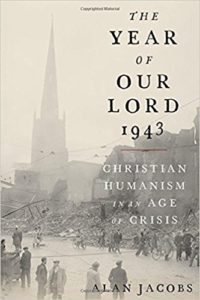 The Year of Our Lord 1943: Christian Humanism in an Age of Crisis Alan Jacobs (Oxford University Press) $25.95 I hope you recall how we announced this earlier, insisting that the idea of it — not to mention the research — was brilliant. Jacobs is a great writer, a remarkably adroit thinker, and here he tells of five major Christian thinkers who, after World War II, published major works questioning the idols of Western culture and wondering how a renewal of a Christian-like humanism might help us survive the coming technocracy. Jacobs explores Christian intellectuals Jacques Maritain, T. S. Eliot, C. S. Lewis, W. H. Auden, and Simone Weil, who “sought both to articulate a sober and reflective critique of their own culture and to outline a plan for the moral and spiritual regeneration of their countries in the post-war world.” This is one of the most learned and vital and valuable books of many a year.
The Year of Our Lord 1943: Christian Humanism in an Age of Crisis Alan Jacobs (Oxford University Press) $25.95 I hope you recall how we announced this earlier, insisting that the idea of it — not to mention the research — was brilliant. Jacobs is a great writer, a remarkably adroit thinker, and here he tells of five major Christian thinkers who, after World War II, published major works questioning the idols of Western culture and wondering how a renewal of a Christian-like humanism might help us survive the coming technocracy. Jacobs explores Christian intellectuals Jacques Maritain, T. S. Eliot, C. S. Lewis, W. H. Auden, and Simone Weil, who “sought both to articulate a sober and reflective critique of their own culture and to outline a plan for the moral and spiritual regeneration of their countries in the post-war world.” This is one of the most learned and vital and valuable books of many a year.
Alan Jacob’s prose wears immense learning lightly, with great grace and to great effect. To think alongside these writers, under Jacobs’s stage direction, to hear them across a gap of three-quarters of a century think with gravity and sincerity, pondering the nature of the human soul, palpably straining toward the ideal of the common good, feeling the pull of their religion’s perennial pitfalls, in a situation and language different from and yet not wholly unlike our own, is riveting, challenging, and life-giving. –Lori Branch, author of Rituals of Spontaneity
Alan Jacobs has written an elegant and deeply learned book on Christian humanism in the critical years of the Second World War. He opens a window into some of the most luminous and profound thinking about the nature and possibilities of civilization during those troubled years. By doing so, has opened a window for thinking about our own troubled times. –James Davidson Hunter, author of To Change the World: The Irony, Tragedy, and Possibility of Christianity in the Late Modern World
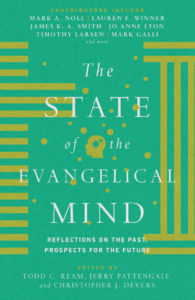 The State of the Evangelical Mind: Reflections on the Past, Prospects for the Future edited by Todd Ream, Jerry Pattengale, and Christopher Devers (IVP Academic) $28.00 This is one of those books that deserves a very thorough study, a review that explains each and every chapter and celebrates the good work of each and every contributor. The work is good and the contributors fascinating — Mark Noll, Lauren Winner, James K.A. Smith, Jo Anne Lyon, Timothy Larson, Mark Gallie, and more. If you are a serious fan of Hearts & Minds you will know why we honor this book as one of the most important of 2018 and you’ll want to have it on your own bookshelf. Heck, you might want to order it and then throw a party. It is not only a good, good book on its own merit, but it stands for something, signifies a renaissance of thoughtful Christian publishing and intentionally deepening of the evangelical mind, even a renewal of faith-based higher education, and a revival of the Christian presence in the arts, a project in which some observers have said we have played a small part. (Okay, only a very small part, but we all need stuff to celebrate, so keep that party going!)
The State of the Evangelical Mind: Reflections on the Past, Prospects for the Future edited by Todd Ream, Jerry Pattengale, and Christopher Devers (IVP Academic) $28.00 This is one of those books that deserves a very thorough study, a review that explains each and every chapter and celebrates the good work of each and every contributor. The work is good and the contributors fascinating — Mark Noll, Lauren Winner, James K.A. Smith, Jo Anne Lyon, Timothy Larson, Mark Gallie, and more. If you are a serious fan of Hearts & Minds you will know why we honor this book as one of the most important of 2018 and you’ll want to have it on your own bookshelf. Heck, you might want to order it and then throw a party. It is not only a good, good book on its own merit, but it stands for something, signifies a renaissance of thoughtful Christian publishing and intentionally deepening of the evangelical mind, even a renewal of faith-based higher education, and a revival of the Christian presence in the arts, a project in which some observers have said we have played a small part. (Okay, only a very small part, but we all need stuff to celebrate, so keep that party going!)
This shift towards better Christian publishing and evangelical perspectives being heard in literature, journalism, science, culture and education, say, is a part of our story and part of the renewal happening with evangelical and church-related colleges, and part of the cause for the remarkable rise of publishers like Baker Academic, Brazos, Crossway, and InterVarsity Academic, all who have brought — like Eerdmans before them — a historic evangelical take on the arts and sciences, culture and creation. That many younger evangelicals have been shaped in recent decades by brilliant scholars and serious writers and the rise of organizations in the arts, marketplaces, and professions taking up the high calling of integrating faith and work, nurturing the habits of the mind, deepening the virtues of the intellectual life, is not to be taken for granted.
This historic renewal of concern for Christian worldviews and a Biblical mindset and strengthening of institutions of higher education and the necessary periodicals and organizations and publishing agendas and institutional networks developed for a reason, and in God’s timing, part of that impetus was the publication of The Scandal of the Evangelical Mind by historian and critic Mark Noll in 1994. The State of the Evangelical Mind emerged from a conference held (at Wheaton College, naturally) to ask the question of how we’ve faired since that hard hitting critique of the lack of a historic, evangelical engagement in scholarship and culture.
This new book, inspired by Noll, and with a major contribution by him, is dedicated to John and Wendy Wilson. John was the erstwhile and colorful editor of one of the most brilliant journals in America, the deeply Christian Books & Culture. That it arose inspired, in part, by Noll’s mid-90s cri de coeur and yet collapsed in the 2015 is a tragedy that should sober any upbeat reading of The State of the Evangelical Mind. Different scholars who contributed to this book have differing takes on what has happened in recent decades, but few can deny there has been a great publishing renaissance since the days when Zondervan published books about John DeLoreans car and Revell made a mint on Marabel Morgan’s Saran Wrap when there were hardly any books on art or science or ecology or film or gender or economics or political theory from a thoughtful Christian viewpoint. My heard starts pounding when I think of how one author, a big name in Christian Bookselling Association circles, threatened to sue us because we said her goofy accusations about Richard Foster being pagan and Ron Sider being a communist was hogwash. Those were the days when a customer of ours circulated a petition against us in part because we carried bookmarks that had rainbows on them, a secret sign of a conspiracy towards One World Government, doncha know?
So, we’ve come a long way. But not far enough along, so that a journal like Books & Culture could survive. This recent book offers a variety of voices on that story, where we’ve been, what’s going on now, and what might be to come. If you know anybody in higher education, any young Christians in graduate school, anyone who does campus ministry and works in higher learning, if you know anybody who is an engaged professional, if you know anybody who reads literary fiction or science journals or The Paris Review or First Things or Tin House or Foreign Affairs, then this book is for them.
Harry Stout, the legendary Jonathan Edwards Professor of American Religious History at Yale says the chapters here are “judiciously rendered thought pieces… uniformly astute, well written, and in short, ruthlessly truthful. The result is a stunning achievement.”
Wilfred McClay of the University of Oklahoma, writes, “If the richness and maturity of a tradition can be judged by the quality of the debate and the healthy self-criticism it generates, then the evangelical intellectual tradition shows itself to be alive and cackling in this stimulating and thought-provoking book.”
Linda A. Livingstone, president of Baylor University, says:
From Mark Noll’s influential Scandal of the Evangelical Mind in 1994 to the thoughtful essays included in The State of the Evangelical Mind, we are reminded — and indeed challenged — to continue cultivating leaders who devote their training and God-given talents to generating solutions and shaping ideas at the highest level of the academy and society.
I am very glad for this book and we award it as one of the Best of the Year.
It is sweet and significant that in the foreword by Rich Mouw he starts with a story from an old acquitance of ours, a Mennonite who was, until his untimely death, the President of near-by Messiah College. (Not too many college Presidents have visited our Dallastown store.) Mouw writes about an observation Rod Sawatsky was fond of making about evangelical higher education. “We give much attention, he would say, about the relationship between faith and learning, but we hear almost nothing about the relationship of hope and love to learning.” Mouw continues, “The explorations in this book make good headway in addressing Rod’s complaint.” Thanks be to God. Tolle lege.
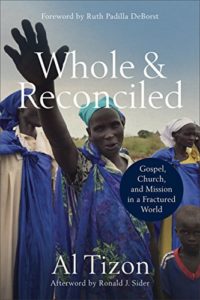 Whole & Reconciled: Gospel, Church, and Mission in a Fractured World Al Tizon (Baker Academic) $22.99 At a bit over 200 pages this book covers so much good stuff it deserves multiple awards — best book on the nature of the gospel, best book of missiology, best book as a foundation for peace and justice work, best book on the Biblical narrative. I suppose I’d celebrate it as one of the best books by a friend who has picked up books from us here at Hearts & Minds. (Runner up to Believe Me author Professor John Fea.) I think it has one of the stronger cover designs, too — what a photo, and what a title.
Whole & Reconciled: Gospel, Church, and Mission in a Fractured World Al Tizon (Baker Academic) $22.99 At a bit over 200 pages this book covers so much good stuff it deserves multiple awards — best book on the nature of the gospel, best book of missiology, best book as a foundation for peace and justice work, best book on the Biblical narrative. I suppose I’d celebrate it as one of the best books by a friend who has picked up books from us here at Hearts & Minds. (Runner up to Believe Me author Professor John Fea.) I think it has one of the stronger cover designs, too — what a photo, and what a title.
So, I am very fond of Al Tizon and have stocked his other books (such as his Judson Press volume Missional Preaching: Engage Embrace Transform.) Al used to work for Evangelicals for Social Action and taught with Campolo and Ron Sider at Eastern University and Palmer Seminary, so it was natural that he helped compile and edit a feschgrift in honor of Sider that was called Following Jesus: Journeys in Radical Discipleship: Essays in Honor of Ronald J. Sider (a former Best Book of the Year award winner from here at Hearts & Minds!) Al Tizon, now executive minister of Serve Globally, the international ministries arm of the Evangelical Covenant Church, is also an affiliate professor at North Park Theological Seminary.He is a man we admire and appreciate.
In a way, it seems that Whole & Reconciled is one of those books a scholar works on his or her whole life, a magnum opus. Yet, Al is no where near the end of his important career and may have even more books in him. But this, this truly is a major contribution, and mighty, multi-disciplinary work, visionary and solid. Whole & Reconciled is doubtlessly one of my favorite books of 2018 and clearly one of the most important books to be released this year.
Some readers will recall that several decades ago there was much conversation about how best to define mission work — words or deeds? evangelism or social action? church planting or development? — and the best thinkers bravely went against the tide of their respective traditions that routinely, often loudly, insisted it was one or the other and said that it must be both. Holistic, intregal, Kingdom advancing ministry was proposed as a Biblically-required and theologically-sound alternative to the typical voices of the fundamentalists and the liberals, both who, in their respective mission agencies and declarations, privileged one approach over and against the other.
Well, years of debate and crisis on the ground caused brilliant work to be done within the evangelical camp — the World Council of Churches and other such groups were more reluctant to revise their social gospel only approach, or so it seems — and an entire body of literature evolved over decades (including statements such as those that came out of Lausanne) that offered a deep and faithful understanding of how Christ is Lord of all of life and therefore redemptive work must be culturally relevant, spiritually and theologically sound, and of solid service to those whom we are called to serve (not least, the poor, sick, and marginalized.) I am confident that some of the very best work done in the last fifty years in global development and majority world contextualized social reform has been led by evangelicals with a deep passion to integrate word and deed, good news and good works. In fact, even the “both/and” approach has been criticized for even assuming there are two aspects of Biblical witness that have to be somehow brought together. Kingdom living is multi-dimensional as all of creation is being healed by Christ so a fully robust missiology has to be more than merely “bringing together” words and deeds.
Well, there hasn’t been a book that has approached this subject so thoroughly in decades and the time is ripe for not only a reminder of the nature of wholistic mission but an updating and even revamping of some of the key themes of this wonderful vision. Whole & Reconciled: Gospel, Church, and Mission in a Fractured World is just the right book at the right time and Al Tizon, himself a Filipino American with much global experience, is just the right author for the job. One of the grandfathers of this move towards wholistic evangelical missiology is Samuel Escobar raves, as does Christopher Wright of Langham Partnership (doubtlessly one of the most important Biblical scholars writing on missional themes in the Scriptures.) Always edgy and poetic Ruth Padilla DeBorst (daughter of another pillar in the movement, Rene Padilla) writes a powerful Foreword and Ron Sider has a very impressive Afterword. In other words, Whole & Reconciled really is considered by many to be a major release and an exceptional new resource for God’s people who care about the world.
The book is arranged in four units, with a couple of great chapters in each. The four parts are Whole World, Whole Gospel, Whole Church, and Whole Mission. Every one of these sections are worth the price of the whole book and Tizon is to be thanked for packing so very much good content in such readable, lively prose. It is for anyone who ponders the implications of the gospel of reconciliation, the transforming power of a Kingdom vision, the adventure that awaits when the whole people of God care about the whole gospel for the whole world. What a book!
Mae Elise Cannon, director of Churches for Middle East Peace and author of Just Spirituality, The Social Justice Handbook, and A Land Full of God: Christian Perspectives on the Holy Land writes:
Whole & Reconciled speaks of the entirety of the gospel without discarding the uncomfortable truths and demands of biblical justice, peacemaking, and reconciliation. Tizon explains how the gospel necessitates the type of reconciliation that penetrates the deepest aspects of individual and community relationships with truth, love, and vulnerability. Read this important book to learn to be challenged to embrace what it means to be truly whole and reconciled.
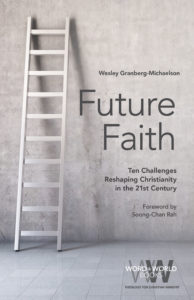 Future Faith: Ten Challenges Reshaping Christianity in the 21st Century Wesley Granberg-Michaelson (Fortress Press ) $18.99 Well. Speaking of discussion about the nature of mission and hearing voices from the global church, of wanting to work for the unity of the Body of Christ — for the sake of the needy world and creation itself, this is an author who has been on the front lines for decades and is a voice you should know, whose books you should read. Wes Granberg-Michaelson has spent his adult life pondering and working on these very things. This is surely, surely, one of the most important books of 2018 — and I think really helpful for anyone involved in church life. The great and interesting foreword by Soong-Chan Rah says it wonderfully, assuring us that this is an excellent tool for local church folks.
Future Faith: Ten Challenges Reshaping Christianity in the 21st Century Wesley Granberg-Michaelson (Fortress Press ) $18.99 Well. Speaking of discussion about the nature of mission and hearing voices from the global church, of wanting to work for the unity of the Body of Christ — for the sake of the needy world and creation itself, this is an author who has been on the front lines for decades and is a voice you should know, whose books you should read. Wes Granberg-Michaelson has spent his adult life pondering and working on these very things. This is surely, surely, one of the most important books of 2018 — and I think really helpful for anyone involved in church life. The great and interesting foreword by Soong-Chan Rah says it wonderfully, assuring us that this is an excellent tool for local church folks.
I suppose you might recall me writing about Granberg-Michaelson’s other books. Years ago he worked for a hero of mine, Senator Mark Hatfield (an anti-war Republican who gave a fantastic keynote talk at one of the early Jubilee conferences in Pittsburgh — that Wes wrote.) He moved over to Sojourners for a while and eventually became a leader in his own denomination, the Reformed Church in America. He has written about leadership and about creation care and has published dozens if not hundreds of articles all over the world. As he describes in his wonderful biography, Unexpected Destinations: An Evangelical Pilgrimage to World Christianity he tells of how an evangelical kid from the mid-West ended up living in Geneva working for the World Council of Churches. His travels among the global church put him in the upper circle of key scholars of global Christianity (in league with Andrew Walls and Philip Jenkins and the recently passed Lamin Sanneh) but he writes more tellingly, with vivid storytelling and obvious investment in church life. His 2013 book From Times Square to Timbuktu: The Post-Christian West Meets the Non-Western Church is more important now than it was 10 years ago.
And so, as we’ve said at BookNotes more than once, Future Faith takes all this stuff about social trends and globalization and multi-ethnicity and the shifts in world Christianity and tells how it effect the ordinary local congregation. It offers us key trends we have to be a part of, one way or another; he pitches them as challenges, but it could just as easily have been written as opportunities. Whether you are a mainline Presbyterian or high-brown Episcopalian or a community church that is non-denominational, a Gosepl Coalition Reformed Baptist or a progressive emergent community or a typical Roman Catholic or Lutheran this book will help you. Some of you will intuitively grasp more than others, some will need more help than others, some churches may be doing well with one challenge but maybe less so on another, but Future Faith is a needed guide. It is vital for all to frame your own ministry and congregational integrity for the next decade.
Not everyone will agree that each of these 10 challenges are as pressing as Wes may say. That’s okay. Even if he’s partially right, there is so much good stuff here to ponder and so many theologically-driven, culturally-savvy imperatives that it is sure to be an aid to your growth in deeper faithfulness. As Soong-Chan Rah says in the foreword, this book will start (or deepen) a conversation, and that’s what is key. It’s why we celebrate Future Faith as one of the most important books of 2018.
Few guides to the future of faith are as trustworthy as Wesley Granberg-Michaelson. This book is filled with wisdom drawn from a lifetime of experience and a heart of passion for the love and justice proclaimed by Jesus. Diana Butler Bass, author Gratitude: The Transformative Power of Giving Thanks
This is an inspiring and encouraging book, with wise insights into what we can and must do to remain faithful to God’s work of renewal in the world. Future Faith disturbed me as it informed me. But, thank God, it also gave me hope. Richard Mouw, President emeritus Fuller Seminary
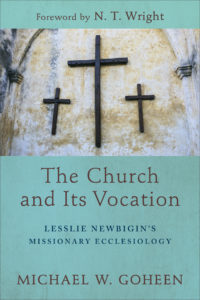 The Church and Its Vocation: Lesslie Newbigin’s Missionary Ecclesiology Michael Goheen (Baker Academic) $22.99 This came out late in the fall and although I can’t say I’ve read every page, I can say that it deserves to be named an an exceptionally notable work. There has been (especially just a couple of years ago) a huge discovery (or rediscovery) of the wonderful work of Lesslie Newbigin. From his many volumes written out of his time in India (where he lived and ministered for most of his adult life) and then his ground-breaking work about how to use contextualization principles (that cross cultural missionaries routinely use) in the post-Christian, secularizing West. In books like Foolishness to the Greeks and The Gospel in a Pluralist Society Newbigin set the stage for what has become the missional church movement. There are bunches of fantastic missional church resources, some quite lively, all indebted to Newbigin.
The Church and Its Vocation: Lesslie Newbigin’s Missionary Ecclesiology Michael Goheen (Baker Academic) $22.99 This came out late in the fall and although I can’t say I’ve read every page, I can say that it deserves to be named an an exceptionally notable work. There has been (especially just a couple of years ago) a huge discovery (or rediscovery) of the wonderful work of Lesslie Newbigin. From his many volumes written out of his time in India (where he lived and ministered for most of his adult life) and then his ground-breaking work about how to use contextualization principles (that cross cultural missionaries routinely use) in the post-Christian, secularizing West. In books like Foolishness to the Greeks and The Gospel in a Pluralist Society Newbigin set the stage for what has become the missional church movement. There are bunches of fantastic missional church resources, some quite lively, all indebted to Newbigin.
Many of the best missional church resources not only attempt to analyze the culture, wondering how the Kingdom of God can break through into that distorted creation that God so loves, but ask what kind of local church do we need to proclaim a missional model, and all-of-life-redeemed Kingdom expression in the world as it is? (For what it’s worth, this is the exact question David Fitch asked in his very impressive IVP book, Faithful Presence: Seven Disciplines That Shape the Church for Mission which was then summarized last year in the pocket-sized Seven Practices for the Church on Mission.)
So, there has been a renewed interest in Newbigin, in his understanding of culture and the missional project, and in his view of Scriptures that yielded such a robust missiology. Many of these books are great, and many of the more popular misisonal books are in discussion with them. Through it all, though, no one figure (in my opinion, at least) has as much insight into Newbigin and his relevance today as Michael Goheen. Those that follow Lesslie Newbigin studies know him well. Interestingly, some of the Dutch neo-Calvniists who talk about worldview and draw on Al Wolter’s often-cited Creation Regained might notice that it was Goheen who did a final chapter in the second edition, and an afterward about how Newbigin’s project of missional church stuff aligned with Al’s Kuyperian worldview and call for distinctively Christian philosophy to fund proper social engagement. Goheen, that is, is an important figure in several different traditions and communities.
Which is a very long way of saying why this book is a must-read, why it should be widely known, and why we want to honor it as a truly vital voice, a major release about a very important topic. What kind of churches do we need to do all this good stuff? I know a book on a South Indian missionary that has eccelisology in the subtitle doesn’t sound like a best-seller, but let us pray that many read it, take up its challenge, and carefully use Newbigin’s good ideas, filtered through Goheen’s good framework, for pushing for congregational renewal that bears fruit fo the Kingdom of God. Out of concern for God’s church we must cry out and push for serious work on parish life. This book will help.
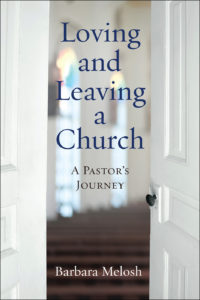 Loving and Leaving a Church: A Pastor’s Journey Barbara Melosh (Westminster John Knox Press) $18.00 We stock so many books for congregational leaders — everything from Abingdon and Alban and the like — but occasionally a book comes along that stands out for it’s literary quality and it’s charm and quiet insight. In the last few years I keep raving about the epistolary novel, Love Big Be Well: Letters to a Small Town Church by Winn Collier (which Eugene Peterson just raved about.) I’ve been on the look-out for something to recommend like that.
Loving and Leaving a Church: A Pastor’s Journey Barbara Melosh (Westminster John Knox Press) $18.00 We stock so many books for congregational leaders — everything from Abingdon and Alban and the like — but occasionally a book comes along that stands out for it’s literary quality and it’s charm and quiet insight. In the last few years I keep raving about the epistolary novel, Love Big Be Well: Letters to a Small Town Church by Winn Collier (which Eugene Peterson just raved about.) I’ve been on the look-out for something to recommend like that.
Loving and Leaving a Church is not fiction, but a memoir of a new Lutheran pastor, a second-career woman, in her first pastorate. She was “brimming with enthusiasm and high hopes.” It was a blue-collar congregation and they’ve had a glorious past but, like many mainline congregations, an uncertain future. Barbara Melosh (formerly a college prof at George Mason) tells her story of trying her best and, finally, realizing the relationship was not a good fit. None of her fresh energy and church growth plans and outreach programs worked; she could not, as she puts it, drag them into a future they did not want.
I get choked up reading even the back cover which says,
Yet while the congregation failed to change itself, Melosh notes, it succeeded in changing her. Simply put, it made her a pastor.
I know pastors whose ministries seem not to bear much earth-shaking fruit, but they love their flock. I know some who captain large and effective institutions, but have little affection for their place or their people. It seems to me — and this good story captures it — that learning to love and serve real people in a real congregation in a real place is most of what a pastor does. Sure, there are programs and worship services and classes and meetings, and it all matters. But this vocation of mediating God’s presence through affectionate solidarity with those God gives to you, being a pastor, is what congregations most need. It is touching, human work, which is why this book, even though some of it is out and out hilarious, is heartbreaking as well.
Richard Lischer (who wrote his own remarkable memoir of this sort, Open Secrets: A Memoir of Faith and Discovery) says Melosh offers “an unflinchingly honest account of how one little group of Saints and Sinners transformed a novice into a pastor.”
It is, Lischer insists:
“Pastoral writing at its best.”
By the way, those of us who are not pastors will enjoy this as well. As Dorothy Bass of the Valparaiso Project says, “…parishioners will see with fresh eyes their own strong role in embodying God’s presence in the particular places where God’s people gather and serve.”
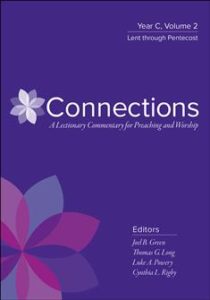
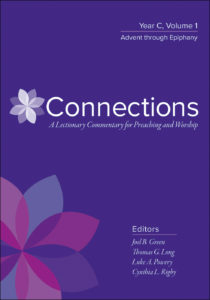
Connections: A Lectionary Commentary for Preaching & Worship – Year C Vol 1 Connections: A Lectionary Commentary for Preaching & Worship – Year C Vol 2 edited by Joel Green, Thomas Long, Luke Powery, Cynthia Rigby (Westminster John Knox Press) $45.00 each
What a grand, lectionary-based set of resources for preaching and worship! In a way, this is the next generation of Feasting on the Word and represents the best thinking on Biblical exegesis, homiletics, personal and social application, all offered with preaching commentary and worship planning ideas for each lectionary reading of the given season. The contributions are wide and broad, with dozens of writers from bunches of denominations, from Evangelical Free and the Christian Reformed Church to the more standard Presbyterian, United Methodist, Lutheran, UCC, and Episcopalian. There are African American exegetes and Latina preachers and Baptist liturgists. What a fun and helpful array of prayerful ideas from stimulating voices.
When we first introduced Volume 1 (Advent through the season of Epiphany to Transfiguration Sunday) we explained more, but allow me to just say this: it is called Connections in part to capture two things: the various contributors working on the lections each week try to show the connections of that Biblical portion to the whole of Scripture, hearing connections between this text and others in Holy Scripture. And, it attempts to offer ideas for making connections between this ancient Word and the world of today. So when it says “connections” it means it — connection the lectionary text to the bigger story of the Bible and connection the worship to real life. Surely one of the best worship aids and liturgical resources in many a year, to be celebrated as a publishing win in 2018. Cheers!
“Here is a resource that puts hundreds and hundreds of focused scholars in the preacher’s study, ready to help shovel the diamonds of Scripture for the Sunday sermon. Every congregation in the country should buy their pastor a complete set, both for their own good and the good of the world.” —Barbara Brown Taylor
Given the deep crisis we face in church and in society, the recovery of the biblical text in all its glorious truth-telling is an urgent task for us preachers. For much too long the text has been neglected through complacency, timidity, and embarrassment. Now is the time of recovery of the text. There are few resources as useful for such a recovery as Connections. It is interpretive work done by our best interpreters, skilled in our best methods, grounded in deep faith, and linked to lived reality. This resource is an immense treasure that invites boldness and imagination in our shared work of proclamation.” —Walter Brueggemann
“In this day when potential listeners are biblically and theologically untutored, distracted and disconnected, Connections is just what the doctor ordered for contemporary preaching. Connections is well named, for it equips preachers to preach sermons that connect with both Scripture and contemporary life, sermons that are both faithful to their biblical contexts and fitting to the contexts of their congregations in the world. Connections provides an antidote to biblical lectures with little acquaintance with contemporary life as well as to strings of stories that lack biblical grounding. We owe the publisher, editors, and authors of this series a debt of gratitude for the gift of this resource for preaching.” —Alyce M. McKenzie Professor of Preaching and Worship, Perkins School of Theology, Southern Methodist University
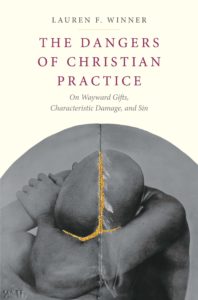 The Dangers of Christian Practice: On Wayward Gifts, Characteristic Damage, and Sin Lauren F. Winner (Yale University Press) $28.00 This is certainly one of the most thoughtful and grand books of 2018 and it is one I am reading so carefully that I am not yet finished! It deserves savoring and pondering. Lauren is a gracious, at times luminous writer and those that love her memoirs will recognize her voice in some of these lovely and poignant stories. Yet, this is a different sort of book (it is on Yale University Press, after all.) More scholarly, more philosophical, she goes to great lengths to be clear about her argument.
The Dangers of Christian Practice: On Wayward Gifts, Characteristic Damage, and Sin Lauren F. Winner (Yale University Press) $28.00 This is certainly one of the most thoughtful and grand books of 2018 and it is one I am reading so carefully that I am not yet finished! It deserves savoring and pondering. Lauren is a gracious, at times luminous writer and those that love her memoirs will recognize her voice in some of these lovely and poignant stories. Yet, this is a different sort of book (it is on Yale University Press, after all.) More scholarly, more philosophical, she goes to great lengths to be clear about her argument.
The first chapter is not quite tedious but it is meticulous. It is exceptionally helpful as she explains what “characteristic” damage is; that is, sins and distortions that are unique to and consonant with and intrinsic to a certain good thing. She gives lots of examples of what she means and what she doesn’t mean, but the upshot is an insightful reminder that some things, even good things, carry with them immense possibility to cause damage, damage unique to their very goodness.
And therein is the genius and profundity of this book, a book unlike any other I know. Many these recent decades are talking about not only inner disciplines but distinctively Christian practices. (Her Mudhouse Sabbath — oh, please tell me you know it! — helped popularize this very language and orientation.) But, to be blunt, can these very practices harm people? Can the joys and healing of, say, receiving communion or saying prayers backfire, so to speak? As one reviewer asks, “Does the church ever hurt those it means to help?”
Here is how Alan Jacobs puts it:
Thoughtful Christians often commend a return to ancient practices of faith as a means of healing spiritual disorders. But what if those practices are themselves damaged? This is the discomfiting question Lauren Winner raises in this curious and remarkable book — a literary and historical meditation on damaged gifts that remain, nevertheless, gifts.
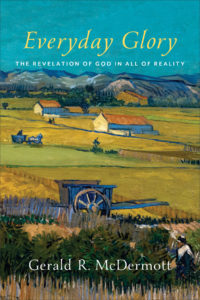 Everyday Glory: The Revelation of God in All of Reality Gerald McDermott (BakerAcademic) $22.99 We have written from time to time about what I call “the spirituality of the ordinary,” When we set up book displays we usually have a dozen titles tucked in among the spiritual disciplines and contemplative guides and mystics that extol finding God in the mundane. Well, this does that, I suppose, but it is more of a theology of the spirituality of the ordinary. It is warm and inviting but meaty. McDermott is a splendid writer, the Anglican Chair of Divinity at Beeson (at Samford University) and here he sees — not unlike Jonathan Edwards who he has studied deeply and draws upon here — in the ordinary stuff of daily life signs and signals of the Trinune God.
Everyday Glory: The Revelation of God in All of Reality Gerald McDermott (BakerAcademic) $22.99 We have written from time to time about what I call “the spirituality of the ordinary,” When we set up book displays we usually have a dozen titles tucked in among the spiritual disciplines and contemplative guides and mystics that extol finding God in the mundane. Well, this does that, I suppose, but it is more of a theology of the spirituality of the ordinary. It is warm and inviting but meaty. McDermott is a splendid writer, the Anglican Chair of Divinity at Beeson (at Samford University) and here he sees — not unlike Jonathan Edwards who he has studied deeply and draws upon here — in the ordinary stuff of daily life signs and signals of the Trinune God.
Peter Leithart wrote a year or so ago a book that trod similar holy ground in Traces of the Trinity: Signs of God in Creation and Human Experience and I think I enjoyed Everyday Glory even more. He offers what one reviewer (Matthew Olver of Nashotah House) a “beauty-saturated theology of creation.” It is designed to help us reject the disenchantment of modernity (which is where the book starts) — why we have failed to experience a robust revelation of God in creation. Even if you aren’t particularly interested in Edwards’s sort of natural theology, this book will help you pay attention to life — all of life, from science to history, sex to sports — through the lens of the glory of God who is revealed in creation. It’s a great book and highly recommended.
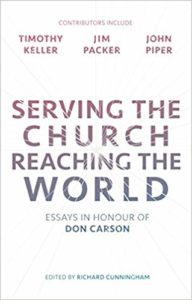 Serving the Church, Reaching the World: Essays in Honour of Don Carson edited by Richard Cunningham (IVP-UK) $15.00 I know his friends call him Don, but most evangelical book buyers who know his vast, important body of work call him D.A. We sold books with him once and didn’t know how to address him, so I called him “Dr. Carson.” As you can see from the funny spelling of “Honour” this is a British book. Technically, it came out in England in late 2017 but it was 2018 until we discovered it here in the States. It is a collection of essays offered in appreciation (a festschrift) for D.A. Carson and brings together a select group of theologians, Bible scholars, mission leaders, seminary thinkers, and those who do apologetics and preaching to offer good pieces. It isn’t a well-known book which is why I want to give a special shout out here as it is a great collection of articles and essays that you won’t find anywhere else.
Serving the Church, Reaching the World: Essays in Honour of Don Carson edited by Richard Cunningham (IVP-UK) $15.00 I know his friends call him Don, but most evangelical book buyers who know his vast, important body of work call him D.A. We sold books with him once and didn’t know how to address him, so I called him “Dr. Carson.” As you can see from the funny spelling of “Honour” this is a British book. Technically, it came out in England in late 2017 but it was 2018 until we discovered it here in the States. It is a collection of essays offered in appreciation (a festschrift) for D.A. Carson and brings together a select group of theologians, Bible scholars, mission leaders, seminary thinkers, and those who do apologetics and preaching to offer good pieces. It isn’t a well-known book which is why I want to give a special shout out here as it is a great collection of articles and essays that you won’t find anywhere else.
I don’t agree with everything this brilliant man writes and his Gospel Coalition tribe isn’t exactly our own, but anybody who cares about thoughtful, culturally-relevant, Biblically-faithful, solid stuff should pay attention to those who have stood beside him or on his shoulders. Here are some who have contributed to Serving the Church, Reaching the World — William Edgar, Kirsten Birkett, Timothy Keller, J.I. Packer, John Piper, and the editor, Richard Cunningham, who is an ordained Anglican ministry (in the Church of England) and is the Director of the Universities and Colleges Christian Fellowship (UCCF.)
Topics include (among others) “Winning Hearts and Minds in a Secular Age”, Tim Keller on “University Missions Today” and Packer on “Preacher and Theologian: The Ideal Christian Communicator.” Piper has a powerful essay about service and suffering and there’s several potent chapters on truth, apologetics, ecumenical cooperation. Jazz-man and WTS prof Bill Edgar has a strong essay called “The Silence of God.” This is a fascinating, little known anthology and we want to celebrate it, even as it celebrates an author of over 50 books, D.A. Carson. Kudos.
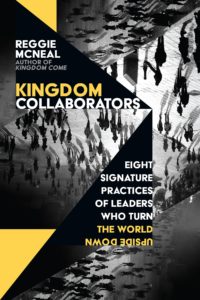 Kingdom Collaborators: Eight Signature Practices of Leaders Who Turn the World Upside Down Reggie McNeal (IVP) $16.00 This is another great book that comes from IVP’s Praxis imprint and we are thrilled to say we stock them all, including a big stack of this one. We have long appreciated Reggie’s upbeat, stimulating (but exceptionally well-informed and thoughtful) approach to missional church and Kingdom living. We want to honor this as one of the books we were excited about this year, in part because it is practical and useful for church and ministry leaders — not “running over the same old ground” as Pink Flloyd puts it in “Wish You Were Here” — but also because, well, did you see what I did there? This is a book for church and parish leaders but it is not mostly or exclusively about the local church but about the reign of God in the world God loves. That is, it is about the culture, about the Kingdom coming in all of life, about entrepreneurial visions and world-changing efforts to make a difference. Do you want to be that kind of a church leader, equipping your people to serve their city, to care for their neighborhoods, to represent God’s grace in various institutions of your locality?
Kingdom Collaborators: Eight Signature Practices of Leaders Who Turn the World Upside Down Reggie McNeal (IVP) $16.00 This is another great book that comes from IVP’s Praxis imprint and we are thrilled to say we stock them all, including a big stack of this one. We have long appreciated Reggie’s upbeat, stimulating (but exceptionally well-informed and thoughtful) approach to missional church and Kingdom living. We want to honor this as one of the books we were excited about this year, in part because it is practical and useful for church and ministry leaders — not “running over the same old ground” as Pink Flloyd puts it in “Wish You Were Here” — but also because, well, did you see what I did there? This is a book for church and parish leaders but it is not mostly or exclusively about the local church but about the reign of God in the world God loves. That is, it is about the culture, about the Kingdom coming in all of life, about entrepreneurial visions and world-changing efforts to make a difference. Do you want to be that kind of a church leader, equipping your people to serve their city, to care for their neighborhoods, to represent God’s grace in various institutions of your locality?
This book works on a number of levels. It is energizing and visionary, of course. And in a way it is a sequel to his Kingdom Come which is passionate and upbeat about the reality of the Kingdom of God. But it is also about leadership and it is about collaboration, a matter to which we don’t pay enough attention, I think. And it is about a certain sort of audacious collaboration — not just with other leaders in your church, not even with other churches, but other community leaders, and other community institutions. This isn’t new for most mainline folks, but for more evangelical folk, it may be a stretch. I think he makes a great case for this and invites us to new forms of worldly holiness and healthy collaboration.
Just for instance, listen to this testimonial by Lee Clamp, a Baptist woman who was part of a McNeal-inspired consultation: “Do you long to see broken lives restored? New life is the drive of Kingdom Collaborators. Reggie’s passion for people is felt on every page, and he lives what he writes. He has helped us to birth a statewide coalition focused on awakening the faith-based community to bring hope to every child through serving our local schools. Be warned―reading Kingdom Collaborators may be hazardous to your comfortable life. It will change your status quo, muddy your hands, and free you from a predictable life!”
As Susan Hewitt of UpWorks in St. Paul Minnesota writes,
The transformation of a community begins with the transformation of an individual. Whether one is a leader, collaborator, or follower, Reggie provides kingdom thinking to help unlearn traditions that are hindering our witness and work and relearn biblical principles that will unleash God’s people. I believe this inspired book will help Christians join with God in his kingdom agenda, accelerating improvement on societal issues that is so desperately needed.
Here is how another United Methodist leader puts it:
Perhaps, for such a time as this, Jesus is changing our minds as it relates to understanding the call of all people. Perhaps now is the time that God is calling kingdom leaders to agitate for the kingdom, knowing that the agitation and advancement of God’s kingdom is done with collective force and efforts. Kingdom Collaborators is the book to arrest your heart, expand your understanding, and prod you to move into God’s calling no matter if you are clergy or congregant! — Aleze M. Fulbright, director of leadership development, Indiana Conference of the United Methodist Church
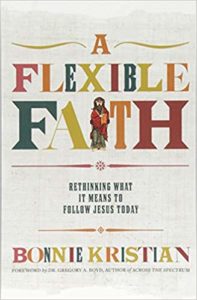 A Flexible Faith: Rethinking What It Means to Follow Jesus Today Bonnie Kristian (FaithWords) $14.99 This has been a book that I’ve talked about when we’ve been out at events but it is tricky to explain. It is charming, wonderfully written, upbeat and fun and yet I’d suggest it is deadly serious. It is about the stream of Christian orthodoxy which is “wide and deep but most Christians only swim in their own little pool.” There is more than one viable option to unbelief and to understand this is absolutely critical. It is important as we learn to get along with the body of Christ and it is important as we invite seekers and the disillusioned to sustainable faith when they’ve left the one sort of faith expression they thought was normative.
A Flexible Faith: Rethinking What It Means to Follow Jesus Today Bonnie Kristian (FaithWords) $14.99 This has been a book that I’ve talked about when we’ve been out at events but it is tricky to explain. It is charming, wonderfully written, upbeat and fun and yet I’d suggest it is deadly serious. It is about the stream of Christian orthodoxy which is “wide and deep but most Christians only swim in their own little pool.” There is more than one viable option to unbelief and to understand this is absolutely critical. It is important as we learn to get along with the body of Christ and it is important as we invite seekers and the disillusioned to sustainable faith when they’ve left the one sort of faith expression they thought was normative.
A Flexible Faith might be found somewhere in the middle, then, between Richard Foster’s must-read Streams of Living Water and Brian McLaren’s clever and feisty A Generous Orthodoxy.
Kristian says she has written for the convinced and the confused alike. I”d agree — if you know what you belief and why you belief it, it doesn’t hurt to learn about others who see things differently and if you are confused this will not only say “welcome to the club” but will lay out some options and offer resources for finding some resolution to questions of faith and practice.
Here is how it works. I will be brief, but I could write a long time about various stuff she writes here. There are two things Kristian does: first, she does a survey of various views of several topics. (That is, for instance, she’ll show both sides of an issue saying some Christian believe this and other Christians belief that. She tips her hand and says why. In this regard, this is a nice handbook to what the primary views are of everything from God’s providence to Christian involvement in war; from what the Lord’s Supper means to the ethics of LGTBQ sexual relationships. In every other chapter she shows that some Christians think one way but others another way about this or that theological, church, and discipleship question. If all she did was offer this fair-minded survey we’d have much to be thankful for.But the other concern of this book isn’t just to struggle with abstract doctrines and social issues, laying out this and that viewpoint and comparing those that hold to this Bible text to those that emphasize that Bible text. No, this is about really appreciating each other, so she has these rather wild and interesting interviews with all kinds of unique Christian folks.
What do I mean? Here’s you’ll find fascinating conversations with a member of a Benedictine monastery; you’ll learn about Quakerism. There’s an interview with a member of the Bruderhof (who published Plough) and you’ll meet a Messianic Jew. From Randy Woodley (a Native American follower of Jesus) to a Q& A with Dr. Simon Chan, a Pentecostal intellectual to a gent from the Coptic Orthodox Church, you’ll be enchanted to hear about so many different expressions of faith. From those who hold a common purse to the Amish to a Seventh Adventist to one who is part of a Latin American base community, you’ll discover so many different ways to be faithful. You will have to re-think, at least for a bit, what it means to follow Jesus today. Perhaps you will become more generous towards others. Perhaps you will become a bit more flexible. Who knows, perhaps it will be a life-line for somebody you know. It’s a fun read and would be great to work through with a book club.
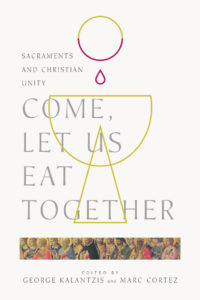 Come Let Us Eat Together: Sacraments and Christian Unity edited by George Kalantzis and Marc Cortez (IVP Academic) $26.00 This is one of the books I was most happy to see this year and sad that I haven’t found time to study it much. It is one of the annual books IVP Academic releases — thanks be to God for their publishing savvy and integrity! — that comes from an annual theology conference at Wheaton College. This book nicely offers the papers and panels and keynotes and sermons from the previous years event on unity within the Body of Christ, especially around our differing view of sacraments. (By the way: last year’s Wheaton conference was on Marilyn Robinson, so the forthcoming volume that IVP will release will be among the most eagerly anticipated books of 2019!)
Come Let Us Eat Together: Sacraments and Christian Unity edited by George Kalantzis and Marc Cortez (IVP Academic) $26.00 This is one of the books I was most happy to see this year and sad that I haven’t found time to study it much. It is one of the annual books IVP Academic releases — thanks be to God for their publishing savvy and integrity! — that comes from an annual theology conference at Wheaton College. This book nicely offers the papers and panels and keynotes and sermons from the previous years event on unity within the Body of Christ, especially around our differing view of sacraments. (By the way: last year’s Wheaton conference was on Marilyn Robinson, so the forthcoming volume that IVP will release will be among the most eagerly anticipated books of 2019!)
Come Let us Eat Together is not as fun and funny and curiously charming as the above mentioned invitation to flexible faith, and it may not be a big seller, which is all the more reason we want to honor it here, now. We dare not be glib about the brokenness of Christ’s church and perhaps studying these chapters by classic Protestant, Roman Catholic, and Eastern Orthodox theologians, who consider what it means to proclaim the unity of the body of Christ in light of the sacraments, will help.
These essays offer unflinching honest, surprising humor, keen insight, and possible ways forward as they wrestle with hard questions about why Christian are and remain divided over what should unite us: the sacraments of baptism and the Lord’s Supper . James R Payton, Redeemer University College
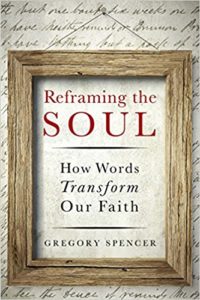 Reframing the Soul: How Words Transform Our Faith Gregory Spencer (Leafwood) $15.99 This is one of the great, notable books of 2018 and because it is on a smaller publishing house my fear is that it may not be widely known. I did a long review of it last summer at BookNotes and explained it my admiration for the author and detailed the nature of the book.
Reframing the Soul: How Words Transform Our Faith Gregory Spencer (Leafwood) $15.99 This is one of the great, notable books of 2018 and because it is on a smaller publishing house my fear is that it may not be widely known. I did a long review of it last summer at BookNotes and explained it my admiration for the author and detailed the nature of the book.
Here is one small part of that review:
On the back cover of Reframing the Soul we get a glimpse of what Spencer is up to when he tells of “four essentials of the soul.”
- Remembering the past with gratitude
- Anticipating the future with hope
- Dwelling within ourselves in peace
- Engaging with others in love
There are the four main units of this book. After several opening chapters he gets to these four chief tasks (remembering, anticipating, dwelling, engaging) but the opening four chapters are worth the price of the book. And they are memorable – “Every Word a Window,” “There Is No Immaculate Perception,” “Order, Order, Everywhere,” and “When You Frame Your Life, What’s in the Picture?”
Then Spencer opens up the discussions about how new words can reframe and set us free from less than life-giving, less-than-adequate perceptions. Please note, this is not some technique like “neuro-linguistic programming” nor some name-it-and-claim it nonsense about positive confession. It is wise and nuanced council about reframing our stories based on how we choose to tell those stories, inspired, as we can be, by Biblical truths and spiritual discernment.
I know some of our customers rightly adore the book To Be Told: God Invites You to Co-Author Your Future by Dan Allender, who also reminds us to reframe our past and present to get to a renewed future. This new Reframing the Soul book by Gregory Spencer is worth having and highly recommended for those wanting a very impressive read about “navigating reality with grace and truth.” And hope.
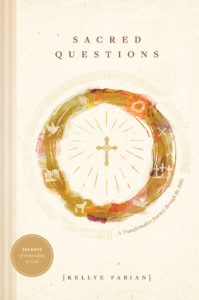 Sacred Questions: 365 Days of Responding to God Kellye Fabian (NavPress) $22.99 Every year there are very nice devotionals and some years there are extraordinary ones released. Certainly 2018 was a banner year, with a small one from the late Eugene Peterson on key Old Testament texts (Every Step an Arrival: A 90-Day Devotional for Exploring God’s Word; Waterbrook Press; $14.99) and, of course, God’s Wisdom for Navigating Life: A Year of Daily Devotions in the Book of Proverbs by Tim and Kathy Keller (Viking; $20.00) which many folks used all year long, just like they used their wonderful book devotional on Psalms the year before.
Sacred Questions: 365 Days of Responding to God Kellye Fabian (NavPress) $22.99 Every year there are very nice devotionals and some years there are extraordinary ones released. Certainly 2018 was a banner year, with a small one from the late Eugene Peterson on key Old Testament texts (Every Step an Arrival: A 90-Day Devotional for Exploring God’s Word; Waterbrook Press; $14.99) and, of course, God’s Wisdom for Navigating Life: A Year of Daily Devotions in the Book of Proverbs by Tim and Kathy Keller (Viking; $20.00) which many folks used all year long, just like they used their wonderful book devotional on Psalms the year before.
I liked Kellye Fabian’s in part because it was arranged with so many good questions, inviting a pondering about the text and its application. It isn’t quite lectio but it does invite readers into this practice of a close reading and attending to questions that arise from the text. I think this stimulates the mind and enlarges the heart as readers “learn how to partner with God and live the full, free, and other-centered life Jesus offers.” Ms. Fabian holds a certificate of spiritual formation through Ruth Haley Barton’s Transforming Center and has studied with Scot McNight at Northern Seminary. This is a handsome hardback, just shy of 500 pages.
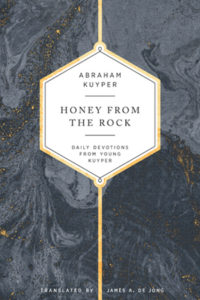 Honey From the Rock: Daily Devotions from Young Kuyper Abraham Kuyper (Lexham Press) $39.99 I very much want to honor this remarkable new release — sweet devotional meditations from the brilliant and legendary Dutch theologian cum social reformer cum statesman that, as far as I know, have never before been translated into English. Like the other big, hefty, well-crafted and helpfully annotated volumes coming out in the Kuyper Translation Project, it should be considered a publishing event to have this content released to the English-speaking world. And what a treasure this is, revealing again a side of himself that may not be as obvious in his theological work or his cultural analysis. (The Kuyper Translation Project, capably overseen by Melvin Flikkema & Jordan Ballor, has released oversized hardbacks of Kuyper’s work on public theology, common grace, politics, Islam, and has volumes coming out on topics such as education, economics, and justice.) Still, Kuyper religiously wrote weekly meditations, even in his most harried days as Prime Minister. He continued this practice up until his death in 1920. These newly released reflections, freshly translated by James De Jong, arose from the 1870s or so. (They were originally published and beloved a century ago in two volumes in Dutch.)
Honey From the Rock: Daily Devotions from Young Kuyper Abraham Kuyper (Lexham Press) $39.99 I very much want to honor this remarkable new release — sweet devotional meditations from the brilliant and legendary Dutch theologian cum social reformer cum statesman that, as far as I know, have never before been translated into English. Like the other big, hefty, well-crafted and helpfully annotated volumes coming out in the Kuyper Translation Project, it should be considered a publishing event to have this content released to the English-speaking world. And what a treasure this is, revealing again a side of himself that may not be as obvious in his theological work or his cultural analysis. (The Kuyper Translation Project, capably overseen by Melvin Flikkema & Jordan Ballor, has released oversized hardbacks of Kuyper’s work on public theology, common grace, politics, Islam, and has volumes coming out on topics such as education, economics, and justice.) Still, Kuyper religiously wrote weekly meditations, even in his most harried days as Prime Minister. He continued this practice up until his death in 1920. These newly released reflections, freshly translated by James De Jong, arose from the 1870s or so. (They were originally published and beloved a century ago in two volumes in Dutch.)
Honey From the Rock is to be celebrated because of its warm piety (think of his wonderful collection of meditations Near Unto God) but this release is of historical value, too, because, as the widely-read Albert Mohler puts it, “Imagine opening a collection of meditations by the young Augustine, a young Martin Luther, or John Calvin… Here are the devotional thoughts of one of the most significant Protestant thinkers of the last 150 years from the most formative period of his life. This treasure is both timeless and timely.”
Of course, Richard Mouw has a blurb on the back, saying:
I have been reading Kuyper’s Near Unto God collection of meditations for decades — so much so that I wore out my first copy. He is my favorite devotional writer. And now this wonderful collection of 200 more. I hope all who have come to appreciate Kuyper’s writings on politics and culture in recent years will now taste the spiritual sweetness of Honey from the Rock.
One word of protest: this book should not have been published as an oversized, expensive hardback (although it is very nice.) Who wants to hold an immense volume the size of a dictionary in their morning or evening devotions? Who can shell out this kind of cash for a devotional? I suppose Lexham or the Translation Society wanted this to handsomely fit on a shelf with the other oversized Kuyper hardbacks, but this is a foolish mistake. Can we award it next year as the best paperback re-issue with a handsome, inexpensive cover? This lovely book is worth marketing widely and it is bad stewardship to not make it affordable and widely distributed. For those who already see themselves as Kuyperians, though, Honey from the Rock is a worthy, wonderful investment and I hope and pray that it sells well.
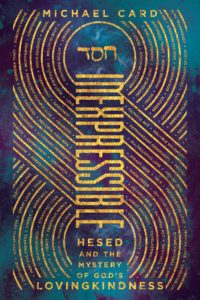 Inexpressible: Hesed and the Mystery of God’s Lovingkindness Michael Card (IVP) $16.00 . Mike is a good, good guy, a thoughtful poet, and good writer, a fabulous singer-songwriter, recording artist, and serious scholar of the Scriptures. This book came out the last weeks of December and we wondered if anyone would notice it amidst the best-sellers and holiday glitz. A number of our local friends picked it up and more than one person raved about it within days! It is nice study of God’s identity, beyond what we can imagine, let alone express in human words. But, as Card explains, “Scripture uses one particular word to describe the distinctiveness of God’s character: the Hebrew word hesed.”
Inexpressible: Hesed and the Mystery of God’s Lovingkindness Michael Card (IVP) $16.00 . Mike is a good, good guy, a thoughtful poet, and good writer, a fabulous singer-songwriter, recording artist, and serious scholar of the Scriptures. This book came out the last weeks of December and we wondered if anyone would notice it amidst the best-sellers and holiday glitz. A number of our local friends picked it up and more than one person raved about it within days! It is nice study of God’s identity, beyond what we can imagine, let alone express in human words. But, as Card explains, “Scripture uses one particular word to describe the distinctiveness of God’s character: the Hebrew word hesed.”
This is part semi-academic study, part devotional, part memoir of how this author came to be so deeply moved by this deep, multi-dimensional meaning of hesed and of the great God who reflects such loving fidelity. Of course, he helpfully reminds us that the fullness of hesed is embodied in the incarnation of Jesus, the God of hesed made flesh.
Can we be transformed as we ourselves become marked by compassion, mercy, faithfulness? This book will help. Inexpressible is a beautiful, powerful read. Kudos.
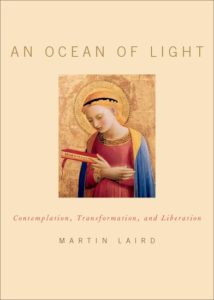 An Ocean of Light: Contemplation, Transformation, and Liberation Martin Laird (Oxford University Press) $18.95 I have not read this yet but many people I deeply trust have commended Laird’s first two, Into the Silent Land and A Sunlit Absence. These mixed metaphors and allusive titles should be a clue that these rich and deep. The handsome covers makes you want to hold these small hardbacks and take in their beauty. Blurbs on this much anticipated work are by Sarah Caokley, Carol Zaleski, and the former Archbishop of Canterbury, Rowan Williams (who commends it for resisting “verbiage, mystification and sentimentality”) and who says it is “both intensely challenging and enriching.”
An Ocean of Light: Contemplation, Transformation, and Liberation Martin Laird (Oxford University Press) $18.95 I have not read this yet but many people I deeply trust have commended Laird’s first two, Into the Silent Land and A Sunlit Absence. These mixed metaphors and allusive titles should be a clue that these rich and deep. The handsome covers makes you want to hold these small hardbacks and take in their beauty. Blurbs on this much anticipated work are by Sarah Caokley, Carol Zaleski, and the former Archbishop of Canterbury, Rowan Williams (who commends it for resisting “verbiage, mystification and sentimentality”) and who says it is “both intensely challenging and enriching.”
Rowan Williams continues:
His writing on this subject is simply in a different league of seriousness from most other books on ‘spiritual’ practice.
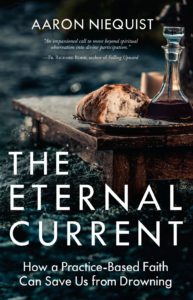 The Eternal Current: How a Practice-Based Faith Can Save Us From Drowning Aaron Niequist (Waterbrook) $19.99 Books on contemplative practices and monastic spiritual disciplines and a more centered sort of spirituality keep coming out and our shelves in that category are bulging. There’s a lot of good stuff on various kinds of spiritual practices and many are wonderful. Some are more Christ-centered and Biblically-oriented then others, but many, many help people focus on their interior lives and find God’s presence in the midst of their daily lives. However, every now and then one comes along that seems truly fresh, different, passionate, and which resonates with me. This is one of those.
The Eternal Current: How a Practice-Based Faith Can Save Us From Drowning Aaron Niequist (Waterbrook) $19.99 Books on contemplative practices and monastic spiritual disciplines and a more centered sort of spirituality keep coming out and our shelves in that category are bulging. There’s a lot of good stuff on various kinds of spiritual practices and many are wonderful. Some are more Christ-centered and Biblically-oriented then others, but many, many help people focus on their interior lives and find God’s presence in the midst of their daily lives. However, every now and then one comes along that seems truly fresh, different, passionate, and which resonates with me. This is one of those.
I think this is one of the most interesting books I read all year, and one I grew increasingly enamored with. You can read my previous comments an at older BookNotes, but I’ll just note that he uses the “river” motif, and it is a healing River, “ushering in the healing and restoration of all things.” Jesus called this river “The Kingdom of God” and invited us to enter it. Niequist says that Jesus’s call to “follow me” could be interpreted as an invitation to learn to swim in this Eternal Current. The invitation is participation.
That is what he means by a “practice-based faith” which is more than merely proper belief. We must be swept into God’s redemptive work in our lives and in the world. “We can move from the dry riverbed of static faith into the gushing Current of a practice-based faith.” So, yes, this engaging and creatively written book offers a vision and a set of practices for deeper discipleship, lived, experienced faith, spiritual formation that goes beyond some tribal sort of certainty and into the bigger mystery of belonging to Christ and being involved in His work.
I like this trans-rational (not-irrational, of course) view, that faith is more than intellectual ideas or cognitive assent. And, I am glad that Niequist always remind us that the River is for the sake of the world. HIs notion that church is a gymnasium (chapters 4 and 5) that affirms and trains us as we gather (and so, chapter 6 is called “Sunday is Not the Main Event”) is worth the price of the book. I’m fond of any book that has a chapter on ecumenism (“We Need Everybody”) and community (“We Can’t Do It Alone.”) His showing these important insights in this creative a language that moves increasingly outward towards mission is right on. His reminder of the role of imagination as we “reintegrate everything” is a beautiful benediction of a provocative and energizing book. I hope you, too, find it one of the more stimulating titles you’ve read in quite a while.
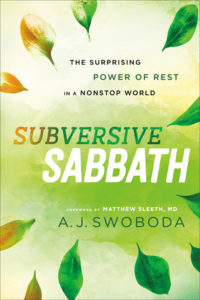 Subversive Sabbath: The Surprising Power of Rest in a Nonstop World A.J. Swoboda (Brazos Press) $19.99 This is another one that I hope you saw our long review at BookNotes. Even as I was describing it back then, I knew it was a contender for one of the very Best Books of 2018. It is comprehensive, interesting, theological, Biblical, and practical. It offers insight about keeping Sabbath, of course, but also offers broader guidance about the necessity of (our our reluctance to) rest. Importantly, it moves to how such nay-saying to busyness — “ceasing” is a word Marva Dawn used in her late ’80s, seminal Keeping the Sabbath Wholly — is, as the title says and he really means, subversive. There are idols and bad habits and dysfunctions in the world and our health and our very lives (not to mention our Kingdom loyalties) depends on resisting them. There is great power in saying no and keeping Sabbath and living within its rhythms can undo the grip of consumerism and workaholism and pride and violent.
Subversive Sabbath: The Surprising Power of Rest in a Nonstop World A.J. Swoboda (Brazos Press) $19.99 This is another one that I hope you saw our long review at BookNotes. Even as I was describing it back then, I knew it was a contender for one of the very Best Books of 2018. It is comprehensive, interesting, theological, Biblical, and practical. It offers insight about keeping Sabbath, of course, but also offers broader guidance about the necessity of (our our reluctance to) rest. Importantly, it moves to how such nay-saying to busyness — “ceasing” is a word Marva Dawn used in her late ’80s, seminal Keeping the Sabbath Wholly — is, as the title says and he really means, subversive. There are idols and bad habits and dysfunctions in the world and our health and our very lives (not to mention our Kingdom loyalties) depends on resisting them. There is great power in saying no and keeping Sabbath and living within its rhythms can undo the grip of consumerism and workaholism and pride and violent.
This is a topic that is urgent, a book that is exceptional, and if you don’t have time to read it, you know you need it. We think that Subversive Sabbath is is one of our favorite books of the year, one we are happy to commend and that we hope is enduring among the other good books on the topic. Thanks to A.J. for doing so much work on this and for being so artful and inspiring as a writer. Good job.
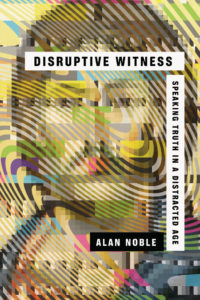 Disruptive Witness: Speaking Truth in a Distracted Age Alan Noble (IVP) $16.00 In just a few weeks we will finally get to meet Alan Noble, a professor of English and editor of the very cool Christ and Pop Culture online journal, who will be speaking at the CCO’s annual Jubilee conference in Pittsburgh. I will applaud him personally for writing one of the best books of 2018 and thank him for creating a book that became one of store’s best sellers. It’s the kind of thoughtful but readable book we are so glad to sell. He has written for the Atlantic, Vox, Buzzfeed, Christianity Today, First Things and The Gospel Coalition. We’ve been facebook friends for years, and he really gets around. I say this not only to assure you he’s a good good guy, but to suggest that even though this is a critique of our hot-wired, fast-paced, digital lives that yield distraction and worse, he is no “Benedict Option” advocate, not one who has escaped the world of media and popular culture. He is trying hard to that noble view of being in-but-not-of as Jesus said.
Disruptive Witness: Speaking Truth in a Distracted Age Alan Noble (IVP) $16.00 In just a few weeks we will finally get to meet Alan Noble, a professor of English and editor of the very cool Christ and Pop Culture online journal, who will be speaking at the CCO’s annual Jubilee conference in Pittsburgh. I will applaud him personally for writing one of the best books of 2018 and thank him for creating a book that became one of store’s best sellers. It’s the kind of thoughtful but readable book we are so glad to sell. He has written for the Atlantic, Vox, Buzzfeed, Christianity Today, First Things and The Gospel Coalition. We’ve been facebook friends for years, and he really gets around. I say this not only to assure you he’s a good good guy, but to suggest that even though this is a critique of our hot-wired, fast-paced, digital lives that yield distraction and worse, he is no “Benedict Option” advocate, not one who has escaped the world of media and popular culture. He is trying hard to that noble view of being in-but-not-of as Jesus said.
Yet, he’s astute — more than most — about the pressures of modernity and the temptations of the modern age (and he shares candidly about this in the book in ways that will make you nod your head.) In this he has learned from Charles Taylor and the first half of this book “The Distracted, Secular Age” draws on Taylor and adds his own unique concerns about the barriers of endless distraction and the confusions of our identity (and what Charles Taylor calls “the buffered self.”) He says we are all seeking better visions of fullness, and to this complicated world we must bear a disruptive witness. Part Two shows us how to do that.
There are habits to disrupt the distraction that we must learn and practice and these must be embodied in our own lives, encouraged in our churches, and that should shape our cultural participation (our tone and texture and style and attitude, not just what content we do or don’t promote.) In many ways, McLuhan’s “the medium is the message” is a truism we must grapple with and Noble helps us think that through and equips us to “disrupt our society’s deep-rooted assumptions and point beyond them to the transcendent grace and beauty of Jesus.”
This is a book well worth reading carefully and slowly and talking about with others. I hope you can find a few good and honest friends to work through the distractions in our lives and how to disrupt them. This isn’t a cheap “just say no” to technology or busyness or secularism or a scolding to be more bold for Christ. It is a deep level study of the forces and ethos and practices of our technological age and a good, healthy, redemptive framework for standing a chance at not be done in by it all. At the end of the day (although I am a bit reluctant to sell short a nearly 200 page book with a quick summary) this invites us to slow down and pay attention and ponder and consider things. As we learn to attend to the world around us and read and pray and think, we can see that transcendence is more plausible than the secular age admits, more available than our fast-paced lives seem to permit. So settle down, folks, resist the disruption. Along with Swoboda’s Subversive Sabbath practices [see above], and armed with this insightful cultural analysis, we really can speak truth in a a distracted age.
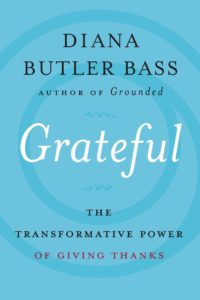 Grateful: The Transformative Power of Giving Thanks Diana Butler Bass (HarperOne) $26.99 I regularly promote books from denominational perspectives and faith traditions and experiences that are not my own. Obviously — what bookseller only promotes the books that fully reflects their own denomination and life? We here at Hearts & Minds, are, in fact, deeply grateful for the opportunity to read widely, taking in books and insights and strengths from others with whom we may disagree. I don’t know why I write this, now, leading in to our celebration of Diana’s good book because there is very little I disagree with here. It’s just that she is situated as a nationally-known critic of establishment religion, hard on conservative denominations, and always prophetic even in challenging her own progressive Episcopalian faith communities. She pushes churches to embrace new ways of thinking about faith that are sensible to the growing “spiritual but not religious” crowd and insists that an inclusive, generous faith is not only most reflective of the God who is revealed in Jesus of Nazareth but also most effective in resonating with the post-Christian milieu of our days. I don’t always see it like that, but I read anything she rights and am grateful for her work, her words, her friendship.
Grateful: The Transformative Power of Giving Thanks Diana Butler Bass (HarperOne) $26.99 I regularly promote books from denominational perspectives and faith traditions and experiences that are not my own. Obviously — what bookseller only promotes the books that fully reflects their own denomination and life? We here at Hearts & Minds, are, in fact, deeply grateful for the opportunity to read widely, taking in books and insights and strengths from others with whom we may disagree. I don’t know why I write this, now, leading in to our celebration of Diana’s good book because there is very little I disagree with here. It’s just that she is situated as a nationally-known critic of establishment religion, hard on conservative denominations, and always prophetic even in challenging her own progressive Episcopalian faith communities. She pushes churches to embrace new ways of thinking about faith that are sensible to the growing “spiritual but not religious” crowd and insists that an inclusive, generous faith is not only most reflective of the God who is revealed in Jesus of Nazareth but also most effective in resonating with the post-Christian milieu of our days. I don’t always see it like that, but I read anything she rights and am grateful for her work, her words, her friendship.
Which is where I’m going with this: I am deeply grateful for this book, Grateful, and am glad to honor it as one of the Best Books of 2018. I certainly was one I enjoy immensely, even if it tweaked me in hard ways, in painful places. How can we be grateful in these awful days of political divisiveness and social injustice and a President I cannot be grateful for. When black men are gunned down by white policeman, when otherwise good Christian people stimulate hateful attitudes towards refugees and the homeless, when the planet groans so loudly even as we cut funding for agencies designed to steward our natural resources, when marriages fail and cancer strikes, how in the hell are we supposed to be grateful? I resist glib bromides of counting your blessings and Hallmark sentiments about serenity. I know it is extraordinarily radical, but I find John Piper’s Lewis-esque call to joy somehow amiss, unless accompanied (as it often is in Piper) by tears of lament.
And so, I am grateful for Grateful as it is one of the few authors who I would trust to walk us through this joy-producing, generous, beautiful spiritual discipline. Diana starts the book noting that she wrote this in part as a way to cope with her own frantic worry over the election of Donald Trump and her horror at the casual way some accept his jokes about sexual assault, off-handed racism, and celebration of greed and glitz. As a historian, she was well equipped to get us beyond “cheap gratitude” (a brilliant line she offers in the prologue.) As one skilled in the social sciences, she uses as another point of departure two seemingly contradictory recent surveys of the mood of Americans and I appreciate her blend of personal anecdotes, historical insight, and up-to-date social analysis. Grateful: The Transformative Power of Giving Thanks has become my favorite book on the subject in part because of this big picture lens and how she moves us towards the civic implications of a conscientious commitment to thankfulness.
We are not alone in honoring this interesting and helpful book. There is a lovely blurb on the back by Shauna Niequist, a thoughtful evangelical, James Martin, the best-selling and widely respected Jesuit, “Science Mike” McHargue (who calls it “a calming voice in raging cultural seas.”) Her friend Brian McLaren loves it, as does the non-Christian writer Marianne Williamson (who says, alluding to Julian, “her words are a gentle but fierce reminder that on some eternal level , all is well.”
Listen to Rev. Jacqueline Lewis, co-author of The Pentecost Paradigm and senior minister at Middle Collegiate Church in New York:
Grateful will soften the lens through which you look at the people in your life, and the whirling world around us all. It’s a spoonful of honey to help us transform the ‘hard’ in our lives into wisdom, compassion, and even resistance.
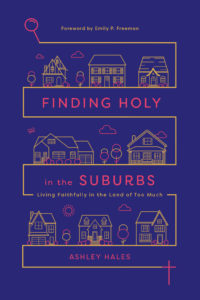 Finding Holy in the Suburbs: Living Faithfully in the Land of Too Much Ashley Hales IVP) $16.00 Anyone who has heard any of the conversations about James K.A. Smith’s You Are What You Love (a nice one-volume summary of his bigger “cultural liturgy” trilogy) or the wonderful book by Tish Warren (Liturgy of the Ordinary) you will immediately resonate with a book that says, in bold type on the back, “Places Form Our Loves.” That is, the ordinary, daily stuff of our material lives, our comings and goings, form in us habits and consequently values and dispositions, which reinforce a certain kind of living, a lifestyle. For better or worse, we are what we love and our loves, our desires, our imaginations of the good life, the stories we’ve been conscripted into, inform and shape our daily life. And our view of discipleship and service and church and God. All this stuff — our views of faith and life — are what the scholars call pre-theoretical. Our hearts, informed by stories and actual landscapes, shape our minds. We don’t “think” our way to holiness, as I’ve heard Smith say.
Finding Holy in the Suburbs: Living Faithfully in the Land of Too Much Ashley Hales IVP) $16.00 Anyone who has heard any of the conversations about James K.A. Smith’s You Are What You Love (a nice one-volume summary of his bigger “cultural liturgy” trilogy) or the wonderful book by Tish Warren (Liturgy of the Ordinary) you will immediately resonate with a book that says, in bold type on the back, “Places Form Our Loves.” That is, the ordinary, daily stuff of our material lives, our comings and goings, form in us habits and consequently values and dispositions, which reinforce a certain kind of living, a lifestyle. For better or worse, we are what we love and our loves, our desires, our imaginations of the good life, the stories we’ve been conscripted into, inform and shape our daily life. And our view of discipleship and service and church and God. All this stuff — our views of faith and life — are what the scholars call pre-theoretical. Our hearts, informed by stories and actual landscapes, shape our minds. We don’t “think” our way to holiness, as I’ve heard Smith say.
So. Given all this — Smith tells how the world’s values shape our desires by the cultural liturgies we imbibe and Warren shows how worship liturgies in her church help her find God in the ordinary stuff of daily life — how does Ashely Hales fit in? Why recall all this wordy backstory?
Well, Hales herself rehearses just a bit of this and one can see that she’s done good homework in thinking deeply about the sociology of our times, how hearts and habits work, how somehow the places we find ourselves shape us. She is wiser than most and careful about her consideration of her themes. As one reviewer put it, her writing is fierce, but has another put it, she writes with “poignant clarity.”
And she has a sense of wit about it since she did a few promo videos about this book from inside her Southern California min-van. Ha.
What do tract homes, strip malls, commuter culture and what Joni Mitchell called “The Hissing of Summer Lawns” have to do with our desire for God’s holiness in our lives? How do we see God’s ways — including solidarity with the poor and being agents of a multi-ethnic Kingdom — when one lives in the suburbs? How does this space — literally, the built environment, the culture of habits and lifestyles — effect our interior lives and our public discipleship? Hales helps us explore all of this and more. And did I say she does it with grace and wit?
She is a mother of four and a pastor’s wife. She has a PhD in English ffrom Edinburgh, so she’s no simple armchair critic. It is pretty easy for cynical hipsters or old-time hippies or Wendell Berry-esque back to the landers or even what David Brooks calls BOBOs (“bourgeois bohemians”) to criticize the bland if busy suburbs. Tons of films righteously mock the alleged emptiness of the ‘burbs. I love the hyper-critical James Howard Kunstler (you have to read The Geography of Nowhere and Home from Nowhere) but I’m glad to see an evangelical author writing about holiness start with the headline, “A Story To Find Home in the Geography of Nowhere.”
Can we do that, find true home in this odd sort of placeless place? And if so, what does holiness and healthy spirituality look like in this “land of too much”?
(And might it connect to the really heavy themes presented in one of my favorite books Beyond Homelessness: Christian Faith in a Culture of Displacement by Brian Walsh & Steven Bouma-Prediger which explores how some people, even of those of great means, may have houses but not homes.)
Ashely Hales is a fine guide into these questions and any book that gets us thinking in these ways is deserving of a ‘burg-sized award. Her chapter titles are exceptionally interesting. Her footnotes are extraordinary — she quotes Scott Russel Saunders’ Staying Put and Marlena Graves’ A Beautiful Disaster and that great book by Sarah Arthur and Erin Wasinger called The Year of Small Things and Andy Crouch’s Strong and Weak and Jen Pollock Michel’s Keeping Place. She deserves another award just for that. She has a fine eye for detail in a well told story and she obviously knows some of the best Christian writers with whom she is in dialogue. The result is a feast of a book, helpful, wise, challenging, inspiring. It is one of my favorite books fo 2018.
Hales isn’t the first to write from a Christian perspective about this incarnational sense of place in the ‘burbs. Over ten years ago Dave Goeetz (who has a lovely blurb on the back) wrote Death By Suburb: How to Keep the Suburbs from Killing Your Soul and Albert Hsu wrote the very good The Suburban Christian: Finding Spiritual Vitality in the Land of Plenty. They are both valuable and we recommend them, but this new one by Hales is by far the best evangelical book yet about this world of SUVs and soccer moms, of back decks and cul-de-sacs, of granite countertops and gated communities. And through it all she invites us to reflect on our own brokenness, to find healing and hope wherever we find ourselves, to seek God’s holiness and serve Christ’s kingdom of justice and reconciliation. As Seth Haines put it, “Ashley is the rare sort of writer, imaginative yet concrete, prophetic yet gentle. She only cuts where she can bring healing.” This is a very interesting little book.
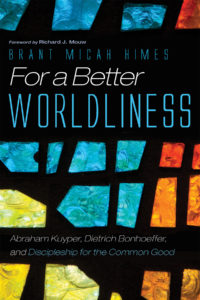 For a Better World: Abraham Kuyper, Dietrich Bonhoeffer, and Discipleship for the Common Good Brant Micah Himes (Pickwick Publications) $28.00 I just grinned when I saw this, got so excited, because many folks know Bonhoeffer but fewer know the Dutch theologian, journalist, politician, educator who lead a revival in late 1800s Holland under the banner of the Lordship of Christ over all of life and creating a pluralistic culture where all worldviews are treated fairly. His piety and justice and structural (“archetectonic” some say) drove this giant of a man, and yet few know him. We can be glad for Brant Himes (a Humanities prof at Azusa Pacific and a managing editor for the theological journal Resonance) for pulling of this judicious study. Ken Wytsma (of the Justice Conferences) says For a Better Worldliness “is one of the most intriguing books I’ve run across in a long time.”
For a Better World: Abraham Kuyper, Dietrich Bonhoeffer, and Discipleship for the Common Good Brant Micah Himes (Pickwick Publications) $28.00 I just grinned when I saw this, got so excited, because many folks know Bonhoeffer but fewer know the Dutch theologian, journalist, politician, educator who lead a revival in late 1800s Holland under the banner of the Lordship of Christ over all of life and creating a pluralistic culture where all worldviews are treated fairly. His piety and justice and structural (“archetectonic” some say) drove this giant of a man, and yet few know him. We can be glad for Brant Himes (a Humanities prof at Azusa Pacific and a managing editor for the theological journal Resonance) for pulling of this judicious study. Ken Wytsma (of the Justice Conferences) says For a Better Worldliness “is one of the most intriguing books I’ve run across in a long time.”
Rich Mouw wrote a lovely introduction reminding us that the very word “discipleship” means different things to different folks (and Kuyper didn’t use the word much, as such) so Hime’s helps us all learn a bit more about what the word might entail and what disciple may mean — along the way we all learn about following Jesus, about public life, about the common good. Kuyper served as Prime Minister of the Netherlands and Bonhoeffer famously inhabited a dank prison cell, so they led very different lives, on different sides of the experience of power and prestige. (Both visited America, by the way: Kuyper was hosted a the White House and then travelled among Dutch immigrant communities after lecturing at Princeton and Bonhoeffer studied in New York but worshiped in a black church in Harlem, which was pivotal for him.)
For anyone interested in how devout faith, learned theology, and a robust understanding of public life can effect our discipleship, this rare is well worth working through. For those of us who are fans of either Kuyper on Bonhoeffer, it is a must.
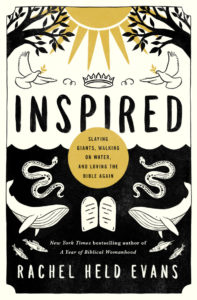 Inspired: Slaying Giants, Walking on Water, And Loving the Bible Again RachelHeld Evans (Thomas Nelson) $16.99 I loved this book for a bunch of reasons and knew that I’d want to recommend it to those who want a good read about a woman coping with the difficulties in the Bible, the violence and genocide and brutality and confusion. She was raised as a super-duper evangelical, was a leader in her youth ministry, a witness in her high school, and happily enjoyed the Bible that was such a big part of her families life. As she grew into different phases of how she used the Bible, things slowly eroded until in her twenties she became disillusioned and frustrated. She has told some of this story elsewhere and she tells it well. For anyone interested in faith development (or re-development) her stories about leaving fundamentalism, about coping with the Bibles teachings about women, about finding a church more suited to her longings, her several books will provide insight and solace. And they are interesting and funny.
Inspired: Slaying Giants, Walking on Water, And Loving the Bible Again RachelHeld Evans (Thomas Nelson) $16.99 I loved this book for a bunch of reasons and knew that I’d want to recommend it to those who want a good read about a woman coping with the difficulties in the Bible, the violence and genocide and brutality and confusion. She was raised as a super-duper evangelical, was a leader in her youth ministry, a witness in her high school, and happily enjoyed the Bible that was such a big part of her families life. As she grew into different phases of how she used the Bible, things slowly eroded until in her twenties she became disillusioned and frustrated. She has told some of this story elsewhere and she tells it well. For anyone interested in faith development (or re-development) her stories about leaving fundamentalism, about coping with the Bibles teachings about women, about finding a church more suited to her longings, her several books will provide insight and solace. And they are interesting and funny.
But we must ask — she her self asks — where is this all heading? What do we do with the Bible even if we try to read it in a less legalistic manner, if we become friends with helpful critics (such as, say, Pete Enns, whose own works have influenced Rachel a bit.) What if we love the stories and still want to hear God’s voice through them?
She is haunted by God, loves the Bible, can’t get away from her sense that it is deeply true and has a claim on her. How do you fall in love with the Bible after you’ve deconstructed and maybe discarded some of it?
Inspired is the inspired story of her journey back to loving the Bible again. She has some clever and creative paraphrases of a few sections of Scripture that some will love. She shares plenty of memoir-ish narrations, stories about her own ups and downs and those of us who like that kind of reflective auto-biographical writing will love it. And then there is the heart of the book — nicely and honestly written, weaving between Biblical exegesis, Biblical storytelling and memoir — where Evans explores various themes within the Holy Book. These have chapter headings such as Origin Stories, Deliverance Stories, War Stories, Wisdom Stories, Resistance Stories, Gospel Stories, Fish Stories, and Church Stories. There are all very, very interesting and really helpful, especially for those needing some handles on how to properly appreciate what is going on in the text — no, what is really going on.
You can decide if it is adequately faithful, if her comments bear good fruit. She does not disguise her anguish about some of the awful stuff, and for that we should all be glad — this is, finally, I think, respectful to God’s Word, taking it seriously. If one is not troubled by some of the stuff we see in the Bible, there is something wrong with us, she says, and I think she is on to something. But, agree or not with every comment, snarky or earnest, pained or joyful, critical or grateful, there is a lot here for anyone who loves the Scriptures and loves to hear how other people understand them. This was one of my favorite books of the year.
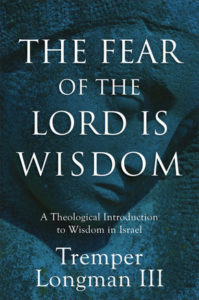 The Fear of the Lord Is Wisdom: A Theological Introduction to Wisdom in Israel Tremper Longman III (BakerAcademic) $32.99 Tremper Longman is one of those scholars who can write popular level guides like How to Read Proverbs and partner with his psychologist pal Dan Allender offering sturdy Biblical content for titles like God Loves Sex. And then he does these books that, for another scholar, might be an admirable life’s work. That Longman has other such major works is remarkable and this one, surely, deserves accolades for one of the best books in the field of Old Testament studies published this past year.
The Fear of the Lord Is Wisdom: A Theological Introduction to Wisdom in Israel Tremper Longman III (BakerAcademic) $32.99 Tremper Longman is one of those scholars who can write popular level guides like How to Read Proverbs and partner with his psychologist pal Dan Allender offering sturdy Biblical content for titles like God Loves Sex. And then he does these books that, for another scholar, might be an admirable life’s work. That Longman has other such major works is remarkable and this one, surely, deserves accolades for one of the best books in the field of Old Testament studies published this past year.
This book is comprehensive, readable, smart and faithful. He examines both cultural and canonical evidence to show wisdom’s enduring theological significance. In our postmodern time, he observes, this is particularly valuable and it is an urgent task to recover a sense of Biblical wisdom as a theological category. My deeper interest was piqued in the preface when he suggests that he (unlike authors I appreciate like William Brown, for instance) doesn’t think it is helpful to designate a certain genre of OT writings as “wisdom” literature as such. Wow. It is, to put in more simply than I should, less a literary genre and more of a theological virtue. Which is to say you find wisdom in places other than Proverbs and Ecclesiastes.
Others rave, too, so I think I’m on solid ground award this; scholars like Carol Kaminski say it is written with “masterful elegance” and John Goldingay says Longman’s book is “balanced and informative.” This demands to be placed on your bookshelf next to Old Testament Wisdom Literature the grand book by Craig Bartholomew and Ryan O’Dowd. Highly recommended.
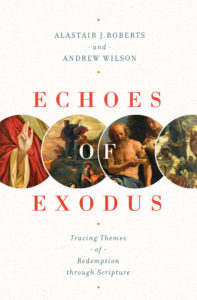 Echoes of Exodus: Tracing Themes of Redemption Through Scripture Alastair Roberts & Andrew Wilson (Crossway) $17.99 I am always on the look-out for books that are rooted in serious scholarship but are not aimed at the academic guild. I am always on the look-out for books that help Bible readers, Sunday school classes, Bible study groups, preachers and teachers see the inter-connection between Old and New Testaments, using what some call the “historical redemptive” method of capturing not just the echoes and allusions between texts but in themes and motifs as the Biblical drama unfolds in a series of promises and fulfillments. This little book, by authors with PhDs from prestigious places, who are hip podcasters and clever writers, offers a serious-minded, warm-hearted exploration of how the exodus story not only stands as a pivotal event in the Old Testament but as a rich source for talking about redemption throughout the whole Bible. As such, it is one of the best books of its kind this year.
Echoes of Exodus: Tracing Themes of Redemption Through Scripture Alastair Roberts & Andrew Wilson (Crossway) $17.99 I am always on the look-out for books that are rooted in serious scholarship but are not aimed at the academic guild. I am always on the look-out for books that help Bible readers, Sunday school classes, Bible study groups, preachers and teachers see the inter-connection between Old and New Testaments, using what some call the “historical redemptive” method of capturing not just the echoes and allusions between texts but in themes and motifs as the Biblical drama unfolds in a series of promises and fulfillments. This little book, by authors with PhDs from prestigious places, who are hip podcasters and clever writers, offers a serious-minded, warm-hearted exploration of how the exodus story not only stands as a pivotal event in the Old Testament but as a rich source for talking about redemption throughout the whole Bible. As such, it is one of the best books of its kind this year.
Here is how it says it on the back cover:
Using music as a metaphor, the authors point us to the recurring theme of the exodus throughout the entire symphony of Scripture, shedding light on the Bible’s unified message of salvation and restoration that is at the heart of God’s plan for the world.
Besides this big picture of the nature of the liberation God is bringing and how there are “echoes of exodus” all over the place in the Bible, there are “review questions” and “thought questions” after each chapter, making this a great little study for small groups. I like the blurb by Matthew Harmon, a New Testament prof at Grace College and Theological Seminary who says:
The blend of rich biblical theology and beautiful writing will stir the affections of all who long for the Promised Land of the new heaven and new earth.
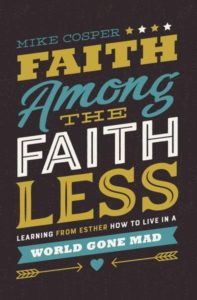 Faith Among the Faithless: Learning from Esther How to Live in a World Gone Mad Mike Cosper (Thomas Nelson) $16.99 Again, we wrote about this previously at BookNotes and raved about it for being so very interesting and applicable, a fascinating study of Christian cultural engagement based on this one provocative Bible story. I want to honor this because I like Cosper’s writing (his Rhythms of Grace is a great book on worship; Stories We Tell is a great study of movies and TV, and Recapturing the Wonder is a brilliant study of disenchantment, secularization, and the joy of curiosity as we wonder in awe at the God-drenched universe.) So when this guy directs us to a new model of faithful cultural engagement, I want to list. And wow, what a thesis: he gently pokes are often-used story of Daniel in Babylon as a model and, for reasons you will learn as you read Faith Among the Faithless, he suggests that Esther is perhaps a more fruitful model of faith in a secular age. Of course we all want to live without compromise in an increasingly hostile society. Some o f us have already given in to that society’s vision and values. Sound familiar? Of course, it’s all there in that book of the Bible that does not mention God’s name, that story of sex, ego, revenge. Agree or not with all of his views or his adaptation of the story for today, but this deserves to be known as an award-winning study for its creative and intentional application. Even in dark times God may be hidden but, Cosper assures, us, God is never absent.
Faith Among the Faithless: Learning from Esther How to Live in a World Gone Mad Mike Cosper (Thomas Nelson) $16.99 Again, we wrote about this previously at BookNotes and raved about it for being so very interesting and applicable, a fascinating study of Christian cultural engagement based on this one provocative Bible story. I want to honor this because I like Cosper’s writing (his Rhythms of Grace is a great book on worship; Stories We Tell is a great study of movies and TV, and Recapturing the Wonder is a brilliant study of disenchantment, secularization, and the joy of curiosity as we wonder in awe at the God-drenched universe.) So when this guy directs us to a new model of faithful cultural engagement, I want to list. And wow, what a thesis: he gently pokes are often-used story of Daniel in Babylon as a model and, for reasons you will learn as you read Faith Among the Faithless, he suggests that Esther is perhaps a more fruitful model of faith in a secular age. Of course we all want to live without compromise in an increasingly hostile society. Some o f us have already given in to that society’s vision and values. Sound familiar? Of course, it’s all there in that book of the Bible that does not mention God’s name, that story of sex, ego, revenge. Agree or not with all of his views or his adaptation of the story for today, but this deserves to be known as an award-winning study for its creative and intentional application. Even in dark times God may be hidden but, Cosper assures, us, God is never absent.
Kyle Idleman says “Esther has the guts and grit that we all need to bend the times to Christ.” Karen Swallow Prior says, “It’s been a long time since I have been so informed, inspired, and encouraged.” Yep. Faith Among the Faithless is one of my favorite books of 2018.
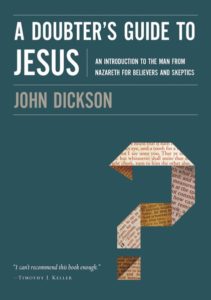 A Doubter’s Guide to Jesus: An Introduction to the Man from Nazareth for Believers and Skeptics John Dickson (Zondervan) $16.99 This compact sized paperback came out early last year and took it’s place beside The Doubter’s Guide to the Bible and the Doubter’s Guide to the Ten Commandments. Something a bit more than the famous Oxford University Press “Very Short Introductions” but still concise enough for one who doesn’t want to wade through hundreds of pages of footnotes, these Doubter’s Guides are exception introductions to the topics they approach. And this one stands out as simply stellar. The quote on the front by Tim Keller gives a clue who exclaims, “I can’t recommend this book enough.” Another good friend and customer of ours, one who buys a lot of books and reads a lot of books, similarly couldn’t stop talking about it and recommending it to those at his church. Which inspired me to not just recommend it but to consider placing it on our Best of 2018 list.
A Doubter’s Guide to Jesus: An Introduction to the Man from Nazareth for Believers and Skeptics John Dickson (Zondervan) $16.99 This compact sized paperback came out early last year and took it’s place beside The Doubter’s Guide to the Bible and the Doubter’s Guide to the Ten Commandments. Something a bit more than the famous Oxford University Press “Very Short Introductions” but still concise enough for one who doesn’t want to wade through hundreds of pages of footnotes, these Doubter’s Guides are exception introductions to the topics they approach. And this one stands out as simply stellar. The quote on the front by Tim Keller gives a clue who exclaims, “I can’t recommend this book enough.” Another good friend and customer of ours, one who buys a lot of books and reads a lot of books, similarly couldn’t stop talking about it and recommending it to those at his church. Which inspired me to not just recommend it but to consider placing it on our Best of 2018 list.
Dickson is fluent in the life of Jesus and the way that Christ places Himself at the center of the Hebrew redemptive narrative; as a scholar he knows all kinds of pertinent books and shares them nicely. It is almost worth getting this little gem to see the sidebars and boxes with recommend book lists in them. It is warm and thoughtful and interesting. Three cheers!
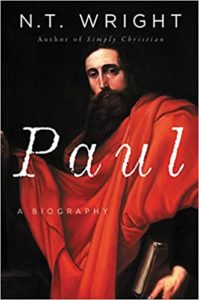 Paul: A Biography N.T. Wright (HarperOne) $29.99 Oh my, I hope you recall our big announcement of this when it came out earlier this year. It is, yes, by one of the great New Testament scholars of our time, whose two volume work Paul and the Faithfulness of God weighs in at over 1700 pages! The guy who then wrote another hefty book about all the various scholars on Paul these days called Paul and His Recent Interpreters and then quickly did a clarifying book for those that wanted key questions answered about his views on a handful of key interpretive quandaries in Pauline research — named, naturally, The Paul Debate: Critical Questions for Understanding the Apostle. And this is just his recent work on Paul.
Paul: A Biography N.T. Wright (HarperOne) $29.99 Oh my, I hope you recall our big announcement of this when it came out earlier this year. It is, yes, by one of the great New Testament scholars of our time, whose two volume work Paul and the Faithfulness of God weighs in at over 1700 pages! The guy who then wrote another hefty book about all the various scholars on Paul these days called Paul and His Recent Interpreters and then quickly did a clarifying book for those that wanted key questions answered about his views on a handful of key interpretive quandaries in Pauline research — named, naturally, The Paul Debate: Critical Questions for Understanding the Apostle. And this is just his recent work on Paul.
Well, through it all, Tom has been pondering and praying and reading and discussing (not to mention going to the very places Paul went throughout the Mediterranean) and has now gifted us with this, a novel-esque, wonderfully engaging introduction to Paul’s thought by way of telling of his life. This is a captivating, thick, fabulously informative and well-written bio, the intro to Paul we’ve been waiting for. Kudos to Wright for getting this right. As Ben Witherington (who himself has written bunches of significant, big books on Paul) says, it is “written with the usual Wright combination of erudition, intuition, and mature wit and wisdom.” As world-class Rabbi Lord Jonathan Sacks writes, it is “an enthralling journey into the mind of Paul by one of the great theologians of our time.”
I hope you agree this should be in every church library, circulated widely, read and discussed, and enjoyed, if not out and out celebrated. We are honoring it as one of the very best books of the year!
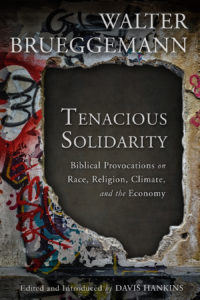 Tenacious Solidary: Biblical Provocations on Race, Religion, Climate, and the Economy Walter Brueggemann; edited and introduced by Davis Hankins (Fortress Press) $29.00 This is the most hefty and substantial book by Walt Brueggemann in quite a few years; his recent output has been rich and prolific, but has included a short Lenten devotional, an even shorter Advent devotional, an succinct (if powerful) adult resource on speaking up, a small book about the conflict in the Holy Land, that brief, potent book on sabbath, and a few shorter collections of academic pieces. Gospel of Hope is a splendid small hardback collection of short excerpts, sayings, quotations, gathering Brueggemann’s wisdom on topics ranging from anxiety and abundance to partisanship and the role of faith in public life, best used to dip into and ponder or when one needs a good quote or short reading.
Tenacious Solidary: Biblical Provocations on Race, Religion, Climate, and the Economy Walter Brueggemann; edited and introduced by Davis Hankins (Fortress Press) $29.00 This is the most hefty and substantial book by Walt Brueggemann in quite a few years; his recent output has been rich and prolific, but has included a short Lenten devotional, an even shorter Advent devotional, an succinct (if powerful) adult resource on speaking up, a small book about the conflict in the Holy Land, that brief, potent book on sabbath, and a few shorter collections of academic pieces. Gospel of Hope is a splendid small hardback collection of short excerpts, sayings, quotations, gathering Brueggemann’s wisdom on topics ranging from anxiety and abundance to partisanship and the role of faith in public life, best used to dip into and ponder or when one needs a good quote or short reading.
(And, by the way, he has a potent new book that was just released, perhaps a bit surprising, about hymns called A Glad Obedience: Why and What We Sing. I’ll be telling you more about that soon, for sure.)
But this big, new volume (over 450 pages) is a major collection of daring sermons, powerful talks, important lectures, Bibles studies and articles that have appeared in recent years — I said he was prolific — all about how the Bible might authorize us to be prophetic and critical about how things are in our world, inviting us to think, as he sometimes puts, it “otherwise.” As Jim Wallis says, “Tenacious Solidarity is a godsend.” This is the sort of creative and thick and serious Bible awareness we need to fund a new imagination that will enable us to face these pressing demands of our time as God would wish.
Here Brueggemann offers an ethic for Biblical people informed by generosity, justice, mercy, and trust in the untamed God of mysterious abundance. He is, as always, remarkably well-read, tossing off citations from the social sciences and great literature and historians and activists and old theologians alongside the most promiscuous use of the Bible you can image. This guy know his Scriptures and draws connections and interconnections as if it were his native tongue — which, after all these it, it is. No wonder he is so raw and insistent and seemingly strange and deeply relevant at the same time. Tenacious Solidarity is one of the great books of the year. It includes 20 strong pieces, a great and informative introduction and a few appendices.
Christine Yoder of Columbia Theological Seminary writes that this book illustrates Walt’s “characteristic skill and wisdom” and demonstrates “the generative and transformative potentials of biblical texts to name and confront urgent challenges of our time.” Amen.
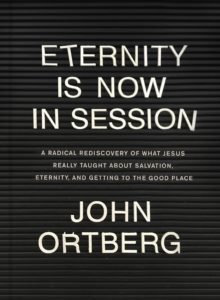 Eternity Is Now in Session: A Radical Rediscovery of What Jesus Really Taught About Salvation, Eternity, and Getting to the Good Place John Ortberg (Tyndale) $17.99 I like John Ortberg; he is well informed, thoughtful, but a masterful communicator. Whether he is sharing what he’s learned from Dallas Willard or summing up complicated arguments from N.T. Wright or, as in The Life You Always Wanted explaining what we mean by spiritual disciplines, he popularizes the best stuff in compelling, entertaining, and helpful ways. This is basic Christian growth material made clear and practical and inspiring. Many loved his last book, another on the interior life inspired by Willard called Soul Keeping: Caring for the Most Important Part of You and the one before that was a fabulous, fabulous introduction to why everybody should study Jesus (Who Is This Man?) He is a vital pastor, and great teacher, and this new one deserves special acclaim. Its a favorite of ours this year.
Eternity Is Now in Session: A Radical Rediscovery of What Jesus Really Taught About Salvation, Eternity, and Getting to the Good Place John Ortberg (Tyndale) $17.99 I like John Ortberg; he is well informed, thoughtful, but a masterful communicator. Whether he is sharing what he’s learned from Dallas Willard or summing up complicated arguments from N.T. Wright or, as in The Life You Always Wanted explaining what we mean by spiritual disciplines, he popularizes the best stuff in compelling, entertaining, and helpful ways. This is basic Christian growth material made clear and practical and inspiring. Many loved his last book, another on the interior life inspired by Willard called Soul Keeping: Caring for the Most Important Part of You and the one before that was a fabulous, fabulous introduction to why everybody should study Jesus (Who Is This Man?) He is a vital pastor, and great teacher, and this new one deserves special acclaim. Its a favorite of ours this year.
It is current in that he is studying heaven (the opening page has a spoiler about “The Good Place” TV show) and reminds us that our view of the afterlife is important, but only part of what the gospel is about. In fact, if we understand the theme of the Kingdom of God — the heart of Jesus’s teachings and proclamation, after all — we’ll understand that “Eternity Is Now in Session.”
Yes, yes, yes. I love this easy to read book and think his telling about bringing “up there” “down here” is just so useful for most church folks. What if we stopped thinking about eternal life as something we experience after we die, if we stopped think about getting into heaven but about heaven getting into us, we’d change the calibre of our faith and the tone of our churches. And perhaps we’d become more astute about being Kingdom ambassadors in all of life. We’d become people who are alive in our knowledge of God and our piety would spill out in healthy and exciting ways.
Truly, this is “a radical rediscovery of the Christian concept of salvation.” And let me tell you — this is fun and interesting, but the Langston Hughe’s story he tells near the beginning will not quickly be forgotten. And his little illustration about dancing in the last few pages will inspire you to move, to let God’s grace spill over you and allow you to dance with the Lord of the Dance! What a book!
As we’ve said before, there is a DVD curriculum to go with this as well which we also have. Give us a call if you’re interested.
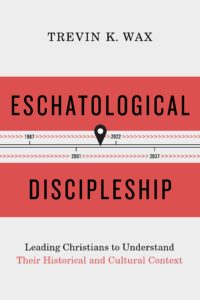 to Understand Their Historical and Cultural Context Trevin K. Wax (B&H Academic) $29.99 I used to play off of the Awards Show schtick and offer specific awards for some books. If I were doing this I’d put this as a contender for, at least, the trophy for the most intriguing theological book title. Oh, there’s some wacky ones out there and theological textbooks can enter the realm of the arcane pretty quickly. But this; it makes sense. There are, you may know, reputable scholars who find apocalyptic themes in most of the Kingdom language of Jesus and insist He is revealing a new order in the middle of real life, an upside down Kingdom that will soon be consummated. When will all things be made new? Well, that’s the eschatological question, isn’t it? And so, without any weird rapture charts or end-times scenarios, Wax here is saying that, at least, we are to live now as if we are in rehearsal for eternity. “People get ready,” the old Curtis Mayfield song sang. As Kevin Vanhoozer puts it, “Wax convincingly sets out the biblical basis for ‘eschatological discipleship’, which means the importance of waking up (and staying awake) to the reality that our citizenship in heaven begins now.
to Understand Their Historical and Cultural Context Trevin K. Wax (B&H Academic) $29.99 I used to play off of the Awards Show schtick and offer specific awards for some books. If I were doing this I’d put this as a contender for, at least, the trophy for the most intriguing theological book title. Oh, there’s some wacky ones out there and theological textbooks can enter the realm of the arcane pretty quickly. But this; it makes sense. There are, you may know, reputable scholars who find apocalyptic themes in most of the Kingdom language of Jesus and insist He is revealing a new order in the middle of real life, an upside down Kingdom that will soon be consummated. When will all things be made new? Well, that’s the eschatological question, isn’t it? And so, without any weird rapture charts or end-times scenarios, Wax here is saying that, at least, we are to live now as if we are in rehearsal for eternity. “People get ready,” the old Curtis Mayfield song sang. As Kevin Vanhoozer puts it, “Wax convincingly sets out the biblical basis for ‘eschatological discipleship’, which means the importance of waking up (and staying awake) to the reality that our citizenship in heaven begins now.
In a way, this is a much more scholarly and meaty treatment of the basic teaching Ortberg makes in his lovely Eternity Is Now in Session [see above.]Wax calls it eschatological discipleship, we live now as if the future that we anticipate is breaking in now, already but not yet. Get it?
His first chapter shows that he is conversant in some of the best stuff on worldview formation and thinking Christianly about whole-life, fully human sorts of public discipleship. He quotes Al Wolters and Sander Griffion, he cites journal articles by serious thinkers in this tradition of worlldviewish discipleship from across the theological spectrum, from Nancy Pearcey to Brian Walsh to N.T. Wright, not to mention philosophers such as Charles Taylor cultural critics like James Smith and Skye Janthani.
Here is how one of my favorite missional worldview scholars, Michael Goheen, puts it:
It is not a matter of whether eschatology will shape the church’s life but only a matter of which one. Discipleship, a burning need in the syncretistic American church, surely needs to be re-envisioned in terms of equipping God’s people to more and more live out of a biblical eschatology of the kingdom. In this book Trevin Wax takes up this challenge and encounters the two most powerful rival eschatologies of our day–the Enlightenment notion of progress and Consumerism. I pray that God will use this book to enable the American church to reimagine discipleship in its missionary setting.
I think maybe we should have an award for the book that inspires the most insightful endorsing blurbs. Many passionate memoirs and novels certainly generate over the top, gripping, eloquent raves. But for a non-fiction book that needs nicely summarized, this quote by Mike Goheen is itself worth pondering. Read that quote again and tell me this doesn’t seem like a vital, urgent book.
Eschatological Discipleship is perhaps a bit more academic sequel to, or maybe a theological foundation for Wax’s 2017 book This Is Our Time: Everyday Myths in Light of the Gospel (B&H; $16.99.) Agree or not with all of his cultural criticism, this is a great example of trying to be faithfully “in but not of” the world around us, living well into what Niebuhr called “Christian transforming culture.” Check it out.
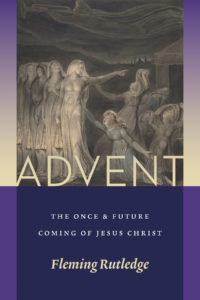 Advent: The Once and Future Coming of Jesus Christ Fleming Rutledge (Eerdmans) $30.00 This book is nothing short of extraordinary and was perhaps our favorite book to sell this past year. And it was one of our best sellers — thank you, Amazon, for running out, and thank you, dear Fleming, for saying such nice things about us on line. It certainly deserved to be a Hearts & Minds bestseller and deserves to be widely read; there is no other book like it. Who, these days, doesn’t at least try to attend to the spiritual disciplines and theological tone of the season of Advent, inviting us, as it does, to wait, to anticipate, to long for the final restoration of creation when Christ comes the second time?
Advent: The Once and Future Coming of Jesus Christ Fleming Rutledge (Eerdmans) $30.00 This book is nothing short of extraordinary and was perhaps our favorite book to sell this past year. And it was one of our best sellers — thank you, Amazon, for running out, and thank you, dear Fleming, for saying such nice things about us on line. It certainly deserved to be a Hearts & Minds bestseller and deserves to be widely read; there is no other book like it. Who, these days, doesn’t at least try to attend to the spiritual disciplines and theological tone of the season of Advent, inviting us, as it does, to wait, to anticipate, to long for the final restoration of creation when Christ comes the second time?
Advent: The Once and Future Coming… is nearly a life-time’s worth of Advent sermons preached by the thoughtful and eloquent Episcopal pastor-theologian/preacher extraordinaire who is eloquent about the hard tensions of living “between the times”of the Kingdom come and the Kingdom consummated. Episcopalians do Advent better than most of us and Rev. Rutledge’s sermons — like “Advent Begins in the Dark” — explore the theme with remarkable insight and many lovely illustrations and anecdotes. (She is the author, recall, of another collection of sermons called The Gospel and the New York Times.) I often say that her thick volume The Undoing of Death is my favorite book to read from during Lent. This new Advent work is without a doubt is a book I will cherish for the rest of my life. Highly recommended as one of the most significant religious publishing releases of 2018.
By the way, we’ve announced it previously but you should know that her handsome, compact sized hardback, Three Hours: Sermons for Good Friday (Eerdmans; $18.00) is now here. I have intentionally not dipped in yet, but am eager to read these sermons in due time. You should, too.
 Hostility to Hospitality: Spirituality and Professional Socialization Within Medicine Michael J. Balboni & Tracy A. Balboni (Oxford University Press) $35.95 As you know, we here at Hearts & Minds are passionate about providing books about relating faith and deeply Christian principles and values to various work spheres. If any job done before God and for the sake of Christ’s Kingdom can be a holy calling, if we all need what Steve Garber calls “visions of vocation” then we also need to ask the tough question: what does it mean to think and act faithfully, appropriately, Christianly, consonant with how God made the world and how Christ is redeeming it, in my specific job. There are a lot of books these days about a Christian view of work, about how all followers of Christ have a missional calling to carry their faith into the marketplace, to be artists or scientists or home-makers or teachers for the common good, loving God and neighbor in the very way we practice those careers and calling. Got it? Sure you do.
Hostility to Hospitality: Spirituality and Professional Socialization Within Medicine Michael J. Balboni & Tracy A. Balboni (Oxford University Press) $35.95 As you know, we here at Hearts & Minds are passionate about providing books about relating faith and deeply Christian principles and values to various work spheres. If any job done before God and for the sake of Christ’s Kingdom can be a holy calling, if we all need what Steve Garber calls “visions of vocation” then we also need to ask the tough question: what does it mean to think and act faithfully, appropriately, Christianly, consonant with how God made the world and how Christ is redeeming it, in my specific job. There are a lot of books these days about a Christian view of work, about how all followers of Christ have a missional calling to carry their faith into the marketplace, to be artists or scientists or home-makers or teachers for the common good, loving God and neighbor in the very way we practice those careers and calling. Got it? Sure you do.
But yet, there still isn’t enough fresh, thoughtful stuff coming out on various careers, thinking well and studying various jobs and callings. So, we want to honor this book and all that it signifies as a keen example of a major Christian project, scholarly and applicable, for those in health care, published on a mainstream academic press. That is, this is a major contribution to the field of medicine and it is asking, for the profession, what role spiritual things play in the practice of medicine, This is a book of practical Christian thinking about health and healing about medicine and health care, about doctoring and nursing and teaching medicine and, well, about being sick and being a patient, too. It is asking — with a heavy bit of research backing up their quest, and serious finding which they share — if there is a way in which American medicine distances itself form religion and spirituality. The “secular-sacred divide” that they write about “unleashes depersonalizing social forces through the market, technology, and legal-bureaucratic powers that reduce clinicians to tiny cogs in an unstoppable machine.” Wow.
As it says right on the back cover, “the authors argue for structural pluralism as the missing piece to changing hostility to hospitality.” Again, wow. This is an award winning thesis if I ever saw one and want to celebrate that somebody is thinking like this, doing this kind of work, putting together such a substantive collection of essays and binding them together within a world-famous publishing house. Let those with ears, hear. Kudos to Michael and Tracy Balboni.
Michael J. Balboni, PhD is on faculty at Harvard University and a theologian-in-residence in the Department of Psychiatry, Brigham & Women’s Hospital, Boston. His social science research has centered on the intersection of spirituality and medicine. He serves as a congregational minister at Park Street Church and the Longwood Christian Community.Tracy A. Balboni, MD is an Associate Professor at Harvard Medical School and serves as the Clinical Director of the Supportive and Palliative Radiation Oncology Service at Dana-Farber Cancer Institute and Brigham & Women’s Hospital. She is an internationally recognized leader and researcher at the intersection of spirituality, palliative care, and oncology.
 Pure: Inside the Evangelical Movement That Shamed a Generation of Young Women and How I Broke Free Linda Kay Klein (Touchstone) $26.00 A few years ago we had a category in our end of the year awards for books “I loved to hate” which were, obviously, really bad books. Then I’d sometimes give an award for a work I “hated to love.” This would be one of those, a book with which I have grave concerns, strong disagreements, and yet really, really loved. Although “loved” is not quite the right word. It was moving, fascinating, insightful, provocative, entertaining, horrific, important, sad, and, occasionally funny.
Pure: Inside the Evangelical Movement That Shamed a Generation of Young Women and How I Broke Free Linda Kay Klein (Touchstone) $26.00 A few years ago we had a category in our end of the year awards for books “I loved to hate” which were, obviously, really bad books. Then I’d sometimes give an award for a work I “hated to love.” This would be one of those, a book with which I have grave concerns, strong disagreements, and yet really, really loved. Although “loved” is not quite the right word. It was moving, fascinating, insightful, provocative, entertaining, horrific, important, sad, and, occasionally funny.
First, I don’t like the title — a whole “generation” of women were not shamed by the purity thing, and the alarmist nature of the subtitle — “breaking free” — makes the author’s journey out of conservative evangelicalism sound more sensational than it is. Her journey is poignant and painful but she wasn’t in a cult and her parents were not like, say, Tara Westover’s.
Still, apparently, a whole, whole lot of young people, especially young women, were shamed and worse by the evangelical purity movement and it is regrettable. This moving book — part memoir and part oral history and sociology — wants those to who have been through this sub-culture to know they are not alone.
It further insists that we who remain in the evangelical sub-culture re-think our attitudes, theologies, and educational practices around sex ed. Like the brand new, controversial Nadia Bolz-Weber book, Shameless: A Sexual Reformation, this book, like it or not, reminds us that even well-intended efforts at teaching holiness can become deeply harmful. (See Lauren Winner’s book on “characteristic” sin, The Dangers of Christian Practice, mentioned above.)
Many of those who so loudly encouraged sexual purity made a fetish of it (I have used this exact phrase about this for years) and as an evangelical bookstore in the middle of that movement a few decades ago we were not particularly impressed with it all. We did not stock the rings and didn’t push the books. We were put off by the rather weird daddy-daughter ceremonies and the “I Kissed Dating Goodbye” courtship nonsense and the standard overstatement of the harms of pre-marital sex (not to mention the way some evangelicals acted — and still act if your talking about LGBTQ sex, at least — as if sexual sin is way worse than other sins, forgetting that economic injustice is decried much more often in the Bible than is non-married sexual activity.) I don’t think our church pulled any of the gross stunts described in this book to dramatize the loss of virginity and the youth ministry stuff we promoted most seemed to be balanced and thoughtful and mostly pretty wise.
I think Brian McLaren’s comment on the back cover is very insightful, saying, “When ‘Just say no’ was their only message, and when the language of purity was their main ethical category, deep and lasting personal damage were inevitable.”
Much of this book sounded very, very familiar and the hurts and violence done to some of the women whose stories Linda Kay Klein uncovers in her research should not be that surprising. The assumptions about gender roles in many churches have too often been unjust and we and our staff here have often pulled books because they were sexist, or, just plain dumb. We knew this deeply gendered and overstated emphasis about sexual purity had consequences but, whew, some of the stuff some of the women carry from their years of coming of age in fundamentalist youth groups a decade or so ago is tragic. These churches and ministries often did not serve their young people well and the women in Pure who testify about demeaning lessons, shaming customs, cruddy attitudes, and worse, are brave to allow their stories to be told. That Linda Klein tells her own story (which includes a sub-plot of her own struggle with chronic pain and severe illness) makes this a very engaging read.
A few of the women in Pure (including the author) have made some peace with their past and may still see themselves as Christians, some of them vibrantly so. The story (told in many other books these days) of young adults maintaining (or not) relationships with their parents and former mentors and friends when leaving a strict fundamentalism is poignant and arresting. Many of those in this book have left the faith and are deeply wounded and understandably bitter about how they were treated in youth groups and church camps and congregations all over this land.
In a very provocative endorsement on the back, best-selling author Glennon Doyle, in reminding us of this moment in history (“as women come to the collective understanding that the institutions we spend our lives serving are not created to serve us”) says, interestingly:
Women are canaries in religious coal mines — and Pure emboldens us to escape toxic misogyny and experience a fresh breath of freedom.
If this causes you to recoil a bit, I’d advise reading Pure and at least hear the downside stories of women who were shamed and offered weirdly unhelpful views of their bodies, their sexuality, their future marriages, and see if somehow something is awry.
One does not have to — and I do not — agree with Ms. Klein’s proposals and answers to this crisis of shame to appreciate her important book. (I don’t find Nadia Bolz-Weber’s theology of sex in Shameless, adequate, either, but I wept through some of it and found it to be a very important read, spicy as it is.) To be honest, Klein isn’t strong on proposals other than exposing the dangers of fundamentalism and a cry to “lose the shame” which I suppose is a weakness of the book; she isn’t a conservative evangelical anymore so it isn’t trying to offer a profoundly theological position for the traditional church. For those with a robust and orthodox Christian worldview, one would need to supplement this book with a better perspective on sex and sexuality, gender, self-awareness, body positivity, virginity, marriage, Biblically-informed ethics, and such. But first, we have to admit we’ve got stuff wrong, that many Christian bookstores and evangelical para-church organizations and Christian camps and youth ministries and curriculum developers and radio shows have played a part in perpetrating a movement with an ethos that wasn’t helpful or faithful, and we need to hear and host the hurt still carried by victims of misconduct of this sort.
More and more young adults are speaking openly about the harm done to them by churches that treated sex as if it were an illicit drug. When ‘Just say no’ was their only message, and when the language of purity was their main ethical category, deep and lasting personal damage were inevitable. That’s why Linda Kay Klein’s new book is so important. It pulls back the covers on ‘purity culture’ and the harm it has done…. An important book from an important new voice. –Brian D. McLaren, author of The Great Spiritual Migration
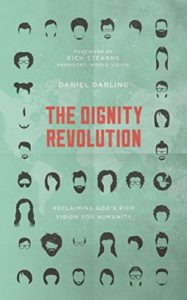 The Dignity Revolution: Reclaiming God’s Rich Vision for Humanity Daniel Darling (The Good Book Company) $16.99 Forty some years ago we were somewhat involved in an organization that tried to bear witness amongst the anti-war and anti-nuclear weapons movement that concern for pre-born humans should also be a part of their agenda. Peaceniks often marched under the banner of the famous verse from Deuteronomy “Choose Life.” Similarly, we’d attend Right to Life events and try to convince our anti-abortion friends that targeting millions of civilians, including children, as our nuclear weapons strategy does, is not very pro-life. I suppose it doesn’t need explained that we were physically removed from at least one anti-war gig and verbally assaulted plenty from the anti-abortion events. Nobody wanted to be very consistently pro-life; most didn’t even want to talk to each other.
The Dignity Revolution: Reclaiming God’s Rich Vision for Humanity Daniel Darling (The Good Book Company) $16.99 Forty some years ago we were somewhat involved in an organization that tried to bear witness amongst the anti-war and anti-nuclear weapons movement that concern for pre-born humans should also be a part of their agenda. Peaceniks often marched under the banner of the famous verse from Deuteronomy “Choose Life.” Similarly, we’d attend Right to Life events and try to convince our anti-abortion friends that targeting millions of civilians, including children, as our nuclear weapons strategy does, is not very pro-life. I suppose it doesn’t need explained that we were physically removed from at least one anti-war gig and verbally assaulted plenty from the anti-abortion events. Nobody wanted to be very consistently pro-life; most didn’t even want to talk to each other.
Except, that is, a few radical Catholics and Mennonites and friends at ESA and Sojo who developed a consistent life ethic and who stood up for the poor, those trafficked and enslaved, the prisoners, who opposed the death penalty and abortion, who were anti-war and pro-environment. These consistent life folks decried racism and affirmed the dignity of the unborn and the aged, advocated for the rights of the disabled, thought about immigrants and sex abuse and pollution and war and the sexism that plagues us all, all in the same ethical category, asking: what does it mean to be consistently pro-life?
This new book by Daniel Darling, Vice President for the Southern Baptist Ethics and Religious Liberty Commission is not quite like that — he’s no Mennonite pacifist nor a Daniel Berrigan and he’s not part of “Feminists for Life.” But, nonetheless, this is one of the closest books we’ve seen in decades to so very deeply remind us that the theological notion of human dignity — we are all made in the image of God and have God-given dignity! — should loom large over all our social and ethical quandaries. It is, as Albert Mohler puts it, “a compelling and careful articulation” of human dignity.
Or, Ann Voskamp says, “This may be one of the most important books of our time.”
Speaking of the dignity of the disabled, one of our finest writers and sharpest minds within evangelical Christianity these past decades has been Joni Eareckson Tada, living with paraplegia, who types stuff like this with her specially adapted equipment: “The definition of “human being” is being altered, and the impact is creeping into hospitals, schools, and businesses. This is a must-read for every Christian.” Yep, from deep questions of bio-ethics (which Joni has studied and written about) to new discussions about the “trans-human” we simply have to recover a classic, theologically robust vision of the human person. So much depends upon it, and this book invites to a “dignity revolution” which could impact how we treat others (in the grocery store line or on-line) and how we think about abortion, euthanasia, capitol punishment, the poor, the sick, the refugee, race relations, and more.
Indeed, this is a book to consider, to debate, to ponder what implications it might have. As Michael Ware, formerly of the Obama White House, who described his own principles about a consistent sort of life ethic in his book Reclaiming Hope challenges:
“Consider this book carefully, and then act to implement its vision in your life.”
As the legendary White Album puts it: “You say you want a revolution?” This is it!
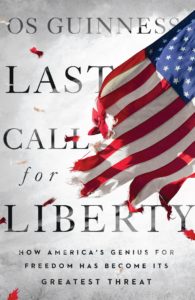 Last Call for Liberty: How America’s Genius for Freedom Has Become Its Greatest Threat Os Guinness (IVP) $27.00 Any time this excellent speaker and writer, social critic, and Christian leader writes, we would do well to pay attention. This is one of Dr. Guinness’s major works, and it isn’t simple or trite. It is — from his point of view as an Englishman living in the DC area — a love letter to America, and a caring chastisement, we might say, to those of us who take our liberties for granted. He is stern, here, about how most Americans (not to mention our civic and religious leaders) simply don’t know what we should about the profundity and genius of the American experiment (not to mention profound Judeo-Christian influences such as notions of covenant) and the gravity and urgency of the threats poised against these revolutionary ideas. He is not (although in some ears could be heard to be) an advocate of the “Christian America” thesis nor is he an advocate of a glib sort of civilc faith that extols civil religion dressed up with a MAGA hat. He is a serious, nonpartisan, deeply Christian observer, alarmed at the drift of our way of life and not optimistic about lessening the erosion of our civility, nor our mutual commitments to uniquely American ideals and principles.
Last Call for Liberty: How America’s Genius for Freedom Has Become Its Greatest Threat Os Guinness (IVP) $27.00 Any time this excellent speaker and writer, social critic, and Christian leader writes, we would do well to pay attention. This is one of Dr. Guinness’s major works, and it isn’t simple or trite. It is — from his point of view as an Englishman living in the DC area — a love letter to America, and a caring chastisement, we might say, to those of us who take our liberties for granted. He is stern, here, about how most Americans (not to mention our civic and religious leaders) simply don’t know what we should about the profundity and genius of the American experiment (not to mention profound Judeo-Christian influences such as notions of covenant) and the gravity and urgency of the threats poised against these revolutionary ideas. He is not (although in some ears could be heard to be) an advocate of the “Christian America” thesis nor is he an advocate of a glib sort of civilc faith that extols civil religion dressed up with a MAGA hat. He is a serious, nonpartisan, deeply Christian observer, alarmed at the drift of our way of life and not optimistic about lessening the erosion of our civility, nor our mutual commitments to uniquely American ideals and principles.
Yet, as an evangelical and deeply devoted Christian, rooted in Reformation thought and the piety and practices of Anglican spirituality, he is one with great hope. (Read his book from just a few years ago, Renaissance: The Power of the Gospel However Dark the Times, for a good dose of Christian hope that isn’t rooted in naive optimism, and is Guinness at his biblical best.) In order to be faithful and hopeful, he offers us this guide. Last Call for Liberty — intentionally designed with a tattered flag on the sober cover — formulates 10 key questions that each American must answer. These questions are profound for all of us, regardless of our party affiliation or how much or how little we ourselves experience the tension with the times. It is my sense that these questions should be asked/discussed communally, too — as families and churches and organizations and non-profits and civic groups and colleges, we must all grapple with our understanding of these 10 big questions.
Guinness says that the American republic is suffering “its gravest crisis since the Civil War.” I don’t know if this is so, but we all feel the awfulness of these days, ache for greater civility and common ground, and many of us are deeply dismayed. Perhaps those with more conservative leanings are more deeply aware of how our judiciary and institutions that are crucial to freedom are failing; we need more than better manners to restore the structures for pluralism and e pluribus unam. It isn’t necessary to harp on how conflicted we are as our divisions about the current President are merely a symptom of as deeper malaise. I do not think Guiness’s big 10 questions are the only way to get at the root of our crisis, and there other obviously other questions about other matters, but we should know that the crisis is deeper than we know. As Guinness makes very clear, it is not primarily about Trump.
Part of the genius of Last Call for Liberty is how Guinness repeatedly, consistently, raises the question of what view of freedom we have, what assumptions about freedom and liberty we hold. The big question for him is if we are guided and indebted to the ideals and ethos and values and convictions of those who proposed the revolution of 1776 or to the one known as the French Revolution of 1789. He might have been a bit more explanatory for those who don’t immediately know the difference but as he walks us through this 300 page treatise it becomes a liturgy, clarifying and shaping our deepest desires: 1776 or 1789? 1776 or 1789?
As always, Guinness is literate, historically informed, eloquent and passionate. He feels this stuff deeply; of course, mostly because of his study and convictions but also because, as a child, he witnessed first hand the climax of the brutal Chinese revolution in 1949 where he lost loved ones (his parents were medical missionaries there) and was eventually expelled by the draconian powers there in 1951. He has seen repression, even as he has travelled all over the world, realizing deeply the depth of injustice and the consequences of ideas. (See his powerful book about the challenge of evil in the world called Unspeakable, which shows his profound social conscience and awareness of God’s deep care for the poor and oppressed.) The new Last Call book is chock full of quotes and epigrams from writers and thinkers as diverse as G.K. Chesterton and Leo Tolstoy, Berthold Brecht and Ambrose Bierce, his beloved Winston Churchill and Thucydides and Abigail Adams and Lord Rabbi Jonathan Sacks. He is profoundly indebted in Abraham Lincoln, and partial to Yuval Noah Harari and Abraham Joshua Heschel and, naturally, Alexis de Tocqueville and Edmund Burke, whose insight about the French revolution is indispensable.
The women and men Dr. Guinness thanks in his lovely, sincere, acknowledgements are notable and yet, he is, in this field at least, one of the most widely-read gentleman I have ever met. Don’t miss this book. Last Call for Liberty (whether you agree with its assessment or not) is a treasure to read; urgent for anyone concerned about the constitutional republic and restoring our “better angels” to our current state of affairs.
As he says more than once, and solemnly in the last paragraph,
America, America, freedom is at stake. Act worthy of yourselves, your great experiment in freedom, your unfinished story, and the challenge of the hour and of humanity. God, history, and the watching world await your answer.
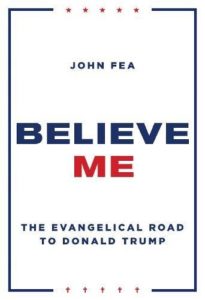 Believe Me: The Evangelical Road to Donald Trump John Fea (Eerdmans) $24.99 I have written at great length — in our local newspaper, in BookNotes, and on my social media space — that the unqualified conservative Christian support for President Trump is inexplicable. For a dozen reasons that are nearly incontrovertible, it is clear that the President is a bad man and a bad leader. By no reasonable metrics can we be glad for his temperament, his antics, or his odd-ball style of governance. Good people of good faith can disagree with the “lesser of two evils” sorts of complicated choices we have when voting and can line up on different sides of the isles as we watch the sausage getting made. But all serious Christians must, at least, have some sort of Biblically-informed, Christianly conceived, spiritual-driven, public theology. We must have “the mind of Christ” and allow the Scriptural worldview to illumine our views of contemporary issues and the nature of law and politics and citizenship. Evangelicals, who love Jesus, insist on conversion and holiness, and Christ’s Kingship over all of life and regard the Bible with a for-all-of-life authority. We dare not say, as Jerry Falwell Jr. recently did, “I don’t look to Jesus for my politics.” Evangelicals worthy of the name may disagree about many implications that flow from a Christian political vision, but we dare not say that.
Believe Me: The Evangelical Road to Donald Trump John Fea (Eerdmans) $24.99 I have written at great length — in our local newspaper, in BookNotes, and on my social media space — that the unqualified conservative Christian support for President Trump is inexplicable. For a dozen reasons that are nearly incontrovertible, it is clear that the President is a bad man and a bad leader. By no reasonable metrics can we be glad for his temperament, his antics, or his odd-ball style of governance. Good people of good faith can disagree with the “lesser of two evils” sorts of complicated choices we have when voting and can line up on different sides of the isles as we watch the sausage getting made. But all serious Christians must, at least, have some sort of Biblically-informed, Christianly conceived, spiritual-driven, public theology. We must have “the mind of Christ” and allow the Scriptural worldview to illumine our views of contemporary issues and the nature of law and politics and citizenship. Evangelicals, who love Jesus, insist on conversion and holiness, and Christ’s Kingship over all of life and regard the Bible with a for-all-of-life authority. We dare not say, as Jerry Falwell Jr. recently did, “I don’t look to Jesus for my politics.” Evangelicals worthy of the name may disagree about many implications that flow from a Christian political vision, but we dare not say that.
And so, it is essential to try to figure out the coherence, if there is any, of the so-called Christian right. Those that know me know that this has been huge priority for me for decades and decades and I have invested much personal energy of my life time to help create conversations around the meaning of the Lordship of Christian for our citizenship and public lives. Sometimes I find it necessary to challenge the right and the left and I often try to graciously insist that we should have no fundamental loyalties to the conservatives or the liberals. For whatever reason, these days, I find a much greater interest in the Bible and Jesus from the progressive side than from most on the side of the Christian right, and that is different than it was a generation ago, and feels exceptionally ironic.
Still, as black evangelist Tony Evans once said, when Jesus comes back he will not be riding a donkey or an elephant. Or, more seriously, as David Koyzis writes, we must get at the deep philosophical influences of the Enlightenment and French Revolutions to understand our current political divides. (See his brilliant, deep Political Visions & Illusions: A Survey & Christian Critique of Contemporary Ideologies for a sophisticated explication of this rejection of the right and the left as we seek for a uniquely Christian third way.)
Which is a long way of saying why I am declaring Believe Me as one of the most important books to be published in 2018 and predicting that it will remain one of the most important books for many a year.
Look: I don’t agree with all of the analysis Dr. Fea brings, and I wish he had covered stuff that he misses. In this sense it may not be utterly adequate but it is nonetheless the best book in recent years on the new itineration of the Christian right in the Trump years. Fea is a respected historian and brings his discerning critical eyes to what he calls “the court evangelicals.” There is no other book like it.
Good historians such as George Marsden have given big accolades to Believe Me. For instance, the always measured Mark Noll writes:
John Fea’s timely and sobering book shows convincingly how legitimate concerns from white evangelical Protestants about a rapidly secularizing American culture metastasized into a fear-driven brew of half-truths, fanciful nostalgia, misplaced Christian nationalism, ethical hypocrisy, and political naiveté–precisely, that is, the mix that led so many white evangelicals not only to cast their votes for Donald Trump but also to regard him as a literal godsend.
Few contemporary Christian thinkers and advocates for a balanced public theology are as wise and balanced as Richard Mouw. His own memoir is the Adventures in Evangelical Civility: A Lifelong Quest for Common Ground and he knows much about hearing various viewpoints and showing “uncommon decency” as his book on civility puts it. And about Fea and Believe Me, Mouw says this:
While the significant support for Donald Trump by white evangelicals has been the stuff of headlines, there has been little serious probing of the deeper factors at work. John Fea here gives us what we need, with his insightful tracing of the theological-spiritual road that has brought us to this point. A wise and important book!
Believe Me: The Evangelical Road to Donald Trump by Messiah College prof and Hearts & Minds friend (and blogger extraordinaire ) Dr. John Fea deserves a, extra award medal for all he’s done promoting conversation around this book. He has helped us understand the contemporary interface of Christian faith and modern politics and while it isn’t the last word, it is a very, very important contribution. I’m glad other outlets more important than BookNotes have named this as one of the outstanding books of 2018.
Listen to Jana Riess, a senior columnist for Religion News Service:
It would be enough for John Fea to marshal his considerable prowess as a historian in proving how evangelicals have been propelled by fear, nostalgia, and the pursuit of power, as he does so compellingly in this book. But he also speaks here as a theologian and an evangelical himself, eloquently pointing toward a better gospel way. This is a call to action for evangelicals to move beyond the politics of fear to become a ‘faithful presence’ in a changing world.
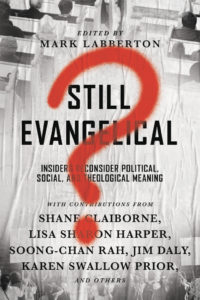 Still Evangelical?: Insiders Reconsider Political, Social, and Theological Meaning edited by Mark Labberton (IVP) $17.00 . I have written at length about this book when it first came out and I hope that our BookNotes review then garnered it some attention. It’s a wise and interesting and helpful book for any evangelical, and for anyone that has even a bit of interest in what that part of the church pew, many who sit on the right side of the church, are like these days. What this really does is ask the tough question if this phrase — evangelical — is worth saving, clarifying, using, or not. Again, we think this is a very important question and the authors of this book, themselves insiders to the movement, have different answers to the existential question.
Still Evangelical?: Insiders Reconsider Political, Social, and Theological Meaning edited by Mark Labberton (IVP) $17.00 . I have written at length about this book when it first came out and I hope that our BookNotes review then garnered it some attention. It’s a wise and interesting and helpful book for any evangelical, and for anyone that has even a bit of interest in what that part of the church pew, many who sit on the right side of the church, are like these days. What this really does is ask the tough question if this phrase — evangelical — is worth saving, clarifying, using, or not. Again, we think this is a very important question and the authors of this book, themselves insiders to the movement, have different answers to the existential question.
The women and men who contribute to this book are all well worth hearing, and they each bring a certain passion or expertise to the conversation. Still Evangelical includes Lisa Sharon Harper, Lauren Winner,
Here is the table of contents that will help you see why we think it is such a great book, covering such important and interesting concerns. We hope you send us an order and think this through yourself.
- Will Evangelicalism Surrender? (Lisa Sharon Harper)
- Why I Am an Evangelical (Karen Swallow Prior)
- Recapturing Evangelical Identity and Mission (Mark Young)
- Immigration and the Latina/o Community (Robert Chao Romero)
- Evangelical Futures (Soong-Chan Rah)
- Theology and Orthopraxis in Global Evangelicalism (Allen Yeh)
- Remaining to Reform (Sandra Maria Van Opstal)
- Looking for Unity in All the Wrong Places (Mark Galli)
- Evangelicalism Must Be Born Again (Shane Claiborne)
- The Importance of Listening in Today’s Evangelicalism (Jim Daly)
- Hope for the Next Generation (Tom Lin)
Our hats are off to all of these contributors and for those grappling with religious idenity, wanting to be true to the consciences, true to their understanding of Scripture, and continue to abide in Jesus, even as they try to discern how and with whom and with what words to do that before the watching world.
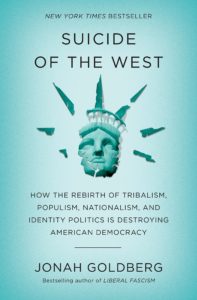 Suicide of the West: How the Rebirth of Tribalism, Populism, Nationalism, and Identity Politics Is Destroying American Democracy Jonah Goldberg (Crown Forum) $28.00 Well — it is getting so late I just don’t have the capacity to carefully review this now although, believe me, I’ve tried. In fact, even if I was bright and chipper and at my best I am not sure I can tell you why I want to commend this book. It is big and heavy and serious and at times tedious, with a lot of fascinating footnotes, too — except when it’s not; Goldberg is known for his nearly gonzo humor and although he restrains himself in this heady work, it does have it’s clever moments. He is witty and smart and maybe only somewhat right, but this is a great book that took years to write. It is certainly a notable book of the year and I wish others would consider it carefully.
Suicide of the West: How the Rebirth of Tribalism, Populism, Nationalism, and Identity Politics Is Destroying American Democracy Jonah Goldberg (Crown Forum) $28.00 Well — it is getting so late I just don’t have the capacity to carefully review this now although, believe me, I’ve tried. In fact, even if I was bright and chipper and at my best I am not sure I can tell you why I want to commend this book. It is big and heavy and serious and at times tedious, with a lot of fascinating footnotes, too — except when it’s not; Goldberg is known for his nearly gonzo humor and although he restrains himself in this heady work, it does have it’s clever moments. He is witty and smart and maybe only somewhat right, but this is a great book that took years to write. It is certainly a notable book of the year and I wish others would consider it carefully.
Here’s just two things you should know. Goldberg used to be a wild-eyed leftist but, as many such young idealists find, their Che berets and Jack Kerouac motorcycles don’t quit comport with the real world and its deep needs and he settled down, began to study the intellectual ideas and ideals of classic, serious-minded conservatives. He is one of those noble right wing guys in the tradition of William F. Buckley — who through intellectual prowess and sheer determination ran the racist John Bircher’s out of the Goldwater movement — who cannot abide the values and dispositions of Donald Trump; not because Trump is a conservative, but because, in a way, he’s not a real conservative. Goldberg knows that at the heart of historic conservatism lies individual virtue, and the narcissism and greed and irreligion and lust for power and petty meanness and intellectualism and nationalism of the current President does not build up our civic strengths nor help the Republican party or our democracy. They call these guys “Never Trumpers” and they are a principled crew within the conservative intelligentsia who call out those who have accommodated their values and virtues to the allow them to support Mr. Trump. So, Goldberg is a principled, funny, and serious conservative at the American Enterprise Institute who writes a must-read column in National Review online.
Goldberg’s earlier book, Liberal Fascism: The Secret History of the American Left, from Mussolini to the Politics of Change, took issue with how liberals tend to misunderstand fascism and argued that the threat of power-brokering control comes less from the right than from the left. For many of us it was a counter-intuitive analysis, but the book was a blast and made me think.
If Liberal Fascism made me think, Suicide of the West made my head hurt. Okay, that’s not really true, but it was pretty scholarly for a best-seller. It is a gift to be able to write a book that fast moving but still detailed, sweeping intellectual history without generalizations (at least not too many) and both oddly acerbic and generous. I guess what I mean is that he can be feisty and forthright in his denunciation of dumb ideas and that it cuts both ways. He brings strong critique to those I disapprove of and next thing you know he’s hitting a bit too close to home. I like that he attempts to be fair and not idealogical.
Which is, in fact, the point: those who adopt what I would call an idolatrous reductionism, end up as cheap populists, complaining about how identity politics on the left is hurting our country, breaking unity over who is most aggrieved, all the while sounding as tribal and ideological as anyone. What an irony that those decrying identity politics the loudest are those on the Trumpian right. It should be clear from the subtitle of this conservative book that his critique is as much against the far right as it is the cultural left. I guess you see why I like it — a big, sweeping genealogy of ideas and showing that too often, the right has bought into ideas that are themselves not adequate. In this regard, this important book should appeal to those who appreciate Os Guinness, say, or never-Trumpers like moderate, wise, conservatives such as Michael Gerson and David Brooks and Yuval Levin.
The great Levin, by the way, says of it:
“More than any book published so far in this century, it deserves to be called a conservative classic.”
There are critiques to be made of his own idolatries and the are significant. I think he means well, and I like that about him, but I think he is wrong about some of his intellectual history and some of his policy proposals. But that’s not the point here. It was thrilling to read a book like this — even if well over 450 pages — and a good intellectual exercise for his small town bookseller. Here are a few other good endorsements that will hopefully illustrate why I list this in our 2018 list of most interesting books.
Jonah Goldberg’s Suicide of the West is a tour de force. As ever, Goldberg wears his extraordinary erudition lightly as he demonstrates how the ideas that have animated free societies for the past 250 years are the greatest creations of humankind–and how we are imperiling our posterity by the way we mishandle, ignore, and belittle them. This is a very important book.
–John Podhoretz, Editor, Commentary Magazine“
Populism and identity politics are not just unpleasant; they are an existential threat to the American way of life. With characteristic wit and erudition, Jonah Goldberg argues that if you value democracy and a free society, you must stand against ideological tribalism, no matter what your politics. Suicide of the West raises an alarm everyone needs to hear, and makes clear the path we need to take.
–Arthur C. Brooks, President of the American Enterprise Institute
I am not sure I am as much of a fan as these two are, and certainly not as sure as this next blurb, but it’s so fun — and it sounds like something Jonah himself might pen — that I’ll share it with you, laughing that of course I want to list a book that ends up having endorsing blurbs like this!
When future archeologists are digging through our ruins and asking, as they will ask, ‘What the hell were they thinking?’ I hope they come upon a copy of Suicide of the West, and that it is only slightly charred from the bonfire into which the mad idiot ideologues of our time are sure to cast it.”
–Kevin Williamson, National Review correspondent
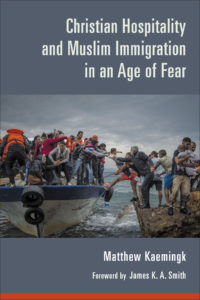 Christian Hospitality and Muslim Immigration in an Age of Fear Matthew Kaemingk (Eerdmans) $28.00 I did a major review of this before it got to be a much-talked about study, and I am proud to have been an early cheerleader. This is without a doubt one of the more important and substantive books of 2018 and it is offers a very nuanced, even surprising analysis of the modern West’s immigration and refugee crisis and Muslim-Christian relations.
Christian Hospitality and Muslim Immigration in an Age of Fear Matthew Kaemingk (Eerdmans) $28.00 I did a major review of this before it got to be a much-talked about study, and I am proud to have been an early cheerleader. This is without a doubt one of the more important and substantive books of 2018 and it is offers a very nuanced, even surprising analysis of the modern West’s immigration and refugee crisis and Muslim-Christian relations.
You’ll have to go back to my earlier BookNotes review or the many other reviews to understand all this, but the short version is this: Kaemingk studies the political and social philosophy of the early 20th century conservative Christian political leader in Holland, Abraham Kuyper, whose view of pluralism and common grace set the Netherlands on a course to become a nation and culture which affirmed the “worldviewish” nature of life and therefore became eagerly open to diversity and hosted a variety of perspectives, robustly, even. There was room for all in this small Calvinist culture — they government funded, fairly, alternative schools and newspapers so lots of ideas could be considered and minorities were not tyrannized by the majority rule. This theologically-rooted social architecture (with a Christian political party to enhance such cultural attitudes and structural pluralism — Kuyper became the Prime Minister, after all) led to an open and liberal attitude towards immigrants.
In what seemed like less than a year, Holland turned away in the early twenty-first century from that open-minded and generous attitude towards outsiders and, with a tide of alt-right, anti-Muslim hostility (stimulated by the brutal murder of a descendant of Vincent Van Gogh by a jihadi/Islamist terrorist) became one of Europe’s most hostile countries to refugees and immigrants.
In Matt Kaemingk’s capable hands this becomes more than a parable, even more than a case study, but a hefty dose of deeply principled wisdom for these days. He offers a splendid (page-turning at times) account of the rise of Christian-based arguments for pluralism and, using Kuyperian Holland as a case study, how this does and doesn’t help with the huge question of immigration today. With today’s vivid headlines as a backdrop, Christian Hospitality is deep and thoughtful and urgent. One reviewer called it “winsome” while another called it “wonderfully written and ambitious.” James K.A. Sith has a fabulous foreword saying it is a “singular book… Here is the public theology we need today.”
Hear Christian political theorist Jonathan Chaplin:
A pathbreaking, theologically rich Christian intervention into contemporary public debates over the place of Muslims in Western societies… Matthew Kaemingk has pulled off a feat many would thought thought impossible.
We care about the immigration crisis and have plenty of books reminding us to care for outsiders. We have books about inter-faith conversations and plenty of other resources that would be good for beginners in this area. But Christian Hospitality and Muslim Immigration in an Age of Fear stands out as an extraordinary study, a book unlike any other, that is deserving of an award for one of the very Best Books of 2018.
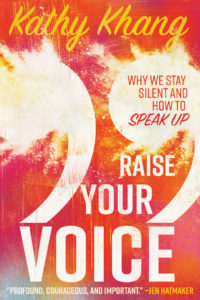 Raise Your Voice: Why We Stay Silent and How to Speak Up Kathy Khang (IVP) $16.00 I have mentioned this book a couple of times — at BookNotes and that special column I did in the Public Justice Report — and have been glad to get to recommend it. It is, as the titles says, a book about speaking up. It evaluates various motivations for civic involvement, tells how to be involved, and offers sage advise about civility and more. Nikki Toyama-Szeto, executive director of Evangelicals for Social Action, who knows a thing or two about all this, says “Raise Your Voice is honest, funny, and utterly practical.” Rachel Held Evans talks about its “integrity and holy force.“
Raise Your Voice: Why We Stay Silent and How to Speak Up Kathy Khang (IVP) $16.00 I have mentioned this book a couple of times — at BookNotes and that special column I did in the Public Justice Report — and have been glad to get to recommend it. It is, as the titles says, a book about speaking up. It evaluates various motivations for civic involvement, tells how to be involved, and offers sage advise about civility and more. Nikki Toyama-Szeto, executive director of Evangelicals for Social Action, who knows a thing or two about all this, says “Raise Your Voice is honest, funny, and utterly practical.” Rachel Held Evans talks about its “integrity and holy force.“
There are social forces (including our own families, as Khang herself experienced) who try to silence or diminish our voices. There are spiritual and emotional hurdles and prices to be paid for speaking up. Raise Your Voice will help avoid the ugly side of social media and help you navigate power dynamics and other barriers to overcome if we are going to be faithfully engaged in the public square. Although it pays special attention to the dynamics sometimes faced by women and people of color, this is for all of us, a fine and wise resource that is a fabulous read. Kudos, again, to IVP, for bringing to us a book that is unlike anything else available.
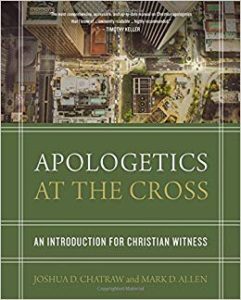 Apologetics at the Cross: An Introduction for Christian Witness Joshua D. Chatraw and Mark D. Allen (Zondervan) $34.99 We have bunches and bunches of books on evangelism, or storytelling the gospel, or apologetics both evidentialist and presuppositional and all manner of reasonable and postmodern styles. It is a fascinating field and I’m sad that more don’t deeply delve into resources to help them bear witness and help others along in the journey of coming to deeper and more confident faith. There is no doubt, though, that the art of apologetics, of being prepared to explain the hope we have in Christ, needs to be re-learned from generation to generation. In these times — influenced by social media and what Taylor called “The Secular Age” and the cynicism many have about religion — we simply have to be more savvy if we want to connect well with others, including the unchurched and the de-churched and the young who are making up their minds about faith in this hyper-modern, pluralizing social context. Apologetics at the Cross is a masterful, comprehensive guide that takes our cultural context seriously. It is presented like a lively textbook and is very highly recommended for personal use and for classes. (There is a remarkable set of video lectures on DVD by the author as well.)
Apologetics at the Cross: An Introduction for Christian Witness Joshua D. Chatraw and Mark D. Allen (Zondervan) $34.99 We have bunches and bunches of books on evangelism, or storytelling the gospel, or apologetics both evidentialist and presuppositional and all manner of reasonable and postmodern styles. It is a fascinating field and I’m sad that more don’t deeply delve into resources to help them bear witness and help others along in the journey of coming to deeper and more confident faith. There is no doubt, though, that the art of apologetics, of being prepared to explain the hope we have in Christ, needs to be re-learned from generation to generation. In these times — influenced by social media and what Taylor called “The Secular Age” and the cynicism many have about religion — we simply have to be more savvy if we want to connect well with others, including the unchurched and the de-churched and the young who are making up their minds about faith in this hyper-modern, pluralizing social context. Apologetics at the Cross is a masterful, comprehensive guide that takes our cultural context seriously. It is presented like a lively textbook and is very highly recommended for personal use and for classes. (There is a remarkable set of video lectures on DVD by the author as well.)
If you don’t believe me that a book of this nature deserves to be celebrated and promoted as a BookNotes Best of the Year, listen to this, from our friend Jamie Smith:
Just when you think this book is the comprehensive apologetics textbook you’ve been looking for–covering Scripture, history, philosophy, and culture–you realize it’s also something more: a creative, original proposal for an ‘inside-out’ apologetic that is precisely what we need in our secular age. If you’re skittish about ‘apologetics, ‘ like I am, this book will show you another way. — James K. A. Smith, professor of philosophy, Calvin College, and author of You Are What You Love
Or, how about this, from Timothy Keller, author of Reason for God and :
In our culture, the practice of apologetics has moved from being a ’boutique’ topic for specialists to being a requirement for even having a conversation with one’s neighbor. Joshua Chatraw and Mark Allen have produced the most comprehensive, accessible, and up-to-date manual on Christian apologetics that I know of. Despite how full its treatment of the subject, it is eminently readable. The authors present all the various approaches to apologetics respectfully, proposing their own pathway that incorporates a large range of insights from many disciplines and thinkers. Highly recommended. — Timothy Keller, pastor emeritus, the Redeemer Presbyterian Churches of New York City
BookNotes

SPECIAL
DISCOUNT
+++
ANY BOOK MENTIONED
20% OFF
+++
order here
this takes you to the secure Hearts & Minds order form page
just tell us what you want
inquire here
if you have questions or need more information
just ask us what you want to know
Hearts & Minds 234 East Main Street Dallastown PA 17313
read@heartsandmindsbooks.com
717-246-3333

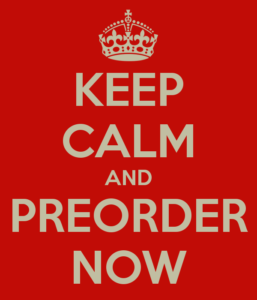 We can take pre-orders for nearly anything you are eager to snag; just let us know. We family-owned and operated, indie bookstores may not be super high-tech but we are what Leonard Sweet once called “high-touch.” We use the internet — sure — and I’m on-line a lot. But we give that personalized service that is as close as face-to-face real as we can get. (Apologies to my Lutheran pastor pal who put with with Epiphany jokes today as I answered her questions about getting books quickly. I’m glad she got it when I said her group finally saw the light.) So, ya want something? Give us a shout! Considering ordering something? Let us know how we can help. Wonder about a book you’ve heard about — maybe we can tell you more. Unless it is some super funky self-publisher who doesn’t deal with stores, or a sectarian publishing house that doesn’t offer wholesale prices to real stores (like LifeWay) we say we can get almost anything.
We can take pre-orders for nearly anything you are eager to snag; just let us know. We family-owned and operated, indie bookstores may not be super high-tech but we are what Leonard Sweet once called “high-touch.” We use the internet — sure — and I’m on-line a lot. But we give that personalized service that is as close as face-to-face real as we can get. (Apologies to my Lutheran pastor pal who put with with Epiphany jokes today as I answered her questions about getting books quickly. I’m glad she got it when I said her group finally saw the light.) So, ya want something? Give us a shout! Considering ordering something? Let us know how we can help. Wonder about a book you’ve heard about — maybe we can tell you more. Unless it is some super funky self-publisher who doesn’t deal with stores, or a sectarian publishing house that doesn’t offer wholesale prices to real stores (like LifeWay) we say we can get almost anything.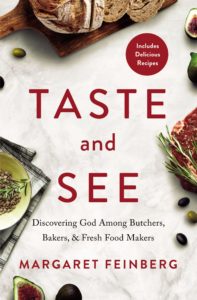 Bakers and Fresh Food Makers Margaret Feinberg (Zondervan) $22.99 / OUR SALE PRICE = $18.39 release date: 1/22/19
Bakers and Fresh Food Makers Margaret Feinberg (Zondervan) $22.99 / OUR SALE PRICE = $18.39 release date: 1/22/19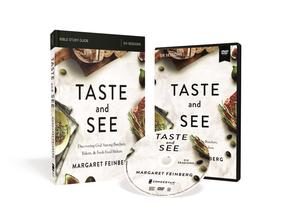 We already have the delectable six-week Taste and See DVD curriculum ($41.99 includes the DVD and one partipants guidebook; OUR SALE PRICE = $ 33.59) which could be a fun treat to use with your small group. You might have to forego cheap chips and soda for your Bible study snacks, but this could be fun. We recommend the book and the DVD, too and give a hearty shout-out to the always generous Ms. Feinberg for offering this whimsical, good, work to us all.
We already have the delectable six-week Taste and See DVD curriculum ($41.99 includes the DVD and one partipants guidebook; OUR SALE PRICE = $ 33.59) which could be a fun treat to use with your small group. You might have to forego cheap chips and soda for your Bible study snacks, but this could be fun. We recommend the book and the DVD, too and give a hearty shout-out to the always generous Ms. Feinberg for offering this whimsical, good, work to us all.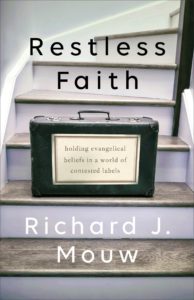 Restless Faith: Holding Evangelical Beliefs in a World of Contested Labels Richard J. Mouw (Brazos Press) $19.99 / OUR SALE PRICE = $15.99 release date: 2/19/29
Restless Faith: Holding Evangelical Beliefs in a World of Contested Labels Richard J. Mouw (Brazos Press) $19.99 / OUR SALE PRICE = $15.99 release date: 2/19/29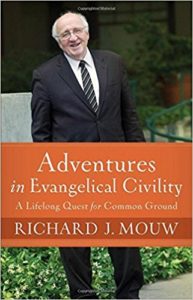 wrote his own memoir, less a full autobiography, but a memoir-like set of reflections about his own academic journey, the issues he has attended to, the reception he has gotten as he has spoken his evangelical mind in a real variety of settings. As the retired President of the world’s most multi-ethnic and trans-denominational seminary (Fuller) he obviously has been in the thick of all kind of conversations and his memoir, Adventures in Evangelical Civility shares not only his academic and social interests but how he tried to live out of a posture of civility. His wonderful Uncommon Decency is a call to Christian civility and his Adventures in… is his own story of being a leader who majors in that theme.
wrote his own memoir, less a full autobiography, but a memoir-like set of reflections about his own academic journey, the issues he has attended to, the reception he has gotten as he has spoken his evangelical mind in a real variety of settings. As the retired President of the world’s most multi-ethnic and trans-denominational seminary (Fuller) he obviously has been in the thick of all kind of conversations and his memoir, Adventures in Evangelical Civility shares not only his academic and social interests but how he tried to live out of a posture of civility. His wonderful Uncommon Decency is a call to Christian civility and his Adventures in… is his own story of being a leader who majors in that theme.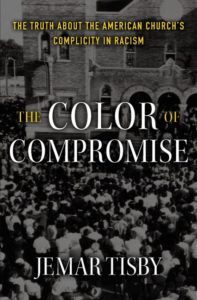 The Color of Compromise: The Truth About the American Church’s Complicity in Racism Jemar Tisby (Zondervan) $21.99 / OUR SALE PRICE = $17.59 release date: 1/22/19
The Color of Compromise: The Truth About the American Church’s Complicity in Racism Jemar Tisby (Zondervan) $21.99 / OUR SALE PRICE = $17.59 release date: 1/22/19 where he writes about race, religion, politics, and culture. Perhaps you have heard him as the cohost of the Pass the Mic podcast. He has a BA from Notre Dame and an MDiv from Reformed Theological Seminary (and doesn’t that just make him that much more interesting.) As a PhD candidate studying history and social reform movements of the twentieth century, he is increasingly becoming an expert in this space, offering an historian’s eye, even if he is writing about the rise of the religious right, the “new Jim Crow” or racial reconciliation in the age of #blacklivesmatters.
where he writes about race, religion, politics, and culture. Perhaps you have heard him as the cohost of the Pass the Mic podcast. He has a BA from Notre Dame and an MDiv from Reformed Theological Seminary (and doesn’t that just make him that much more interesting.) As a PhD candidate studying history and social reform movements of the twentieth century, he is increasingly becoming an expert in this space, offering an historian’s eye, even if he is writing about the rise of the religious right, the “new Jim Crow” or racial reconciliation in the age of #blacklivesmatters.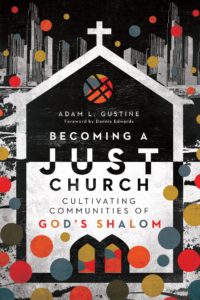 Becoming a Just Church: Cultivating Communities of God’s Shalom Adam L. Gustine (IVP) $17.00 / OUR SALE PRICE = $13.60 release date: 2/12/19
Becoming a Just Church: Cultivating Communities of God’s Shalom Adam L. Gustine (IVP) $17.00 / OUR SALE PRICE = $13.60 release date: 2/12/19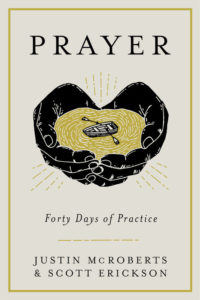 Prayer: Forty Days of Practice Justin McRoberts & Scott Erickson (Waterbrook) $16.99 / OUR SALE PRICE = $13.59 release date: 2/5/19
Prayer: Forty Days of Practice Justin McRoberts & Scott Erickson (Waterbrook) $16.99 / OUR SALE PRICE = $13.59 release date: 2/5/19 This is a prayer book, or a book about praying, or a devotional, unlike any you’ve ever seen. Trust me, it has these edgy, very contemporary art pieces by Scott that are themselves worth the price of the book, but they illuminate these pithy Kingdom sayings that Justin created. How these two creatives sat still enough to evoke the Holy One to speak through them is a mystery but I am sure God is behind this thrilling little, allusive book. It is, as the publisher of this new edition insists, “An invitation to intimacy with God.” Justin and Scott themselves put it like this: “We designed this book as a way of inviting you to contemplate your own life, the lives of those yo love and the presence of God in , though, and around all of it.”
This is a prayer book, or a book about praying, or a devotional, unlike any you’ve ever seen. Trust me, it has these edgy, very contemporary art pieces by Scott that are themselves worth the price of the book, but they illuminate these pithy Kingdom sayings that Justin created. How these two creatives sat still enough to evoke the Holy One to speak through them is a mystery but I am sure God is behind this thrilling little, allusive book. It is, as the publisher of this new edition insists, “An invitation to intimacy with God.” Justin and Scott themselves put it like this: “We designed this book as a way of inviting you to contemplate your own life, the lives of those yo love and the presence of God in , though, and around all of it.”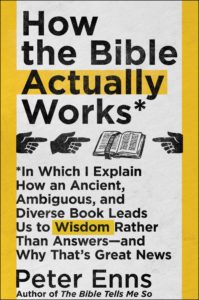 How the Bible Actually Works: In Which I Explain How an Ancient, Ambiguous, and Diverse Book Leads Us to Wisdom Rather Than Answers–And Why That’s Great News Peter Enns (HarperOne) $26.99 / OUR SALE PRICE = $21.59 release date: 2/19/19
How the Bible Actually Works: In Which I Explain How an Ancient, Ambiguous, and Diverse Book Leads Us to Wisdom Rather Than Answers–And Why That’s Great News Peter Enns (HarperOne) $26.99 / OUR SALE PRICE = $21.59 release date: 2/19/19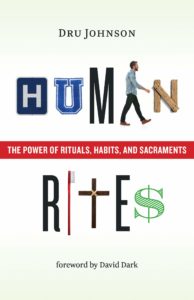 Human Rites: The Power of Rituals, Habits and Sacraments Dru Johnson (Eerdmans) $17.99 / OUR SALE PRICE $14.39 release date: 2/21/19
Human Rites: The Power of Rituals, Habits and Sacraments Dru Johnson (Eerdmans) $17.99 / OUR SALE PRICE $14.39 release date: 2/21/19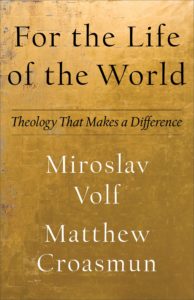 For the Life of the World: Theology That Makes Difference Miroslav Volf & Matthew Croasmun (Brazos Press) $21.99 / OUR SALE PRICE $17.59 release date: 1/22/19
For the Life of the World: Theology That Makes Difference Miroslav Volf & Matthew Croasmun (Brazos Press) $21.99 / OUR SALE PRICE $17.59 release date: 1/22/19 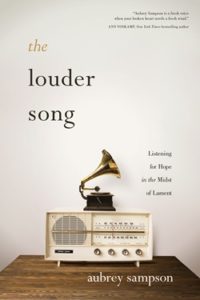 The Louder Song: Listening for Hope in the Midst of Lament Aubrey Sampson (NavPress) $15.99 / OUR SALE PRICE = $12.79 release date: 2/5/19
The Louder Song: Listening for Hope in the Midst of Lament Aubrey Sampson (NavPress) $15.99 / OUR SALE PRICE = $12.79 release date: 2/5/19 And so, I’ll admit, when I read the long list of tragedies that befell this young woman — herself struck with a painful, chronic illness — I feared it would just be another rather sentimental story of God’s love for her through it all, fine but not terribly substantive. But, my-oh-my, is this a strong, thoughtful, gripping book. Yes, Aubrey Sampson has suffered more than most, and yes, she tells about her grief and loss and struggle and pain. But this is also an apologetic for and study of lament, one of the few very good books on this topic. In The Louder Song she explores what it is like to have exploding grief and to be able to cry out; how, indeed, God uses lament to lead us between (as she puts it) “The Already and Not Yet.”
And so, I’ll admit, when I read the long list of tragedies that befell this young woman — herself struck with a painful, chronic illness — I feared it would just be another rather sentimental story of God’s love for her through it all, fine but not terribly substantive. But, my-oh-my, is this a strong, thoughtful, gripping book. Yes, Aubrey Sampson has suffered more than most, and yes, she tells about her grief and loss and struggle and pain. But this is also an apologetic for and study of lament, one of the few very good books on this topic. In The Louder Song she explores what it is like to have exploding grief and to be able to cry out; how, indeed, God uses lament to lead us between (as she puts it) “The Already and Not Yet.”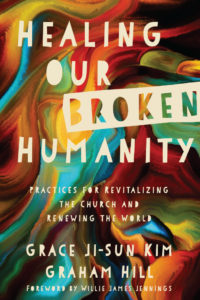 Happily, lots of recent books these days shout this out clearly. Just for instance, Whitaker House is a revivalist/charismatic publisher and they just released a book called Jesus’ Economy: A Biblical View of Poverty, The Currency of Love, and a Pattern for Lasting Change by John Barry, an pastor and editor of the FaithLife Study Bible. Earlier this year, Grace Ji-Sun Kim co-wrote Healing Our Broken Humanity: Practices for Revitalizing the Church and Renewing the World. (A month ago I even wrote a review essay in CPJ’s
Happily, lots of recent books these days shout this out clearly. Just for instance, Whitaker House is a revivalist/charismatic publisher and they just released a book called Jesus’ Economy: A Biblical View of Poverty, The Currency of Love, and a Pattern for Lasting Change by John Barry, an pastor and editor of the FaithLife Study Bible. Earlier this year, Grace Ji-Sun Kim co-wrote Healing Our Broken Humanity: Practices for Revitalizing the Church and Renewing the World. (A month ago I even wrote a review essay in CPJ’s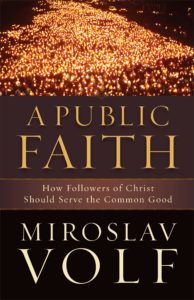
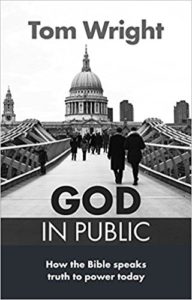 A recent collection of essays by N.T. Wright about “speaking truth to power” is simply called God in Public. A nice paperback by Miroslav Volf (on which I happen to have an endorsing blurb) is called A Public Faith: How Followers of Christ Should Serve the Common Good and, as you will hear about in our next BookNotes, he has a brand new one coming soon called For the Life of the World: Theology That Makes a Difference. Yes! That’s it!
A recent collection of essays by N.T. Wright about “speaking truth to power” is simply called God in Public. A nice paperback by Miroslav Volf (on which I happen to have an endorsing blurb) is called A Public Faith: How Followers of Christ Should Serve the Common Good and, as you will hear about in our next BookNotes, he has a brand new one coming soon called For the Life of the World: Theology That Makes a Difference. Yes! That’s it!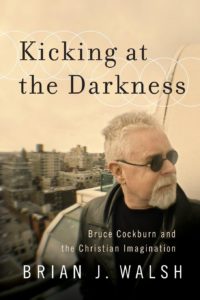 Bruce Cockburn. My pal Brian Walsh has written the very best book about how an artfully Christian imagination can address so very much about the world we live in, in his careful study of Cockburn’s lyrics and social vision called Kicking at the Darkness: Bruce Cockburn and the Christian Imagination (Brazos Press; $19.00.) Even if you haven’t read this book (and you should, even if you don’t know about his many albums!) you might have heard of Cockburn. Even U2 cited him in their song “God Part 2” making famous his line about “kicking at the darkness til it bleeds daylight.” And I’ve sometimes quoted his blazing powerhouse rocker “Call It Democracy” which I’ve quipped is the only rock song about the International Monetary Fund.
Bruce Cockburn. My pal Brian Walsh has written the very best book about how an artfully Christian imagination can address so very much about the world we live in, in his careful study of Cockburn’s lyrics and social vision called Kicking at the Darkness: Bruce Cockburn and the Christian Imagination (Brazos Press; $19.00.) Even if you haven’t read this book (and you should, even if you don’t know about his many albums!) you might have heard of Cockburn. Even U2 cited him in their song “God Part 2” making famous his line about “kicking at the darkness til it bleeds daylight.” And I’ve sometimes quoted his blazing powerhouse rocker “Call It Democracy” which I’ve quipped is the only rock song about the International Monetary Fund.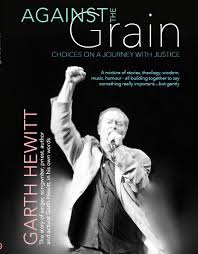 Which is all a very long way of introducing the fabulous new book by a British musician named Garth Hewitt called Against the Grain: Choices on a Journey with Justice (published by the Garth Hewitt Foundation) $20.00; our sale price = $16.00.
Which is all a very long way of introducing the fabulous new book by a British musician named Garth Hewitt called Against the Grain: Choices on a Journey with Justice (published by the Garth Hewitt Foundation) $20.00; our sale price = $16.00. As a spokesperson for many wholistic ministry organizations such as TearFund, Mr. Hewitt went places. He listened and learned. He got involved. If Bruce Cockburn travelled a lot and wrote some truly great songs about his travels from war zones and refugee camps and such, and did properly allusive/aesthetic musical reporting, Hewitt actually worked in those places. He spent less time making records (although he made a lot) and more times making change. He did what he felt called to, and lived and learned as a faith-based social activist. His work among the suffering informed his take on the world and the sorts of music he did. He’s an artist and a minister; he’s a songwriter for justice and also a spokesperson, scholar, leader, organizer of a nonprofit organization.
As a spokesperson for many wholistic ministry organizations such as TearFund, Mr. Hewitt went places. He listened and learned. He got involved. If Bruce Cockburn travelled a lot and wrote some truly great songs about his travels from war zones and refugee camps and such, and did properly allusive/aesthetic musical reporting, Hewitt actually worked in those places. He spent less time making records (although he made a lot) and more times making change. He did what he felt called to, and lived and learned as a faith-based social activist. His work among the suffering informed his take on the world and the sorts of music he did. He’s an artist and a minister; he’s a songwriter for justice and also a spokesperson, scholar, leader, organizer of a nonprofit organization.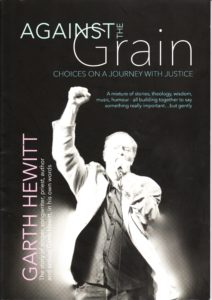
 Hewitt, it is said, writes “redemption songs and then sings them without fear.” From working with the Dalits in India and the abused Palestinians in Gaza and peasants in Africa longing for faith and justice, he and Gil have been there. This is the story of a thoughtful Christian, a global activist, and a dynamic performing artist. It isn’t every overtly Christian book that carries endorsements from Muslim leaders and serious singer-songwriters like Martyn Jospeh, himself quite an artful singer/activist.
Hewitt, it is said, writes “redemption songs and then sings them without fear.” From working with the Dalits in India and the abused Palestinians in Gaza and peasants in Africa longing for faith and justice, he and Gil have been there. This is the story of a thoughtful Christian, a global activist, and a dynamic performing artist. It isn’t every overtly Christian book that carries endorsements from Muslim leaders and serious singer-songwriters like Martyn Jospeh, himself quite an artful singer/activist.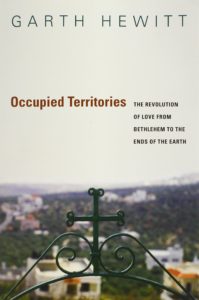 GHF and Amos Trust for inviting us to be their US contact. What an honor!
GHF and Amos Trust for inviting us to be their US contact. What an honor!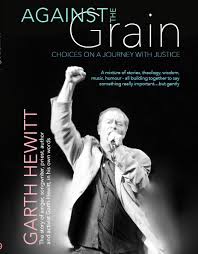

 Advent: The Once & Future Coming of Jesus Christ Rev. Fleming Rutledge (Eerdmans) $30.00
Advent: The Once & Future Coming of Jesus Christ Rev. Fleming Rutledge (Eerdmans) $30.00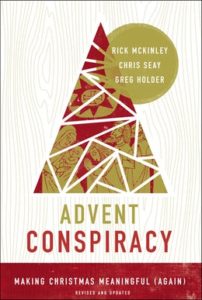 Advent Conspiracy: Making Christmas Meaningful (Again) Rick McKinley, Chris Seay & Greg Holder (Zondervan) $14.99 Every year we convince somebody to use (and they thank us!) the Advent Conspiracy DVDs where these three youngish, hip, pastors share with Biblical acumen and honest communication just how hard it is to preach during Advent, how so many church folks are seduced — maybe even against their will and better judgement — by the materialism of the mall and the sentimentalism of our current views of the holidays. Whose birthday is it anyway? How can we subvert those tellings of the tale, and get back to the raw and edgy and controversial and somewhat disturbing narratives of the Bible itself? The videos are clever and interesting and upbeat; the book is fantastic. These pastors joined together to take the risk of inviting their congregants to spend less, give more, worship well, and love everybody. They expected a lot of push-back, it seems, but folks were relieved; you mean we don’t have to live like this, enduring this stress and debt and anxiety in December? Members young and old from all three churches agreed — we can say no to the secularized narrative and search out another set of practices, grounded in the truest meaning of the story. Now there’s some subversive stuff!
Advent Conspiracy: Making Christmas Meaningful (Again) Rick McKinley, Chris Seay & Greg Holder (Zondervan) $14.99 Every year we convince somebody to use (and they thank us!) the Advent Conspiracy DVDs where these three youngish, hip, pastors share with Biblical acumen and honest communication just how hard it is to preach during Advent, how so many church folks are seduced — maybe even against their will and better judgement — by the materialism of the mall and the sentimentalism of our current views of the holidays. Whose birthday is it anyway? How can we subvert those tellings of the tale, and get back to the raw and edgy and controversial and somewhat disturbing narratives of the Bible itself? The videos are clever and interesting and upbeat; the book is fantastic. These pastors joined together to take the risk of inviting their congregants to spend less, give more, worship well, and love everybody. They expected a lot of push-back, it seems, but folks were relieved; you mean we don’t have to live like this, enduring this stress and debt and anxiety in December? Members young and old from all three churches agreed — we can say no to the secularized narrative and search out another set of practices, grounded in the truest meaning of the story. Now there’s some subversive stuff!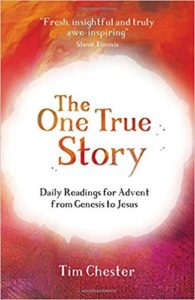 The One True Story: Daily Readings for Advent from Genesis to Jesus Tim Chester (The Good Book Company) $7.99 You may recall us saying (in either this year’s Advent newsletter blog or maybe last years) that this is truly one of the very best books to show the unfolding drama of Scripture as it moves us towards the “dawn of redeeming grace.” In fact, it may be that Christ’s coming is more the beginning of the conclusion and fuller consummation of a longer story, since the dawn was hinted at in covenant and hope and promise in stories from Genesis onward. That’s what this book is about. The One True Story paperback has 24 short meditative readings on bible stories, including ideas for reflection, prayer, and even application. These devotionals truly offer Bible-based, gospel-centered, promise and deliverance, hope and joy. HIi
The One True Story: Daily Readings for Advent from Genesis to Jesus Tim Chester (The Good Book Company) $7.99 You may recall us saying (in either this year’s Advent newsletter blog or maybe last years) that this is truly one of the very best books to show the unfolding drama of Scripture as it moves us towards the “dawn of redeeming grace.” In fact, it may be that Christ’s coming is more the beginning of the conclusion and fuller consummation of a longer story, since the dawn was hinted at in covenant and hope and promise in stories from Genesis onward. That’s what this book is about. The One True Story paperback has 24 short meditative readings on bible stories, including ideas for reflection, prayer, and even application. These devotionals truly offer Bible-based, gospel-centered, promise and deliverance, hope and joy. HIi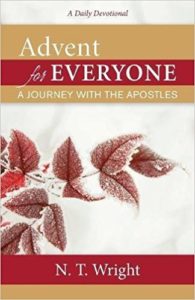
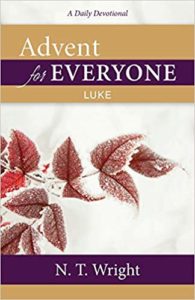
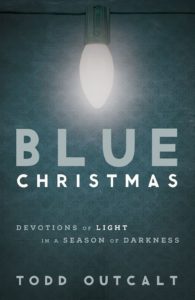 Blue Christmas: Devotions of Light in a Season of Darkness Todd Outcalt (Abingdon) $9.99 I think this is so good, so important, so helpful, and I invite you to buy one or two on sale and wait for the opportunity to share them with somebody you know. This devotional accompanies the reader through the four weeks of Advent with Scripture, meditation, prayer and suggested application, as many such books do, but with an expectation that the reader gloomy or sad, in grief or perplexed with hard times. Can those walking in darkness find comfort in the Light? Even though this season often magnifies loneliness and anxiety (and sometimes despair) with “death’s dark shadows” this honest devotional “meets people where they are — in their hurts, fears, and disappointments.”
Blue Christmas: Devotions of Light in a Season of Darkness Todd Outcalt (Abingdon) $9.99 I think this is so good, so important, so helpful, and I invite you to buy one or two on sale and wait for the opportunity to share them with somebody you know. This devotional accompanies the reader through the four weeks of Advent with Scripture, meditation, prayer and suggested application, as many such books do, but with an expectation that the reader gloomy or sad, in grief or perplexed with hard times. Can those walking in darkness find comfort in the Light? Even though this season often magnifies loneliness and anxiety (and sometimes despair) with “death’s dark shadows” this honest devotional “meets people where they are — in their hurts, fears, and disappointments.”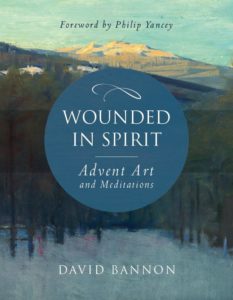 Wounded in Spirit: Advent Art and Meditations David Bannon (Paraclete Press) $29.99 I raved about this earlier in the season, explaining that Bannon is himself a bit of a hurting man (he’s had some of his own struggles and his adult daughter died in an awful story.) Alas, he has been drawn to paintings that evoke lament and that honor the grief of these hard times. The paintings are mostly older, classic, even (Gauguin, Delacroix, Van Gogh, and more) and often done by artists who themselves were facing deep disappointments. Besides his own informative and tender prose, Bannon adds remarkable lines from poets and writers and thinkers — from N.T. Wright to Barbara Brown Taylor, Philip Yancey, Bonhoeffer, Nouwen, Paul Tournier, Joan of Arc, and more. He shares a bit about the latest research on grief. Yet, these rich daily reflections are more than an admitted “pilgrimage of brokenness.” Wounded in Spirit is a book of lovely, tangible hope. We sold out of this in the first week after we highlighted it and ordered more. A few customers even re-ordered, having given away the one they purchased from themselves. We have a stack still, now, so why not pick one up at this extra discounted price? I assure you, it will be useful to read at any time of year and a favorite you will return to over and over.
Wounded in Spirit: Advent Art and Meditations David Bannon (Paraclete Press) $29.99 I raved about this earlier in the season, explaining that Bannon is himself a bit of a hurting man (he’s had some of his own struggles and his adult daughter died in an awful story.) Alas, he has been drawn to paintings that evoke lament and that honor the grief of these hard times. The paintings are mostly older, classic, even (Gauguin, Delacroix, Van Gogh, and more) and often done by artists who themselves were facing deep disappointments. Besides his own informative and tender prose, Bannon adds remarkable lines from poets and writers and thinkers — from N.T. Wright to Barbara Brown Taylor, Philip Yancey, Bonhoeffer, Nouwen, Paul Tournier, Joan of Arc, and more. He shares a bit about the latest research on grief. Yet, these rich daily reflections are more than an admitted “pilgrimage of brokenness.” Wounded in Spirit is a book of lovely, tangible hope. We sold out of this in the first week after we highlighted it and ordered more. A few customers even re-ordered, having given away the one they purchased from themselves. We have a stack still, now, so why not pick one up at this extra discounted price? I assure you, it will be useful to read at any time of year and a favorite you will return to over and over.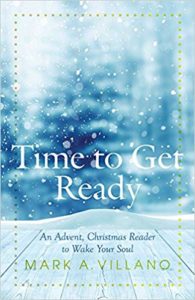 Time to Get Ready: An Advent, Christmas Reader to Wake Your Soul Mark A. Villano (Paraclete Press) $16.99 We raved about this in an earlier Advent BookNotes newsletter — Villano has a MDiv from Catholic University, has done campus ministry, he has an MFA from the School of Cinematic Arts at USC so has done some pretty nifty stuff. I’m impressed. This substantive book is both gentle and deeply in the tradition of contemplative formation even as it is richly colorfu and culturally relevant Endorsements are from contemplatives like Ron Rolheiser and Wilkie Au. Rose Pacatte says it “breathes silence and grace as Villano draws from Scripture, literature, film and life to create this gentle tome for Advent.” Nice.
Time to Get Ready: An Advent, Christmas Reader to Wake Your Soul Mark A. Villano (Paraclete Press) $16.99 We raved about this in an earlier Advent BookNotes newsletter — Villano has a MDiv from Catholic University, has done campus ministry, he has an MFA from the School of Cinematic Arts at USC so has done some pretty nifty stuff. I’m impressed. This substantive book is both gentle and deeply in the tradition of contemplative formation even as it is richly colorfu and culturally relevant Endorsements are from contemplatives like Ron Rolheiser and Wilkie Au. Rose Pacatte says it “breathes silence and grace as Villano draws from Scripture, literature, film and life to create this gentle tome for Advent.” Nice.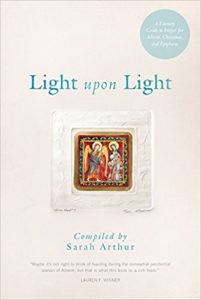 Light upon Light: A Literary Guide to Prayer for Advent, Christmas, and Epiphany compiled by Sarah Arthur (Paraclete Press) $18.99 We have often touted this and the others in her trilogy of “prayer books” filled with literary quotes and poems, excerpts of novels and stories, good lines for devotional use, offered for daily and weekly settings. The others are At the Still Point: A Literary Guide to Prayer in Ordinary Time and Between Midnight and Dawn: A Literary Guide to Prayer for Lent, Holy Week, and Eastertide. All are handsome paperbacks with “French Fold” covers, full of good lit, classic and contemporary, artful and useful. Endorsements on the back from the likes of musician and theological aesthetics scholar Jeremy Begbie and poet Luci Shaw and lit prof Jilll Pelaez Baumgaertner are, understandably, enchanting.
Light upon Light: A Literary Guide to Prayer for Advent, Christmas, and Epiphany compiled by Sarah Arthur (Paraclete Press) $18.99 We have often touted this and the others in her trilogy of “prayer books” filled with literary quotes and poems, excerpts of novels and stories, good lines for devotional use, offered for daily and weekly settings. The others are At the Still Point: A Literary Guide to Prayer in Ordinary Time and Between Midnight and Dawn: A Literary Guide to Prayer for Lent, Holy Week, and Eastertide. All are handsome paperbacks with “French Fold” covers, full of good lit, classic and contemporary, artful and useful. Endorsements on the back from the likes of musician and theological aesthetics scholar Jeremy Begbie and poet Luci Shaw and lit prof Jilll Pelaez Baumgaertner are, understandably, enchanting. God With Us: Rediscovering the Meaning of Christmas (Reader’s Edition) edited by Greg Pennoyer & Gregory Wolfe (Paraclete Press) $18.99 This has been a perennial best seller for us, especially back when it was loaded with full color art. Alas, this is not that, but as a “Reader’s Edition” focuses one’s attention on the wisdom and eloquence and deep insight of authors Beth Bevis, Scott Cairns, Emilie Griffin, Richard John Neuhaus, Kathleen Norris, Eugene Peterson and Luci Shaw. Pennnoyer & Wolfe (formerly editor of Image journal) used their thoughtful theological and aesthetic training to bring beautiful writing to us in what remains on of our era’s most remarkable Advent, Christmas, and Epiphany resources.
God With Us: Rediscovering the Meaning of Christmas (Reader’s Edition) edited by Greg Pennoyer & Gregory Wolfe (Paraclete Press) $18.99 This has been a perennial best seller for us, especially back when it was loaded with full color art. Alas, this is not that, but as a “Reader’s Edition” focuses one’s attention on the wisdom and eloquence and deep insight of authors Beth Bevis, Scott Cairns, Emilie Griffin, Richard John Neuhaus, Kathleen Norris, Eugene Peterson and Luci Shaw. Pennnoyer & Wolfe (formerly editor of Image journal) used their thoughtful theological and aesthetic training to bring beautiful writing to us in what remains on of our era’s most remarkable Advent, Christmas, and Epiphany resources.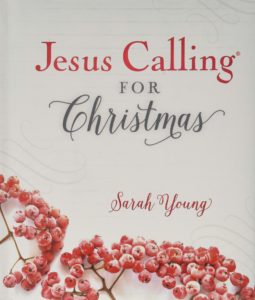 Jesus Calling for Christmas Sarah Young (Thomas Nelson) $15.99 I suppose you know the mega-selling Jesus Calling and the others in that hugely popular series of books. Their genre is simple and moving — author Sarah Young imagines what it might be like if Jesus wrote a real letter to her, offering presence and assurance and comfort and joy. Of course, this is all imagined, so you needn’t listen to any grouchy critics that suggest she implies these are “real” revelations like some new age prophecy. No, this is just an imaginative, time-worn genre, doing a short, touching devotional format supposing God is calling out to us, writing to us personally. Kinda like the incarnation, eh?
Jesus Calling for Christmas Sarah Young (Thomas Nelson) $15.99 I suppose you know the mega-selling Jesus Calling and the others in that hugely popular series of books. Their genre is simple and moving — author Sarah Young imagines what it might be like if Jesus wrote a real letter to her, offering presence and assurance and comfort and joy. Of course, this is all imagined, so you needn’t listen to any grouchy critics that suggest she implies these are “real” revelations like some new age prophecy. No, this is just an imaginative, time-worn genre, doing a short, touching devotional format supposing God is calling out to us, writing to us personally. Kinda like the incarnation, eh? This square sized book has a nice padded cover edition, a bit bigger than the palm-sized Jesus Calling, Jesus Waiting, and Jesus Lives. There are plenty of Biblical texts and much evangelical tenderness. By the way, the inside of Jesus Calling for Christmas is laden with beautiful, full-color, wintery photos, making this just a beautiful little gift book for this time of year; the nice cover hardly does it justice. It is all very nicely presented and a very nice book. We’ve got some left, so order them while supplies last.
This square sized book has a nice padded cover edition, a bit bigger than the palm-sized Jesus Calling, Jesus Waiting, and Jesus Lives. There are plenty of Biblical texts and much evangelical tenderness. By the way, the inside of Jesus Calling for Christmas is laden with beautiful, full-color, wintery photos, making this just a beautiful little gift book for this time of year; the nice cover hardly does it justice. It is all very nicely presented and a very nice book. We’ve got some left, so order them while supplies last.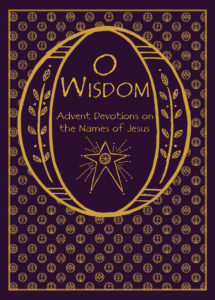 O Wisdom: Advent Devotions on the Names of Jesus Rachel Jones, editor (Forward Movement) $7.00 This is a nice little devotional of short daily readings (and a few poems and lots of quotes from the Book of Common Prayer) all drawing on and pointing us to the “O Antiphons.” There are bidding prayers and collects from St. Mark’s Episcopal Cathedral in Seattle and woodcuts from St. Bartholomew’s Episcopal Church in Nashville but the writing is a compilation of various writers, mostly ordinary folks, each drawing on the names of Jesus as presented in Isaiah.
O Wisdom: Advent Devotions on the Names of Jesus Rachel Jones, editor (Forward Movement) $7.00 This is a nice little devotional of short daily readings (and a few poems and lots of quotes from the Book of Common Prayer) all drawing on and pointing us to the “O Antiphons.” There are bidding prayers and collects from St. Mark’s Episcopal Cathedral in Seattle and woodcuts from St. Bartholomew’s Episcopal Church in Nashville but the writing is a compilation of various writers, mostly ordinary folks, each drawing on the names of Jesus as presented in Isaiah. Virgil Wander: A Novel Leif Enger (Atlantic Monthly Press) $27.00 What a solid hardback, what a long-awaited book. I know a number of folks (including a few Christian non-fiction authors and bloggers) who say Mr. Enger’s Peace Like a River is one of their all-time favorite stories — mysterious, dramatic, poignant, tender as it is. He’s a great talent, a fabulously interesting storyteller, and a solid Midwestern “American Balladeer” as NPR called him. In this story, Virgil is the owner of a small town cinema who, after a car accident, loses much of his memory and is trying to piece his life back together Can the whole down-on-their-luck town find renewal along with the other cast of characters seeking some kind of redemption? This has gotten good reviews at all the most respected places and I’m sure will be used as book clubs choices. It would make a fine gift idea.
Virgil Wander: A Novel Leif Enger (Atlantic Monthly Press) $27.00 What a solid hardback, what a long-awaited book. I know a number of folks (including a few Christian non-fiction authors and bloggers) who say Mr. Enger’s Peace Like a River is one of their all-time favorite stories — mysterious, dramatic, poignant, tender as it is. He’s a great talent, a fabulously interesting storyteller, and a solid Midwestern “American Balladeer” as NPR called him. In this story, Virgil is the owner of a small town cinema who, after a car accident, loses much of his memory and is trying to piece his life back together Can the whole down-on-their-luck town find renewal along with the other cast of characters seeking some kind of redemption? This has gotten good reviews at all the most respected places and I’m sure will be used as book clubs choices. It would make a fine gift idea.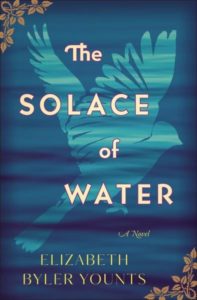 The Solace of Water: A Novel Elizabeth Byler Younts (Thomas Nelson) $15.99 This is one of those novels that some serious readers may not know about. Yes, it is an Amish story; yes, it is on a religious publishing house. Amish romances by evangelical authors have become quite the thing, and some are okay and some are pretty cheesy. This story, though, is remarkable. It is set in central Pennsylvania in the 1950s as an African American family moves there from the deep South and the wife and grieving mother is befriended by a wife and grieving mother of the Anabaptist Amish community. Kudos to Byler Younts and Nelson publishing for doing such a daring, moving book that tells a good story and pulls readers in to a study of grief and isolation and friendship and differences.
The Solace of Water: A Novel Elizabeth Byler Younts (Thomas Nelson) $15.99 This is one of those novels that some serious readers may not know about. Yes, it is an Amish story; yes, it is on a religious publishing house. Amish romances by evangelical authors have become quite the thing, and some are okay and some are pretty cheesy. This story, though, is remarkable. It is set in central Pennsylvania in the 1950s as an African American family moves there from the deep South and the wife and grieving mother is befriended by a wife and grieving mother of the Anabaptist Amish community. Kudos to Byler Younts and Nelson publishing for doing such a daring, moving book that tells a good story and pulls readers in to a study of grief and isolation and friendship and differences.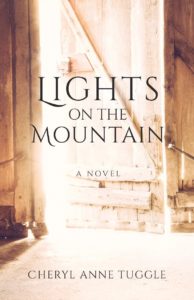 Lights on the Mountain: A Novel Cheryl Anne Tuggle (Paraclete Press $17.99 This, too, is set in Pennsylvania, this time out in Western PA farmland. The story is written by an Orthodox writer and is set on a farm, and is about farming. (Move over Wendell Berry I can hear some saying!) Young Jess Hazel, the main character in the story, inherits his parents farm when he loses them in a farm accident. As it says on the back cover, “Unable to shake the memory of a strange light he has seen hovering the mountain peak above his valley home, he embarks on a pilgrimage — a halting inner odyssey riddled with fits and false starts.”
Lights on the Mountain: A Novel Cheryl Anne Tuggle (Paraclete Press $17.99 This, too, is set in Pennsylvania, this time out in Western PA farmland. The story is written by an Orthodox writer and is set on a farm, and is about farming. (Move over Wendell Berry I can hear some saying!) Young Jess Hazel, the main character in the story, inherits his parents farm when he loses them in a farm accident. As it says on the back cover, “Unable to shake the memory of a strange light he has seen hovering the mountain peak above his valley home, he embarks on a pilgrimage — a halting inner odyssey riddled with fits and false starts.”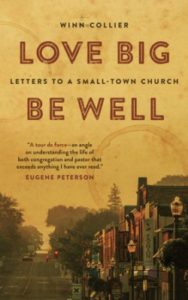 Love Big Be Well: Letters to a Small-Town Church Winn Collier (Eerdmans) $16.99 This may be the fifth or sixth time we’ve recommend this here at BooKnotes and those who have allowed us to speak up front at their gatherings where we have book displays will know that I’ve promoted it vigorously. We often say that pastors and church leaders should read it because, well, even though it is a novel, it gets at the nature of congregations and the meaning of church so well. That quote from Eugene Peterson is an author’s dream. I cite it all the time when trying to convince people to read this book.
Love Big Be Well: Letters to a Small-Town Church Winn Collier (Eerdmans) $16.99 This may be the fifth or sixth time we’ve recommend this here at BooKnotes and those who have allowed us to speak up front at their gatherings where we have book displays will know that I’ve promoted it vigorously. We often say that pastors and church leaders should read it because, well, even though it is a novel, it gets at the nature of congregations and the meaning of church so well. That quote from Eugene Peterson is an author’s dream. I cite it all the time when trying to convince people to read this book.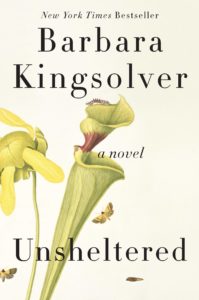 Unsheltered: A Novel Barbara Kingsolver (Harper) $29.99 I finished this a week ago and am still pondering it. This is profound and complicated but the short version is this: every other chapter tells of the lives of two families that reside in the same house in Vineland, New Jersey, one in the late 1800s and one in contemporary times. The house is falling apart which becomes an obvious metaphor for their struggles as families and for the town itself. Did you know that Vineland was an early planned community (founded by a guy named Landis who later moved to Central Pennsylvania?) Much of the plot of the story of the first family, set in the 1800s, is about a science teacher and, without spoiling too much, a character who is corresponding with Charles Darwin and Asa Gray, and a renegade newspaperman who is telling the truth about some of Landis’s injustices. The contemporary story — in that same house — is about an adjunct college prof and his wife, who is taking care of a brand new grand-baby (whose mother, their daughter in law, committed suicide shortly after childbirth.) There’s a lot of politics in this as you’d expect from the ecologically-minded, lefty Kingsolver (one of the daughters of the contemporary couple just got back from living in Cuba for a while and disapproves of her brother’s work in the financial sector.) The New York Times review said
Unsheltered: A Novel Barbara Kingsolver (Harper) $29.99 I finished this a week ago and am still pondering it. This is profound and complicated but the short version is this: every other chapter tells of the lives of two families that reside in the same house in Vineland, New Jersey, one in the late 1800s and one in contemporary times. The house is falling apart which becomes an obvious metaphor for their struggles as families and for the town itself. Did you know that Vineland was an early planned community (founded by a guy named Landis who later moved to Central Pennsylvania?) Much of the plot of the story of the first family, set in the 1800s, is about a science teacher and, without spoiling too much, a character who is corresponding with Charles Darwin and Asa Gray, and a renegade newspaperman who is telling the truth about some of Landis’s injustices. The contemporary story — in that same house — is about an adjunct college prof and his wife, who is taking care of a brand new grand-baby (whose mother, their daughter in law, committed suicide shortly after childbirth.) There’s a lot of politics in this as you’d expect from the ecologically-minded, lefty Kingsolver (one of the daughters of the contemporary couple just got back from living in Cuba for a while and disapproves of her brother’s work in the financial sector.) The New York Times review said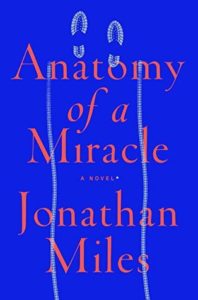 Anatomy of a Miracle: A Novel Jonathan Miles (Hogarth/Random House) $27.00 Speaking of vulgar, vulgar novels that are about God and faith and the meaning of things, I adored Anatomy of a Miracle (and the previous, very thought provoking novel by Miles, Dear American Airlines and, especially, Want.) As I said in my BookNotes review this summer, he is theologically aware (quoting C.S. Lewis and others about the theodicy question) and portrays different sorts of skeptics, seekers, believers, and charlatans, all really, really well. In this story, a handicapped Afghanistan war vet one day just gets up out of his wheelchair while heading to the local convenience store to buy some smokes. (You can see this is the book cover, which I don’t love, but is, admittedly clever.) The parking lot of Biz-E-Bee, right there in post-Katrina Biloxi, Mississippi, becomes a pilgrimage site as others seeking healing flock there. In the meantime both a serious theologian from the Vatican — you learn why as the story unfolds — and the doctor of the now-walking/healed vet are trying to determine what in the world happened. For the secularist scientist, there simply cannot be such a thing as a miracle, so she has to run bunches of neurological and psychological tests to figure how the inexplicable happened. (Maybe he never was really a paraplegic? Maybe he’s a nut job, or a fraud?) When the reality TV show people come in with tinsel town promises (what a way to help others, they say!) all hell breaks loose.
Anatomy of a Miracle: A Novel Jonathan Miles (Hogarth/Random House) $27.00 Speaking of vulgar, vulgar novels that are about God and faith and the meaning of things, I adored Anatomy of a Miracle (and the previous, very thought provoking novel by Miles, Dear American Airlines and, especially, Want.) As I said in my BookNotes review this summer, he is theologically aware (quoting C.S. Lewis and others about the theodicy question) and portrays different sorts of skeptics, seekers, believers, and charlatans, all really, really well. In this story, a handicapped Afghanistan war vet one day just gets up out of his wheelchair while heading to the local convenience store to buy some smokes. (You can see this is the book cover, which I don’t love, but is, admittedly clever.) The parking lot of Biz-E-Bee, right there in post-Katrina Biloxi, Mississippi, becomes a pilgrimage site as others seeking healing flock there. In the meantime both a serious theologian from the Vatican — you learn why as the story unfolds — and the doctor of the now-walking/healed vet are trying to determine what in the world happened. For the secularist scientist, there simply cannot be such a thing as a miracle, so she has to run bunches of neurological and psychological tests to figure how the inexplicable happened. (Maybe he never was really a paraplegic? Maybe he’s a nut job, or a fraud?) When the reality TV show people come in with tinsel town promises (what a way to help others, they say!) all hell breaks loose.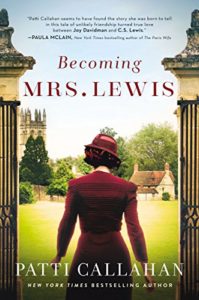 Becoming Mrs. Lewis Patti Callahan (Thomas Nelson) $25.99 This new novel should be flying off our shelves. We are sure you know somebody that would be just delighted to get it as a gift. I do not have to say much, only that there are pages and pages of good reviews of Patti Callahan’s writing and storytelling. (She sometimes writes as Patti Callahan Henry.) She has been a finalist in significant literary awards, has been an IndiePick (favs of indie bookstores) and is especially known in the South. (She resides in Alabama and South Carolina.) That her books (such as The Bookshop at Waters Edge or Coming Up for Air or Driftwood Summer and many more) have been regular best sellers illustrates her popularity, that she writes in a way that resonates with many. The endorsements are from other really popular writers such as Lisa Wingate and Mary Alice Monroe and Charles Martin which assures you that this is readable, entertaining stuff.
Becoming Mrs. Lewis Patti Callahan (Thomas Nelson) $25.99 This new novel should be flying off our shelves. We are sure you know somebody that would be just delighted to get it as a gift. I do not have to say much, only that there are pages and pages of good reviews of Patti Callahan’s writing and storytelling. (She sometimes writes as Patti Callahan Henry.) She has been a finalist in significant literary awards, has been an IndiePick (favs of indie bookstores) and is especially known in the South. (She resides in Alabama and South Carolina.) That her books (such as The Bookshop at Waters Edge or Coming Up for Air or Driftwood Summer and many more) have been regular best sellers illustrates her popularity, that she writes in a way that resonates with many. The endorsements are from other really popular writers such as Lisa Wingate and Mary Alice Monroe and Charles Martin which assures you that this is readable, entertaining stuff.
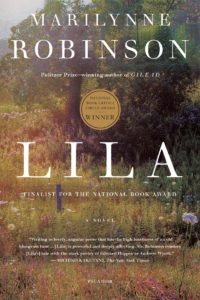 Home Marilynne Robinson (Picador) $15.00 and Lila Marilynne Robinson (Picador) $16.00 These are the two sequels to the altogether beautiful, enchanting, well-told story of Rev. John Ames in the Pulitzer Prize-winning Gilead. As you may know, and should, Home tells the story of the colleague of John Ames, The Reverend Broughton, whose hell-raising son, Jack, has returned to Gilead, Ohio, after twenty some years. Considered “luminous and healing” it may be a modern re-telling of the prodigal son story. It is simply a must read.
Home Marilynne Robinson (Picador) $15.00 and Lila Marilynne Robinson (Picador) $16.00 These are the two sequels to the altogether beautiful, enchanting, well-told story of Rev. John Ames in the Pulitzer Prize-winning Gilead. As you may know, and should, Home tells the story of the colleague of John Ames, The Reverend Broughton, whose hell-raising son, Jack, has returned to Gilead, Ohio, after twenty some years. Considered “luminous and healing” it may be a modern re-telling of the prodigal son story. It is simply a must read.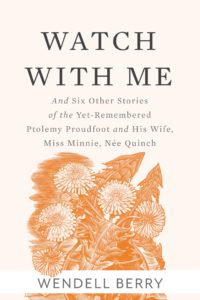 Watch With Me, And Six Other Stories of the Yet-Remembered Ptolemy Proudfoot and His Wife, Miss Minnie, Nee Quinch Wendell Berry (Counterpoint) $16.95 Well. If one hasn’t read Hannah Coulter ($14.95) and Jayber Crow ($15.95), you should know they are amongst our most beloved of all time favorite novels. We are not alone — nearly everyone who reads Berry is smitten with those two beautiful novels. Of course, he has many others, all, in one way or another, inter-locking, all set in Port Williams, Kentucky. He has several collections of short stores, too, and they are marvelous for those who love the genre. If if you are not a big fan of short-story, if you are taken with the Port Williams membership, then you want to know more of Berry’s imagination and more of his characters.
Watch With Me, And Six Other Stories of the Yet-Remembered Ptolemy Proudfoot and His Wife, Miss Minnie, Nee Quinch Wendell Berry (Counterpoint) $16.95 Well. If one hasn’t read Hannah Coulter ($14.95) and Jayber Crow ($15.95), you should know they are amongst our most beloved of all time favorite novels. We are not alone — nearly everyone who reads Berry is smitten with those two beautiful novels. Of course, he has many others, all, in one way or another, inter-locking, all set in Port Williams, Kentucky. He has several collections of short stores, too, and they are marvelous for those who love the genre. If if you are not a big fan of short-story, if you are taken with the Port Williams membership, then you want to know more of Berry’s imagination and more of his characters.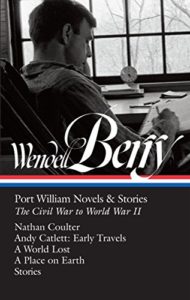 Wendell Berry: Port William Novels & Stories: The Civil War to World War II Wendell Berry (Library of America) $40.00 Perhaps you have seen the handsome, well-bound, somewhat smaller size (if thick) hardbacks produced by the Library of America. They come on very nice paper, with ribbon markers, and make available some of the most enduring classics in American literature. It was a great joy and important literary event when it was announced that there would be two volumes bringing together the complete stories of Mr. Berry, offered in chronological order. (That is, in the fictional Port Williams world, not in the order of their publication date.) This is the first volume; the release date of the second has not been yet been announced. This nice volume one that came out early in 2018 includes Nathan Coulter, Andy Catlett: Early Travels, A World Lost, A Place on Earth and twenty-three short stories, in narrative order. There is a good bibliography and a splendid map.
Wendell Berry: Port William Novels & Stories: The Civil War to World War II Wendell Berry (Library of America) $40.00 Perhaps you have seen the handsome, well-bound, somewhat smaller size (if thick) hardbacks produced by the Library of America. They come on very nice paper, with ribbon markers, and make available some of the most enduring classics in American literature. It was a great joy and important literary event when it was announced that there would be two volumes bringing together the complete stories of Mr. Berry, offered in chronological order. (That is, in the fictional Port Williams world, not in the order of their publication date.) This is the first volume; the release date of the second has not been yet been announced. This nice volume one that came out early in 2018 includes Nathan Coulter, Andy Catlett: Early Travels, A World Lost, A Place on Earth and twenty-three short stories, in narrative order. There is a good bibliography and a splendid map.
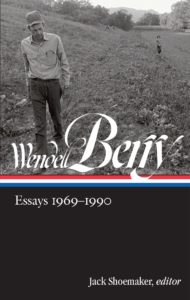 By the way, for true Wendell Berry fans, we are thrilled to be taking PRE-ORDERS for the other two- volume Library of America editions which are coming out April 16th, 2019.These are Wendell Berry: Essays 1969 -1990 (Library of America; $37.50) and Wendell Berry: Essays
By the way, for true Wendell Berry fans, we are thrilled to be taking PRE-ORDERS for the other two- volume Library of America editions which are coming out April 16th, 2019.These are Wendell Berry: Essays 1969 -1990 (Library of America; $37.50) and Wendell Berry: Essays 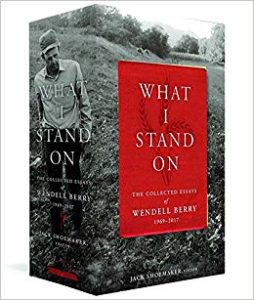 1993 – 2017 (Library of America; $37.50.)
1993 – 2017 (Library of America; $37.50.)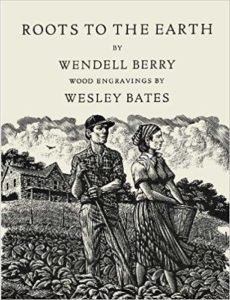 Roots to the Earth Wendell Berry, wood engravings by Wesley Bates (Counterpoint) $26.00 We suggest this for that hard-to-buy-for person who may be a fan of Wendell’s. It is not as well known, but is a very handsome, larger sized, nicely illustrated poem, handset in a great old font. This is a much-expanded edition of a chapbook Berry and Bates did in portfolio form by West Meadow Press. This 2014 edtion was reprinted with additional poems and a prize-winning, never before published in book form short story, “The Branch Way of Doing” that also has engravings by Mr. Bates.
Roots to the Earth Wendell Berry, wood engravings by Wesley Bates (Counterpoint) $26.00 We suggest this for that hard-to-buy-for person who may be a fan of Wendell’s. It is not as well known, but is a very handsome, larger sized, nicely illustrated poem, handset in a great old font. This is a much-expanded edition of a chapbook Berry and Bates did in portfolio form by West Meadow Press. This 2014 edtion was reprinted with additional poems and a prize-winning, never before published in book form short story, “The Branch Way of Doing” that also has engravings by Mr. Bates.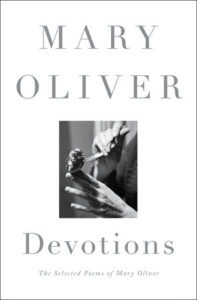 Devotions: The Selected Poems of Mary Oliver Mary Oliver (Penguin Press) $30.00 I suppose it may be said that there is no more popular poet working in America today than the beloved Ms Oliver. We have sold her books Swan, Dog Songs, A Thousands Mornings, Blue Horses and, most recently, her 2017 volume Felicity and others over the years. We celebrated this large, handsome collection when it came out, reviewing it in BookNotes the best I could. It offers poems from throughout her long career and is simply wondrous. (Other than this and Felicity, Oliver’s most recent published volume, by the way, is a fabulously interesting, rich collection of essays about life and times, mostly what we might call nature writing, although, like many of our best natural historians and observers of nature and our ecological crisis, she is a literary figure, and writes a bit about that as well. It is called Upstream: Selected Essays (Penguin Press; $26.00) and would be a much-appreciated gift, I’m sure, for any who like her words.
Devotions: The Selected Poems of Mary Oliver Mary Oliver (Penguin Press) $30.00 I suppose it may be said that there is no more popular poet working in America today than the beloved Ms Oliver. We have sold her books Swan, Dog Songs, A Thousands Mornings, Blue Horses and, most recently, her 2017 volume Felicity and others over the years. We celebrated this large, handsome collection when it came out, reviewing it in BookNotes the best I could. It offers poems from throughout her long career and is simply wondrous. (Other than this and Felicity, Oliver’s most recent published volume, by the way, is a fabulously interesting, rich collection of essays about life and times, mostly what we might call nature writing, although, like many of our best natural historians and observers of nature and our ecological crisis, she is a literary figure, and writes a bit about that as well. It is called Upstream: Selected Essays (Penguin Press; $26.00) and would be a much-appreciated gift, I’m sure, for any who like her words.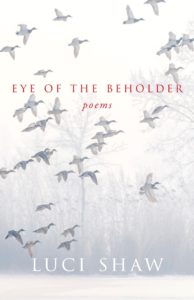 Eye of the Beholder: Poems Luci Shaw (Paraclete Press) $18.00 Speaking of beloved poets, Luci Shaw is among our favorites and many, many agree. She may be one of the most known and preeminent Christian poets these days; she was friends with Madeline L’Engle, and her faith and spirit seems similar. She has been an important figure in Christian publishing (with several non-fiction books, most recently, with IVP.) In this brand new collection, we get a glimpse of the themes explored from the book title — we are asking to see the extraordinary in the ordinary. As one reviewer put it, “Shaw crafts poems in the way she sees God’s creation is crafted — seamlessly and with enviable freshness.” Another serious literary critic says they “catch what Hopkins once called the ‘inscape’ of things…”
Eye of the Beholder: Poems Luci Shaw (Paraclete Press) $18.00 Speaking of beloved poets, Luci Shaw is among our favorites and many, many agree. She may be one of the most known and preeminent Christian poets these days; she was friends with Madeline L’Engle, and her faith and spirit seems similar. She has been an important figure in Christian publishing (with several non-fiction books, most recently, with IVP.) In this brand new collection, we get a glimpse of the themes explored from the book title — we are asking to see the extraordinary in the ordinary. As one reviewer put it, “Shaw crafts poems in the way she sees God’s creation is crafted — seamlessly and with enviable freshness.” Another serious literary critic says they “catch what Hopkins once called the ‘inscape’ of things…”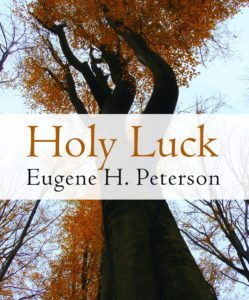 Holy Luck Eugene Peterson (Eerdmans) $15.00 With Eugene’s recent death there is (thank goodness) a renewed interest in his many books. I think in the new year I might do an annotated reading guide to all of his work; we know it and love it. Decades ago he and I talked about him coming here, which he wanted to do, but time just didn’t work out. He used to write poems as somewhat of an avocation and he did them for Christmas blessings, too, the way some people write year’s end summaries of their busy lives. He was going to read some of his little-known poems for us.
Holy Luck Eugene Peterson (Eerdmans) $15.00 With Eugene’s recent death there is (thank goodness) a renewed interest in his many books. I think in the new year I might do an annotated reading guide to all of his work; we know it and love it. Decades ago he and I talked about him coming here, which he wanted to do, but time just didn’t work out. He used to write poems as somewhat of an avocation and he did them for Christmas blessings, too, the way some people write year’s end summaries of their busy lives. He was going to read some of his little-known poems for us.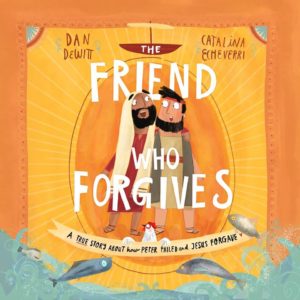 The Friend Who Forgives: A True Story About How Peter Failed and Jesus Forgave Dan Dewitt, illustrated by Catalina Echeverri (The Good Book Company) $14.00 We adore this good series (“Tales That Tell the Truth”) such as The Garden, The Curtain, and the Cross or our favorite, God’s Very Good Idea. We have customers who just adore The Christmas Promise, another collaboration with this creative writer and illustrator. These books are theologically clear, solid as can be, but playful and witty. We are very happy with how this story is both obviously relevant (friends forgiving) but finally not moralistic, but about deep gospel. These books are Christ-focused, gospel-centered, delightfully sharing really good news.
The Friend Who Forgives: A True Story About How Peter Failed and Jesus Forgave Dan Dewitt, illustrated by Catalina Echeverri (The Good Book Company) $14.00 We adore this good series (“Tales That Tell the Truth”) such as The Garden, The Curtain, and the Cross or our favorite, God’s Very Good Idea. We have customers who just adore The Christmas Promise, another collaboration with this creative writer and illustrator. These books are theologically clear, solid as can be, but playful and witty. We are very happy with how this story is both obviously relevant (friends forgiving) but finally not moralistic, but about deep gospel. These books are Christ-focused, gospel-centered, delightfully sharing really good news.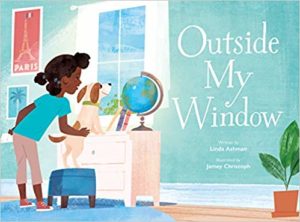 Outside My Window Linda Ashman, illustrated by Jamey Christoph (Eerdmans) $17.00 This lovely book works on a few levels — it has a poetic cadence that we really appreciate, as will any real wordsmith or lover of words. As importantly, the story itself invites kids to pay attention to what they see. Further, because each page spread shows a different child looking out her or his window in some different part of the world, it becomes clear that everybody sees stuff, even if really different things. Or maybe not so different? While the lives of each of the children seem so different, there is something they all share. There’s a nice simple page in the back showing the cities and countries where each of the page spreads are set. Nice.
Outside My Window Linda Ashman, illustrated by Jamey Christoph (Eerdmans) $17.00 This lovely book works on a few levels — it has a poetic cadence that we really appreciate, as will any real wordsmith or lover of words. As importantly, the story itself invites kids to pay attention to what they see. Further, because each page spread shows a different child looking out her or his window in some different part of the world, it becomes clear that everybody sees stuff, even if really different things. Or maybe not so different? While the lives of each of the children seem so different, there is something they all share. There’s a nice simple page in the back showing the cities and countries where each of the page spreads are set. Nice.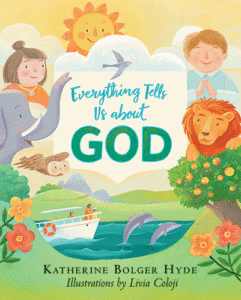 Everything Tells Us About God Katherine Bolger Hyde (Ancient Faith Publishing) $19.95 This is one of several really beautiful books we carry that are published by this great Orthodox publishing venture. A few of their books are very distinctly for Orthodox children (or those that want to read about the lives of those involved in the Orthodox way.) But a few are more general, and this one — imbued with a sacramental sensibility perhaps informed by the likes of Orthodox theologian Fr. Alexander Schmemann and his For the Life of the World — it is the sort of book that nearly anyone could fall in love with. The book says on the back that “the world is like a giant puzzle God made to tell us about himself. Every piece whispers one of His secrets — all we need to do is listen.”
Everything Tells Us About God Katherine Bolger Hyde (Ancient Faith Publishing) $19.95 This is one of several really beautiful books we carry that are published by this great Orthodox publishing venture. A few of their books are very distinctly for Orthodox children (or those that want to read about the lives of those involved in the Orthodox way.) But a few are more general, and this one — imbued with a sacramental sensibility perhaps informed by the likes of Orthodox theologian Fr. Alexander Schmemann and his For the Life of the World — it is the sort of book that nearly anyone could fall in love with. The book says on the back that “the world is like a giant puzzle God made to tell us about himself. Every piece whispers one of His secrets — all we need to do is listen.”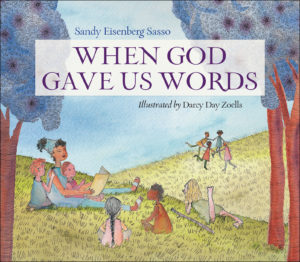 When God Gave Us Words Sandy Eisenberg Sasso, illustrated by Darcy Day Zoells (Flyaway Books) $16.00 If you know much about religious education and thoughtful, creative children’s books you may know this Reformed Rabbi, Sandy Sasso, and the many beloved books she has done. For years she is a mainstay of many mainline denominational children’s libraries with titles like God’s Paintbrush and In God’s Name. A year or so ago she teamed up with the Jewish New Testament scholar Amy-Jil Levine to do two books re-telling some of the parables of Jesus (Who Counts? and The Marvelous Mustard Seed. We, of course, stock them all.) But this new one is spectacular.
When God Gave Us Words Sandy Eisenberg Sasso, illustrated by Darcy Day Zoells (Flyaway Books) $16.00 If you know much about religious education and thoughtful, creative children’s books you may know this Reformed Rabbi, Sandy Sasso, and the many beloved books she has done. For years she is a mainstay of many mainline denominational children’s libraries with titles like God’s Paintbrush and In God’s Name. A year or so ago she teamed up with the Jewish New Testament scholar Amy-Jil Levine to do two books re-telling some of the parables of Jesus (Who Counts? and The Marvelous Mustard Seed. We, of course, stock them all.) But this new one is spectacular.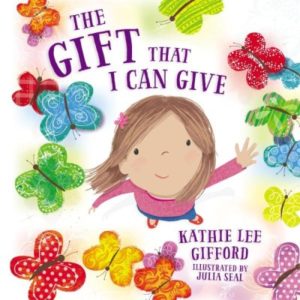 The Gift That I Can Give Kathie Lee Gifford, illustrated by Julia Seal (Tommy Nelson) $17.99 Okay, we’ll say this right from the start. Gifford is a remarkable person, very involved in philanthropy and social change work, and has written for adults and children (and recorded albums and plays and was inducted into the Broadcasting & Cable Hall of Fame.) She knows how to get stuff done. The illustrator, Julia Seal, is herself an excellent designer (and loves glitter, as the cover of this sparkly book attests!)
The Gift That I Can Give Kathie Lee Gifford, illustrated by Julia Seal (Tommy Nelson) $17.99 Okay, we’ll say this right from the start. Gifford is a remarkable person, very involved in philanthropy and social change work, and has written for adults and children (and recorded albums and plays and was inducted into the Broadcasting & Cable Hall of Fame.) She knows how to get stuff done. The illustrator, Julia Seal, is herself an excellent designer (and loves glitter, as the cover of this sparkly book attests!)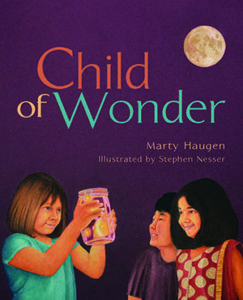 Child of Wonder Marty Haugen, illustrated by Stephen Nesser (GIA) $16.95 GIA is mostly a music company and Marty Haugen — a contemporary Lutheran hymn-writer who is known for many recordings, folk-mass songs, and acoustic ballads of faith and seeking and justice — has worked with them for years. In this, his baptismal song, “Child of Wonder” is given a new feel. The lyrics are so beautifully, richly, illustrated by Nesser, highly respected Minnesota water colorist, and in so doing, the song becomes an inter-faith celebration of rituals for the sacredness of human life and delight in the lives of children.
Child of Wonder Marty Haugen, illustrated by Stephen Nesser (GIA) $16.95 GIA is mostly a music company and Marty Haugen — a contemporary Lutheran hymn-writer who is known for many recordings, folk-mass songs, and acoustic ballads of faith and seeking and justice — has worked with them for years. In this, his baptismal song, “Child of Wonder” is given a new feel. The lyrics are so beautifully, richly, illustrated by Nesser, highly respected Minnesota water colorist, and in so doing, the song becomes an inter-faith celebration of rituals for the sacredness of human life and delight in the lives of children.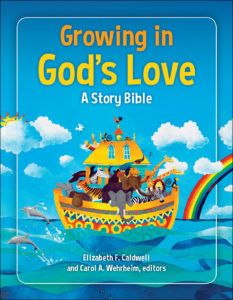 Growing in God’s Love: A Story Bible Elizabeth F. Caldwell and Carol Wehrheim, editors (WJK) $25.00 When this came out earlier this year, many thoughtful educators (especially those that know the Christian ed theories of Caldwell and Wehrheim) celebrated, saying that this was finally the children’s Bible story book that they were awaiting. Ideal for kids who are 4 to 8 or 9, maybe, it helps nurture faith not by merely telling the Bible story but by telling it in such a way that it invites wonder. And invites kids to say “I wonder…” Rather than just preaching, it evokes in the reader a desire to take the story seriously, to enter in, if you will. The word choice, the cadence, the blend of illustration and photographs the questions asked all conspire to make this a particularly useful (and entertaining) tool in a child’s faith formation.
Growing in God’s Love: A Story Bible Elizabeth F. Caldwell and Carol Wehrheim, editors (WJK) $25.00 When this came out earlier this year, many thoughtful educators (especially those that know the Christian ed theories of Caldwell and Wehrheim) celebrated, saying that this was finally the children’s Bible story book that they were awaiting. Ideal for kids who are 4 to 8 or 9, maybe, it helps nurture faith not by merely telling the Bible story but by telling it in such a way that it invites wonder. And invites kids to say “I wonder…” Rather than just preaching, it evokes in the reader a desire to take the story seriously, to enter in, if you will. The word choice, the cadence, the blend of illustration and photographs the questions asked all conspire to make this a particularly useful (and entertaining) tool in a child’s faith formation.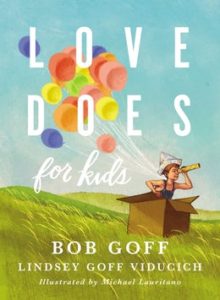 Love Does for Kids Bob Goff & Lindsey Goff Viduchich, illustrated by Michael Lauritano (Tommy Nelson) $16.99 We have bunches of these at the ready to send out, and we hope you email us right away — or call! — so we can be sure to get some of these out the door, ASAP. I’m sure you know how much we love Love Does (and the great, great sequel, Everybody Always.) We have promoted it everywhere we’ve gone and written about them both at BookNotes. Goff is a hero of ours, adventurous, funny, whimsical, upbeat, and joyfully serious about making the world a better place. He tells amazingly entertaining stories of loving others — people in his workplace, folks in the neighborhood, people he bumps into, and (yes) some pretty amazing stories of resisting sexual trafficking and starting an orphanage in a war zone, and other such dramatic deeds. I hope you know his books and his work.
Love Does for Kids Bob Goff & Lindsey Goff Viduchich, illustrated by Michael Lauritano (Tommy Nelson) $16.99 We have bunches of these at the ready to send out, and we hope you email us right away — or call! — so we can be sure to get some of these out the door, ASAP. I’m sure you know how much we love Love Does (and the great, great sequel, Everybody Always.) We have promoted it everywhere we’ve gone and written about them both at BookNotes. Goff is a hero of ours, adventurous, funny, whimsical, upbeat, and joyfully serious about making the world a better place. He tells amazingly entertaining stories of loving others — people in his workplace, folks in the neighborhood, people he bumps into, and (yes) some pretty amazing stories of resisting sexual trafficking and starting an orphanage in a war zone, and other such dramatic deeds. I hope you know his books and his work.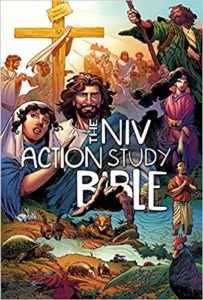 The NIV Action Study Bible illustrations by Sergio Cariello (David C. Cook) $32.99 By all counts, Sergio Cariello (who has worked for Marvell and DC Comics) is one of the best classic cartoonists doing action/adventure type comics today. His Action Bible has introduced millions of kids to the stories in the Bible with the dramatic comic-book-style illustrations. This Bible features the complete text of the NIV with lots of neat features, sections such as “What About This?” and “Unlock It!” and “Activate” and “Ancient Archives” and more. There’s good guessing games (“person, place or thing?”) and a distinct icon that appears whenever a story is included in the Action Bible illustrations. We think this could really help encourage a stronger connection to God and certainly a lively interest in Scripture.
The NIV Action Study Bible illustrations by Sergio Cariello (David C. Cook) $32.99 By all counts, Sergio Cariello (who has worked for Marvell and DC Comics) is one of the best classic cartoonists doing action/adventure type comics today. His Action Bible has introduced millions of kids to the stories in the Bible with the dramatic comic-book-style illustrations. This Bible features the complete text of the NIV with lots of neat features, sections such as “What About This?” and “Unlock It!” and “Activate” and “Ancient Archives” and more. There’s good guessing games (“person, place or thing?”) and a distinct icon that appears whenever a story is included in the Action Bible illustrations. We think this could really help encourage a stronger connection to God and certainly a lively interest in Scripture.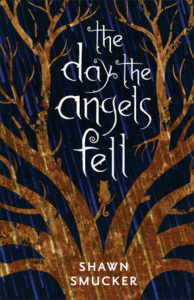 The Day the Angels Fell Shawn Smucker (Revell) $14.99 (paperback) $17.99 (hardback) We’ve been quite taken with this received fantasy novel about a something like a time-travel portal (set in New Orleans.) There is a whole, whole lot going on here and it is deeply spiritual without being preachy or push; it is just what a good, thoughtful yarn should be. Even those who don’t carry for magical realism or supernatural thrillers or any of that mind-boggling stuff will appreciate this. Here’s the thing — we almost listed this above under adult fiction, as it is that good. Serious teen readers could certainly enjoy it, too, so we’ve placed it here. It’s thoughtful and fun and adventuresome and — we have to tell ya: part one. Might we recommend getting part two, the sequel, along with this one? It’s a cool lookin’ pair, for sure.
The Day the Angels Fell Shawn Smucker (Revell) $14.99 (paperback) $17.99 (hardback) We’ve been quite taken with this received fantasy novel about a something like a time-travel portal (set in New Orleans.) There is a whole, whole lot going on here and it is deeply spiritual without being preachy or push; it is just what a good, thoughtful yarn should be. Even those who don’t carry for magical realism or supernatural thrillers or any of that mind-boggling stuff will appreciate this. Here’s the thing — we almost listed this above under adult fiction, as it is that good. Serious teen readers could certainly enjoy it, too, so we’ve placed it here. It’s thoughtful and fun and adventuresome and — we have to tell ya: part one. Might we recommend getting part two, the sequel, along with this one? It’s a cool lookin’ pair, for sure.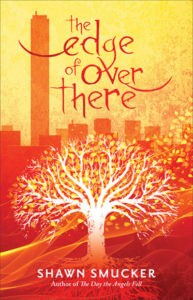 The Edge of Over There Shawn Smucker (Revell) $17.99 (hardback only; the paperback will release in early April, 2019.) This is the powerful sequel to The Day the Angles Fell, the award winning tale of kids doing this time-travel sort of thing, not exactly time travel, but moving into another dimension — is “over there” heaven? What is this place called “the edge of over there”? Can they get the Tree of Life to help bringing healing to the city that is nearly in the grip of chaos? The Edge of Over There picks up almost where The Day the Angels Fell left off, only several years later. The boy in the plot is 16 years old, now. What a story.
The Edge of Over There Shawn Smucker (Revell) $17.99 (hardback only; the paperback will release in early April, 2019.) This is the powerful sequel to The Day the Angles Fell, the award winning tale of kids doing this time-travel sort of thing, not exactly time travel, but moving into another dimension — is “over there” heaven? What is this place called “the edge of over there”? Can they get the Tree of Life to help bringing healing to the city that is nearly in the grip of chaos? The Edge of Over There picks up almost where The Day the Angels Fell left off, only several years later. The boy in the plot is 16 years old, now. What a story.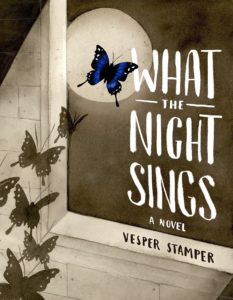 What the Night Sings: A Novel Vesper Stamper (Knopf) $19.99 I realize that a story of a teen holocaust survivor is a heavy topic to give as a sweet Christmas gift for some tender kids, but for those who are a bit mature, thinking deeply about the horrors of the world, and maybe have a bit of punky attitude, this wonderfully crafted, powerful story about a German gal named Gerta making her way after getting out of Bergen-Belson is absolutely remarkable. Vesper herself grew up in a very creative family (born in Nuremberg, raised in New York) and, as she tells it, was raised amongst “an eclectic mix of engineers, musicians, and artists who didn’t think Voltaire too tough for bedtime reading, Chopin Valses too loud for wake up calls, or precisions slide rules too fragile for play things.” She studied design at Parsons and got a MFA in illustration at the School of Visual Arts and has very impressive graphic novel stylings in this — it isn’t a graphic novel but there are lots of black and white drawings, illuminations, and graphics throughout this luminous, powerful story.
What the Night Sings: A Novel Vesper Stamper (Knopf) $19.99 I realize that a story of a teen holocaust survivor is a heavy topic to give as a sweet Christmas gift for some tender kids, but for those who are a bit mature, thinking deeply about the horrors of the world, and maybe have a bit of punky attitude, this wonderfully crafted, powerful story about a German gal named Gerta making her way after getting out of Bergen-Belson is absolutely remarkable. Vesper herself grew up in a very creative family (born in Nuremberg, raised in New York) and, as she tells it, was raised amongst “an eclectic mix of engineers, musicians, and artists who didn’t think Voltaire too tough for bedtime reading, Chopin Valses too loud for wake up calls, or precisions slide rules too fragile for play things.” She studied design at Parsons and got a MFA in illustration at the School of Visual Arts and has very impressive graphic novel stylings in this — it isn’t a graphic novel but there are lots of black and white drawings, illuminations, and graphics throughout this luminous, powerful story.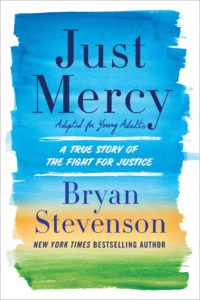 Just Mercy: Adopted for Young Adults: A True Story of The Fight for Justice Bryan Stevenson (Delacorte Press) $18.99 We have told nearly everyone who cares about our love for this man, his good work, and his book Just Mercy: A Story of Justice and Redemption that has to be one of the most powerful books I’ve ever read. Stevenson, after graduating from Eastern College (now University) and earned a law degree from Harvard Law School, started a small non-profit legal aid ministry, serving the poorest of the poor in prison in the deep south. Most of those he served were incarcerated with terrible, terrible injustices — blatant and illegal racism in the courtroom, incompetent and unhelpful public defenders, wrongfully condemned prisoners on death row, stuff the poor and many people of color face in our messed up criminal justice system. Bryan pours his life out though his Equal Justice Initiative, using his skills and faith to fight for the forgotten; I have said often that I think someday he may get the Nobel Peace Prize — he is that important and that good. Read Just Mercy and tell me if you don’t agree!
Just Mercy: Adopted for Young Adults: A True Story of The Fight for Justice Bryan Stevenson (Delacorte Press) $18.99 We have told nearly everyone who cares about our love for this man, his good work, and his book Just Mercy: A Story of Justice and Redemption that has to be one of the most powerful books I’ve ever read. Stevenson, after graduating from Eastern College (now University) and earned a law degree from Harvard Law School, started a small non-profit legal aid ministry, serving the poorest of the poor in prison in the deep south. Most of those he served were incarcerated with terrible, terrible injustices — blatant and illegal racism in the courtroom, incompetent and unhelpful public defenders, wrongfully condemned prisoners on death row, stuff the poor and many people of color face in our messed up criminal justice system. Bryan pours his life out though his Equal Justice Initiative, using his skills and faith to fight for the forgotten; I have said often that I think someday he may get the Nobel Peace Prize — he is that important and that good. Read Just Mercy and tell me if you don’t agree!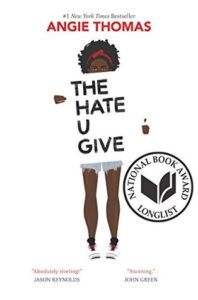
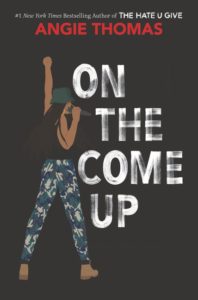 I think this youth version of Just Mercy would make a great gift or follow-up for any young person who has read The Hate You Give by Angie Thomas, the YA novel about a black youth killed unjustly by a police officer. Or if they saw the movie that recently opened to much acclaim. Get them this real-world, hope-filled, inspiring story of making a difference for anyone you know is fired up or distressed by that story (or looking forward to Thomas’s next one, On the Come Up, releasing February 5th. You can pre-order that from us, too, of course.) Just Mercy: Adapted for Young Adults should be in church and school youth libraries everywhere!
I think this youth version of Just Mercy would make a great gift or follow-up for any young person who has read The Hate You Give by Angie Thomas, the YA novel about a black youth killed unjustly by a police officer. Or if they saw the movie that recently opened to much acclaim. Get them this real-world, hope-filled, inspiring story of making a difference for anyone you know is fired up or distressed by that story (or looking forward to Thomas’s next one, On the Come Up, releasing February 5th. You can pre-order that from us, too, of course.) Just Mercy: Adapted for Young Adults should be in church and school youth libraries everywhere!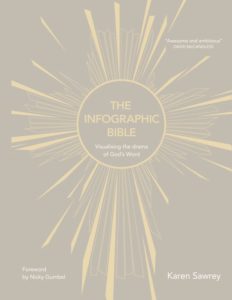 Just the other day I was showing the brand new, rather quirky but utterly fascinating (and incredibly informative) The Infographic Bible: Visualizing the Drama of God’s Word created by Karen Sawrey (Zondervan; $34.99) and the customer was perplexed. “Who could buy a thing like that” she wondered, struck by the colorful look, creatively imagined data and, I suppose, the price tag. I admit I sort of wondered that myself; it’s awesome, but who actually buys such a book?
Just the other day I was showing the brand new, rather quirky but utterly fascinating (and incredibly informative) The Infographic Bible: Visualizing the Drama of God’s Word created by Karen Sawrey (Zondervan; $34.99) and the customer was perplexed. “Who could buy a thing like that” she wondered, struck by the colorful look, creatively imagined data and, I suppose, the price tag. I admit I sort of wondered that myself; it’s awesome, but who actually buys such a book?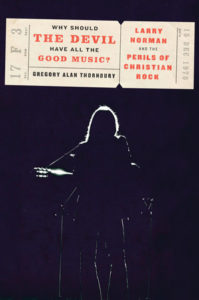 Why Should the Devil Have All The Good Music: Larry Norman and the Perils of Christian Rock Gregory Alan Thornbury (Convergent) $26.00 I hope you saw my long review of this when it came out this summer. I did a big BookNotes feature on it and, happily, got a smaller review published in the big-time Pittsburgh Post Gazette. The book review editor there is a Larry Norman fan. If you know anything about the subculture of CCM, you know Norman is considered one of the grandfathers of the movement. His early days, though, were themselves legendary as he preformed with or before nearly every late 60s rock legend, from Paul McCartney to Jimi Hendrix to Janis Joplin. He shared his faith eagerly and helped create the vision and vibe of what was known then as “the Jesus Movement.”
Why Should the Devil Have All The Good Music: Larry Norman and the Perils of Christian Rock Gregory Alan Thornbury (Convergent) $26.00 I hope you saw my long review of this when it came out this summer. I did a big BookNotes feature on it and, happily, got a smaller review published in the big-time Pittsburgh Post Gazette. The book review editor there is a Larry Norman fan. If you know anything about the subculture of CCM, you know Norman is considered one of the grandfathers of the movement. His early days, though, were themselves legendary as he preformed with or before nearly every late 60s rock legend, from Paul McCartney to Jimi Hendrix to Janis Joplin. He shared his faith eagerly and helped create the vision and vibe of what was known then as “the Jesus Movement.”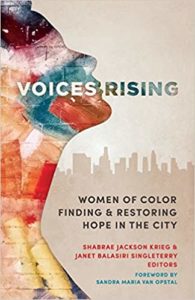 Voices Rising: Women of Color Finding & Restoring Hope in the City edited by Shabrae Jackson Krieg & Janet Balasiri Singleterry (Servant Partners Press) $15.95 What a find, this recent start up publisher that is doing really good stuff on urban outreach, race, economic justice, mission. We are so glad to have found them as they are doing great books like this one. Evangelical women of color are increasingly being honored and their voices are slowly being heard in broader settings; this anthology of great writings of women of color working and living in poor urban communities is a great witness to this shift and new openness. As it says on the back cover “As the reader, you are invited to listen to the call and the need for diversity in mission and to seeing the uniqueness that women of color bring.”
Voices Rising: Women of Color Finding & Restoring Hope in the City edited by Shabrae Jackson Krieg & Janet Balasiri Singleterry (Servant Partners Press) $15.95 What a find, this recent start up publisher that is doing really good stuff on urban outreach, race, economic justice, mission. We are so glad to have found them as they are doing great books like this one. Evangelical women of color are increasingly being honored and their voices are slowly being heard in broader settings; this anthology of great writings of women of color working and living in poor urban communities is a great witness to this shift and new openness. As it says on the back cover “As the reader, you are invited to listen to the call and the need for diversity in mission and to seeing the uniqueness that women of color bring.”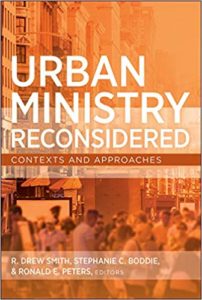 Urban Ministry Reconsidered: Contexts and Approaches edited by D. Drew Smith, Stephanie Boddie, & Ronald Peters (WJK) $40.00 I need to do a major review of this as it is extraordinary. Let me just not, now, that if you know anybody who is seriously studying this topic, this is a major anthology, edited by leaders of the Metro-Urban Institute at the Pittsburgh Theological Seminary. These folks have decades of scholarship and practice as theologians and activists. There are chapters on poverty, housing, health, racism, missional church stuff, global insights, and lots more. It is fairly diverse theologically, mostly progressive in terms of social agenda, and pretty scholarly. It advances a number of fresh insights, offers current research and we have a few trusted friends who have done pieces in it. There is nothing like it on the market and just came out this fall. A great gift for someone you know who is deeply involved in studying this field.
Urban Ministry Reconsidered: Contexts and Approaches edited by D. Drew Smith, Stephanie Boddie, & Ronald Peters (WJK) $40.00 I need to do a major review of this as it is extraordinary. Let me just not, now, that if you know anybody who is seriously studying this topic, this is a major anthology, edited by leaders of the Metro-Urban Institute at the Pittsburgh Theological Seminary. These folks have decades of scholarship and practice as theologians and activists. There are chapters on poverty, housing, health, racism, missional church stuff, global insights, and lots more. It is fairly diverse theologically, mostly progressive in terms of social agenda, and pretty scholarly. It advances a number of fresh insights, offers current research and we have a few trusted friends who have done pieces in it. There is nothing like it on the market and just came out this fall. A great gift for someone you know who is deeply involved in studying this field.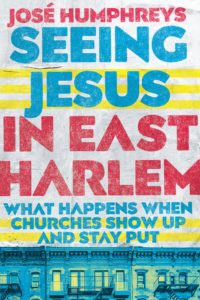 Seeing Jesus in East Harlem: What Happens When Churches Show Up and Stay Put Jose Humphreys (IVP) $16.00 This great book is part of the Praxis imprint and, with the colorful cover, is immediately attractive. This is very much about a sense of place in the urban context and how our own stories and faith formation are tied to particular places. The author is a Puerto Rica pastor who has planted a multi-ethnic church in East Harlem and this book is ideal for anyone thinking practically about urban ministry.
Seeing Jesus in East Harlem: What Happens When Churches Show Up and Stay Put Jose Humphreys (IVP) $16.00 This great book is part of the Praxis imprint and, with the colorful cover, is immediately attractive. This is very much about a sense of place in the urban context and how our own stories and faith formation are tied to particular places. The author is a Puerto Rica pastor who has planted a multi-ethnic church in East Harlem and this book is ideal for anyone thinking practically about urban ministry.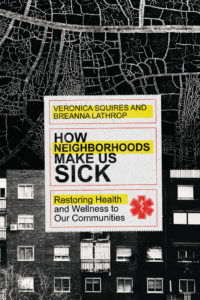 How Neighborhood Make Us Sick: Restoring Health and Wellness to our Communities Veronica Squires and Breanna Lathrop (IVP) $17.00 This long-awaited book just came today and we are thrilled to suggest it as a gift for anyone you know who is interested in urban life, or in health, wholeness, environmental safety and the like. We have long wished for a book about public health from a Christian perspective that was readable, passionate, helpful. Such a book would have to look at environmental issues, racism, poverty, and our general lack of awareness of environmental toxins. Obviously we think of the Flint, Michigan water crisis, we think of asbestos and urban fracking. But there is so much more about caring for our built environment and caring in effective ways about how some of it is literally making us sick. Buildings with mold trigger asthma; geographic lack of access to healthy food and health care increases childhood mortality. Trauma (from community violence, for instance) can cause physical changes to the body and to our resilience.
How Neighborhood Make Us Sick: Restoring Health and Wellness to our Communities Veronica Squires and Breanna Lathrop (IVP) $17.00 This long-awaited book just came today and we are thrilled to suggest it as a gift for anyone you know who is interested in urban life, or in health, wholeness, environmental safety and the like. We have long wished for a book about public health from a Christian perspective that was readable, passionate, helpful. Such a book would have to look at environmental issues, racism, poverty, and our general lack of awareness of environmental toxins. Obviously we think of the Flint, Michigan water crisis, we think of asbestos and urban fracking. But there is so much more about caring for our built environment and caring in effective ways about how some of it is literally making us sick. Buildings with mold trigger asthma; geographic lack of access to healthy food and health care increases childhood mortality. Trauma (from community violence, for instance) can cause physical changes to the body and to our resilience.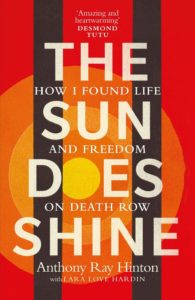 The Sun Does Shine: How I Found Freedom on Death Row Anthony Ray Hinton (St. Martin’s Press) $26.99 This would be an excellent gift for anyone who likes powerful memoir or even crime thrillers, although it is a righteous story about overcoming gross injustice. It is a perfect choice for anyone who has read Bryan Stevenson’s classic Just Mercy because Anthony Ray Hinton and his awful case – convicted in a sloppy trial for a crime he couldn’t have committed – figures into the dramatic plot of Stevenson’s book about this very kind of thing. His Equal Justice Initiative offers legal aid to poor folks who are incarcerated unfairly. Hinton spent decades on death row and in Just Mercy he remained in jail despite Bryan’s heroic efforts on his behalf, getting the trail reheard, appealing, appealing. This tells the story from Hinton’s view and is a simple story of his ordinary life and his extraordinary faith and courage and dignity living on death row.
The Sun Does Shine: How I Found Freedom on Death Row Anthony Ray Hinton (St. Martin’s Press) $26.99 This would be an excellent gift for anyone who likes powerful memoir or even crime thrillers, although it is a righteous story about overcoming gross injustice. It is a perfect choice for anyone who has read Bryan Stevenson’s classic Just Mercy because Anthony Ray Hinton and his awful case – convicted in a sloppy trial for a crime he couldn’t have committed – figures into the dramatic plot of Stevenson’s book about this very kind of thing. His Equal Justice Initiative offers legal aid to poor folks who are incarcerated unfairly. Hinton spent decades on death row and in Just Mercy he remained in jail despite Bryan’s heroic efforts on his behalf, getting the trail reheard, appealing, appealing. This tells the story from Hinton’s view and is a simple story of his ordinary life and his extraordinary faith and courage and dignity living on death row.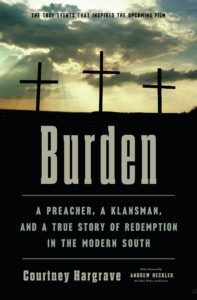 Burden: A Preacher, A Klansman, and a True Story of Redemption in the Modern South Courtney Hargrave (Convergent) $26.00 I hope you read my long review of this earlier this year in BookNotes. This is quite a story (and there is now a Hollywood movie about it all, directed by Andrew Heckler of Dallas Buyer’s Club fame.) This, also, is a book I couldn’t put down, an intriguing tale of life in a small Carolina town where, yep, there is a white supremacy guy who opens a KKK museum. Naturally, it attracts protests and national attention and an ill informed, poor white kid is taken in and becomes the point man running the shop.
Burden: A Preacher, A Klansman, and a True Story of Redemption in the Modern South Courtney Hargrave (Convergent) $26.00 I hope you read my long review of this earlier this year in BookNotes. This is quite a story (and there is now a Hollywood movie about it all, directed by Andrew Heckler of Dallas Buyer’s Club fame.) This, also, is a book I couldn’t put down, an intriguing tale of life in a small Carolina town where, yep, there is a white supremacy guy who opens a KKK museum. Naturally, it attracts protests and national attention and an ill informed, poor white kid is taken in and becomes the point man running the shop.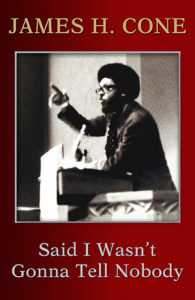 Said I Wasn’t Gonna Tell Nobody James H. Cone (Orbis) $28.00 Anyone who studies black theology knows the name of James Cone, whose major work came out in the late 60s amidst the “black power” movement and the debates about which approach – King or Malcolm – were most effective and righteous in those hard days. More recently, as an older man, his popularity was broadened and renewed by his stunning last major work Christ and the Lynching Tree. This new book, published just after his death earlier this year, is an autobiography, a slim hardback (admittedly a bit pricey) but “a must read for everyone interested in discerning how to live awake in the gospel while inspiring the voice of the oppressed.” It is Cone’s own story of finding his voice, of coming up with his notions of black theology, of his life in the academy (he taught at Union in NYC) doing this significant work. It is very interesting and somewhat revealing.
Said I Wasn’t Gonna Tell Nobody James H. Cone (Orbis) $28.00 Anyone who studies black theology knows the name of James Cone, whose major work came out in the late 60s amidst the “black power” movement and the debates about which approach – King or Malcolm – were most effective and righteous in those hard days. More recently, as an older man, his popularity was broadened and renewed by his stunning last major work Christ and the Lynching Tree. This new book, published just after his death earlier this year, is an autobiography, a slim hardback (admittedly a bit pricey) but “a must read for everyone interested in discerning how to live awake in the gospel while inspiring the voice of the oppressed.” It is Cone’s own story of finding his voice, of coming up with his notions of black theology, of his life in the academy (he taught at Union in NYC) doing this significant work. It is very interesting and somewhat revealing.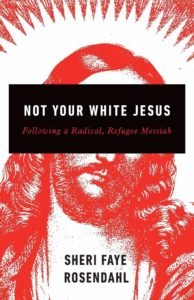 Not Your White Jesus: Following a Radical, Refugee Messiah Sheri Faye Rosendahl (WJK) $16.00 I have written about this a few times and erased it each time. I don’t want to ruin anyone’s Christmas, although I do have to think of the Jackson Brown song
Not Your White Jesus: Following a Radical, Refugee Messiah Sheri Faye Rosendahl (WJK) $16.00 I have written about this a few times and erased it each time. I don’t want to ruin anyone’s Christmas, although I do have to think of the Jackson Brown song 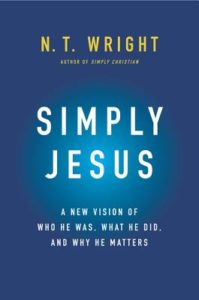
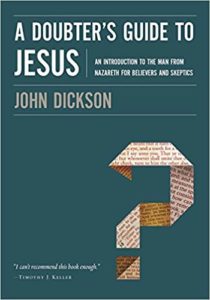 We have a lot of books about Jesus and many are more moderate and perhaps more balanced, maybe even more fully accurate. A good friend just re-read Simply Jesus by N.T. Wright for the third time! (It’s now out in paperback.) We’ve recently discovered the brand new almost pocket sized A Doubter’s Guide to Jesus: An Introduction to the Man from Nazareth for Believers and Skeptics by the sharp thinker John Dickson from the UK. But this Not Your White Jesus is a radical reminder of some urgent stuff, offering heartfelt conversations and even a Bible study/reflection guide in the back to deeper our engagement with the controversial stuff Jesus taught. Even the cover is “in your face” and would be good for a disillusioned young person.
We have a lot of books about Jesus and many are more moderate and perhaps more balanced, maybe even more fully accurate. A good friend just re-read Simply Jesus by N.T. Wright for the third time! (It’s now out in paperback.) We’ve recently discovered the brand new almost pocket sized A Doubter’s Guide to Jesus: An Introduction to the Man from Nazareth for Believers and Skeptics by the sharp thinker John Dickson from the UK. But this Not Your White Jesus is a radical reminder of some urgent stuff, offering heartfelt conversations and even a Bible study/reflection guide in the back to deeper our engagement with the controversial stuff Jesus taught. Even the cover is “in your face” and would be good for a disillusioned young person.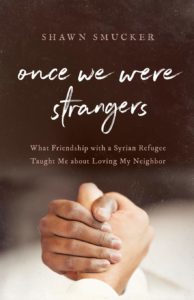 Once We Were Strangers: What A Friendship with a Syrian Refugee Taught Me About Loving My Neighbor Shawn Smucker (Revell) $14.99 There is more than one way to skin a cat by dad used to say, by which he meant that there can be several ways to solve a problem. If your hope is to enlighten someone about the Biblical call to peace and justice about the need to be hospitable to strangers, maybe even care for immigrants, one might not have to go full-on didactic by giving a book like the above listed James Cone or Not Your White Jesus. Yes, those will make fabulous gifts for some people but I am quite aware that either could be a real stinker at the lovely Christmas brunch table. But there’s other ways into this conversation.
Once We Were Strangers: What A Friendship with a Syrian Refugee Taught Me About Loving My Neighbor Shawn Smucker (Revell) $14.99 There is more than one way to skin a cat by dad used to say, by which he meant that there can be several ways to solve a problem. If your hope is to enlighten someone about the Biblical call to peace and justice about the need to be hospitable to strangers, maybe even care for immigrants, one might not have to go full-on didactic by giving a book like the above listed James Cone or Not Your White Jesus. Yes, those will make fabulous gifts for some people but I am quite aware that either could be a real stinker at the lovely Christmas brunch table. But there’s other ways into this conversation.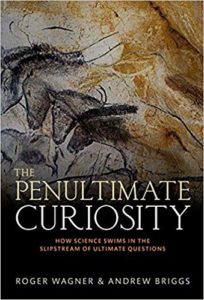 The Penultimate Curiosity: How Science Swims in the Slipstream of Ultimate Questions Roger Wagner & Andrew Briggs (Oxford University Press) $45.95 This is a big, big book, big in heft (slightly glossy pages make it a bit heavy) and, more importantly, is hefty with a broad vision, suggesting, as the subtitle implies, that it is truly about ultimate questions. The one author is himself a scientist of great renown (in the UK) and the other is a painter. My, my, what a broad set of conversations about life and times, truth and knowledge, heart and mind. It has a lot of fascinating chapters about a range of topics about science and the search for meaning.
The Penultimate Curiosity: How Science Swims in the Slipstream of Ultimate Questions Roger Wagner & Andrew Briggs (Oxford University Press) $45.95 This is a big, big book, big in heft (slightly glossy pages make it a bit heavy) and, more importantly, is hefty with a broad vision, suggesting, as the subtitle implies, that it is truly about ultimate questions. The one author is himself a scientist of great renown (in the UK) and the other is a painter. My, my, what a broad set of conversations about life and times, truth and knowledge, heart and mind. It has a lot of fascinating chapters about a range of topics about science and the search for meaning.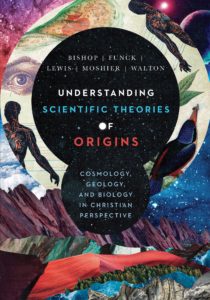 Understanding Scientific Theories of Origins: Cosmology, Geology, and Biology in Christian Perspective Robert Bishop, Larry Funck, Raymond Lewis, Stephen Moshier, John Walter (IVP Academic) $75.00 Hey, this wraps up really nicely and it could find other uses if your recipient grows tired of reading a new science textbook – using it as a door stop is the standard joke for one this size, but I suspect it could hold a small child who has graduated from a highchair. At over 650 pages and slightly oversized this big textbook is simply breathtaking in scope and very, very nicely created. It just came out last week so we are among the first to see it. We are very impressed and eager to tell you about it.
Understanding Scientific Theories of Origins: Cosmology, Geology, and Biology in Christian Perspective Robert Bishop, Larry Funck, Raymond Lewis, Stephen Moshier, John Walter (IVP Academic) $75.00 Hey, this wraps up really nicely and it could find other uses if your recipient grows tired of reading a new science textbook – using it as a door stop is the standard joke for one this size, but I suspect it could hold a small child who has graduated from a highchair. At over 650 pages and slightly oversized this big textbook is simply breathtaking in scope and very, very nicely created. It just came out last week so we are among the first to see it. We are very impressed and eager to tell you about it.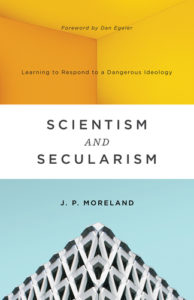 Scientism and Secularism: Learning to Respond to a Dangerous ideology J.P. Moreland (Crossway) $16.99 One of our go-to customers and friends I call whenever we have a new science book that I want an opinion on just finished this. He quickly urged me to tell others about it. He said it was very, very clear and very, very important. I tend to agree that this philosophical worldview, a reductionism that says that the only things that matter are those things that can be empirically measured, is dangerous. That it leads to a loss of transcendence and proposes in its place a thin sort of secularism nearly denuded of wonder and ultimate value seems evident to me.
Scientism and Secularism: Learning to Respond to a Dangerous ideology J.P. Moreland (Crossway) $16.99 One of our go-to customers and friends I call whenever we have a new science book that I want an opinion on just finished this. He quickly urged me to tell others about it. He said it was very, very clear and very, very important. I tend to agree that this philosophical worldview, a reductionism that says that the only things that matter are those things that can be empirically measured, is dangerous. That it leads to a loss of transcendence and proposes in its place a thin sort of secularism nearly denuded of wonder and ultimate value seems evident to me.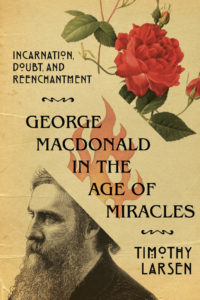 Not so, everyone. Many disagree, although the debate about this world of wonders is lively. This discussion is important for all of us, and not just for those in the sciences. In fact, another fabulously rich, brand new literary book explores this questions and makes a somewhat similar case, drawing on history — see George MacDonald in the Age of Miracles: Incarnation, Doubt and Reenchantment by historian Timothy Larsen (IVP; $16.00.)
Not so, everyone. Many disagree, although the debate about this world of wonders is lively. This discussion is important for all of us, and not just for those in the sciences. In fact, another fabulously rich, brand new literary book explores this questions and makes a somewhat similar case, drawing on history — see George MacDonald in the Age of Miracles: Incarnation, Doubt and Reenchantment by historian Timothy Larsen (IVP; $16.00.)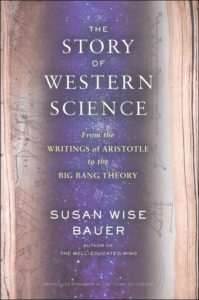 The Story of Western Science: From the Writings of Aristotle to the Big Bang Theory Susan Wise Bauer (Norton) $26.95 What a great gift idea this is for those who are interested in the history of the development of science in the West and who want to dip in to concise summaries of hundreds of major theories, key thinkers, chief debates, sprinkled nicely with primary source quotes. You may know the very widely read Susan Wise Bauer and her many volumes helping us all develop a well-educated mind. In this book she has arranged short and nearly chatty overviews of hundreds of important and often seminal thinkers and researchers. For each chapter she has a link to her website that offers excerpts of the primary source readings she discusses.
The Story of Western Science: From the Writings of Aristotle to the Big Bang Theory Susan Wise Bauer (Norton) $26.95 What a great gift idea this is for those who are interested in the history of the development of science in the West and who want to dip in to concise summaries of hundreds of major theories, key thinkers, chief debates, sprinkled nicely with primary source quotes. You may know the very widely read Susan Wise Bauer and her many volumes helping us all develop a well-educated mind. In this book she has arranged short and nearly chatty overviews of hundreds of important and often seminal thinkers and researchers. For each chapter she has a link to her website that offers excerpts of the primary source readings she discusses.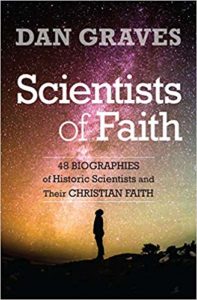 Scientists of Faith: 48 Biographies of Historic Scientists and Their Christian Faith Dan Graves (Kregel) $15.99 Graves is a life long reader (with a degree in library science) so has access to resources that many of us simply don’t know about. In this nice little volume he tells the Christian testimonies of many important scientists, drawing from their own biographies and letters, showing how many of the important researchers did so out of a deep motivation to understand God’s world and worship God with their learning. It is actually very interesting to hear about so many scientists from earlier historical periods in so many fields doing good academic and scientific research. A nice gift for a high school student, perhaps, or young collegiate.
Scientists of Faith: 48 Biographies of Historic Scientists and Their Christian Faith Dan Graves (Kregel) $15.99 Graves is a life long reader (with a degree in library science) so has access to resources that many of us simply don’t know about. In this nice little volume he tells the Christian testimonies of many important scientists, drawing from their own biographies and letters, showing how many of the important researchers did so out of a deep motivation to understand God’s world and worship God with their learning. It is actually very interesting to hear about so many scientists from earlier historical periods in so many fields doing good academic and scientific research. A nice gift for a high school student, perhaps, or young collegiate.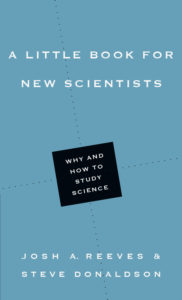 A Little Book for New Scientists: Why and How to Study Science Josh Reeves (IVP) $12.00 This is truly a pocket sized book, a perfect stocking stuffer for a sciency high school student or a young collegiate. This publisher is affiliated with the great campus ministry organization (InterVarsity Christian Fellowship, known on campus often as I-V) and they know well the struggles and joys of a young person of faith learning to use their minds for God, sensing an interest in science, and they want to help those students take up their science classes as holy callings. There is no dilemma here; science isn’t a battleground against faith (although there are some science profs who hold to a naturalistic philosophy of scientism which is itself an a priori belief which isn’t exactly scientific itself.) So there are philosophical questions about the assumptions of science and what science does and can do so this little guidebook delightful lays the groundwork for such faithful scholarship. It is short and clear and interesting, surely a blessing for one who hasn’t ever read anything like this. It’s a good start.
A Little Book for New Scientists: Why and How to Study Science Josh Reeves (IVP) $12.00 This is truly a pocket sized book, a perfect stocking stuffer for a sciency high school student or a young collegiate. This publisher is affiliated with the great campus ministry organization (InterVarsity Christian Fellowship, known on campus often as I-V) and they know well the struggles and joys of a young person of faith learning to use their minds for God, sensing an interest in science, and they want to help those students take up their science classes as holy callings. There is no dilemma here; science isn’t a battleground against faith (although there are some science profs who hold to a naturalistic philosophy of scientism which is itself an a priori belief which isn’t exactly scientific itself.) So there are philosophical questions about the assumptions of science and what science does and can do so this little guidebook delightful lays the groundwork for such faithful scholarship. It is short and clear and interesting, surely a blessing for one who hasn’t ever read anything like this. It’s a good start.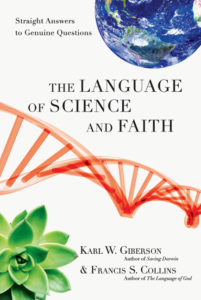 he Language of Science and Faith: Straight Answers to Genuine Questions Karl Giberson & Francis Collins (IVP) $22.00 This nice hardback is often our main “go-to” book for one who wants to read about the ways to think about science from a balanced, winsome Christian worldview. There are many others, some more complex, some more strict in one way or another, but this, written almost in a Q & A format, construed by two very impressive Christians scholars. Giberson is an educator and Collins is a world-renowned geneticist, former head of the team mapping the human genome.) They do help us embrace both science and faith without compromising either – they do not reject standard views of evolution, by the way. It’s very nicely done, smart and helpful.
he Language of Science and Faith: Straight Answers to Genuine Questions Karl Giberson & Francis Collins (IVP) $22.00 This nice hardback is often our main “go-to” book for one who wants to read about the ways to think about science from a balanced, winsome Christian worldview. There are many others, some more complex, some more strict in one way or another, but this, written almost in a Q & A format, construed by two very impressive Christians scholars. Giberson is an educator and Collins is a world-renowned geneticist, former head of the team mapping the human genome.) They do help us embrace both science and faith without compromising either – they do not reject standard views of evolution, by the way. It’s very nicely done, smart and helpful.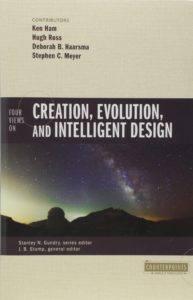
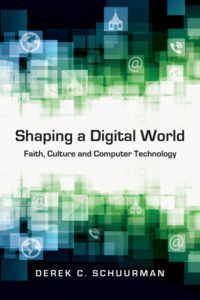 Shaping a Digital World: Faith, Culture, and Computer Technology Derek Schuurman (IVP Academic) $18.00 I have reviewed this more than once at BookNotes and each time suggest how very important it is. Derek has a very comprehensive and integrated Christian mindset and his worldviewish perspective informs how he thinks about his field of computer science. Consequently, it is almost a one-of-a-kind sort of book.
Shaping a Digital World: Faith, Culture, and Computer Technology Derek Schuurman (IVP Academic) $18.00 I have reviewed this more than once at BookNotes and each time suggest how very important it is. Derek has a very comprehensive and integrated Christian mindset and his worldviewish perspective informs how he thinks about his field of computer science. Consequently, it is almost a one-of-a-kind sort of book.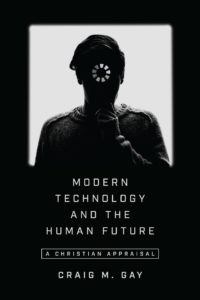 Modern Technology and the Human Future: A Christian Appraisal Craig M. Gay (IVP Academic) $25.00 We will be naming this as one of the most important books of 2018 so we will be tempting you to buy it in an upcoming BookNotes. But surely you know someone who works in (or is fascinated by) modern technology. From industrial engineering to computer culture, we have come to realize that technology is not neutral. It effects us. It is – as Schuurman, above, remind us, made by God, but distorted by sin. Things are blessed and cursed, good and bad. How do we navigate all that intentionally and faithfully? This is a thoughtful, balanced, important work and we are so grateful for its robust theological vision and “in the world but not of it” Christian perspective.
Modern Technology and the Human Future: A Christian Appraisal Craig M. Gay (IVP Academic) $25.00 We will be naming this as one of the most important books of 2018 so we will be tempting you to buy it in an upcoming BookNotes. But surely you know someone who works in (or is fascinated by) modern technology. From industrial engineering to computer culture, we have come to realize that technology is not neutral. It effects us. It is – as Schuurman, above, remind us, made by God, but distorted by sin. Things are blessed and cursed, good and bad. How do we navigate all that intentionally and faithfully? This is a thoughtful, balanced, important work and we are so grateful for its robust theological vision and “in the world but not of it” Christian perspective.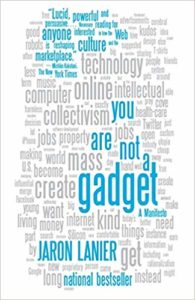 You Are Not A Gadget: A Manifesto Jaron Lanier (Vintage) $15.00 Lanier is a programmer and the father of virtual reality technology. It is said about him that, “he was a pioneer of digital media and among the first to predict the revolutionary changes it would bring to our commerce and culture.”
You Are Not A Gadget: A Manifesto Jaron Lanier (Vintage) $15.00 Lanier is a programmer and the father of virtual reality technology. It is said about him that, “he was a pioneer of digital media and among the first to predict the revolutionary changes it would bring to our commerce and culture.”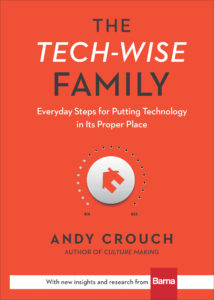 hefty conversations!
hefty conversations!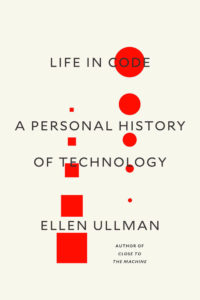 Life in Code: A Personal History of Technology Ellen Ullman (MCD/FSG) $27.00 Wow. With rave reviews in Wired and great blurbs from the likes of cultural critic Sherry Turkle (and, curiously, Pulitzer Prize winning novelist Geraldine Brooks) two things, at least, are evident, and will help you determine if this would be a cool gift for somebody you care about. First, the writer knows her stuff: she is an original voice, to be sure, but she is telling a story that is nearly a memoir. She is a coder and works as a woman doing this odd, techie work. What kind of person gives us our latest digital gizmos and makes them work as they do? Who cooks up and then actually designs the digits and dots that make them flow? Ullman builds worlds with the software she builds. As we know, this is a culture-making, story-telling, soul-shaping thing, for herself and for us. As James K.A. Smith puts it (in You Are What You Love) “the things we do, do things to us.” That is, taking up the technology that Ullman gives us effects us, and shapes our worlds. Ullman knows this and tells her story with vivid grace and tons of detail. Some important reviews have said it is one of the best books of the year.
Life in Code: A Personal History of Technology Ellen Ullman (MCD/FSG) $27.00 Wow. With rave reviews in Wired and great blurbs from the likes of cultural critic Sherry Turkle (and, curiously, Pulitzer Prize winning novelist Geraldine Brooks) two things, at least, are evident, and will help you determine if this would be a cool gift for somebody you care about. First, the writer knows her stuff: she is an original voice, to be sure, but she is telling a story that is nearly a memoir. She is a coder and works as a woman doing this odd, techie work. What kind of person gives us our latest digital gizmos and makes them work as they do? Who cooks up and then actually designs the digits and dots that make them flow? Ullman builds worlds with the software she builds. As we know, this is a culture-making, story-telling, soul-shaping thing, for herself and for us. As James K.A. Smith puts it (in You Are What You Love) “the things we do, do things to us.” That is, taking up the technology that Ullman gives us effects us, and shapes our worlds. Ullman knows this and tells her story with vivid grace and tons of detail. Some important reviews have said it is one of the best books of the year.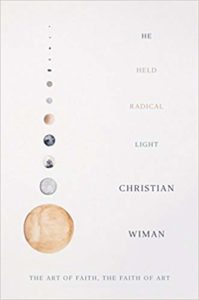 He Held Radical Light: The Art of Faith, The Faith of Art Christian Wiman (FSG) $23.00 From one of our most esteemed poets and talked about theorists of the arts we have a brand new thin hardback ruminating on aesthetics and faith and poetry and creativity and more. This is new and a bit on the highbrow end of things; the brilliant Marilynne Robinson has a blurb on the back saying that Wiman’s poetry and scholarship “have a purifying urgency that is rare in this world.”
He Held Radical Light: The Art of Faith, The Faith of Art Christian Wiman (FSG) $23.00 From one of our most esteemed poets and talked about theorists of the arts we have a brand new thin hardback ruminating on aesthetics and faith and poetry and creativity and more. This is new and a bit on the highbrow end of things; the brilliant Marilynne Robinson has a blurb on the back saying that Wiman’s poetry and scholarship “have a purifying urgency that is rare in this world.”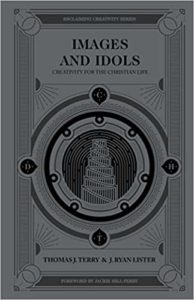 Images and Idols: Creativity for the Christian Life Thomas Terry & J. Ryan Lister (Moody Press) $14.99 This is a passionate youthful, visionary new book that emerges from the humble beast community, centered in the hip-hop record label with that name. It is no surprise that this carries a foreword by Christian rapper Jackie Hill-Perry. But it is not primarily about hip hop or pop culture – it is the first volume in a series of small, cool books that intend to lay out a Christian apologetic for the arts, why creativity matters, and how God is glorified when people do good, allusive, creative art work. As it shouts on the back cover – “God is reclaiming creativity for His glory and our good.”
Images and Idols: Creativity for the Christian Life Thomas Terry & J. Ryan Lister (Moody Press) $14.99 This is a passionate youthful, visionary new book that emerges from the humble beast community, centered in the hip-hop record label with that name. It is no surprise that this carries a foreword by Christian rapper Jackie Hill-Perry. But it is not primarily about hip hop or pop culture – it is the first volume in a series of small, cool books that intend to lay out a Christian apologetic for the arts, why creativity matters, and how God is glorified when people do good, allusive, creative art work. As it shouts on the back cover – “God is reclaiming creativity for His glory and our good.”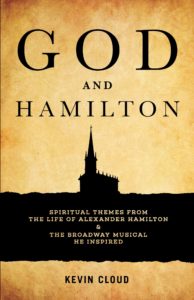 God and Hamilton: Spiritual Themes from the Life of Alexander Hamilton & The Broadway Musical He Inspired Kevin Cloud (Deep River) $15.99 I’m going to be straight up honest with you: I haven’t seen the play and haven’t read the book. But it’s the only one of its kind and it looks pretty solid. And I am almost sure that most of you know somebody who is taken with this play. Or at least the popular soundtrack. Mike Breen – a very energetic and pop culture savvy missional church planter has a rave endorsement (“I cannot recommend it more highly!”) and it does seem to inspire people to reflect on how God works, even in “our own heroic journeys.” There’s a nice blurb on the back by one Lauren Boyd, who is in the Hamilton Broadway cast. She says,
God and Hamilton: Spiritual Themes from the Life of Alexander Hamilton & The Broadway Musical He Inspired Kevin Cloud (Deep River) $15.99 I’m going to be straight up honest with you: I haven’t seen the play and haven’t read the book. But it’s the only one of its kind and it looks pretty solid. And I am almost sure that most of you know somebody who is taken with this play. Or at least the popular soundtrack. Mike Breen – a very energetic and pop culture savvy missional church planter has a rave endorsement (“I cannot recommend it more highly!”) and it does seem to inspire people to reflect on how God works, even in “our own heroic journeys.” There’s a nice blurb on the back by one Lauren Boyd, who is in the Hamilton Broadway cast. She says, The Art of Edward Knippers – Prints and Drawings James Romaine et al (Square Halo Books) $19.99 I have talked before, often, about our respect for this remarkable niche indie publisher, a boutique press called Square Halo Books out of Lancaster, PA. Our friends there do books mostly about the arts and the interface of Christian faith and art. They’ve done the aforementioned It Was Good: Making Art to the Glory of God and others such as It Was Good: Making Music to the Glory of God and It Was Good: Performing Arts to the Glory of God.
The Art of Edward Knippers – Prints and Drawings James Romaine et al (Square Halo Books) $19.99 I have talked before, often, about our respect for this remarkable niche indie publisher, a boutique press called Square Halo Books out of Lancaster, PA. Our friends there do books mostly about the arts and the interface of Christian faith and art. They’ve done the aforementioned It Was Good: Making Art to the Glory of God and others such as It Was Good: Making Music to the Glory of God and It Was Good: Performing Arts to the Glory of God.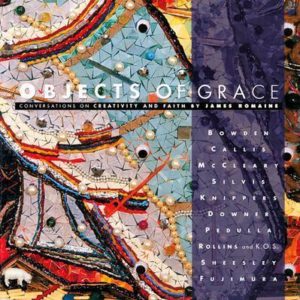 One of the important things they’ve done is publish a small set of books that are essentially introductions to some very contemporary Christian visual artists. My favorite has full color pictures – some lovely, some disturbing, some vivid, some subtle – and interviews with each of the artists talking about their creative work. It is called Objects of Grace ($19.99) and it is an excellent book to encourage modern artists to be active, doing good work and thinking well about their vocation.
One of the important things they’ve done is publish a small set of books that are essentially introductions to some very contemporary Christian visual artists. My favorite has full color pictures – some lovely, some disturbing, some vivid, some subtle – and interviews with each of the artists talking about their creative work. It is called Objects of Grace ($19.99) and it is an excellent book to encourage modern artists to be active, doing good work and thinking well about their vocation.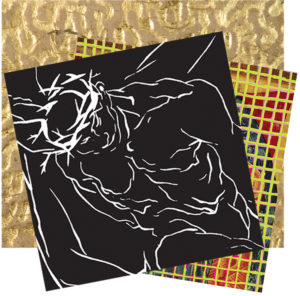 They have three in a series called “The Art of…” which, as they say at the website, “introduces artists to the reader with a lavish amount of the artists work woven through several essays on the theological, art historical, and aesthetic merits of that work. The first three books in this series are The Art of Sandra Bowden, The Art of Guy Chase, and – just off the press —The Art of Edward Knippers: Prints and Drawings.
They have three in a series called “The Art of…” which, as they say at the website, “introduces artists to the reader with a lavish amount of the artists work woven through several essays on the theological, art historical, and aesthetic merits of that work. The first three books in this series are The Art of Sandra Bowden, The Art of Guy Chase, and – just off the press —The Art of Edward Knippers: Prints and Drawings.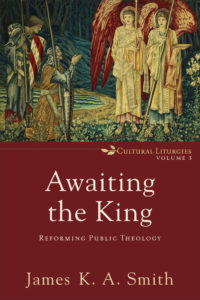
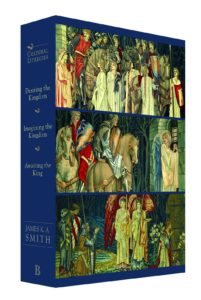 Awaiting the King: Reforming Public Theology James K.A. Smith (Baker Academic) $22.99 This is the third and final volume in the much-discussed “cultural liturgies” project, which included two previous books, the mighty and transformational Desiring the Kingdom: Worship, Worldview
Awaiting the King: Reforming Public Theology James K.A. Smith (Baker Academic) $22.99 This is the third and final volume in the much-discussed “cultural liturgies” project, which included two previous books, the mighty and transformational Desiring the Kingdom: Worship, Worldview 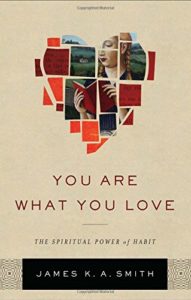 and Cultural Formation and Imagining the Kingdom: Who Worship Works ($22.99 each.) All three volumes can be purchased in a cool box set for $66.99. I have reviewed them extensively in previous BookNotes and have often said that his very popular You Are What You Love: The Spiritual Power of Habit (Brazos Press; $19.99)was a summarizing, easier version of the big three. If you know somebody who liked the more concise You Are What You Love volume, why not spring for the boxed set, and give all three together. Or, just one, even. These are heavier, but they are very, very important and if someone you know is a Smith fan, they ought to have them. They will thank you, later, after they work through them.
and Cultural Formation and Imagining the Kingdom: Who Worship Works ($22.99 each.) All three volumes can be purchased in a cool box set for $66.99. I have reviewed them extensively in previous BookNotes and have often said that his very popular You Are What You Love: The Spiritual Power of Habit (Brazos Press; $19.99)was a summarizing, easier version of the big three. If you know somebody who liked the more concise You Are What You Love volume, why not spring for the boxed set, and give all three together. Or, just one, even. These are heavier, but they are very, very important and if someone you know is a Smith fan, they ought to have them. They will thank you, later, after they work through them.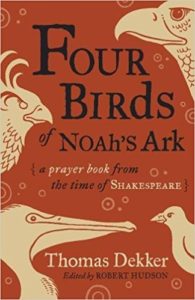 Four Birds of Noah’s Ark: A Prayer Book from the Time of Shakespeare Thomas Dekker, edited by Robert Hudson (Eerdmans) $17.99 Again, this is one of those books that I have talked about often this past year, and we named it a best book of last year. From the beautifully crafted design, the cover and fonts, to the back-story of how this little-known literary classic came back in to print, Four Birds is a bookseller’s dream. I think it is a book-lover’s dream, too, and many of our customers have agreed. What a joy to have and to hold. Congratulations to Eerdmans (and poet and Bible scholar Robert Hudson) for daring to bring this nearly-lost volume back to print.
Four Birds of Noah’s Ark: A Prayer Book from the Time of Shakespeare Thomas Dekker, edited by Robert Hudson (Eerdmans) $17.99 Again, this is one of those books that I have talked about often this past year, and we named it a best book of last year. From the beautifully crafted design, the cover and fonts, to the back-story of how this little-known literary classic came back in to print, Four Birds is a bookseller’s dream. I think it is a book-lover’s dream, too, and many of our customers have agreed. What a joy to have and to hold. Congratulations to Eerdmans (and poet and Bible scholar Robert Hudson) for daring to bring this nearly-lost volume back to print.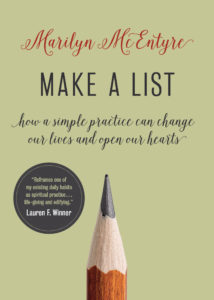 Make a List: How a Simple Practice Can Change Our Lives and Open Our Hearts Marilyn McEntyre (Eerdmans) $21.99 I so enjoy this author and commend any of her books. But this is one of these compact sized hardbacks that is just so nice to hold and which is so inviting. Interestingly, it is a book that we’ve heard customer rave about – sort of a spirituality of getting things done, but with a poetic, leisurely tone. It is from a Christian perspective of course, but is perhaps the least overtly religious books she has done. That is, you could give it to all most anyone. It is a treat, a gem, a lovely little hardback.
Make a List: How a Simple Practice Can Change Our Lives and Open Our Hearts Marilyn McEntyre (Eerdmans) $21.99 I so enjoy this author and commend any of her books. But this is one of these compact sized hardbacks that is just so nice to hold and which is so inviting. Interestingly, it is a book that we’ve heard customer rave about – sort of a spirituality of getting things done, but with a poetic, leisurely tone. It is from a Christian perspective of course, but is perhaps the least overtly religious books she has done. That is, you could give it to all most anyone. It is a treat, a gem, a lovely little hardback. We Need Each Other: Responding to God’s Call to Live Together Jean Vanier (Paraclete) $19.99 This is a sweet, small, hardback volume that offers the reflections of this living saint and Winner of the Templeton Prize. You may recall that Vanier is a master of writing about community and has given his life to offering care and hospitality among the mentally and physically challenged. (Henri Nouwen famously went to one of Vanier’s L’Arche communities to live with the disabled in Toronto.) This book actually came out of a retreat Vanier led in Nyahururu Kenya (a land that has been shattered by violence and bloodshed.) There is a powerful endorsing blurb on the back by Ronald Rolheiser notes how Vanier helps us get to a place of feeling accepted, loved. What a graceful little volume this is.
We Need Each Other: Responding to God’s Call to Live Together Jean Vanier (Paraclete) $19.99 This is a sweet, small, hardback volume that offers the reflections of this living saint and Winner of the Templeton Prize. You may recall that Vanier is a master of writing about community and has given his life to offering care and hospitality among the mentally and physically challenged. (Henri Nouwen famously went to one of Vanier’s L’Arche communities to live with the disabled in Toronto.) This book actually came out of a retreat Vanier led in Nyahururu Kenya (a land that has been shattered by violence and bloodshed.) There is a powerful endorsing blurb on the back by Ronald Rolheiser notes how Vanier helps us get to a place of feeling accepted, loved. What a graceful little volume this is.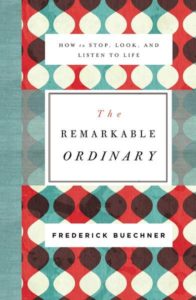 The Remarkable Ordinary: How to Stop, Look, and Listen to Your Life Frederick Buechner (Zondervan) $16.99 This came out to not near enough acclaim last year and we still are excited to tell people about it. These chapters were based a serious of mostly unpublished lectures given at Laity Lodge in Texas, years ago. Buechner was inviting his listeners (who I believe included some who where theologically astute, and some who maybe where not, and some artists, too, I heard.) He challenged them to pay attention to their lives, to realize that one’s very remarkable life is being played out in the ordinariness of each day. He asks us to use our imaginations and see the greatness in others, to love others. Pay attention, he says. Who wouldn’t appreciate an eloquent, careful, wordsmith telling stories and calling us to find God in the midst of our daily living? This is an important author and yet a not well known books. Maybe you could surprise someone this season by offering this as a nice little Christmas blessing.
The Remarkable Ordinary: How to Stop, Look, and Listen to Your Life Frederick Buechner (Zondervan) $16.99 This came out to not near enough acclaim last year and we still are excited to tell people about it. These chapters were based a serious of mostly unpublished lectures given at Laity Lodge in Texas, years ago. Buechner was inviting his listeners (who I believe included some who where theologically astute, and some who maybe where not, and some artists, too, I heard.) He challenged them to pay attention to their lives, to realize that one’s very remarkable life is being played out in the ordinariness of each day. He asks us to use our imaginations and see the greatness in others, to love others. Pay attention, he says. Who wouldn’t appreciate an eloquent, careful, wordsmith telling stories and calling us to find God in the midst of our daily living? This is an important author and yet a not well known books. Maybe you could surprise someone this season by offering this as a nice little Christmas blessing.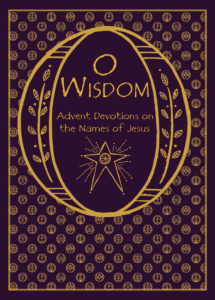 Wisdom: Advent Devotions on the Names of Jesus (Forward Movement Press) $7.00 Okay, friends, let’s get our deep Advent on, here, and share some really interesting news. The O Antiphons are some of the Christian communities earliest prayers, dating to the eighth century monks, or earlier. They are prayers drawing on various names of Christ, starting with the names in Isaiah. You may know some of them as sung in the first phrases of each stanza of “O Come O Come Emmanuel.” (Did you know there are, I think, maybe, a zillion verses to that hymn in the ancient church? I’m only exaggerating a little.) And here is what is so interesting – the first letters of the names of Christ (Immanuel, Wisdom, Dayspring, Desire of Nations, etc) – in the initial order as prayed in the O Antiphons, were, in fact, a backward acrostics, spelling “ero cras” in Latin, which means, “tomorrow I come.” Or something like that.
Wisdom: Advent Devotions on the Names of Jesus (Forward Movement Press) $7.00 Okay, friends, let’s get our deep Advent on, here, and share some really interesting news. The O Antiphons are some of the Christian communities earliest prayers, dating to the eighth century monks, or earlier. They are prayers drawing on various names of Christ, starting with the names in Isaiah. You may know some of them as sung in the first phrases of each stanza of “O Come O Come Emmanuel.” (Did you know there are, I think, maybe, a zillion verses to that hymn in the ancient church? I’m only exaggerating a little.) And here is what is so interesting – the first letters of the names of Christ (Immanuel, Wisdom, Dayspring, Desire of Nations, etc) – in the initial order as prayed in the O Antiphons, were, in fact, a backward acrostics, spelling “ero cras” in Latin, which means, “tomorrow I come.” Or something like that. Tis the season for gift giving! Books make great gifts! We can mail them out right away, even gift-wrap for you. And don’t forget the 12 Days and Epiphany. Etcetera. Etcetera. We trust we don’t have to convince you that Pastor Luci or Uncle Tony or sister Melissa or your dear friend at work or your kid’s friend’s parents who helped them out deserve a little something, if not under their tree, then in with the Christmas cookies or fruitcake. We think we can help. Here’s part one of a free-ranging Hearts & Minds gift-giving guide. We’ll do more in a day or so, including a handful of suggestions on books about science, for those interested in racial justice, and some about the arts. And a few novels, and a couple of kids books after that.
Tis the season for gift giving! Books make great gifts! We can mail them out right away, even gift-wrap for you. And don’t forget the 12 Days and Epiphany. Etcetera. Etcetera. We trust we don’t have to convince you that Pastor Luci or Uncle Tony or sister Melissa or your dear friend at work or your kid’s friend’s parents who helped them out deserve a little something, if not under their tree, then in with the Christmas cookies or fruitcake. We think we can help. Here’s part one of a free-ranging Hearts & Minds gift-giving guide. We’ll do more in a day or so, including a handful of suggestions on books about science, for those interested in racial justice, and some about the arts. And a few novels, and a couple of kids books after that. Connections: A Lectionary Commentary for Preaching and Worship: Year C – Volume 2 edited by Joel Green, Thomas Long, Luke Powery, Cynthia Rigby (WJK) $45.00 Volume 2 just arrived yesterday, a few days earlier than we expected, and we thrilled. We sold the new volume 1 (Advent Until Lent) that came out this fall the last few months, so this, the second, (Lent Through Pentecost) is here just in time. They follow the Revised Common Lectionary and offer ideas for sermons through careful study of the Biblical texts (as they connect with the broader Biblical story and as they connect with our contemporary culture) as well as resources for worship planning. If they don’t have Volume 1, yet, that one would make a great gift. Putting them both together (Volume 1 that came out this fall and Volume 2 that just arrived) would be even sweeter. We love wrapping up two-fers.
Connections: A Lectionary Commentary for Preaching and Worship: Year C – Volume 2 edited by Joel Green, Thomas Long, Luke Powery, Cynthia Rigby (WJK) $45.00 Volume 2 just arrived yesterday, a few days earlier than we expected, and we thrilled. We sold the new volume 1 (Advent Until Lent) that came out this fall the last few months, so this, the second, (Lent Through Pentecost) is here just in time. They follow the Revised Common Lectionary and offer ideas for sermons through careful study of the Biblical texts (as they connect with the broader Biblical story and as they connect with our contemporary culture) as well as resources for worship planning. If they don’t have Volume 1, yet, that one would make a great gift. Putting them both together (Volume 1 that came out this fall and Volume 2 that just arrived) would be even sweeter. We love wrapping up two-fers.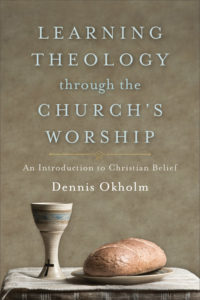 Learning Theology Through the Churches’ Worship: An Introduction to Christian Beliefs Dennis Okholm (Baker Academic) $24.99 We like this author a lot; with a PhD from Princeton, he how teaches theology at Azusa Pacific and is adjunct at Fuller. He previously wrote a great introduction to the meditative life cleverly called Monk Habits for Everyday People: Benedictine Spirituality for Protestants which is really, really good. This is designed as a textbook (he even has an appendix of really great assignments that could be given to supplement this study) but I think anyone who cares about the intersection of worship practices and good theology will adore it. Rave blurbs on the back are from Leanne Van Dyk (at Columbia), Simon Chan (Trinity Theological College), John Witvliet (of the Calvin Institute on Christian Worship), Todd Hunter, and Anglican bishop and founder of a group Okholm works with, the order of the Churches for the Sake of Others. It’s very, very nicely done.
Learning Theology Through the Churches’ Worship: An Introduction to Christian Beliefs Dennis Okholm (Baker Academic) $24.99 We like this author a lot; with a PhD from Princeton, he how teaches theology at Azusa Pacific and is adjunct at Fuller. He previously wrote a great introduction to the meditative life cleverly called Monk Habits for Everyday People: Benedictine Spirituality for Protestants which is really, really good. This is designed as a textbook (he even has an appendix of really great assignments that could be given to supplement this study) but I think anyone who cares about the intersection of worship practices and good theology will adore it. Rave blurbs on the back are from Leanne Van Dyk (at Columbia), Simon Chan (Trinity Theological College), John Witvliet (of the Calvin Institute on Christian Worship), Todd Hunter, and Anglican bishop and founder of a group Okholm works with, the order of the Churches for the Sake of Others. It’s very, very nicely done. Loving and Leaving a Church: A Pastor’s Journey Barbara Melosh (WJK) $18.00 This lovely book — a memoir about a pastor whose ministry did not particularly bear effective fruit and her sense that it was time to leave – could be a appreciated by any pastor, I suppose, but her setting is her calling in the ELCA. (She was also a college professor at George Mason University.) She writes for The Christian Century and is a very talented wordsmith. This really is a great story, poignant, moving. Listen to Richard Lischer (of Duke Divinity School, himself a great author of books on preaching (like the remarkable End of Words) and a quirky memoir of his own small church pasturing (Open Secrets) and a stunning book about the death of his son (Stations of the Heart) as he explains why this would make a great read for pastors:
Loving and Leaving a Church: A Pastor’s Journey Barbara Melosh (WJK) $18.00 This lovely book — a memoir about a pastor whose ministry did not particularly bear effective fruit and her sense that it was time to leave – could be a appreciated by any pastor, I suppose, but her setting is her calling in the ELCA. (She was also a college professor at George Mason University.) She writes for The Christian Century and is a very talented wordsmith. This really is a great story, poignant, moving. Listen to Richard Lischer (of Duke Divinity School, himself a great author of books on preaching (like the remarkable End of Words) and a quirky memoir of his own small church pasturing (Open Secrets) and a stunning book about the death of his son (Stations of the Heart) as he explains why this would make a great read for pastors: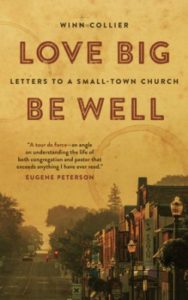 Love Big, Be Well: Letters to a Small Town Church Winn Collier (Eerdmans) $16.99 I bet you recall that we’ve promoted this several times in previous BookNotes, told about it from up front almost everywhere we went last year, and, of course, awarded it one of the Best Books of 2017. So, I think there may be a few people who haven’t read it yet, so let’s go! To whom can you give this fabulous little novel? It is fiction, with a human-scale plot that unfolds as a series of letters from a down-home, literary, eloquent, thoughtful (Wendell Berry quoting) new pastor of a rather cranky, colorful (if ordinary) small church in a small town. The life of this just-out-of-retirement, seemingly jaded, old pastor who cares well for this new little flock is only part of the story. Love Big, Be Well is a novel about a church and a pastor and a place. The late, great, Eugene Peterson called it a “tour de force” although it seems to me to be a bit to gentle and witty to be that much of a force. Peterson went on to exclaim about Winn’s story that it was the best thing he ever read on pastors and their churches. I think that may be just about right. In any event, it’s a really interesting, well-written read, clearly the best novel I’ve ever read about church stuff. Pastors have loved it although anyone can enjoy it.
Love Big, Be Well: Letters to a Small Town Church Winn Collier (Eerdmans) $16.99 I bet you recall that we’ve promoted this several times in previous BookNotes, told about it from up front almost everywhere we went last year, and, of course, awarded it one of the Best Books of 2017. So, I think there may be a few people who haven’t read it yet, so let’s go! To whom can you give this fabulous little novel? It is fiction, with a human-scale plot that unfolds as a series of letters from a down-home, literary, eloquent, thoughtful (Wendell Berry quoting) new pastor of a rather cranky, colorful (if ordinary) small church in a small town. The life of this just-out-of-retirement, seemingly jaded, old pastor who cares well for this new little flock is only part of the story. Love Big, Be Well is a novel about a church and a pastor and a place. The late, great, Eugene Peterson called it a “tour de force” although it seems to me to be a bit to gentle and witty to be that much of a force. Peterson went on to exclaim about Winn’s story that it was the best thing he ever read on pastors and their churches. I think that may be just about right. In any event, it’s a really interesting, well-written read, clearly the best novel I’ve ever read about church stuff. Pastors have loved it although anyone can enjoy it.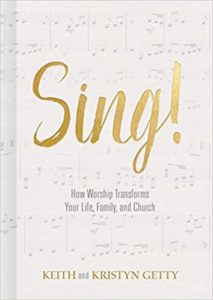 Sing! How Worship Transforms Your Life, Family, and Church Keith & Kristyn Getty (B+H Books) $12.99 I like these smallish, compact sized hardbacks without dust jackets — something concise and solid about them, without being “too much.” This is a perfect gift for a choir friend or praise team leader you want to thank. The Getty’s are internationally known and loved for their modern hymnody (“Through Christ Alone” and many others.) This is one of the only little books of its kind, offering a substantial, if warm, call to sing. It isn’t a heavy exposition, but it has good Bible and sound (sorry) theology.
Sing! How Worship Transforms Your Life, Family, and Church Keith & Kristyn Getty (B+H Books) $12.99 I like these smallish, compact sized hardbacks without dust jackets — something concise and solid about them, without being “too much.” This is a perfect gift for a choir friend or praise team leader you want to thank. The Getty’s are internationally known and loved for their modern hymnody (“Through Christ Alone” and many others.) This is one of the only little books of its kind, offering a substantial, if warm, call to sing. It isn’t a heavy exposition, but it has good Bible and sound (sorry) theology. The State of the Evangelical Mind: Reflections on the Past, Prospects for the Future edited by Todd Ream, Jerry Pattengale & Christopher Devers (IVP) $28.00 I know there is a pretty large body of folks out there who read, or at least read about, the incredibly important 1995 Eerdmans book The Scandal of the Evangelical Mind by Mark Noll. I don’t have time here to explain the history of that book nor the extraordinary impact that, through God’s grace and some serious work on many fronts, that book generated. In a way, some of our favorite publishers and authors were shaped in significant ways by Noll’s call to be more intentional and serious about developing a Christian Mind. This new book, The State of the Evangelical Mind is a multi-authored volume about the legacy of the Noll book two decades ago. It is a tribute, a sign of hope, and a challenge for those of us who want God’s people to continue to grow in hearts and minds!
The State of the Evangelical Mind: Reflections on the Past, Prospects for the Future edited by Todd Ream, Jerry Pattengale & Christopher Devers (IVP) $28.00 I know there is a pretty large body of folks out there who read, or at least read about, the incredibly important 1995 Eerdmans book The Scandal of the Evangelical Mind by Mark Noll. I don’t have time here to explain the history of that book nor the extraordinary impact that, through God’s grace and some serious work on many fronts, that book generated. In a way, some of our favorite publishers and authors were shaped in significant ways by Noll’s call to be more intentional and serious about developing a Christian Mind. This new book, The State of the Evangelical Mind is a multi-authored volume about the legacy of the Noll book two decades ago. It is a tribute, a sign of hope, and a challenge for those of us who want God’s people to continue to grow in hearts and minds!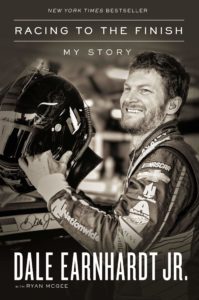 Racing to the Finish: My Story Dale Earnhardt, Jr. (Thomas Nelson) $26.99 I don’t have to say much more. If you are into motor sports at all, or know anybody who loves NASCAR, this name is iconic, and, since the book just came out about a week or so ago, it is a perfect holiday gift. When he retired from professional stock car racing in 2017 he walked away as a healthy man, but had multiple racing-related concussions and was concerned about the “race-at-all-costs” culture that he was a part of, even though he “feared something was terribly wrong.” For the first time, he here tells his behind the scenes story, his notes about the physical and emotional struggled he faced, and how he wanted to end his own storied career on his own terms.
Racing to the Finish: My Story Dale Earnhardt, Jr. (Thomas Nelson) $26.99 I don’t have to say much more. If you are into motor sports at all, or know anybody who loves NASCAR, this name is iconic, and, since the book just came out about a week or so ago, it is a perfect holiday gift. When he retired from professional stock car racing in 2017 he walked away as a healthy man, but had multiple racing-related concussions and was concerned about the “race-at-all-costs” culture that he was a part of, even though he “feared something was terribly wrong.” For the first time, he here tells his behind the scenes story, his notes about the physical and emotional struggled he faced, and how he wanted to end his own storied career on his own terms.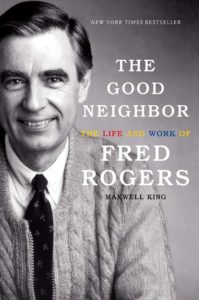 The Good Neighbor: The Life and Work of Fred Rogers Maxwell King (Abrams Press) $30.00 Believe it or not, this is the first full length, major biography of the Presbyterian saint, and what a beautiful, majestic, work it is. It tells us so much, and is so interesting! The Good Neighbor looks at Fred’s growing up years, his call to ministry and years at Pittsburgh Theological Seminary and involved in Western Pennsylvania Presbyterianism, his dream to found the innovative, gentle TV show, and his legendary vocation in media making a difference in the lives of the nation. This is a handsome, fascinating volume, almost 400 pages, with some wonderful pictures. As jazz great (and Fred’s friend and associate) Wynton Marsalis says, “Fred Rogers was one of a kind – an American original like Louis Armstrong, Duke Ellington, Johnny Cash. There was no one like him.” This book tells the real story with insight and care.
The Good Neighbor: The Life and Work of Fred Rogers Maxwell King (Abrams Press) $30.00 Believe it or not, this is the first full length, major biography of the Presbyterian saint, and what a beautiful, majestic, work it is. It tells us so much, and is so interesting! The Good Neighbor looks at Fred’s growing up years, his call to ministry and years at Pittsburgh Theological Seminary and involved in Western Pennsylvania Presbyterianism, his dream to found the innovative, gentle TV show, and his legendary vocation in media making a difference in the lives of the nation. This is a handsome, fascinating volume, almost 400 pages, with some wonderful pictures. As jazz great (and Fred’s friend and associate) Wynton Marsalis says, “Fred Rogers was one of a kind – an American original like Louis Armstrong, Duke Ellington, Johnny Cash. There was no one like him.” This book tells the real story with insight and care.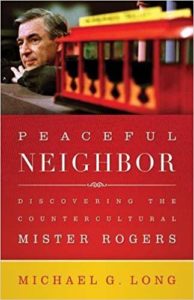 For those who are truly serious fans you may recall that we often recommend the insightful study of the values and politics of Fred and his show well researched and well told by near-by Elizabethtown College religion professor Mike Long. It might make a great gift for some fan on your list, too. It’s called Peaceful Neighbor: Discovering the Countercultural Mister Rogers (WJK; $17.00) and it is really informative, inspired by reading his many notes and letters and remarks about many of the most influential episodes. It is remarkably revealing and should be better known!
For those who are truly serious fans you may recall that we often recommend the insightful study of the values and politics of Fred and his show well researched and well told by near-by Elizabethtown College religion professor Mike Long. It might make a great gift for some fan on your list, too. It’s called Peaceful Neighbor: Discovering the Countercultural Mister Rogers (WJK; $17.00) and it is really informative, inspired by reading his many notes and letters and remarks about many of the most influential episodes. It is remarkably revealing and should be better known!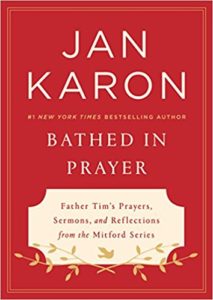 Bathed in Prayer: Father Tim’s Prayers, Sermons, and Reflections from the Mitford Series Jan Karon (Penguin) $20.00 Of course, if they don’t have the whole batch of Mitford novels, you could always order the next one in the series your loved one needs to read. Or just buy the whole set for some lucky recipient.
Bathed in Prayer: Father Tim’s Prayers, Sermons, and Reflections from the Mitford Series Jan Karon (Penguin) $20.00 Of course, if they don’t have the whole batch of Mitford novels, you could always order the next one in the series your loved one needs to read. Or just buy the whole set for some lucky recipient.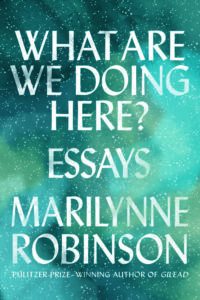 What Are We Doing Here? Essays Marilynne Robinson (FSG) $27.00 Okay, I don’t want to get too highbrow or smug here, but Robinson is a Christian and a John Calvin scholar who wrote one of the great modern novels, Gilead (for which she won the Pulitzer Prize!) By the way, if you need to give a gift for one who likes good fiction, you should right away order from us Gilead, the sequel, Home, and the final in her trilogy, Lila.
What Are We Doing Here? Essays Marilynne Robinson (FSG) $27.00 Okay, I don’t want to get too highbrow or smug here, but Robinson is a Christian and a John Calvin scholar who wrote one of the great modern novels, Gilead (for which she won the Pulitzer Prize!) By the way, if you need to give a gift for one who likes good fiction, you should right away order from us Gilead, the sequel, Home, and the final in her trilogy, Lila.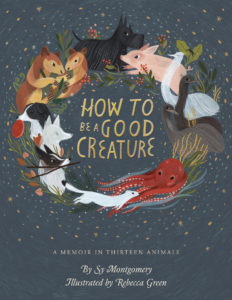 How to Be a Good Creature: A Memoir in Thirteen Animals Sy Montgomery, illustrations by Rebecca Green (Houghton Mifflin Harcourt) $20.00 This is an immediately attractive book for those that like creative and whimsical design, but don’t let the colorful, child-like look confuse you, let alone dissuade you, for considering this extraordinary, thoughtful, beautifully-written book. I forget how we first discovered this – maybe from the brilliant Brain Pickings blog by the genius Maria Popova. It’s that kind of book: about nature and science and human psychology and meaning; it is full of nuance and wit, the wonder of life and startling truth. It is, as the subtitle suggests, a study of what it means to learn from a certain animal, with each chapter exploring a certain creature.
How to Be a Good Creature: A Memoir in Thirteen Animals Sy Montgomery, illustrations by Rebecca Green (Houghton Mifflin Harcourt) $20.00 This is an immediately attractive book for those that like creative and whimsical design, but don’t let the colorful, child-like look confuse you, let alone dissuade you, for considering this extraordinary, thoughtful, beautifully-written book. I forget how we first discovered this – maybe from the brilliant Brain Pickings blog by the genius Maria Popova. It’s that kind of book: about nature and science and human psychology and meaning; it is full of nuance and wit, the wonder of life and startling truth. It is, as the subtitle suggests, a study of what it means to learn from a certain animal, with each chapter exploring a certain creature.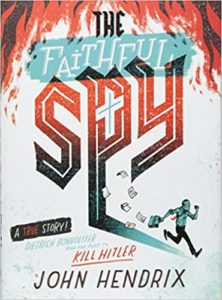 The Faithful Spy: Dietrich Bonhoeffer and the Plot to Kill Hitler John Hendrix (Amulet) $16.99 I do not have to say much about this other than to announce that it is a top-rate graphic novel, complete with all the features you’d expect – good illustration, graphic design, sidebars and illuminations, all done as a modern day “cartoon” biography. It is so exceptionally well-done that it recently was award a prestigious graphic design award from professional association of graphic novelists and publishers. Want to attract a young person to the powerful, complicated story of Bonhoeffer? There is a youth version of Eric Metaxas’s lively Bonhoeffer: Pastor, Martyr Prophet Spy that is good for serious middle schooler or younger teens, but this cool graphic novel is ideal for any who read in this genre. Brilliant!
The Faithful Spy: Dietrich Bonhoeffer and the Plot to Kill Hitler John Hendrix (Amulet) $16.99 I do not have to say much about this other than to announce that it is a top-rate graphic novel, complete with all the features you’d expect – good illustration, graphic design, sidebars and illuminations, all done as a modern day “cartoon” biography. It is so exceptionally well-done that it recently was award a prestigious graphic design award from professional association of graphic novelists and publishers. Want to attract a young person to the powerful, complicated story of Bonhoeffer? There is a youth version of Eric Metaxas’s lively Bonhoeffer: Pastor, Martyr Prophet Spy that is good for serious middle schooler or younger teens, but this cool graphic novel is ideal for any who read in this genre. Brilliant!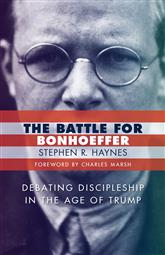 The Battle for Bonhoeffer: Debating Discipleship in an Age of Trump Stephen R. Haynes (Eerdmans) $19.99 I hope you saw my longer essay about this book when it came out a month or so ago; it is valuable and sure to be interesting for anyone who has already read a bit by and about Bonhoeffer. It is really true that many authors and churches and movements have appropriated Bonhoeffer for their own theological agendas and social causes, and that Eric Metaxas marshaling support for President Trump by suggesting that we are in a “Bonhoeffer moment” is only the most recent and most egregious example. Haynes looks at Bonhoeffer, of course, but more, about those who read and interpret and claim him as their own. Yep, he’s critical of Metaxas and spends a lot time explaining why. For the record, I happen to like Eric and appreciate his books. But given his platform these days beyond the books, this Haynes book is very, very important.
The Battle for Bonhoeffer: Debating Discipleship in an Age of Trump Stephen R. Haynes (Eerdmans) $19.99 I hope you saw my longer essay about this book when it came out a month or so ago; it is valuable and sure to be interesting for anyone who has already read a bit by and about Bonhoeffer. It is really true that many authors and churches and movements have appropriated Bonhoeffer for their own theological agendas and social causes, and that Eric Metaxas marshaling support for President Trump by suggesting that we are in a “Bonhoeffer moment” is only the most recent and most egregious example. Haynes looks at Bonhoeffer, of course, but more, about those who read and interpret and claim him as their own. Yep, he’s critical of Metaxas and spends a lot time explaining why. For the record, I happen to like Eric and appreciate his books. But given his platform these days beyond the books, this Haynes book is very, very important.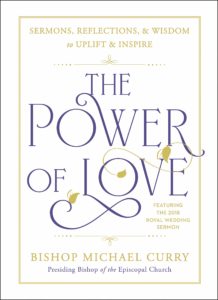 The Power of Love: Sermons, Reflections & Wisdom to Uplift and Inspire Bishop Michael Curry (Avery) $20.00 We were happy to highlight this in our last BookNotes but just have to list it again. Michael Curry is an American Episcopalian, a black preacher who just oozes an enthusiasm for the Kingdom of God and the transforming power of love. That his great sermon about love offered during the wedding that was watched around the world went viral was a testimony to the hunger many have for some connection to God’s love and to social transformation inspired by the ways of Christ. If you know anybody that talked about that sermon last Spring, why not underscore their interest by offering this very handsome little gift book, a collection of fine sermons by the Presiding Bishop of the Episcopal church.
The Power of Love: Sermons, Reflections & Wisdom to Uplift and Inspire Bishop Michael Curry (Avery) $20.00 We were happy to highlight this in our last BookNotes but just have to list it again. Michael Curry is an American Episcopalian, a black preacher who just oozes an enthusiasm for the Kingdom of God and the transforming power of love. That his great sermon about love offered during the wedding that was watched around the world went viral was a testimony to the hunger many have for some connection to God’s love and to social transformation inspired by the ways of Christ. If you know anybody that talked about that sermon last Spring, why not underscore their interest by offering this very handsome little gift book, a collection of fine sermons by the Presiding Bishop of the Episcopal church.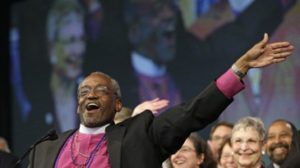 The book is small and has purple end papers, some gold ink, and a presentation page. It’s a nice little collection, but the “Power of Love” sermon preached for the wedding of Prince Harry and Meghan Markle is what will make it of interest to some. It was fun announcing the release of this brand new book to Episcopalians who were gathered with Becca Stevens whose own tag line is “Love Heals.” Do you believe there is power in love? This book will remind you of the truest truths about this very thing.
The book is small and has purple end papers, some gold ink, and a presentation page. It’s a nice little collection, but the “Power of Love” sermon preached for the wedding of Prince Harry and Meghan Markle is what will make it of interest to some. It was fun announcing the release of this brand new book to Episcopalians who were gathered with Becca Stevens whose own tag line is “Love Heals.” Do you believe there is power in love? This book will remind you of the truest truths about this very thing. Stronger Than Steel: The Wayne Alderson Story R.C. Sproul (Nancy Alderson McDonnell) $20.00 This book deserves a much longer review but I must be brief here. We think it would make a nice gift for any number of people and we are one of the few stores that stock this new edition, re-issued by Wayne Alderson’s daughter, Nancy, who continues his work as a consultant teaching about respect in the work-world.
Stronger Than Steel: The Wayne Alderson Story R.C. Sproul (Nancy Alderson McDonnell) $20.00 This book deserves a much longer review but I must be brief here. We think it would make a nice gift for any number of people and we are one of the few stores that stock this new edition, re-issued by Wayne Alderson’s daughter, Nancy, who continues his work as a consultant teaching about respect in the work-world. Tenacious Solidarity: Biblical Provocations on Race, Religion, Climate, and the Economy Walter Brueggemann (Fortress) $29.00 If you know you’ve got a Brueggemann fan on your list this year, and you don’t know about this brand new book – it released just a few weeks ago! – then hearing about this book here, now, may capture your prophetic imagination. Ha! Yep, the author of that classic work, The Prophetic Imagination, published forty some years ago, is still at it. This is a heavy collection of bunches of sermons and Biblical scholarship talks and homilies and lectures (all delivered or written 2014 – 1018) that shows forth Brueggemann’s ongoing relevance as he relates Biblical teaching to these controversial topics of the day.
Tenacious Solidarity: Biblical Provocations on Race, Religion, Climate, and the Economy Walter Brueggemann (Fortress) $29.00 If you know you’ve got a Brueggemann fan on your list this year, and you don’t know about this brand new book – it released just a few weeks ago! – then hearing about this book here, now, may capture your prophetic imagination. Ha! Yep, the author of that classic work, The Prophetic Imagination, published forty some years ago, is still at it. This is a heavy collection of bunches of sermons and Biblical scholarship talks and homilies and lectures (all delivered or written 2014 – 1018) that shows forth Brueggemann’s ongoing relevance as he relates Biblical teaching to these controversial topics of the day.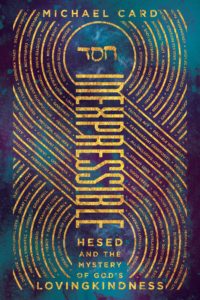 Inexpressible: Hesed and the Mystery of God’s Lovingkindness Michael Card (IVP) $16.00 Some days I have to pinch myself, reminding myself that we’ve got this job and get to do this work. I thought of that the other day when this beautiful new book by Mike Card – singer-songwriter, recording artists, Christian rock star, literally – showed up a few days ago. When Mike visited Hearts & Minds a few years ago we briefly talked about books he had in him, so to speak, artistic hopes, authorial dreams. He is one smart guy, and we are very, very glad to be able to announce this brand new book on the nature of God. He’s been thinking about this a while, and I am sure it will be excellent, well-informed and practical, too.
Inexpressible: Hesed and the Mystery of God’s Lovingkindness Michael Card (IVP) $16.00 Some days I have to pinch myself, reminding myself that we’ve got this job and get to do this work. I thought of that the other day when this beautiful new book by Mike Card – singer-songwriter, recording artists, Christian rock star, literally – showed up a few days ago. When Mike visited Hearts & Minds a few years ago we briefly talked about books he had in him, so to speak, artistic hopes, authorial dreams. He is one smart guy, and we are very, very glad to be able to announce this brand new book on the nature of God. He’s been thinking about this a while, and I am sure it will be excellent, well-informed and practical, too.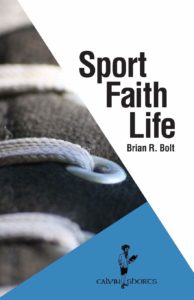 Sport, Faith, Life Brian R Bolt (Calvin College Press) $9.99 This is a small, almost pocket-sized paperback but it is mature, thoughtful, crisp, and insightful. Too many books that attempt to develop a uniquely Christian perspective on sports and athletics fall into one or two errors. Either they are merely devotional, using a muscular sort of faith writing to inspire jocks. I suppose there isn’t anything wrong with that, although some athletes I know are super smart and mature theologically, so they need more than “God will help you win” sort of devotional bromides in their daily spiritual reading. On the other hand, there are a handful of very heady Christian studies of the philosophy of athletics and they are so sociological that they don’t seem particularly relevant for ordinary athletes or sport fans. If the one sort is a little too lightweight, the other extreme includes books that are for scholars, not sportsman and women. Sport, Faith, Life is a breath of fresh air, meaty and mature yet not too heady or heavy. (It is part of a series called “shorts” which allow good scholars to do nice summaries of their work without getting too bogged down. Perfect!)
Sport, Faith, Life Brian R Bolt (Calvin College Press) $9.99 This is a small, almost pocket-sized paperback but it is mature, thoughtful, crisp, and insightful. Too many books that attempt to develop a uniquely Christian perspective on sports and athletics fall into one or two errors. Either they are merely devotional, using a muscular sort of faith writing to inspire jocks. I suppose there isn’t anything wrong with that, although some athletes I know are super smart and mature theologically, so they need more than “God will help you win” sort of devotional bromides in their daily spiritual reading. On the other hand, there are a handful of very heady Christian studies of the philosophy of athletics and they are so sociological that they don’t seem particularly relevant for ordinary athletes or sport fans. If the one sort is a little too lightweight, the other extreme includes books that are for scholars, not sportsman and women. Sport, Faith, Life is a breath of fresh air, meaty and mature yet not too heady or heavy. (It is part of a series called “shorts” which allow good scholars to do nice summaries of their work without getting too bogged down. Perfect!)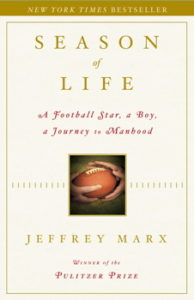 Season of Life: A Football Star, a Boy, a Journey to Manhood Jeffrey Marx (Simon & Schuster) $24.00 Marx is a Pulitzer Prize-winning sports journalist who often writes for Sports Illustrated. He is not particularly known as a religious writer, but here he tells the story of a devout evangelical football star, Joe Ehrmann. (Ehrmann, who has since written his own book called InsideOut Coaching: How Sports Can Transform Lives) played for the Colts when they were still in Baltimore. He left his championship fame and headed off to seminary, only to start a bunch of inner city youth sports teams, which he believed would transform their lives. Marx tells the story well, and what a great story it is. Season of Life is one of the great, inspiring sports stories of our time. It’s a very nice hardback, which makes a great gift.
Season of Life: A Football Star, a Boy, a Journey to Manhood Jeffrey Marx (Simon & Schuster) $24.00 Marx is a Pulitzer Prize-winning sports journalist who often writes for Sports Illustrated. He is not particularly known as a religious writer, but here he tells the story of a devout evangelical football star, Joe Ehrmann. (Ehrmann, who has since written his own book called InsideOut Coaching: How Sports Can Transform Lives) played for the Colts when they were still in Baltimore. He left his championship fame and headed off to seminary, only to start a bunch of inner city youth sports teams, which he believed would transform their lives. Marx tells the story well, and what a great story it is. Season of Life is one of the great, inspiring sports stories of our time. It’s a very nice hardback, which makes a great gift.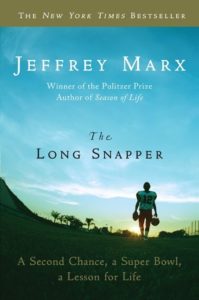 By the way, the award-winning Jeffery Marx’s next book was also about a Christian football player and of course we stock it and recommend it. It is called The Long Snapper: A Second Chance, a Super Bowl, a Lesson for Life (Simon & Schuster; $15.99) which was about Brian Kinchen, a 38-year-old father and Sunday school teacher who took up a position as long snapper for the New England Patriots.
By the way, the award-winning Jeffery Marx’s next book was also about a Christian football player and of course we stock it and recommend it. It is called The Long Snapper: A Second Chance, a Super Bowl, a Lesson for Life (Simon & Schuster; $15.99) which was about Brian Kinchen, a 38-year-old father and Sunday school teacher who took up a position as long snapper for the New England Patriots.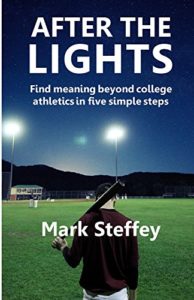 After the Lights: Find Meaning Beyond College Athletics in Five Simple Steps Mark Steffey (CreateSpace) $11.99 I’ve told you about this before, but it would make a surprising little gift to any college athlete or any college athlete who has been out of school for a few years. It is a novel, written by friend who works for the CCO doing campus ministry with college athletes. It asks the question, in a fun, storytelling way, what comes next for one whose identity is too wrapped up in being a sports figure. Few college athletes really get to pursue professional sports so here Mark offers helpful principles about identity and healthy transition out of the college sports scene. This easy-to-read paperback just might be a lifeline, or at least open the door to good conversations about what comes next…
After the Lights: Find Meaning Beyond College Athletics in Five Simple Steps Mark Steffey (CreateSpace) $11.99 I’ve told you about this before, but it would make a surprising little gift to any college athlete or any college athlete who has been out of school for a few years. It is a novel, written by friend who works for the CCO doing campus ministry with college athletes. It asks the question, in a fun, storytelling way, what comes next for one whose identity is too wrapped up in being a sports figure. Few college athletes really get to pursue professional sports so here Mark offers helpful principles about identity and healthy transition out of the college sports scene. This easy-to-read paperback just might be a lifeline, or at least open the door to good conversations about what comes next…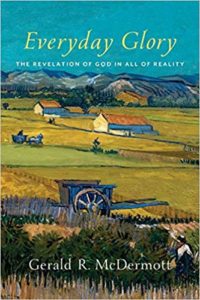 Everyday Glory: The Revelation of God in all of Reality Gerald R. McDermott (Baker Academic) $22.99 This is surely one of the best books of the year, a fabulous, solid, wise study of what we used to call “general revelation.” That is, we all know God speaks to us in the Bible, but does not the Bible itself teach that God is present in all things, that the stuff of life – starts, meals, seeds, even fish, according to Job – can speak to us? This is a book about all that, about how there is an ordinary sort of ‘earthy’ glory, a holy realization of God upholding all things in the creation, everywhere, always. Many have made this point in recent years – just think of Norman Wirzba’s concise but dense study of why we should speak of “creation” rather than “nature” – and McDermott is helpful and reliable, not drifting off to goofy pantheism or overly mystical sentiment.
Everyday Glory: The Revelation of God in all of Reality Gerald R. McDermott (Baker Academic) $22.99 This is surely one of the best books of the year, a fabulous, solid, wise study of what we used to call “general revelation.” That is, we all know God speaks to us in the Bible, but does not the Bible itself teach that God is present in all things, that the stuff of life – starts, meals, seeds, even fish, according to Job – can speak to us? This is a book about all that, about how there is an ordinary sort of ‘earthy’ glory, a holy realization of God upholding all things in the creation, everywhere, always. Many have made this point in recent years – just think of Norman Wirzba’s concise but dense study of why we should speak of “creation” rather than “nature” – and McDermott is helpful and reliable, not drifting off to goofy pantheism or overly mystical sentiment.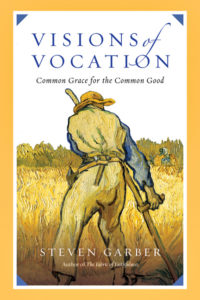 Hey, by the way, how about that beautiful Van Gogh cover? You could buy Steve Garber’s thoughtful Visions of Vocation: Common Grace for the Common Good (IVP; $17.00) and give them as a pair. I’m not even kidding! It is a wise and eloquent volume about keeping on, about taking up our callings in a messy world and is one of my most often-mentioned books. It isn’t simplistic, and the rich cover matches it
Hey, by the way, how about that beautiful Van Gogh cover? You could buy Steve Garber’s thoughtful Visions of Vocation: Common Grace for the Common Good (IVP; $17.00) and give them as a pair. I’m not even kidding! It is a wise and eloquent volume about keeping on, about taking up our callings in a messy world and is one of my most often-mentioned books. It isn’t simplistic, and the rich cover matches it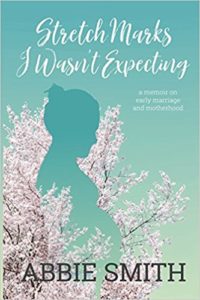 Stretch Marks I Wasn’t Expecting: A Memoir on Early Marriage and Motherhood Abbie Smith (Kalos Press) $15.95 We’ve mentioned Abbie a few other times this year, naming this book when we could, because we are thrilled to know her, to name her as a faithful friend of the bookstore, and because she is a fine, fine thinker and fine writer. (An early book thrilled us as it explored how college students serve God even in the classroom by thinking Christianly in their majors, and another about sexuality written when she was a passionate, single young adult.) Now she and her husband are stewards of a beautiful, intimate retreat center run by a historic United Methodist Church in Cha and now she talks candidly about their life together in this recent memoir.
Stretch Marks I Wasn’t Expecting: A Memoir on Early Marriage and Motherhood Abbie Smith (Kalos Press) $15.95 We’ve mentioned Abbie a few other times this year, naming this book when we could, because we are thrilled to know her, to name her as a faithful friend of the bookstore, and because she is a fine, fine thinker and fine writer. (An early book thrilled us as it explored how college students serve God even in the classroom by thinking Christianly in their majors, and another about sexuality written when she was a passionate, single young adult.) Now she and her husband are stewards of a beautiful, intimate retreat center run by a historic United Methodist Church in Cha and now she talks candidly about their life together in this recent memoir.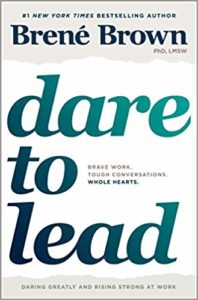 Dare to Lead: Brave Work. Tough Conversations. Whole Hearts Brene Brown (Random House) $28.00 I assume most readers have heard of Brene Brown, the popular social science researcher who has done dramatic books about vulnerability, resilience, hope, recovery from hard stuff, shame, even a spirituality of daring. Maybe you’ve seen her TED talks, or read Daring Greatly, Rising Strong, The Gifts of Imperfection or Braving the Wilderness. It would be a fair guess to suggest that you know somebody who has a BB book on her gift list. We stock them all and could send any of them out, right away.
Dare to Lead: Brave Work. Tough Conversations. Whole Hearts Brene Brown (Random House) $28.00 I assume most readers have heard of Brene Brown, the popular social science researcher who has done dramatic books about vulnerability, resilience, hope, recovery from hard stuff, shame, even a spirituality of daring. Maybe you’ve seen her TED talks, or read Daring Greatly, Rising Strong, The Gifts of Imperfection or Braving the Wilderness. It would be a fair guess to suggest that you know somebody who has a BB book on her gift list. We stock them all and could send any of them out, right away.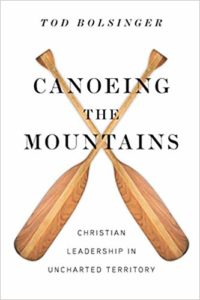 Canoeing the Mountains: Christian Leadership in Uncharted Territory Tod Bolsinger (IVP) $22.00 It isn’t every book we get to announce as a new one more than once but this book – in part because it is very, very good and increasingly respected and cited – was out in paperback last year. In a rare move, the publisher (for some good, technical reasons about getting it reviewed and taken seriously in serious places) re-issued it in hardback! (Usually, a hardcover comes first and is then replaced by a cheaper paperback.) Canoeing the Mountains has had a buzz unlike any other book on leadership I can think of in recent years and we are glad. The new hardback does include a study guide, so it has some value added. It is a must read for leaders in any setting and we are grateful for this astute young theologian who has written a superb, insightful book about navigating change as a leader. You should give this to somebody you know.
Canoeing the Mountains: Christian Leadership in Uncharted Territory Tod Bolsinger (IVP) $22.00 It isn’t every book we get to announce as a new one more than once but this book – in part because it is very, very good and increasingly respected and cited – was out in paperback last year. In a rare move, the publisher (for some good, technical reasons about getting it reviewed and taken seriously in serious places) re-issued it in hardback! (Usually, a hardcover comes first and is then replaced by a cheaper paperback.) Canoeing the Mountains has had a buzz unlike any other book on leadership I can think of in recent years and we are glad. The new hardback does include a study guide, so it has some value added. It is a must read for leaders in any setting and we are grateful for this astute young theologian who has written a superb, insightful book about navigating change as a leader. You should give this to somebody you know. The Eternal Current: How a Practice-Based Faith Can Save Us From Drowning Aaron Niequist (Waterbrook) $19.99 What a book! You may recall our longer review of this earlier, but it is a wild and passionate invitation to participate… using the image of a River, Niequist invites us to join this River (what Jesus called “The Kingdom of God”) and get wet. This book is, playfully following the metaphor, a guide for learning to swim in the wild, moving, eternal current.
The Eternal Current: How a Practice-Based Faith Can Save Us From Drowning Aaron Niequist (Waterbrook) $19.99 What a book! You may recall our longer review of this earlier, but it is a wild and passionate invitation to participate… using the image of a River, Niequist invites us to join this River (what Jesus called “The Kingdom of God”) and get wet. This book is, playfully following the metaphor, a guide for learning to swim in the wild, moving, eternal current.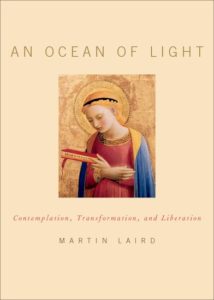 An Ocean of Light: Contemplation, Transformation, and Liberation Martin Laird (Oxford University Press) $18.95 Doesn’t the title just sound like it would appeal to someone on your list? This is a compact hardback, just beautiful to hold and handle, and it is mature, thoughtful writing that brings to mind the mystery and depth of Thomas Merton. Some of our customers just loved his first book in this set, Into the Silent Land: A Guide to the Christian Practice of Contemplation and then read the handsome companion volume, A Sunlit Absence: Silence, Awareness, and Contemplation, both published by Oxford University Press ($18.95 each.) This new one, An Ocean of Light looks very special.
An Ocean of Light: Contemplation, Transformation, and Liberation Martin Laird (Oxford University Press) $18.95 Doesn’t the title just sound like it would appeal to someone on your list? This is a compact hardback, just beautiful to hold and handle, and it is mature, thoughtful writing that brings to mind the mystery and depth of Thomas Merton. Some of our customers just loved his first book in this set, Into the Silent Land: A Guide to the Christian Practice of Contemplation and then read the handsome companion volume, A Sunlit Absence: Silence, Awareness, and Contemplation, both published by Oxford University Press ($18.95 each.) This new one, An Ocean of Light looks very special.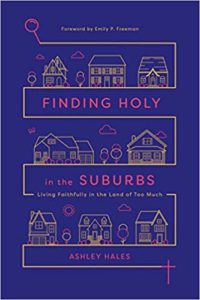 Finding Holy in the Suburbs: Living Faithfully in the Land of Too Much Ashley Hales (IVP) $16.00 This nice paperback book is just on fire, blazing with good ideas, thoughtful analysis, touching stories, good pastoral advice, deeply rooted in pastoral care and a great fluency in spirituality and good literature, too. (Hales is a pastor’s wife and public speaker and has a PhD in English from Edinburgh; it isn’t surprising that she has written in Books & Culture, The Englewood Review and other solid journals.)
Finding Holy in the Suburbs: Living Faithfully in the Land of Too Much Ashley Hales (IVP) $16.00 This nice paperback book is just on fire, blazing with good ideas, thoughtful analysis, touching stories, good pastoral advice, deeply rooted in pastoral care and a great fluency in spirituality and good literature, too. (Hales is a pastor’s wife and public speaker and has a PhD in English from Edinburgh; it isn’t surprising that she has written in Books & Culture, The Englewood Review and other solid journals.) Honey From the Rock: Daily Devotions from Young Kuyper Abraham Kuyper (Lexham Press) $39.00 I hope you know that although Abraham Kuyper is legendary for being a late 19th century/early 20th century Dutch civic leader and tireless activist for Christian causes (he started a newspaper, a university, a system of Christian schools, studied the sciences, Islam, the arts, encouraged neo-Calvinist philosophers, and formed a unique political party through which he became Prime Minister) he was a deeply spiritual man who who had an intimate sort of piety. Besides his public theology and civic writings, his beloved devotional Near Unto God remains a lovely, mature classic of warm-hearted Bible exposition. Now, for the first time, in a translation by James A. De Jon, we have this massive collection of Kuyper’s early devotional writings, writings that Rich Mouw has called “spiritual sweetness.”
Honey From the Rock: Daily Devotions from Young Kuyper Abraham Kuyper (Lexham Press) $39.00 I hope you know that although Abraham Kuyper is legendary for being a late 19th century/early 20th century Dutch civic leader and tireless activist for Christian causes (he started a newspaper, a university, a system of Christian schools, studied the sciences, Islam, the arts, encouraged neo-Calvinist philosophers, and formed a unique political party through which he became Prime Minister) he was a deeply spiritual man who who had an intimate sort of piety. Besides his public theology and civic writings, his beloved devotional Near Unto God remains a lovely, mature classic of warm-hearted Bible exposition. Now, for the first time, in a translation by James A. De Jon, we have this massive collection of Kuyper’s early devotional writings, writings that Rich Mouw has called “spiritual sweetness.”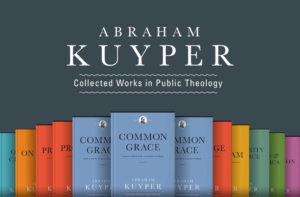 I suppose the publisher made this a massive size (7.4 x 2.4 x 10.2 inches and 600 big pages) so that it can match the volumes being released in the hefty, on-going Kuyper translation project. From his several volumes of public theology exploring common grace to his Pro Rege works to first-time translations on Islam, education, the church, and more, this on-going series is beautiful, but the books are large. We have them, and will continue to stock them as they are released over the next few years. I suppose this big new devotional volume is made to take its place alongside those.
I suppose the publisher made this a massive size (7.4 x 2.4 x 10.2 inches and 600 big pages) so that it can match the volumes being released in the hefty, on-going Kuyper translation project. From his several volumes of public theology exploring common grace to his Pro Rege works to first-time translations on Islam, education, the church, and more, this on-going series is beautiful, but the books are large. We have them, and will continue to stock them as they are released over the next few years. I suppose this big new devotional volume is made to take its place alongside those.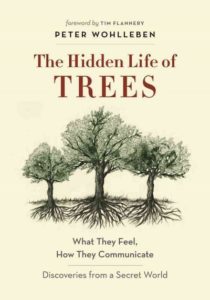 The Hidden Life of Trees: What They Feel, How They Communicate Peter Wohllenben (Greystone) $24.95 This book was translated from the German and became a surprising, break-out best seller during the holiday season of 2016, and was a healthy seller throughout the world in 2017. We have been pleased to stock it, and sell a few here and there. It is a handsome, sturdy, smallish hardback that is charmingly beautiful, full of natural history and provocative science and poetic wisdom about the living nature of trees. Did you know their roots communicate, even help each other? The sub- subtitle on the bottom says this work reveals “Discoveries from a Secrete World” and so it does. Wohlleben is brilliant and is know for his other “mysteries of nature” books such as The Inner Life of Animals and The Secret Wisdom of Nature. Given that Christians read a Sacred Book that tells us, in poetic language, that “trees clap their hands” (Isaiah 55:12) our ears should perk up when a major New York Times bestseller documents the language of creation. Of course, if you have a friend that is utterly secularized, they might have a bit of wonder restored by learning about our “joyous entanglement in the ancient and ever-new web of being” that one reviewer called “paradigm-smashing.”
The Hidden Life of Trees: What They Feel, How They Communicate Peter Wohllenben (Greystone) $24.95 This book was translated from the German and became a surprising, break-out best seller during the holiday season of 2016, and was a healthy seller throughout the world in 2017. We have been pleased to stock it, and sell a few here and there. It is a handsome, sturdy, smallish hardback that is charmingly beautiful, full of natural history and provocative science and poetic wisdom about the living nature of trees. Did you know their roots communicate, even help each other? The sub- subtitle on the bottom says this work reveals “Discoveries from a Secrete World” and so it does. Wohlleben is brilliant and is know for his other “mysteries of nature” books such as The Inner Life of Animals and The Secret Wisdom of Nature. Given that Christians read a Sacred Book that tells us, in poetic language, that “trees clap their hands” (Isaiah 55:12) our ears should perk up when a major New York Times bestseller documents the language of creation. Of course, if you have a friend that is utterly secularized, they might have a bit of wonder restored by learning about our “joyous entanglement in the ancient and ever-new web of being” that one reviewer called “paradigm-smashing.”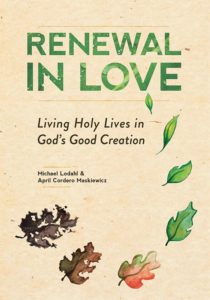 Renewal in Love: Living Holy Lives in God’s Good Creation Michael Lodahl & April Cordero Maskiewicz (Beacon Hill Press/Foundary) $14.99 We have so many books on environmental stewardship, creation-care, green theology, climate change, farming, and the like, that if you know anyone for whom you’d like to gift such a book, I’m sure we can find just the right thing. This one is nice, serious but curious, in that it is a call to holiness (Beacon Hill is related to the Nazarene denomination) and shimmers with warm Wesleyan theology and spirituality. Along with so many others these days, Lodahl & Maskiewicz are asking “what is our salvation for?”
Renewal in Love: Living Holy Lives in God’s Good Creation Michael Lodahl & April Cordero Maskiewicz (Beacon Hill Press/Foundary) $14.99 We have so many books on environmental stewardship, creation-care, green theology, climate change, farming, and the like, that if you know anyone for whom you’d like to gift such a book, I’m sure we can find just the right thing. This one is nice, serious but curious, in that it is a call to holiness (Beacon Hill is related to the Nazarene denomination) and shimmers with warm Wesleyan theology and spirituality. Along with so many others these days, Lodahl & Maskiewicz are asking “what is our salvation for?”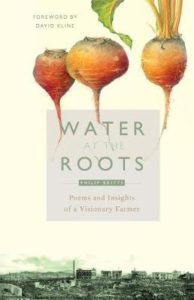 Water at the Roots: Poems and Insights of a Visionary Farmer Philip Britts (Plough Publishing) $16.00 I am not being cheap when I suggest that this is an ideal gift for anyone who likes Wendell Berry. Or anybody who farms and appreciates good words. Or anybody who likes very handsomely designed books of prose and poetry. Britts lived from 1917-1949 and was an idealistic, spiritually-motivated, British agrarian. He resisted the injustices of modernity, he cared for his land, and he wrote prose and poetry of the sort that lead the lively evangelical organic farmer Joel Salatin to exclaim “One of the most powerful books I’ve ever read! Alive with profound spiritual and practical insights, Britt’s words are timeless.”\
Water at the Roots: Poems and Insights of a Visionary Farmer Philip Britts (Plough Publishing) $16.00 I am not being cheap when I suggest that this is an ideal gift for anyone who likes Wendell Berry. Or anybody who farms and appreciates good words. Or anybody who likes very handsomely designed books of prose and poetry. Britts lived from 1917-1949 and was an idealistic, spiritually-motivated, British agrarian. He resisted the injustices of modernity, he cared for his land, and he wrote prose and poetry of the sort that lead the lively evangelical organic farmer Joel Salatin to exclaim “One of the most powerful books I’ve ever read! Alive with profound spiritual and practical insights, Britt’s words are timeless.”\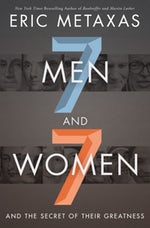 7 Men and 7 Women – And the Secret of Their Greatness Eric Metaxas (Thomas Nelson) $19.99 These collections of very inspiring, informative, well-done short biographies of seven men and seven women were initially published as two separate books. We’ve sold, and still have, them both as single volumes, each in paperback. This great paperback, though, is a combo of both books in one nice, new book. This unique edition combines these two popular books of fourteen individuals who changed the course of history and shaped the world in astonishing way. It would make a nice gift for almost anyone who enjoys history or biography.
7 Men and 7 Women – And the Secret of Their Greatness Eric Metaxas (Thomas Nelson) $19.99 These collections of very inspiring, informative, well-done short biographies of seven men and seven women were initially published as two separate books. We’ve sold, and still have, them both as single volumes, each in paperback. This great paperback, though, is a combo of both books in one nice, new book. This unique edition combines these two popular books of fourteen individuals who changed the course of history and shaped the world in astonishing way. It would make a nice gift for almost anyone who enjoys history or biography.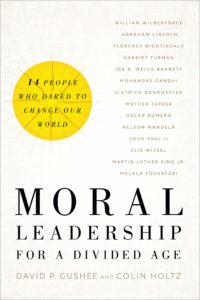 Moral Leadership for a Divided Age: 14 People Who Dared to Change Our World David Gushee & Colin Holtz (Brazos Press) $25.99 What a great, urgent read – informative and inspiring – and what a great gift this would make. Who among us doesn’t desire to have greater capacity to offer moral guidance in whatever space we find ourselves? Who doesn’t want to know a bit about how great change has happened in the past and how leaders have marshaled their leadership abilities to speak to the issues of the day? There are books about leadership and there are books about social change and there are books about character formation but this bring it all together as Gushee – himself an ethicist who has learned to speak out and pay up with integrity in aces – and his co-writer studies great moral leaders, their character and their ability to lead.
Moral Leadership for a Divided Age: 14 People Who Dared to Change Our World David Gushee & Colin Holtz (Brazos Press) $25.99 What a great, urgent read – informative and inspiring – and what a great gift this would make. Who among us doesn’t desire to have greater capacity to offer moral guidance in whatever space we find ourselves? Who doesn’t want to know a bit about how great change has happened in the past and how leaders have marshaled their leadership abilities to speak to the issues of the day? There are books about leadership and there are books about social change and there are books about character formation but this bring it all together as Gushee – himself an ethicist who has learned to speak out and pay up with integrity in aces – and his co-writer studies great moral leaders, their character and their ability to lead.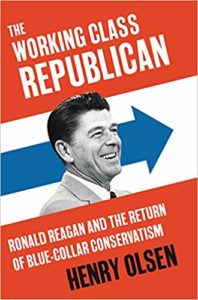 The Working Class Republican: Ronald Reagan and the Return of Blue Collar Conservatism Henry Olsen (Broad Street) $27.99 This is not the place – and at your Christmas party it may not be either – to debate the merits of the controversial but well-loved Ronald Reagan. If you have any conservative politicos on your list (or, for that matter, anyone trying to figure out the appeal of our orange-haired Presidente) this book really could be a great gift. It has a rave, rave review on the back by none other than J.D. Vance (of Hillbilly Elegy.) A not-so-blue-collared guy, the elegant George F. Will, who one simply must respect for his smart, articulate, grace, says “With this nuanced portrait of Ronald Reagan’s political evolution and maturation, Henry Olsen challenges many of his fellow conservatives to rethink, as Reagan did, the art of the possible in the America that the New Deal made.” Other raves from The National Review crew come from Jonah Goldberg and Reihan Salam. This book has garnered a lot of advance praise and we think you may know someone who would enjoy it.
The Working Class Republican: Ronald Reagan and the Return of Blue Collar Conservatism Henry Olsen (Broad Street) $27.99 This is not the place – and at your Christmas party it may not be either – to debate the merits of the controversial but well-loved Ronald Reagan. If you have any conservative politicos on your list (or, for that matter, anyone trying to figure out the appeal of our orange-haired Presidente) this book really could be a great gift. It has a rave, rave review on the back by none other than J.D. Vance (of Hillbilly Elegy.) A not-so-blue-collared guy, the elegant George F. Will, who one simply must respect for his smart, articulate, grace, says “With this nuanced portrait of Ronald Reagan’s political evolution and maturation, Henry Olsen challenges many of his fellow conservatives to rethink, as Reagan did, the art of the possible in the America that the New Deal made.” Other raves from The National Review crew come from Jonah Goldberg and Reihan Salam. This book has garnered a lot of advance praise and we think you may know someone who would enjoy it.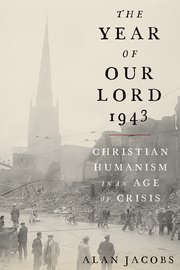 The Year of Our Lord 1943: Christian Humanism in an Age of Crisis Alan Jacobs (Oxford University Press) $29.95 This isn’t exactly a collection of straight biographies, but it looks at significant articles and speeches written by an unique array of Christian intellectuals after World War II. What an interesting scholarly bit of research to explore these several scholars and what they did and said in the mid-1940s as they pondered the future of the West. This book by Alan Jacobs that came out in the summer is surely one of the most significant books of this year.
The Year of Our Lord 1943: Christian Humanism in an Age of Crisis Alan Jacobs (Oxford University Press) $29.95 This isn’t exactly a collection of straight biographies, but it looks at significant articles and speeches written by an unique array of Christian intellectuals after World War II. What an interesting scholarly bit of research to explore these several scholars and what they did and said in the mid-1940s as they pondered the future of the West. This book by Alan Jacobs that came out in the summer is surely one of the most significant books of this year.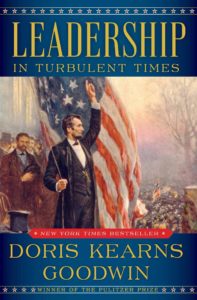 Leadership: In Turbulent Times Doris Kearns Goodwin (Simon & Schuster) $30.00 Dr. Doris K. Goodwin is nearly the dean of great historical biography and she has done much extraordinary work, painstakingly researched but retold in lively, entertaining prose, that has been widely recognized and awarded. (She famously earned the Pulitzer Prize for her thrilling Lincoln book Team of Rivals, which was later made into a popular film.) Here, in her most recent, she explores how four great Presidents handled the leadership challenges life and history threw at them. She asks the same sorts of questions of each, discovers how they came to realize their own leadership abilities, explains their context and struggles, and illustrated how each responded. The President she examines include Abraham Lincoln, Theodore Roosevelt, Franklin D. Roosevelt, and Lyndon B. Johnson
Leadership: In Turbulent Times Doris Kearns Goodwin (Simon & Schuster) $30.00 Dr. Doris K. Goodwin is nearly the dean of great historical biography and she has done much extraordinary work, painstakingly researched but retold in lively, entertaining prose, that has been widely recognized and awarded. (She famously earned the Pulitzer Prize for her thrilling Lincoln book Team of Rivals, which was later made into a popular film.) Here, in her most recent, she explores how four great Presidents handled the leadership challenges life and history threw at them. She asks the same sorts of questions of each, discovers how they came to realize their own leadership abilities, explains their context and struggles, and illustrated how each responded. The President she examines include Abraham Lincoln, Theodore Roosevelt, Franklin D. Roosevelt, and Lyndon B. Johnson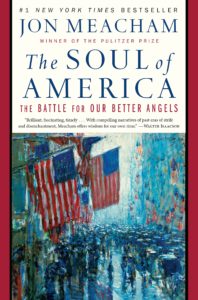 The Soul of America: The Battle for Our Better Angels Jon Meacham (Random House) $30.00 This is a major book by one of our preeminent popular historians. Meacham, too, has earned the Pulitzer Prize and has done several Ne3w York Times bestsellers. A gift of a big book by him would surely be appreciated.
The Soul of America: The Battle for Our Better Angels Jon Meacham (Random House) $30.00 This is a major book by one of our preeminent popular historians. Meacham, too, has earned the Pulitzer Prize and has done several Ne3w York Times bestsellers. A gift of a big book by him would surely be appreciated. Last Call for Liberty: How America’s Genius for Freedom Has Become Its Greatest Threat Os Guinness (IVP) $27.00 I think this should be a popular Christmas gift this year, and one that we hope is widely shared and widely read. This could be listed in other gift-giving categories as it could be interesting to so many folks. It really is about current affairs, our own critical time, and what we in America (and particularly, Christians in America) can do to understand more deeply and advocate more effectively for a robust, deep loyalty to the great ideals of the American experiment. We are in a time that Guinness fears is the gravest crisis sine the Civil War. Those concerns about our current situation will find it valuable.
Last Call for Liberty: How America’s Genius for Freedom Has Become Its Greatest Threat Os Guinness (IVP) $27.00 I think this should be a popular Christmas gift this year, and one that we hope is widely shared and widely read. This could be listed in other gift-giving categories as it could be interesting to so many folks. It really is about current affairs, our own critical time, and what we in America (and particularly, Christians in America) can do to understand more deeply and advocate more effectively for a robust, deep loyalty to the great ideals of the American experiment. We are in a time that Guinness fears is the gravest crisis sine the Civil War. Those concerns about our current situation will find it valuable.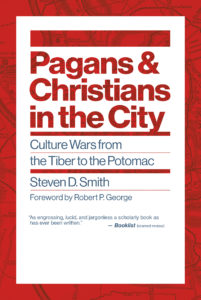 Pagans and Christians in the City: Culture Wars from the Tiber to the Potomac Steven D. Smith, with a foreword by Robert George (Eerdmans) $48.00 Here is a new, very lively book by an esteemed, conservative legal theorist that not only has a foreword by the brilliant Princeton prof Robert George, but carries endorsements from Douglas Laycock (of University of Virginia Law School and perhaps the leading scholar on the history of religious freedom questions), the wonderful John Inazu (we’ve often lauded his book Principled Pluralism ) and Anthony Kronman of Yale Law School. It is wide ranging – one reviewer said it “canvasses a broad landscape of history, law, political theory, and religion…”
Pagans and Christians in the City: Culture Wars from the Tiber to the Potomac Steven D. Smith, with a foreword by Robert George (Eerdmans) $48.00 Here is a new, very lively book by an esteemed, conservative legal theorist that not only has a foreword by the brilliant Princeton prof Robert George, but carries endorsements from Douglas Laycock (of University of Virginia Law School and perhaps the leading scholar on the history of religious freedom questions), the wonderful John Inazu (we’ve often lauded his book Principled Pluralism ) and Anthony Kronman of Yale Law School. It is wide ranging – one reviewer said it “canvasses a broad landscape of history, law, political theory, and religion…” Grateful: The Transforming Power of Giving Thanks Diana Butler Bass (HarperOne) $26.99 Diana is an important religious scholar and historian and a progressive theological critic of the status quo, the Christian right, and those forces that align faith and injustice. I have read all her books from her fascinating memoir of her faith journey through various sorts of Episcopal churches and her good studies of congregational life to the tremendous book about down-to-Earth spirituality called Grounded.
Grateful: The Transforming Power of Giving Thanks Diana Butler Bass (HarperOne) $26.99 Diana is an important religious scholar and historian and a progressive theological critic of the status quo, the Christian right, and those forces that align faith and injustice. I have read all her books from her fascinating memoir of her faith journey through various sorts of Episcopal churches and her good studies of congregational life to the tremendous book about down-to-Earth spirituality called Grounded.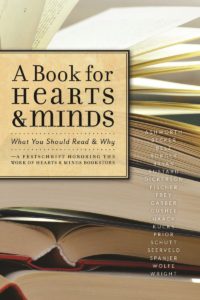 A Book for Hearts & Minds: What You Should Read and Why – a Festschrift Honoring the Work of Hearts & Minds Bookstore edited by Ned Bustard (Square Halo Books) $18.99 I suppose most H&M friends and mail or fans already know about this but forgive me for tooting this horn just a bit and suggesting that it would make a nifty gift. (Heck, Beth and I could even sign our little part.) It is a remarkable book, sort of modeled (we’re told) after the sometimes-epic BookNotes where I name my favorite must-reads on a given topic. Here you get NT Wright listing (just for us) his most recommended New Testament books, annotations of cookbooks by Andi Ashworth, the fabulously interesting Karen Prior Swallow offering great novels, Image Journal founder, Gregory Wolfe naming memoirs, and so many more. From friends like Brad Frey and Steve Garber to nationally known writers as diverse as Dave Gushee and Calvin Seerveld, this collection has something for everyone. And it does help support our project here – moving them out into the world would be a real help. So let us know how many you’d like! Your curious book lover friends will be amazed.
A Book for Hearts & Minds: What You Should Read and Why – a Festschrift Honoring the Work of Hearts & Minds Bookstore edited by Ned Bustard (Square Halo Books) $18.99 I suppose most H&M friends and mail or fans already know about this but forgive me for tooting this horn just a bit and suggesting that it would make a nifty gift. (Heck, Beth and I could even sign our little part.) It is a remarkable book, sort of modeled (we’re told) after the sometimes-epic BookNotes where I name my favorite must-reads on a given topic. Here you get NT Wright listing (just for us) his most recommended New Testament books, annotations of cookbooks by Andi Ashworth, the fabulously interesting Karen Prior Swallow offering great novels, Image Journal founder, Gregory Wolfe naming memoirs, and so many more. From friends like Brad Frey and Steve Garber to nationally known writers as diverse as Dave Gushee and Calvin Seerveld, this collection has something for everyone. And it does help support our project here – moving them out into the world would be a real help. So let us know how many you’d like! Your curious book lover friends will be amazed.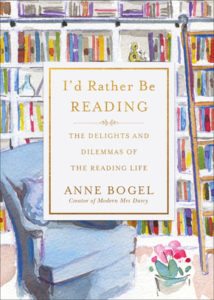 I’d Rather Be Reading: The Delights and Dilemmas of the Reading Life Anne Bogel (Baker) $14.99 Wowie, I’d think this could be given to almost anyone who loves books, or anyone who knows that you love books. Anne Bogel is a very popular blogger (she was the creator of Modern Mrs. Darcy) and does the podcast What Should I Read Next? Anyway, this is a thin, compact hardback and makes a perfect stocking stuffer or thank you gift. (Have you thanked those who recommended good books to you lately?) It has tons of substance, oodles of fun stories appealing to anyone who loves the reading life, and some great book suggestions. It has some nice, pastel artwork, so I suppose it is designed more for women readers, but if a guy is a true bibliophile, they’ll love it, too. Trust me. What a lovely little gift and book lover’s delight. And, might I add, it would be ideal to nurture the passion and skills of reading widely for teens or college age young adults, too. It is amazing how many who are even taking classes at universities aren’t real book lovers. This book can help give ‘em the bug.
I’d Rather Be Reading: The Delights and Dilemmas of the Reading Life Anne Bogel (Baker) $14.99 Wowie, I’d think this could be given to almost anyone who loves books, or anyone who knows that you love books. Anne Bogel is a very popular blogger (she was the creator of Modern Mrs. Darcy) and does the podcast What Should I Read Next? Anyway, this is a thin, compact hardback and makes a perfect stocking stuffer or thank you gift. (Have you thanked those who recommended good books to you lately?) It has tons of substance, oodles of fun stories appealing to anyone who loves the reading life, and some great book suggestions. It has some nice, pastel artwork, so I suppose it is designed more for women readers, but if a guy is a true bibliophile, they’ll love it, too. Trust me. What a lovely little gift and book lover’s delight. And, might I add, it would be ideal to nurture the passion and skills of reading widely for teens or college age young adults, too. It is amazing how many who are even taking classes at universities aren’t real book lovers. This book can help give ‘em the bug.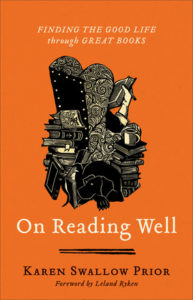 On Reading Well: Finding the Good Life Through Great Books Karen Swallow Prior (with a foreword by Leland Ryken) Brazos Press $19.99 I am sure you’ve seen the many columns we’ve done touting this book earlier this fall. We described her lovely visit here to the shop and the lecture, reading, and conversation that ensued. If you follow her on social media you may have realized she has many, many fans and this book has become one of the most talked about book within the religious publishing world this year. It would make a great gift to anyone who studies serious literature or for anyone who, with a bit of scholarly awareness, is interested in classic virtue formation. How many people talk about Aristotle and Jane Eyre? Aquinas and Charles Dickens, Hauerwas and Cormac McCarthy? What thoughtful evangelical scholar explains the value of Gatsby and Endo and moves easily from Bunyan to Huck Finn to Flannery O’Connor.
On Reading Well: Finding the Good Life Through Great Books Karen Swallow Prior (with a foreword by Leland Ryken) Brazos Press $19.99 I am sure you’ve seen the many columns we’ve done touting this book earlier this fall. We described her lovely visit here to the shop and the lecture, reading, and conversation that ensued. If you follow her on social media you may have realized she has many, many fans and this book has become one of the most talked about book within the religious publishing world this year. It would make a great gift to anyone who studies serious literature or for anyone who, with a bit of scholarly awareness, is interested in classic virtue formation. How many people talk about Aristotle and Jane Eyre? Aquinas and Charles Dickens, Hauerwas and Cormac McCarthy? What thoughtful evangelical scholar explains the value of Gatsby and Endo and moves easily from Bunyan to Huck Finn to Flannery O’Connor.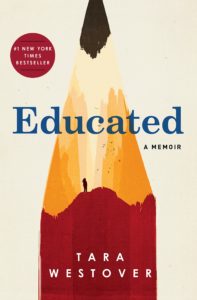 Educated: A Memoir Tara Westover (Random House) $28.00 I do hope you’ve heard of this or have seen at least one the author’s many interviews; we reviewed it at length this fall. It was hard to put down and is surely the memoir of the year that so many are talking about, not unlike the way Hillbilly Elegy swept the country a few years ago. The short version is that Westover was nearly held captive as a worker and homeschooled on the farm in rural Idaho where her parents were fierce survivalists and fundamentalist, apocalyptic Mormons. She was beat by her brother, her education mishandled, her normal desires as a girl often ridiculed and forbidden. (She couldn’t take dance lessons because the leotards were too worldly.) In odds against all odds she ends up getting to college and eventually – it’s a long story – to Oxford and Harvard. It is a brave and revealing story, a reflection on faith and family and hope and reconciliation. What a story, what a writer, what a woman. This book is a fine, fine memoir and, in one reviewers opinion, will “find a place alongside modern classic memoirs like Wild and The Glass Castle. It’s that special.”
Educated: A Memoir Tara Westover (Random House) $28.00 I do hope you’ve heard of this or have seen at least one the author’s many interviews; we reviewed it at length this fall. It was hard to put down and is surely the memoir of the year that so many are talking about, not unlike the way Hillbilly Elegy swept the country a few years ago. The short version is that Westover was nearly held captive as a worker and homeschooled on the farm in rural Idaho where her parents were fierce survivalists and fundamentalist, apocalyptic Mormons. She was beat by her brother, her education mishandled, her normal desires as a girl often ridiculed and forbidden. (She couldn’t take dance lessons because the leotards were too worldly.) In odds against all odds she ends up getting to college and eventually – it’s a long story – to Oxford and Harvard. It is a brave and revealing story, a reflection on faith and family and hope and reconciliation. What a story, what a writer, what a woman. This book is a fine, fine memoir and, in one reviewers opinion, will “find a place alongside modern classic memoirs like Wild and The Glass Castle. It’s that special.”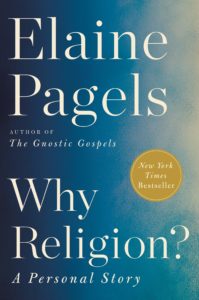 Why Religion? A Personal Story Elaine Pagels (HarperOne) $27.99 Pagels is a respected religion scholar at Princeton University, described as “a preeminent academic whose impressive scholarship has earned her international respect.” Not a Christian believer, she has become nationally known for her work writing about the Gnostic gospels and other topics on the margins of convention. All who have heard her – include a month ago on NPR’s Fresh Air – agree that she is an extraordinary person and many who have read her life story in this engaging memoir report it is one of the best books of this genre they’ve ever encountered. It has been called “searing,” “soul-affirming,” “mesmerizing,” “stirring,” “brilliant,” and “tender”, as she writes about loss (she experienced unimaginable anguish when she lost her young son and a year later her beloved husband died) and spiritual struggle and her own religion’s enduring appeal. This is not a born-again testimony but it could be just the right book for somebody you know.
Why Religion? A Personal Story Elaine Pagels (HarperOne) $27.99 Pagels is a respected religion scholar at Princeton University, described as “a preeminent academic whose impressive scholarship has earned her international respect.” Not a Christian believer, she has become nationally known for her work writing about the Gnostic gospels and other topics on the margins of convention. All who have heard her – include a month ago on NPR’s Fresh Air – agree that she is an extraordinary person and many who have read her life story in this engaging memoir report it is one of the best books of this genre they’ve ever encountered. It has been called “searing,” “soul-affirming,” “mesmerizing,” “stirring,” “brilliant,” and “tender”, as she writes about loss (she experienced unimaginable anguish when she lost her young son and a year later her beloved husband died) and spiritual struggle and her own religion’s enduring appeal. This is not a born-again testimony but it could be just the right book for somebody you know.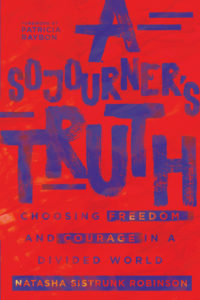 A Sojourner’s Truth: Choosing Freedom and Courage in a Divided World Natasha Sistrunk Robinson (IVP) $16.00 What a book this would be to give to anyone needing the voice of a mentor and leader, but particularly if one needs the voice of a woman, a black woman, who has navigated successful leadership. Natasha Robinson tells of her journey in this book that is part memoir, part handbook for Christian living, and part astute cultural observation and analysis. As a graduate of the US Naval Academy and a former Marine Corps officer, Natasha has nearly twenty years of leadership and mentoring experience in the military, government, church, seminary, and nonprofit sectors. She has seen some stuff, shall we say. She also has a degree from Gordon Conwell Theological Seminary and is an internationally known speaker. She works with several leadership development groups and mentors many.
A Sojourner’s Truth: Choosing Freedom and Courage in a Divided World Natasha Sistrunk Robinson (IVP) $16.00 What a book this would be to give to anyone needing the voice of a mentor and leader, but particularly if one needs the voice of a woman, a black woman, who has navigated successful leadership. Natasha Robinson tells of her journey in this book that is part memoir, part handbook for Christian living, and part astute cultural observation and analysis. As a graduate of the US Naval Academy and a former Marine Corps officer, Natasha has nearly twenty years of leadership and mentoring experience in the military, government, church, seminary, and nonprofit sectors. She has seen some stuff, shall we say. She also has a degree from Gordon Conwell Theological Seminary and is an internationally known speaker. She works with several leadership development groups and mentors many.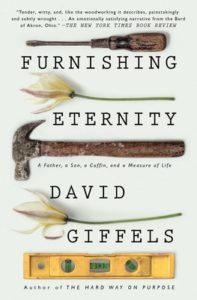 Furnishing Eternity: A Father, a Son, a Coffin, and a Measure of Life David Giffels (Scribner) $24.00 I can’t say too much about this, but it is just what it says, a gripping, at times funny, deeply affecting memoir about a guy whose dad taught him carpentry skills and, in a good effort to reconnect, they two of them build the older man’s casket. What a story! There are rave reviews all over on this, from Jim Sheeler (the powerful author of Final Salute) and Chuck Klosterman. Kirkus Reviews said, “A lifetime’s worth of workbench philosophy in a heartfelt memoir about the connection between father and son.” Oh, and there’s that bit about dad dying and they are building his coffin. What a book!
Furnishing Eternity: A Father, a Son, a Coffin, and a Measure of Life David Giffels (Scribner) $24.00 I can’t say too much about this, but it is just what it says, a gripping, at times funny, deeply affecting memoir about a guy whose dad taught him carpentry skills and, in a good effort to reconnect, they two of them build the older man’s casket. What a story! There are rave reviews all over on this, from Jim Sheeler (the powerful author of Final Salute) and Chuck Klosterman. Kirkus Reviews said, “A lifetime’s worth of workbench philosophy in a heartfelt memoir about the connection between father and son.” Oh, and there’s that bit about dad dying and they are building his coffin. What a book!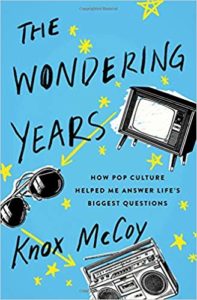 The Wondering Years: How Pop Culture Helped Me Answer Life’s Biggest Questions Knox McCoy (Thomas Nelson) $16.99 I suppose this is a gift for anyone who likes pop culture, but it is so rooted in a particular era of pop culture, and so written as a memoir that I’m listing it here – good for anybody that likes to listen in as someone narrates their own coming of age and figuring stuff out. On the back it asks, “What do you get when you mix pop culture, faith, and a hint of nostalgia?” Sure, pop culture is a powerful window into the human experience, into the values and stories told in any given place and time. For this guy, this collection of hilarious stories shows that he grew up in the 1980s. He runs something called The Popcast Media Group and in this new book he really tells his own story, although also has just lots of random reflections on various pop culture themes. Although not restricted to it, offers lots of shout outs to tons of stuff from his era – from Pee Wee Herman to “Alex vs. Pat” to Legally Blond to Dawson’s Creek and Cosmo Kramer and Harry Potter.
The Wondering Years: How Pop Culture Helped Me Answer Life’s Biggest Questions Knox McCoy (Thomas Nelson) $16.99 I suppose this is a gift for anyone who likes pop culture, but it is so rooted in a particular era of pop culture, and so written as a memoir that I’m listing it here – good for anybody that likes to listen in as someone narrates their own coming of age and figuring stuff out. On the back it asks, “What do you get when you mix pop culture, faith, and a hint of nostalgia?” Sure, pop culture is a powerful window into the human experience, into the values and stories told in any given place and time. For this guy, this collection of hilarious stories shows that he grew up in the 1980s. He runs something called The Popcast Media Group and in this new book he really tells his own story, although also has just lots of random reflections on various pop culture themes. Although not restricted to it, offers lots of shout outs to tons of stuff from his era – from Pee Wee Herman to “Alex vs. Pat” to Legally Blond to Dawson’s Creek and Cosmo Kramer and Harry Potter.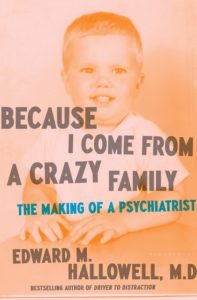 Because I Come from a Crazy Family: The Making of a Psychiatrist Edward M. Hallowell, MD (Bloomsbury) $28.00 We have enjoyed showing this to folks of all sorts – biography and memoir lovers, psychology students, those who know Hallowell as the ground-breaking, leading scholar who documented ADD and ADHA – his book Driven to Distraction has been a bestseller for decades and shaped a conversation for a generation.
Because I Come from a Crazy Family: The Making of a Psychiatrist Edward M. Hallowell, MD (Bloomsbury) $28.00 We have enjoyed showing this to folks of all sorts – biography and memoir lovers, psychology students, those who know Hallowell as the ground-breaking, leading scholar who documented ADD and ADHA – his book Driven to Distraction has been a bestseller for decades and shaped a conversation for a generation.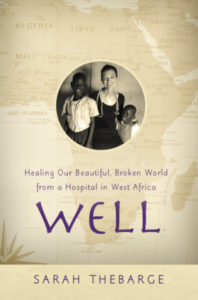 Well: Healing Our Beautiful, Broken World from a Hospital in West Africa Sarah Thebarge (FaithWords) $20.00 Few people have written as passionately and clearly with such a storyteller’s knack to engage readers as Sarah Thebarge. We respected her first memoir called The Invisible Girls: A Memoir, the amazing story of her getting cancer and finding a new lease on life as she joined together caring from Somali refugees in her new hometown in Seattle. It won a number of awards that year, including Notable Book from World in 2013. About it, theologian and novelist Randy Alcorn said:
Well: Healing Our Beautiful, Broken World from a Hospital in West Africa Sarah Thebarge (FaithWords) $20.00 Few people have written as passionately and clearly with such a storyteller’s knack to engage readers as Sarah Thebarge. We respected her first memoir called The Invisible Girls: A Memoir, the amazing story of her getting cancer and finding a new lease on life as she joined together caring from Somali refugees in her new hometown in Seattle. It won a number of awards that year, including Notable Book from World in 2013. About it, theologian and novelist Randy Alcorn said: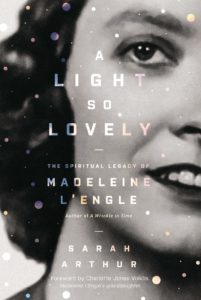 A Light So Lovely: The Spiritual Legacy of Madeleine L’Engle Sarah Arthur (Zondervan) $19.99 If you don’t know this author, maybe you should pick this up for yourself. If you know anyone who enjoys her memoirs, Bible studies, books about aesthetics and the arts, memoirs, poetry, or extraordinary fiction – A Wrinkle in Time and Swiftly Tilting Planet just for starters – this wonderfully rendered reflection on her life is a great read. Not a biography as such, it is a reflection and evaluation of her spiritual legacy, as the sub-title says. Sarah Arthur is herself a L’Engle-esque writer; she has done workshops with organizations dedicated to the memory of C.S. Lewis, Frederick Buechner, the Calvin College Festival of Faith and Writing, and more. She has gifted literate Christian readers with a number of good books, most recently a trilogy of “literary guides to prayer” (buy Light Upon Light: A Literary Guide for Advent, Christmas, and Epiphany if you want to dip in now – you won’t regret it! We have plenty!)
A Light So Lovely: The Spiritual Legacy of Madeleine L’Engle Sarah Arthur (Zondervan) $19.99 If you don’t know this author, maybe you should pick this up for yourself. If you know anyone who enjoys her memoirs, Bible studies, books about aesthetics and the arts, memoirs, poetry, or extraordinary fiction – A Wrinkle in Time and Swiftly Tilting Planet just for starters – this wonderfully rendered reflection on her life is a great read. Not a biography as such, it is a reflection and evaluation of her spiritual legacy, as the sub-title says. Sarah Arthur is herself a L’Engle-esque writer; she has done workshops with organizations dedicated to the memory of C.S. Lewis, Frederick Buechner, the Calvin College Festival of Faith and Writing, and more. She has gifted literate Christian readers with a number of good books, most recently a trilogy of “literary guides to prayer” (buy Light Upon Light: A Literary Guide for Advent, Christmas, and Epiphany if you want to dip in now – you won’t regret it! We have plenty!)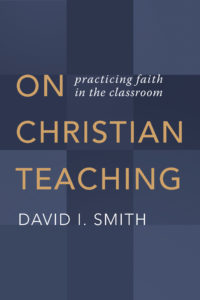 On Christian Teaching: Practicing Faith in the Classroom David I. Smith (Eerdmans) $22.00 For years we have tried to find the very best books that integrate a Christian philosophy of learning and teaching and make them available so that school teachers who are Christians can more overtly practice a way of teaching that is grounded in Christian convictions. Some of these good books emerge from the movement of alternative Christian schools and we often tell educators to just try to apply them in their own settings. There are some really, really good ones, but they are sometimes a bit academic and rigorous. Busy public school teachers maybe just can’t imagine themselves wading through such volumes, although some do.
On Christian Teaching: Practicing Faith in the Classroom David I. Smith (Eerdmans) $22.00 For years we have tried to find the very best books that integrate a Christian philosophy of learning and teaching and make them available so that school teachers who are Christians can more overtly practice a way of teaching that is grounded in Christian convictions. Some of these good books emerge from the movement of alternative Christian schools and we often tell educators to just try to apply them in their own settings. There are some really, really good ones, but they are sometimes a bit academic and rigorous. Busy public school teachers maybe just can’t imagine themselves wading through such volumes, although some do.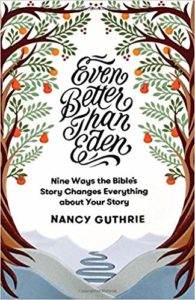 Even Better Than Eden: Nine Ways the Bible’s Story Changes Everything About Your Story Nancy Guthrie (Crossway) $16.99 If the great ending of the Bible story includes the promise of restoration and a removal of all grief (Revelation 21:4) what does this vision of hope mean for how we read the Bible and how we see history and our own lives as they take shape within the unfolding of God’s promises? That’s a mouthful, but if you know anyone who wants an easy-to-read but profound view of the role of the Bible as worldview-shaping and identity forming and world-shaking as we move towards the city that is “better than Eden” this fine book could be a great gift. Nancy Guthrie is a very good Bible teacher and this is a really handsome and rewarding book.
Even Better Than Eden: Nine Ways the Bible’s Story Changes Everything About Your Story Nancy Guthrie (Crossway) $16.99 If the great ending of the Bible story includes the promise of restoration and a removal of all grief (Revelation 21:4) what does this vision of hope mean for how we read the Bible and how we see history and our own lives as they take shape within the unfolding of God’s promises? That’s a mouthful, but if you know anyone who wants an easy-to-read but profound view of the role of the Bible as worldview-shaping and identity forming and world-shaking as we move towards the city that is “better than Eden” this fine book could be a great gift. Nancy Guthrie is a very good Bible teacher and this is a really handsome and rewarding book.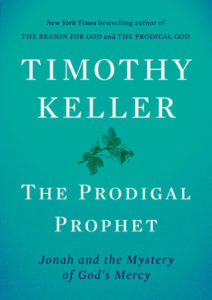 The Prodigal Prophet: Jonah and the Mystery of God’s Mercy Timothy Keller (Viking) $20.00 There is a reason Keller is sometimes considered as a contemporary C.S. Lewis. He is Biblically sound and rigorous, culturally engaged (he has hosted anti-racism workshops at the church, done good event in New York around civility, and has written several books about justice and social service.) Yet, he is deeply centered on the first things of the gospel and is clear in his Bible teaching that all of Scripture points us to Christ. This new little hardback picks up these lasting themes — Jonah runs from God, of course, but more to the point, hated certain ethnicities in a certain city. There is much food for thought here as Keller offers a gospel-centered but socially-aware reading of this ancient story. How he links it to Jesus, too, is a bit surprising, making this a lively and compelling read. Just came out about a month ago, so it would make a swell gift.
The Prodigal Prophet: Jonah and the Mystery of God’s Mercy Timothy Keller (Viking) $20.00 There is a reason Keller is sometimes considered as a contemporary C.S. Lewis. He is Biblically sound and rigorous, culturally engaged (he has hosted anti-racism workshops at the church, done good event in New York around civility, and has written several books about justice and social service.) Yet, he is deeply centered on the first things of the gospel and is clear in his Bible teaching that all of Scripture points us to Christ. This new little hardback picks up these lasting themes — Jonah runs from God, of course, but more to the point, hated certain ethnicities in a certain city. There is much food for thought here as Keller offers a gospel-centered but socially-aware reading of this ancient story. How he links it to Jesus, too, is a bit surprising, making this a lively and compelling read. Just came out about a month ago, so it would make a swell gift.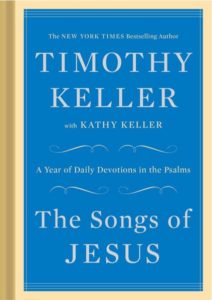 By the way, speaking of Keller, I have been re-reading many of the entries in his year-long devotion, done with his wife, Kathy, called The Songs of Jesus: A Year of Daily Devotions in the Psalms (Viking; $19.95.) It is so good, and would make a perfect gift for some of the people on your list. There are gold-gilded edges, a nice ribbon marker, some classy touches (such as two color printing.) It is a compact sized so there isn’t that much content on the pages, and it feels like a classic, classy prayer book. I like what they do with the Psalter and wanted to remind you of it.
By the way, speaking of Keller, I have been re-reading many of the entries in his year-long devotion, done with his wife, Kathy, called The Songs of Jesus: A Year of Daily Devotions in the Psalms (Viking; $19.95.) It is so good, and would make a perfect gift for some of the people on your list. There are gold-gilded edges, a nice ribbon marker, some classy touches (such as two color printing.) It is a compact sized so there isn’t that much content on the pages, and it feels like a classic, classy prayer book. I like what they do with the Psalter and wanted to remind you of it. Paul: A Biography N. T. Wright (HarperOne) $29.99 Okay, I’ll just say it. We are huge fans and even friends with Tom Wright and we are very big on getting his books known. Some think he’s too conservative, some think he’s too liberal, and to those who have heard this, I’d say it is mostly nonsense. Sure, not everyone will agree with all of his methods or conclusions, but he simply ought not be dismissed so easily. Plus, he not only brings some very fresh thinking to the conversation, he is a fine, fine writer. In our 36 years of bookselling, there has been no Biblical scholar that has thrilled us more.
Paul: A Biography N. T. Wright (HarperOne) $29.99 Okay, I’ll just say it. We are huge fans and even friends with Tom Wright and we are very big on getting his books known. Some think he’s too conservative, some think he’s too liberal, and to those who have heard this, I’d say it is mostly nonsense. Sure, not everyone will agree with all of his methods or conclusions, but he simply ought not be dismissed so easily. Plus, he not only brings some very fresh thinking to the conversation, he is a fine, fine writer. In our 36 years of bookselling, there has been no Biblical scholar that has thrilled us more. For THREE DAYS ONLY (this deal only lasts until Thursday night, December 6th 2018, at midnight) we’ll give you a free book by the fabulously energetic and funny and serious speaker,
For THREE DAYS ONLY (this deal only lasts until Thursday night, December 6th 2018, at midnight) we’ll give you a free book by the fabulously energetic and funny and serious speaker,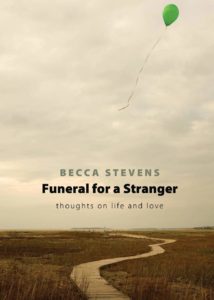 Funeral for a Stranger is a wonderful collection of some excellent miscellaneous essays. Becca is an excellent writer, a master of the short form, a good writer and born storyteller… some of her other books are devotional in nature, collections of short reflections and strong, prayerful meditations. Funeral… covers all sorts of territory and is sure to thrill anyone who likes good writing, spiritual ruminations on life and times, love and life. As a justice activist she brings a bit of bite at times but as a pastor and congregational leader she knows how to offer good words for the spiritual journey. It is an excellent book. And you can get it free.
Funeral for a Stranger is a wonderful collection of some excellent miscellaneous essays. Becca is an excellent writer, a master of the short form, a good writer and born storyteller… some of her other books are devotional in nature, collections of short reflections and strong, prayerful meditations. Funeral… covers all sorts of territory and is sure to thrill anyone who likes good writing, spiritual ruminations on life and times, love and life. As a justice activist she brings a bit of bite at times but as a pastor and congregational leader she knows how to offer good words for the spiritual journey. It is an excellent book. And you can get it free.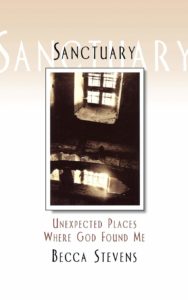 OR, if you’d rather, as we’ve said, we can send for free an earlier book, Sanctuary: Unexpected Places Where God Found Me. Again, this is Becca Stevens in her wheelhouse, offering artfully written creative meditations, short reflections that bring us into that quiet place of soul sanctuary with God. It is a great read with each entry a story of a place (often a surprising place) where she discovered God’s presence afresh. The Funeral for a Stranger one includes various sorts of thoughtful essays and they are a delight to read and very insightful. Sanctuary has equally moving stories and meditations but the pieces are shorter and arranged as a daily devotional, each one about the spirituality of the ordinary and meeting God in some particular episode or place.
OR, if you’d rather, as we’ve said, we can send for free an earlier book, Sanctuary: Unexpected Places Where God Found Me. Again, this is Becca Stevens in her wheelhouse, offering artfully written creative meditations, short reflections that bring us into that quiet place of soul sanctuary with God. It is a great read with each entry a story of a place (often a surprising place) where she discovered God’s presence afresh. The Funeral for a Stranger one includes various sorts of thoughtful essays and they are a delight to read and very insightful. Sanctuary has equally moving stories and meditations but the pieces are shorter and arranged as a daily devotional, each one about the spirituality of the ordinary and meeting God in some particular episode or place.
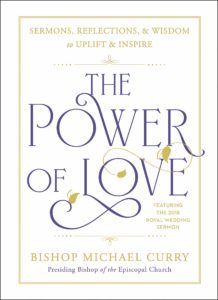 The Power of Love: Sermons, Reflections & Wisdom to Uplift and Inspire Bishop Michael Curry (Avery) $20.00 What a great little gift book this would make, ideal to give to unchurched folks, even. Who didn’t hear about the extraordinary sermon preached at the 2018 Royal Wedding? It certainly went viral. That sermon about Christian love is here along with other important messages delivered by this energetic black preacher. Rev. Curry (who has a little paperback about robust discipleship called Crazy Christians and a memoir called Songs My Mama Taught Me) is the Presiding Bishop of the Episcopal Church. One of the great talks reproduced here is a message he gave to their annual conference called “The Good Life” and it is good for anyone! Another was given at the National Cathedral – “Welcome to the Movement.”
The Power of Love: Sermons, Reflections & Wisdom to Uplift and Inspire Bishop Michael Curry (Avery) $20.00 What a great little gift book this would make, ideal to give to unchurched folks, even. Who didn’t hear about the extraordinary sermon preached at the 2018 Royal Wedding? It certainly went viral. That sermon about Christian love is here along with other important messages delivered by this energetic black preacher. Rev. Curry (who has a little paperback about robust discipleship called Crazy Christians and a memoir called Songs My Mama Taught Me) is the Presiding Bishop of the Episcopal Church. One of the great talks reproduced here is a message he gave to their annual conference called “The Good Life” and it is good for anyone! Another was given at the National Cathedral – “Welcome to the Movement.”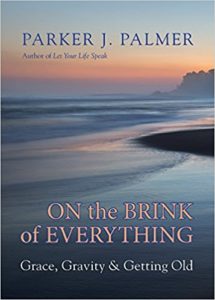 On the Brink of Everything: Grace, Gravity & Getting Old Parker J. Palmer (Berret Koehler) $19.95 What a handsome, compact, beautifully written, nearly serene study of wholehearted living as we move into older age, becoming mentors and guides to others. Parker Palmer is nearly a public intellectual and has written about contemplative living, about public civility, about higher education. I hope you know his book about education, and certainly his wonderful book about vocation. As the Quaker gentleman and activist ages, gracefully, he is ruminating on the lightness of being and yet the gravity of the era. If you liked Rohr’s Falling Upward this would thrill you, I’m sure. Rohr, in fact, calls it “a generous gift to all of us.”
On the Brink of Everything: Grace, Gravity & Getting Old Parker J. Palmer (Berret Koehler) $19.95 What a handsome, compact, beautifully written, nearly serene study of wholehearted living as we move into older age, becoming mentors and guides to others. Parker Palmer is nearly a public intellectual and has written about contemplative living, about public civility, about higher education. I hope you know his book about education, and certainly his wonderful book about vocation. As the Quaker gentleman and activist ages, gracefully, he is ruminating on the lightness of being and yet the gravity of the era. If you liked Rohr’s Falling Upward this would thrill you, I’m sure. Rohr, in fact, calls it “a generous gift to all of us.”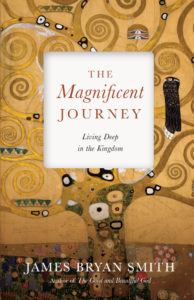 The Magnificent Journey: Living Deep in the Kingdom James Bryan Smith (formatio/IVP) $22.00 We love having especially attractive books to prop up on a nice shelf when we’re out and about, and we featured this, right next to Smith’s previous one called The Magnificent Story, which also has a striking die cut cover. You may know of James Bryan Smith who writes books about spirituality and spiritual disciplines – think Ruth Haley Barton or Richard Foster or Dallas Willard. His previous trilogy continues to sell well (The Good and Beautiful God, The Good and Beautiful Life, and The Good and Beautiful Community) and these two new ones are equally good.
The Magnificent Journey: Living Deep in the Kingdom James Bryan Smith (formatio/IVP) $22.00 We love having especially attractive books to prop up on a nice shelf when we’re out and about, and we featured this, right next to Smith’s previous one called The Magnificent Story, which also has a striking die cut cover. You may know of James Bryan Smith who writes books about spirituality and spiritual disciplines – think Ruth Haley Barton or Richard Foster or Dallas Willard. His previous trilogy continues to sell well (The Good and Beautiful God, The Good and Beautiful Life, and The Good and Beautiful Community) and these two new ones are equally good.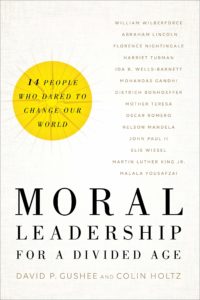 Moral Leadership for a Divided Age: 14 People Who Dared to Change Our World David Gushee & Colin Holtz (Brazos Press) $25.99 What a great, urgent read – informative and inspiring – and what a great gift this would make. Who among us doesn’t desire to have greater capacity to offer moral guidance in whatever space we find ourselves? Who doesn’t want to know a bit about how great change has happened in the past and how leaders have marshaled their leadership abilities to speak to the issues of the day? There are books about leadership and there are books about social change and there are books about character formation but this bring it all together as Gushee – himself an ethicist who has learned to speak out and pay up with integrity in aces – and his co-writer studies great moral leaders, their character and their ability to lead.
Moral Leadership for a Divided Age: 14 People Who Dared to Change Our World David Gushee & Colin Holtz (Brazos Press) $25.99 What a great, urgent read – informative and inspiring – and what a great gift this would make. Who among us doesn’t desire to have greater capacity to offer moral guidance in whatever space we find ourselves? Who doesn’t want to know a bit about how great change has happened in the past and how leaders have marshaled their leadership abilities to speak to the issues of the day? There are books about leadership and there are books about social change and there are books about character formation but this bring it all together as Gushee – himself an ethicist who has learned to speak out and pay up with integrity in aces – and his co-writer studies great moral leaders, their character and their ability to lead.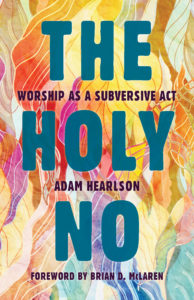 Adam Hearlson (Eerdmans) $24.00 Hearlson is an ordained minister in the United Church of Christ and I thought these pastors who tend to be progressive politically would love this reminder that to say “yes” to God in worship necessarily means a “no” to other rulers, other regimes, other claims on our ultimate allegiance. Surely we can’t forget (or think we know enough about) Barman and Bonhoeffer and others who worshipped well with a high Christology and saw the subversive power of that worship to delegitimize the principalities and powers.
Adam Hearlson (Eerdmans) $24.00 Hearlson is an ordained minister in the United Church of Christ and I thought these pastors who tend to be progressive politically would love this reminder that to say “yes” to God in worship necessarily means a “no” to other rulers, other regimes, other claims on our ultimate allegiance. Surely we can’t forget (or think we know enough about) Barman and Bonhoeffer and others who worshipped well with a high Christology and saw the subversive power of that worship to delegitimize the principalities and powers.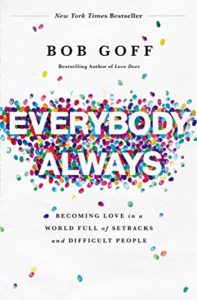 Everybody Always: Becoming Love in a World Full of Setbacks and Difficult People Bob Goff (Thomas Nelson) $16.99 Okay, we announce this everywhere we go, tell folks about it hither and yon, and love explaining that it is fun and funny and adventurous and full of capers and stories and some pretty clear-headed ideas about God’s love and follow Jesus, bit by bit. Since Becca Stephens was doing heavy talks about the prophetic power of love and justice work, it seemed more than appropriate to shout out to Goff. It’s a great book for older Christian who need fresh shot in the arm, recalling what it’s all about, and it’s ideal for those not quite up for heady theological reading. Like his wonderful, popular Love Does, the new Everybody Always is a great book for anyone.
Everybody Always: Becoming Love in a World Full of Setbacks and Difficult People Bob Goff (Thomas Nelson) $16.99 Okay, we announce this everywhere we go, tell folks about it hither and yon, and love explaining that it is fun and funny and adventurous and full of capers and stories and some pretty clear-headed ideas about God’s love and follow Jesus, bit by bit. Since Becca Stephens was doing heavy talks about the prophetic power of love and justice work, it seemed more than appropriate to shout out to Goff. It’s a great book for older Christian who need fresh shot in the arm, recalling what it’s all about, and it’s ideal for those not quite up for heady theological reading. Like his wonderful, popular Love Does, the new Everybody Always is a great book for anyone.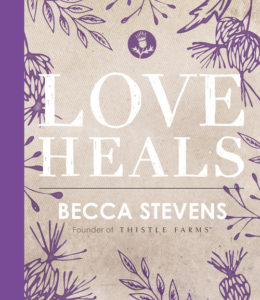 Love Heals Becca Stevens (Thomas Nelson) $15.99 Do you recall us sharing about this fabulously artful, very handsome book? It was one of our grand titles that we pushed when it first came out and we were so pleased to be able to say it was lush and lovely – full color photos of flowers and dishes and natures scenes – and, yes, thistles – and yet it has exceptional substance. Her work at Thistle Farms – offering dignity and jobs to women off the street, freed from domestic violence or trafficking or drugs – animates her deep, deep conviction that love is the answer. Yes, their teashop and Thistle Farms essential oils and hand lotions and international gifts are branded with the saying “love heals” but for them it is gospel truth. This book is about hope and community and justice and grace and goodness and beauty.
Love Heals Becca Stevens (Thomas Nelson) $15.99 Do you recall us sharing about this fabulously artful, very handsome book? It was one of our grand titles that we pushed when it first came out and we were so pleased to be able to say it was lush and lovely – full color photos of flowers and dishes and natures scenes – and, yes, thistles – and yet it has exceptional substance. Her work at Thistle Farms – offering dignity and jobs to women off the street, freed from domestic violence or trafficking or drugs – animates her deep, deep conviction that love is the answer. Yes, their teashop and Thistle Farms essential oils and hand lotions and international gifts are branded with the saying “love heals” but for them it is gospel truth. This book is about hope and community and justice and grace and goodness and beauty.
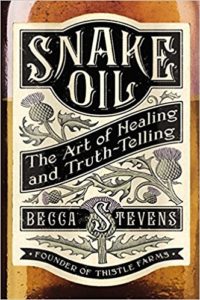 Snake Oil: The Art of Healing and Truth-Telling Becca Stevens (Jericho Books) $15.00 What a read! This is her memoir, a ground-breaking story about her own life, losing her father (a beloved Episcopal priest himself), her abuse in the church she now loves, and her transformation as she learned to serve others and live in hope. Yep, she speaks truth, here, and it is a very good book.
Snake Oil: The Art of Healing and Truth-Telling Becca Stevens (Jericho Books) $15.00 What a read! This is her memoir, a ground-breaking story about her own life, losing her father (a beloved Episcopal priest himself), her abuse in the church she now loves, and her transformation as she learned to serve others and live in hope. Yep, she speaks truth, here, and it is a very good book.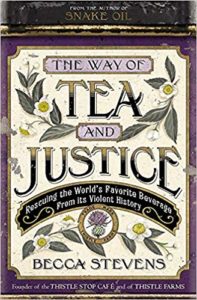 The Way of Tea and Justice: Rescuing the World’s Favorite Beverage from Its Violent History Becca Stevens (Jericho Books) $16.00 I wished Becca could have been at the clergy retreat longer as I’d have loved to hear her tell some of this story. We read – and promoted (hear! hear!) – this book when it first came out. It’s a nice paperback now. As I announced in my little book pitch at the clergy event last week, there are a number of good books on fair trade coffee which has sort of lead the way to helping consumers think about ethically sourcing their shopping choices. But there hasn’t been as much written about what we might call fair trade tea and here Becca tells a story both inspiring and daunting. What a story, how informative, how interesting – a justice-oriented travelogue.
The Way of Tea and Justice: Rescuing the World’s Favorite Beverage from Its Violent History Becca Stevens (Jericho Books) $16.00 I wished Becca could have been at the clergy retreat longer as I’d have loved to hear her tell some of this story. We read – and promoted (hear! hear!) – this book when it first came out. It’s a nice paperback now. As I announced in my little book pitch at the clergy event last week, there are a number of good books on fair trade coffee which has sort of lead the way to helping consumers think about ethically sourcing their shopping choices. But there hasn’t been as much written about what we might call fair trade tea and here Becca tells a story both inspiring and daunting. What a story, how informative, how interesting – a justice-oriented travelogue.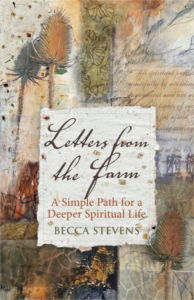 Letters from the Farm: A Simple Path for a Deeper Spiritual Life Becca Stevens (Morehouse Publishing) $18.95 What a great idea for a book. These are letters Rev. Becca sent out to various folks; to be honest, I don’t know (or even care) if they are real letters or a device to arrange a book of spiritual guidance. It’s a classic form – you know, even the always wise and eloquent Eugene Peterson has such a book, which, frankly, isn’t as substantial as this. So it’s a set of letters all about encouragement in the way of love. Some of these are about social issues – extolling the reader to greater care and action – and others are gentle, luscious, lovely.
Letters from the Farm: A Simple Path for a Deeper Spiritual Life Becca Stevens (Morehouse Publishing) $18.95 What a great idea for a book. These are letters Rev. Becca sent out to various folks; to be honest, I don’t know (or even care) if they are real letters or a device to arrange a book of spiritual guidance. It’s a classic form – you know, even the always wise and eloquent Eugene Peterson has such a book, which, frankly, isn’t as substantial as this. So it’s a set of letters all about encouragement in the way of love. Some of these are about social issues – extolling the reader to greater care and action – and others are gentle, luscious, lovely.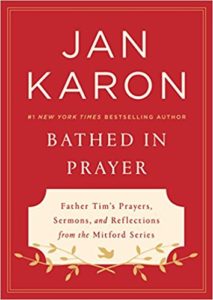 Bathed in Prayer: Father Tim’s Prayers, Sermons, and Reflections from the Mitford Series Jan Karon (Penguin) $20.00 When we announced this a month ago a few customers were just tickled – what fun! This is a collection of various sermons and prayers by the fictional Father Tim of the beloved Jan Karon Mitford novels. Ms. Karon adds some of her own reflections about the inspirational parts of the stories and her own hopes and prayers. This is a lovely, real, book of devotion and prayer, even if from the pen of a storyteller. What fun.
Bathed in Prayer: Father Tim’s Prayers, Sermons, and Reflections from the Mitford Series Jan Karon (Penguin) $20.00 When we announced this a month ago a few customers were just tickled – what fun! This is a collection of various sermons and prayers by the fictional Father Tim of the beloved Jan Karon Mitford novels. Ms. Karon adds some of her own reflections about the inspirational parts of the stories and her own hopes and prayers. This is a lovely, real, book of devotion and prayer, even if from the pen of a storyteller. What fun.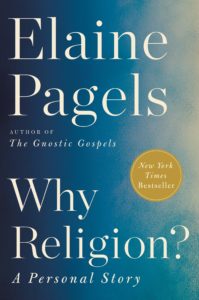 Why Religion?: A Personal Story Elaine Pagels (Ecco/HarperCollins) $27.99 Maybe this didn’t sell that well at the Episcopal gig because I didn’t push it as much as I might have; I guess we assumed they would naturally be interested, especially after that fascinating NPR Fresh Air interview a week or two ago. I suppose I’m just not that interested, to be honest, about her admittedly significant work on everything from Adam and Eve to the history of ideas about Satan. She’s known as a scholar of Gnosticism (a heresy I despise) and here she tells her own faith journey, such as it may be. She is a major intellectual in our time, so the book should sell well.
Why Religion?: A Personal Story Elaine Pagels (Ecco/HarperCollins) $27.99 Maybe this didn’t sell that well at the Episcopal gig because I didn’t push it as much as I might have; I guess we assumed they would naturally be interested, especially after that fascinating NPR Fresh Air interview a week or two ago. I suppose I’m just not that interested, to be honest, about her admittedly significant work on everything from Adam and Eve to the history of ideas about Satan. She’s known as a scholar of Gnosticism (a heresy I despise) and here she tells her own faith journey, such as it may be. She is a major intellectual in our time, so the book should sell well.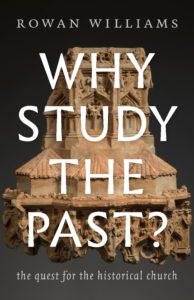 Why Study the Past? The Quest for the Historical Church Rowan Williams (Eerdmans) $18.00 I suppose I shouldn’t assume that every Episcopalian or liturgically sensible, globally-minded Christian likes the former Archbishop of Canterbury, but, man – this shoulda flown off the shelves! What a great little book — rich, deep, mature, about history and historiography, about why the past matters, about how older eras of the church should be informing us in some way (but maybe not others?)
Why Study the Past? The Quest for the Historical Church Rowan Williams (Eerdmans) $18.00 I suppose I shouldn’t assume that every Episcopalian or liturgically sensible, globally-minded Christian likes the former Archbishop of Canterbury, but, man – this shoulda flown off the shelves! What a great little book — rich, deep, mature, about history and historiography, about why the past matters, about how older eras of the church should be informing us in some way (but maybe not others?)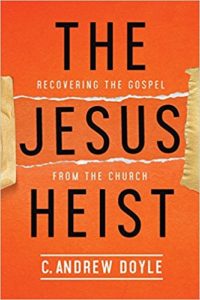 The Jesus Heist: Recovering the Gospel From the Church C. Andrew Doyle (Church Publishing) $18.00 Okay, I dig this guy, and I like this book. I wish I had pushed it harder among my mainline denominational friends this year – we announced it when it came out a year ago and have taken it to various events. Look, we need to own up to this weird place we are in these days. (I don’t mean to caricature or offend.) When I was coming up into Christian leadership – the last quarter of the 20th century — the debate was between liberal theologians who created boring churches that didn’t believe much of anything, certainly nothing worth giving one’s life to, and evangelical churches that were passionate and sure and earnest and right about the first things of the gospel but too often dumb and shallow and oddly politically reactionary. Alas, now the books coming out of “liberal” theological traditions are more Biblical than much coming out of the hip evangelical culture. Oh, how the times have changed. So here, a progressive Bishop of a liberal denomination asks us to flip the script of many Bible stories and see what Jesus is really doing, inviting us to come to a deeper trust in His revolutionary Kingdom. This is what is good about mainline churches – they can preach a non-fundamentalist call back to Jesus and bitch about how we’ve missed Him in all our religiosity and get away with it. Yep, on both the right and left, evangelical and mainline, it seems Jesus has been too often ignored, the gospel domesticated, Jesus hijacked, if not stolen. I love the title of this.
The Jesus Heist: Recovering the Gospel From the Church C. Andrew Doyle (Church Publishing) $18.00 Okay, I dig this guy, and I like this book. I wish I had pushed it harder among my mainline denominational friends this year – we announced it when it came out a year ago and have taken it to various events. Look, we need to own up to this weird place we are in these days. (I don’t mean to caricature or offend.) When I was coming up into Christian leadership – the last quarter of the 20th century — the debate was between liberal theologians who created boring churches that didn’t believe much of anything, certainly nothing worth giving one’s life to, and evangelical churches that were passionate and sure and earnest and right about the first things of the gospel but too often dumb and shallow and oddly politically reactionary. Alas, now the books coming out of “liberal” theological traditions are more Biblical than much coming out of the hip evangelical culture. Oh, how the times have changed. So here, a progressive Bishop of a liberal denomination asks us to flip the script of many Bible stories and see what Jesus is really doing, inviting us to come to a deeper trust in His revolutionary Kingdom. This is what is good about mainline churches – they can preach a non-fundamentalist call back to Jesus and bitch about how we’ve missed Him in all our religiosity and get away with it. Yep, on both the right and left, evangelical and mainline, it seems Jesus has been too often ignored, the gospel domesticated, Jesus hijacked, if not stolen. I love the title of this.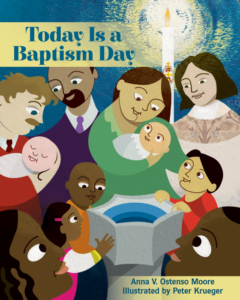 Today is a Baptism Day Anna V. Ostenson Moore, illustrated by Peter Krueger (Church Publishing) $13.95 Not sure how this happened but I intended to rave about this from up front at our retreat and celebrate Church Publishing (an Episcopalian publishing house) doing great books just like this. Alas, we forgot to take it and left a whole big stack of them back at the shop. So, we announce it here, wanting you to know it is really interesting, a captivating, poetic sort of read full of mainline church theology, innovative, creative pictures (of all kinds of people and all kinds of families, thanks be to God!)
Today is a Baptism Day Anna V. Ostenson Moore, illustrated by Peter Krueger (Church Publishing) $13.95 Not sure how this happened but I intended to rave about this from up front at our retreat and celebrate Church Publishing (an Episcopalian publishing house) doing great books just like this. Alas, we forgot to take it and left a whole big stack of them back at the shop. So, we announce it here, wanting you to know it is really interesting, a captivating, poetic sort of read full of mainline church theology, innovative, creative pictures (of all kinds of people and all kinds of families, thanks be to God!)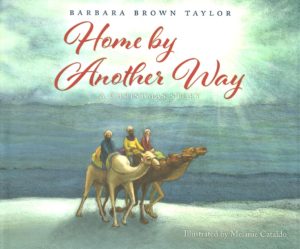 Home By Another Way: A Christmas Story Barbara Brown Taylor, illustrated by Melanie Cataldo (Flyway Books) $18.00 I’m sure you know we’ve touted this before – it came out earlier this fall and we were just thrilled to see a popular sermon by the always eloquent Barbara Brown Taylor re-told as a children’s sermon, and lavishly illustrated with an amazing, creative, whimsical, passionate artists.
Home By Another Way: A Christmas Story Barbara Brown Taylor, illustrated by Melanie Cataldo (Flyway Books) $18.00 I’m sure you know we’ve touted this before – it came out earlier this fall and we were just thrilled to see a popular sermon by the always eloquent Barbara Brown Taylor re-told as a children’s sermon, and lavishly illustrated with an amazing, creative, whimsical, passionate artists.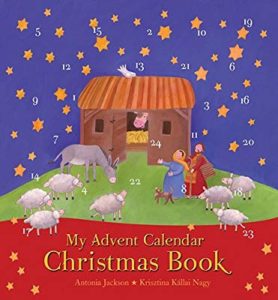 My Advent Calendar Christmas Book Antonia Jackson & Krisztina Hallai Nagy (Lion Press) $7.99 Lion Press from the UK is a favorite (favourite) children’s publisher and we were glad to discover this little gem. It is a fairly standard little book telling the story of the nativity except the cover of the book is itself a 23-day, open-a-flap-a-day Advent Calendar. The entire Christmas story is here, from annunciation to the flight to Egypt and it’s fine. But the joy is opening the little flaps and awaiting each day’s surprise. The book is 6.5″ x 6″ and the advent flaps are small. We have more conventional Advent calendars, by the way, Give us a call if we can tell you about some.
My Advent Calendar Christmas Book Antonia Jackson & Krisztina Hallai Nagy (Lion Press) $7.99 Lion Press from the UK is a favorite (favourite) children’s publisher and we were glad to discover this little gem. It is a fairly standard little book telling the story of the nativity except the cover of the book is itself a 23-day, open-a-flap-a-day Advent Calendar. The entire Christmas story is here, from annunciation to the flight to Egypt and it’s fine. But the joy is opening the little flaps and awaiting each day’s surprise. The book is 6.5″ x 6″ and the advent flaps are small. We have more conventional Advent calendars, by the way, Give us a call if we can tell you about some. A Jesus Christmas: Exploring God’s Amazing Plan for Christmas Barbara Reaoch (The Good Book Company) $9.99 I like the cool, slightly contemporary look and design of Good Book Company products and this little family workbook is no exception. Ms. Reaoch is known in “Bible Study Fellowship” for those that know that great ministry, and it should convince you that she is careful about Bible study, about application, about seeing how all things cohere in the message of Christ’s gospel. These short daily studies can help your family get excited about a fresh way to prepare for Christmas by taking a look at one of the serpent’s lies (from Genesis 3) and the ways in which the glorious truths of God’s redemptive plan play out. Joni Eareckson Tada says it is “just what fathers
A Jesus Christmas: Exploring God’s Amazing Plan for Christmas Barbara Reaoch (The Good Book Company) $9.99 I like the cool, slightly contemporary look and design of Good Book Company products and this little family workbook is no exception. Ms. Reaoch is known in “Bible Study Fellowship” for those that know that great ministry, and it should convince you that she is careful about Bible study, about application, about seeing how all things cohere in the message of Christ’s gospel. These short daily studies can help your family get excited about a fresh way to prepare for Christmas by taking a look at one of the serpent’s lies (from Genesis 3) and the ways in which the glorious truths of God’s redemptive plan play out. Joni Eareckson Tada says it is “just what fathers  and mothers are looking for.” I hope that is true. Donald Whitney writes, “If you have young children and you want to make this Christmas more of a ‘Jesus Christmas’ than last year, try this book.” It includes space for family journaling, too. Nicely done, for sure.
and mothers are looking for.” I hope that is true. Donald Whitney writes, “If you have young children and you want to make this Christmas more of a ‘Jesus Christmas’ than last year, try this book.” It includes space for family journaling, too. Nicely done, for sure. The Shepherd Who Couldn’t Sing Alan Barker, illustrations by Thea Baker (SPCK) $9.00 I really like the illustrations that are rich and warm, creative without being eccentric. There are fabric patterns through-out that are striking, and some water-color washes that are very artful. So I’m a fan of this paperback — even its paper stock and size (about 9 x 10) seems just right. The story is fun; it is about Jake the shepherd boy on the hills of Bethlehem who, er, can’t sing. Can he find his voice and join in the angels given the momentous good news he has just witnessed? He is so brave about so many things but he is afraid of singing! The author tells us at the end that it was inspired by Caedmon who learned to sing. (He even gives a little song to sing to the tune of Frere Jacques called, of course “Jake’s Song.”) Jake’s plight is a creative way into the Bible story, but it raises this other concern, of not being afraid to sing, to find one’s voice in the choir, to stand up and sing-out. Nice.
The Shepherd Who Couldn’t Sing Alan Barker, illustrations by Thea Baker (SPCK) $9.00 I really like the illustrations that are rich and warm, creative without being eccentric. There are fabric patterns through-out that are striking, and some water-color washes that are very artful. So I’m a fan of this paperback — even its paper stock and size (about 9 x 10) seems just right. The story is fun; it is about Jake the shepherd boy on the hills of Bethlehem who, er, can’t sing. Can he find his voice and join in the angels given the momentous good news he has just witnessed? He is so brave about so many things but he is afraid of singing! The author tells us at the end that it was inspired by Caedmon who learned to sing. (He even gives a little song to sing to the tune of Frere Jacques called, of course “Jake’s Song.”) Jake’s plight is a creative way into the Bible story, but it raises this other concern, of not being afraid to sing, to find one’s voice in the choir, to stand up and sing-out. Nice.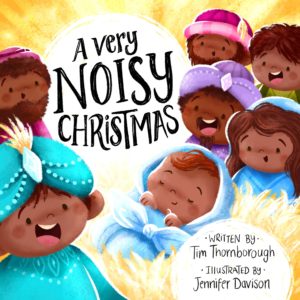 A Very Noisy Christmas Tim Thornborough, illustrations by Jennifer Davison (The Good Book Company) $4.99 This is another winner from The Good Book Company, a gospel-centered company that provides really attractive books that are clear about gospel truth. We stock all of their children’s books. This one is really inexpensive, has artwork that features non-European-looking characters, whimsical as they are. It is designed to be read out loud, it playfully instructs you (even by the size and shape of the particular font) to whisper some sentences and to really shout out other parts. Fun! Most parents and children will get a kick out of doing this together (probably over and over!) How loud can you shout? How quietly can you whisper? The first Christmas was both quiet and noisy, after all (and the birth of Jesus is worth shouting about!)
A Very Noisy Christmas Tim Thornborough, illustrations by Jennifer Davison (The Good Book Company) $4.99 This is another winner from The Good Book Company, a gospel-centered company that provides really attractive books that are clear about gospel truth. We stock all of their children’s books. This one is really inexpensive, has artwork that features non-European-looking characters, whimsical as they are. It is designed to be read out loud, it playfully instructs you (even by the size and shape of the particular font) to whisper some sentences and to really shout out other parts. Fun! Most parents and children will get a kick out of doing this together (probably over and over!) How loud can you shout? How quietly can you whisper? The first Christmas was both quiet and noisy, after all (and the birth of Jesus is worth shouting about!) Home By Another Way Barbara Brown Taylor, illustrations by Melanie Cataldo (Flyaway Books) $18.00 When one of our most beloved and interesting preachers and writers teams up with an excellent, talented illustrator to re-tell one of her famous seasonal sermons, you’d expected it to be much anticipated and much discussed. And this certainly is. Surely one of the most beautifully-illustrated children’s books of the year, it is great addition to the library of anyone who collects Christmas books. It’s a bit odd, even funny at times, but so many holiday books are. It’s part of the fun, I think, re-telling and re-imagining these great, classic stories. And how she puts us right onto the quirky camel rides of these three mystics from the East.
Home By Another Way Barbara Brown Taylor, illustrations by Melanie Cataldo (Flyaway Books) $18.00 When one of our most beloved and interesting preachers and writers teams up with an excellent, talented illustrator to re-tell one of her famous seasonal sermons, you’d expected it to be much anticipated and much discussed. And this certainly is. Surely one of the most beautifully-illustrated children’s books of the year, it is great addition to the library of anyone who collects Christmas books. It’s a bit odd, even funny at times, but so many holiday books are. It’s part of the fun, I think, re-telling and re-imagining these great, classic stories. And how she puts us right onto the quirky camel rides of these three mystics from the East. This story is about the wise men and their journey to meet the Christ child (and, of course, their anxiously freighted meeting with the dangerous Herod.) Some have found it a bit unusual, describing the characters in such odd detail. Others have thought it unfortunate how small of a role the holy family plays, but, again, it gets at that story by way of describing in artful prose the journey of the wise guys. And yet, wordsmith that Taylor is, she tells of how their lives are touched as they hold the baby close. This encounter will surely transform their lives even if the teller of the tale does not spell it out for us. That is BBT’s theory about preaching, I believe — don’t say too much, allow some time for “I wonder” type questions, don’t be too didactic: the power is in the story, after all. So this ought not be the only book to read to children about Christmas; obviously. And — please — realize it is to be read after Christmas, of course. The imaginative story is a fascinating one, glorious in its own way,
This story is about the wise men and their journey to meet the Christ child (and, of course, their anxiously freighted meeting with the dangerous Herod.) Some have found it a bit unusual, describing the characters in such odd detail. Others have thought it unfortunate how small of a role the holy family plays, but, again, it gets at that story by way of describing in artful prose the journey of the wise guys. And yet, wordsmith that Taylor is, she tells of how their lives are touched as they hold the baby close. This encounter will surely transform their lives even if the teller of the tale does not spell it out for us. That is BBT’s theory about preaching, I believe — don’t say too much, allow some time for “I wonder” type questions, don’t be too didactic: the power is in the story, after all. So this ought not be the only book to read to children about Christmas; obviously. And — please — realize it is to be read after Christmas, of course. The imaginative story is a fascinating one, glorious in its own way, 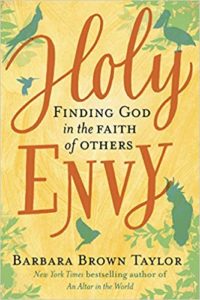 drawing on a famous old sermon by the former Episcopal pastor.
drawing on a famous old sermon by the former Episcopal pastor.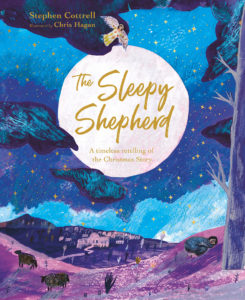 The Sleepy Shepherd: A Timeless Retelling of the Christmas Story Stephen Cottrell, illustrations by Chris Hagan (SPCK) $10.00 Kudos to our friends at InterVarsity Press for picking up some of these SPCK British books from overseas and making them easily available in the States. This is a fun and funny story and I like it not only because the writing is good but because the art is a bit more eccentric and zesty than some. I don’t always think young children resonate with mature modernist or abstract art, but this is wildly creative without obscuring the content of the story. It does what good art can do — revealing something formerly missed. If only to generate a fresh and invigorated gaze, this book is just so interesting.
The Sleepy Shepherd: A Timeless Retelling of the Christmas Story Stephen Cottrell, illustrations by Chris Hagan (SPCK) $10.00 Kudos to our friends at InterVarsity Press for picking up some of these SPCK British books from overseas and making them easily available in the States. This is a fun and funny story and I like it not only because the writing is good but because the art is a bit more eccentric and zesty than some. I don’t always think young children resonate with mature modernist or abstract art, but this is wildly creative without obscuring the content of the story. It does what good art can do — revealing something formerly missed. If only to generate a fresh and invigorated gaze, this book is just so interesting.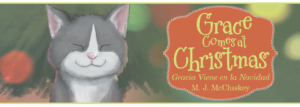
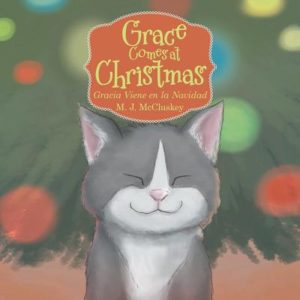 Grace Comes at Christmas: Gracias Viene en la Navidad M. J. McCluskey, illustrations by Sierra Mon Ann Vidal (Balboa Press) $15.95 We are especially excited to tell you about this new English/Spanish bi-lingual book, and we recommend it for a couple of reasons. Not least is that we know the author, a friend and customer who is a local Lutheran congregant and respected community volunteer. And a bundle of good energy, which she uses to make her corner a bit brighter, like the cat — named, Grace, of course (did I mention she is Lutheran?) — who is the star of this sweet holiday story. The story unfolds as we learn what happens to the little kitten who finds herself alone in a freezing field on Christmas Eve. You might imagine what occurs when she sees a light on the top of the hill and hears music (although there are toils and dangers throughout until the lovely, hospitable climax.)
Grace Comes at Christmas: Gracias Viene en la Navidad M. J. McCluskey, illustrations by Sierra Mon Ann Vidal (Balboa Press) $15.95 We are especially excited to tell you about this new English/Spanish bi-lingual book, and we recommend it for a couple of reasons. Not least is that we know the author, a friend and customer who is a local Lutheran congregant and respected community volunteer. And a bundle of good energy, which she uses to make her corner a bit brighter, like the cat — named, Grace, of course (did I mention she is Lutheran?) — who is the star of this sweet holiday story. The story unfolds as we learn what happens to the little kitten who finds herself alone in a freezing field on Christmas Eve. You might imagine what occurs when she sees a light on the top of the hill and hears music (although there are toils and dangers throughout until the lovely, hospitable climax.)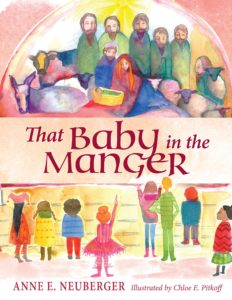 That Baby in the Manger Anne E, Neuberger, illustrations by Chloe E. Pitkoff (Paraclete Press) $15.99 This was a best seller for us last year so we wanted to name it again. It is paperback with colorful, somewhat modern art, which makes it a beautiful sight to behold. It is just creative enough to provide allusive nuance to the portrayal but it isn’t odd or disorienting. That is, it is just a great visual treat. The story is more than a treat, it is nothing short of a profound blessing, nearly prophetic in its gentle but potent truth-telling.
That Baby in the Manger Anne E, Neuberger, illustrations by Chloe E. Pitkoff (Paraclete Press) $15.99 This was a best seller for us last year so we wanted to name it again. It is paperback with colorful, somewhat modern art, which makes it a beautiful sight to behold. It is just creative enough to provide allusive nuance to the portrayal but it isn’t odd or disorienting. That is, it is just a great visual treat. The story is more than a treat, it is nothing short of a profound blessing, nearly prophetic in its gentle but potent truth-telling.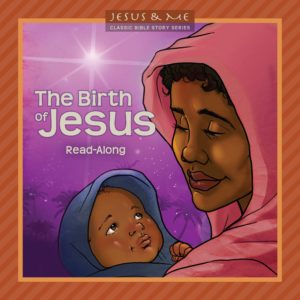 The Birth of Jesus Read-Along Regina Brundidge-Fuller, illustrations by Jeff West (Urban Spirit!) $6.99 We have bunches of inexpensive re-tellings of Bible stories and of course the Christmas story ones are as popular as any. It is so cool that at this time of year it isn’t uncommon to give out books about Jesus, and, to children, books about the birth of Jesus. Yes! Of course, it is a complicated matter to find books that retell the story well and that have illustrations that are well done and wise. For those that care about these things, we have this (and a few others) unique one published by Urban Spirit! who does ministry out of Atlanta, As you can see, most of the characters in these illustrations are black. (Interestingly, the angels are multi-ethnic, and Herod seems to be white, naturally.) I do not want to say these are only for the African American market – nearly every church nursery in American has Bible stories of Jesus or Bible characters looking white. Why not supplement your church or family library with something like this. Certainly is is designed for African American children, but we’re happy to suggest it to all sorts of families and churches. They are well done.
The Birth of Jesus Read-Along Regina Brundidge-Fuller, illustrations by Jeff West (Urban Spirit!) $6.99 We have bunches of inexpensive re-tellings of Bible stories and of course the Christmas story ones are as popular as any. It is so cool that at this time of year it isn’t uncommon to give out books about Jesus, and, to children, books about the birth of Jesus. Yes! Of course, it is a complicated matter to find books that retell the story well and that have illustrations that are well done and wise. For those that care about these things, we have this (and a few others) unique one published by Urban Spirit! who does ministry out of Atlanta, As you can see, most of the characters in these illustrations are black. (Interestingly, the angels are multi-ethnic, and Herod seems to be white, naturally.) I do not want to say these are only for the African American market – nearly every church nursery in American has Bible stories of Jesus or Bible characters looking white. Why not supplement your church or family library with something like this. Certainly is is designed for African American children, but we’re happy to suggest it to all sorts of families and churches. They are well done.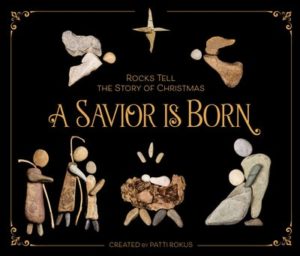 A Savior Is Born: Rocks Tell The Story of Christmas created by Patti Rokus (Zondervan) $17.99 I suppose this isn’t just a children’s book as the curious, artful presentation will make it an attractive coffee table book for anyone, or a unique gift for a person who might enjoy such a book. My wife collects little pebbles many places she goes as both memory stones and as decoration. It isn’t uncommon to find a few smooth stones or a pile of small rocks on a window sill or by my sock drawer. I’m sure she isn’t the only one who is intrigued by the aesthetic revelation of small stones. And so, I’m sure many will enjoy this simple book showing the Christmas story created by stones.
A Savior Is Born: Rocks Tell The Story of Christmas created by Patti Rokus (Zondervan) $17.99 I suppose this isn’t just a children’s book as the curious, artful presentation will make it an attractive coffee table book for anyone, or a unique gift for a person who might enjoy such a book. My wife collects little pebbles many places she goes as both memory stones and as decoration. It isn’t uncommon to find a few smooth stones or a pile of small rocks on a window sill or by my sock drawer. I’m sure she isn’t the only one who is intrigued by the aesthetic revelation of small stones. And so, I’m sure many will enjoy this simple book showing the Christmas story created by stones.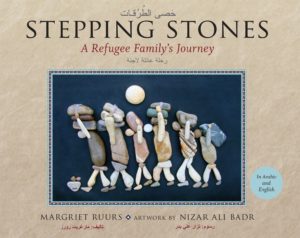 We have for several years promoted a breathtaking book with bi-lingual English and Arabic text about immigrants, where all the artwork is made with stones. It is called Stepping Stones: A Refugee Family’s Journey and was inspired by the stone artwork of Syrian artist Nizar Ali Badr, discovered by chance by Canadian children’s writer Margriet Ruurs. (Orca Books; $20.00.) That is nearly miraculous and very poignant.
We have for several years promoted a breathtaking book with bi-lingual English and Arabic text about immigrants, where all the artwork is made with stones. It is called Stepping Stones: A Refugee Family’s Journey and was inspired by the stone artwork of Syrian artist Nizar Ali Badr, discovered by chance by Canadian children’s writer Margriet Ruurs. (Orca Books; $20.00.) That is nearly miraculous and very poignant.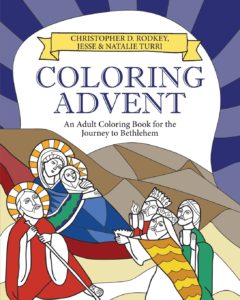 Coloring Advent: An Adult Coloring Book for the Journey to Bethlehem Christopher D. Rodkey and Jess & Natalie Turri (Chalice Press) $12.99 Speaking of adult books that kids can appreciate, this is pitched as an adult coloring book, and for good reason. As we explained a year ago (and, again, as we did with the sequel, Coloring Lent) Chris Rodkey is a friend and neighbor and a scholar/activist/pastor of a UCC church here in D-town. We are theologically dissimilar in many ways but I so admire his eagerness to do creative stuff and speak with theological depth into the issues of the day. And so, you should know that this coloring book is very intentionally created out of his progressive/radical sort of deeply theological worldview. It follows the lectionary readings for Advent, and so is very, very Biblical. There are little devotional sentences on each page which are footnoted so you can explore more of why the art is created as it is, and why the paraphrase of the lectionary texts are done as they are. Coloring Advent is ecumenical and provocative and is unlike any other more conventional adult coloring book, but, at the end of the day, it is designed for your own slow, creative, engagement with Sacred Scripture by way of working on your own sacred art.
Coloring Advent: An Adult Coloring Book for the Journey to Bethlehem Christopher D. Rodkey and Jess & Natalie Turri (Chalice Press) $12.99 Speaking of adult books that kids can appreciate, this is pitched as an adult coloring book, and for good reason. As we explained a year ago (and, again, as we did with the sequel, Coloring Lent) Chris Rodkey is a friend and neighbor and a scholar/activist/pastor of a UCC church here in D-town. We are theologically dissimilar in many ways but I so admire his eagerness to do creative stuff and speak with theological depth into the issues of the day. And so, you should know that this coloring book is very intentionally created out of his progressive/radical sort of deeply theological worldview. It follows the lectionary readings for Advent, and so is very, very Biblical. There are little devotional sentences on each page which are footnoted so you can explore more of why the art is created as it is, and why the paraphrase of the lectionary texts are done as they are. Coloring Advent is ecumenical and provocative and is unlike any other more conventional adult coloring book, but, at the end of the day, it is designed for your own slow, creative, engagement with Sacred Scripture by way of working on your own sacred art.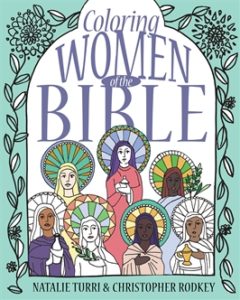 By the way, although, again, mostly for adults but suitable for some older kids, see the new Coloring Women of the Bible (Chalice Press; $14.99) also lovingly done by Rev. Chris Rodkey and Natalie Turri. It has some vital theological interpretation, brave portrayal of complicated Scriptural stories, and a section of pages to color the feminine images of God from the Bible. There is no other coloring book like it, that’s for sure; it would be fascinating to have younger teens or youth do it. I’ll write more about this later as it makes a great small gift (especially when paired with a pack of colored pencils.) Cheers.
By the way, although, again, mostly for adults but suitable for some older kids, see the new Coloring Women of the Bible (Chalice Press; $14.99) also lovingly done by Rev. Chris Rodkey and Natalie Turri. It has some vital theological interpretation, brave portrayal of complicated Scriptural stories, and a section of pages to color the feminine images of God from the Bible. There is no other coloring book like it, that’s for sure; it would be fascinating to have younger teens or youth do it. I’ll write more about this later as it makes a great small gift (especially when paired with a pack of colored pencils.) Cheers. Advent: The Once and Future Coming of Jesus Christ Fleming Rutledge (Eerdmans) $30.00 This is without a doubt the most talked about book about Advent in our memory, and for good reason. This sturdy 400+ page paperback volume is laden with Mrs. Rutledge’s legendary, richly theological, provocative (but always orthodox), meaty but persuasive sermons. There are some essays here, some Bible studies, other writings and sermons galore, for every special day of the season (and then some. As a serious Episcopalian, she’s included some special days I’ve never even heard of!) A few of the sermons are recent, some older, typed up from her old manuscripts — a labor of love! Those of us who have heard the Reverend Rutledge preach know how good she is. Those of us who have heard her lecture or met her in person know how gracious and interesting she is. Those who have read her books – from the extraordinary The Crucifixion: Understanding the Death of Jesus Christ to her excellent collections of sermons (one on preaching the Old Testament, one of sermons on Romans, one that is a general collection, one a study of Tolkien, one on the last words of Christ) – all know how wise and interesting and informative and valuable they are.
Advent: The Once and Future Coming of Jesus Christ Fleming Rutledge (Eerdmans) $30.00 This is without a doubt the most talked about book about Advent in our memory, and for good reason. This sturdy 400+ page paperback volume is laden with Mrs. Rutledge’s legendary, richly theological, provocative (but always orthodox), meaty but persuasive sermons. There are some essays here, some Bible studies, other writings and sermons galore, for every special day of the season (and then some. As a serious Episcopalian, she’s included some special days I’ve never even heard of!) A few of the sermons are recent, some older, typed up from her old manuscripts — a labor of love! Those of us who have heard the Reverend Rutledge preach know how good she is. Those of us who have heard her lecture or met her in person know how gracious and interesting she is. Those who have read her books – from the extraordinary The Crucifixion: Understanding the Death of Jesus Christ to her excellent collections of sermons (one on preaching the Old Testament, one of sermons on Romans, one that is a general collection, one a study of Tolkien, one on the last words of Christ) – all know how wise and interesting and informative and valuable they are.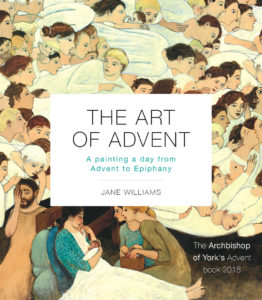 The Art of Advent: A Painting a Day from Advent to Epiphany Jane Williams (SPCK) $15.00 My, my, this may be our favorite Advent book this year! We had many customers who loved her publisher’s similar The Art of Lent which we heartily recommended last Spring. This one, like that one, is a square-sized, small paperback, about 150 pages, making it a truly delightful gem to carry in a purse or backpack or to give as a simple gift. But, yet, it is rich, with full-color artwork for each day of Advent. The art is reproduced nicely, the paper is glossy but still lighter weight. It is such a great little volume to hold and glance through.
The Art of Advent: A Painting a Day from Advent to Epiphany Jane Williams (SPCK) $15.00 My, my, this may be our favorite Advent book this year! We had many customers who loved her publisher’s similar The Art of Lent which we heartily recommended last Spring. This one, like that one, is a square-sized, small paperback, about 150 pages, making it a truly delightful gem to carry in a purse or backpack or to give as a simple gift. But, yet, it is rich, with full-color artwork for each day of Advent. The art is reproduced nicely, the paper is glossy but still lighter weight. It is such a great little volume to hold and glance through. By the way, there are plenty of masterpieces shown here. There are those great artworks that you might expect for a holiday book – from da Vinci’s The Virgin and the Child with Saint Anne to medieval classics like Francesca’s odd The Nativity and (thanks be to God) the spectacular Annunciation by Henry Ossawa Tanner.
By the way, there are plenty of masterpieces shown here. There are those great artworks that you might expect for a holiday book – from da Vinci’s The Virgin and the Child with Saint Anne to medieval classics like Francesca’s odd The Nativity and (thanks be to God) the spectacular Annunciation by Henry Ossawa Tanner. Wounded in Spirit: Advent Art and Meditations David Bannon (Paraclete) $29.99 This glorious full-size hardback book (with a wonderful foreword by Philip Yancey) is the most beautiful devotional book of the season. Each meditation is paired with a moving reproduction of classic art, nicely reproduced on rich, glossy paper. In this mature and artful presentation, it reminds us of the early (now out of print) Paraclete classic God With Us. (That is still available in the “readers edition” that omits the artwork and remains one of our best-sellers in recent years with its literary ruminations and poetry and mature reflections.) Like that one, this is a treasure to behold.
Wounded in Spirit: Advent Art and Meditations David Bannon (Paraclete) $29.99 This glorious full-size hardback book (with a wonderful foreword by Philip Yancey) is the most beautiful devotional book of the season. Each meditation is paired with a moving reproduction of classic art, nicely reproduced on rich, glossy paper. In this mature and artful presentation, it reminds us of the early (now out of print) Paraclete classic God With Us. (That is still available in the “readers edition” that omits the artwork and remains one of our best-sellers in recent years with its literary ruminations and poetry and mature reflections.) Like that one, this is a treasure to behold.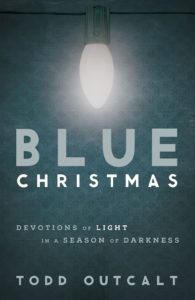 Blue Christmas: Devotions of Light in a Season of Darkness Todd Outcalt (Upper Room Books) $9.99 This little paperback is so good and so useful. As it says on the back of the Wounded in Spirit volume, “Christmas is difficult for many of us. While others are expressing joy, we’re re-living painful memories and reminders of loss.”
Blue Christmas: Devotions of Light in a Season of Darkness Todd Outcalt (Upper Room Books) $9.99 This little paperback is so good and so useful. As it says on the back of the Wounded in Spirit volume, “Christmas is difficult for many of us. While others are expressing joy, we’re re-living painful memories and reminders of loss.”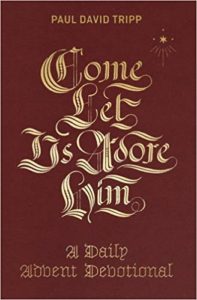 Come Let Us Adore Him: A Daily Advent Devotional Paul David Tripp (Crossway) $17.99 Crossway released this in a sturdy hardback, with some slight aesthetic touches of colored ink at spots, I suppose, so that it can be used with delight over and over. It’s that kind of book, written by a gospel-drenched, clearly Christ-focused pastor and counselor. You may know his yearlong devotional New Morning Mercies or his many self-help books that help us appropriate the gospel into our own struggling lives, marriages, parenting, and such. Come Let Us Adore Him came out last year, but many missed hearing about it so we wanted to highlight it again. As one reviewer says, it does well what we should want in such a book – it offers solid theology that yields to profound devotion and doxology. (By the way, there is at the end of each daily reading a suggestion for further study and some guidance for parents of younger children.)
Come Let Us Adore Him: A Daily Advent Devotional Paul David Tripp (Crossway) $17.99 Crossway released this in a sturdy hardback, with some slight aesthetic touches of colored ink at spots, I suppose, so that it can be used with delight over and over. It’s that kind of book, written by a gospel-drenched, clearly Christ-focused pastor and counselor. You may know his yearlong devotional New Morning Mercies or his many self-help books that help us appropriate the gospel into our own struggling lives, marriages, parenting, and such. Come Let Us Adore Him came out last year, but many missed hearing about it so we wanted to highlight it again. As one reviewer says, it does well what we should want in such a book – it offers solid theology that yields to profound devotion and doxology. (By the way, there is at the end of each daily reading a suggestion for further study and some guidance for parents of younger children.)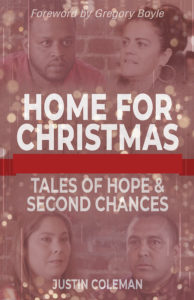 Home for Christmas: Tales of Hope & Second Changes Justine Coleman (Abingdon) $16.99 Wow. This unique book is a very fine, short, stand-alone study with four good chapters – maybe you could use it as a family, or in a small group, but it’s good for individual reading, too. There is also a DVD ($39.99) for a Sunday school class or Adult Education forum (and, of course, a Leader’s Guide ($12.99) for those leading conversations about the DVD curriculum) and a youth edition book ($9.99.)This is really an amazing study and we simply do not know anything else like it.
Home for Christmas: Tales of Hope & Second Changes Justine Coleman (Abingdon) $16.99 Wow. This unique book is a very fine, short, stand-alone study with four good chapters – maybe you could use it as a family, or in a small group, but it’s good for individual reading, too. There is also a DVD ($39.99) for a Sunday school class or Adult Education forum (and, of course, a Leader’s Guide ($12.99) for those leading conversations about the DVD curriculum) and a youth edition book ($9.99.)This is really an amazing study and we simply do not know anything else like it.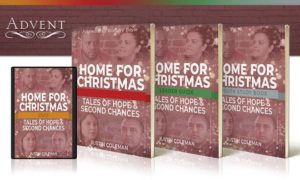 more recent Barking with the Choir; anybody who recommends those is worth reading, right?)
more recent Barking with the Choir; anybody who recommends those is worth reading, right?) A Vintage Christmas: A Collection of Stories and Poems (Thomas Nelson) $17.99 We are always on the lookout for holiday anthologies that include must-read seasonal pieces and a few surprising or lesser known works. This is a trim sized hardback that feels nice in the hand and looks nice. It includes stories and sketches and poems by Louisa May Alcott, Charles Dickens, Harriet Beecher Stowe, L.M. Montgomery, Christina Rossetti, Anne Bronte, Samuel Coleridge, and more. Do you know the letter Mark Twain wrote from Santa to his three-year old daughter? The poems range from Henry Wadsworth Longfellow’s “Christmas Bells” to the amazing “Ring Out Wild Bells” (from In Memoriam) by Tennyson to a Joyce Kilmer (you know her poem about trees) one called “Wartime Christmas.”
A Vintage Christmas: A Collection of Stories and Poems (Thomas Nelson) $17.99 We are always on the lookout for holiday anthologies that include must-read seasonal pieces and a few surprising or lesser known works. This is a trim sized hardback that feels nice in the hand and looks nice. It includes stories and sketches and poems by Louisa May Alcott, Charles Dickens, Harriet Beecher Stowe, L.M. Montgomery, Christina Rossetti, Anne Bronte, Samuel Coleridge, and more. Do you know the letter Mark Twain wrote from Santa to his three-year old daughter? The poems range from Henry Wadsworth Longfellow’s “Christmas Bells” to the amazing “Ring Out Wild Bells” (from In Memoriam) by Tennyson to a Joyce Kilmer (you know her poem about trees) one called “Wartime Christmas.”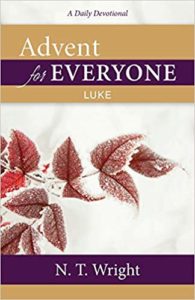 Advent for Everyone: Luke N.T. Wright (WJK) $16.00 Who wouldn’t want to hear what Tom Wright offers as a daily devotional through the Gospel of Luke? The wider church uses Luke in this year’s lectionary (Year C) so this is perfect. (By the way, last year Tom released a similar daily devotional, also called Advent for Everyone, that studied the Epistles. We highly recommend that, too!) Here he shares incisive Bible commentary for each day through the Saturday after the Fourth Sunday in Advent and offers a thought-provoking question for either personal or small group question. You get his original translation of the text, too, as you’d find in his “For Everyone” commentaries.
Advent for Everyone: Luke N.T. Wright (WJK) $16.00 Who wouldn’t want to hear what Tom Wright offers as a daily devotional through the Gospel of Luke? The wider church uses Luke in this year’s lectionary (Year C) so this is perfect. (By the way, last year Tom released a similar daily devotional, also called Advent for Everyone, that studied the Epistles. We highly recommend that, too!) Here he shares incisive Bible commentary for each day through the Saturday after the Fourth Sunday in Advent and offers a thought-provoking question for either personal or small group question. You get his original translation of the text, too, as you’d find in his “For Everyone” commentaries.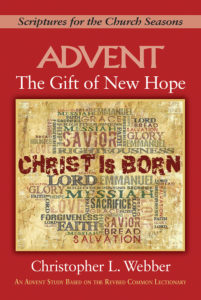 Advent: The Gift of New Hope Christopher L. Webber (Abingdon) $9.99 This is the 2018 edition of the “Scriptures for the Church Seasons” study which is a five-week Advent study based on the Revised Common Lectionary. This is designed for small group use and there are leader helps included in each chapter. It interacts with the given Year C Old Testament, Gospel and Epistle texts. Nothing like it in print.
Advent: The Gift of New Hope Christopher L. Webber (Abingdon) $9.99 This is the 2018 edition of the “Scriptures for the Church Seasons” study which is a five-week Advent study based on the Revised Common Lectionary. This is designed for small group use and there are leader helps included in each chapter. It interacts with the given Year C Old Testament, Gospel and Epistle texts. Nothing like it in print.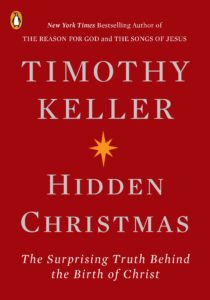 Hidden Christmas: The Surprising Truth Behind the Birth of Christ Timothy Keller (Penguin) $15.00 This was out in hardback last year and we are very glad that it is now available in a trim sized, less costly paperback. You could buy a bunch, and maybe you should! What solid, no-nonsense, serious-minded, warm-hearted, Scripture study this is! Of course, Keller is known as a thoughtful and engaging pastor of a large, culturally-aware and socially-involved PCA church in New York. (I know, he is too conservative for some, and too liberal for others, too intellectual for many. Trust me, this is a great book for any thoughtful reader of any persuasion!)
Hidden Christmas: The Surprising Truth Behind the Birth of Christ Timothy Keller (Penguin) $15.00 This was out in hardback last year and we are very glad that it is now available in a trim sized, less costly paperback. You could buy a bunch, and maybe you should! What solid, no-nonsense, serious-minded, warm-hearted, Scripture study this is! Of course, Keller is known as a thoughtful and engaging pastor of a large, culturally-aware and socially-involved PCA church in New York. (I know, he is too conservative for some, and too liberal for others, too intellectual for many. Trust me, this is a great book for any thoughtful reader of any persuasion!)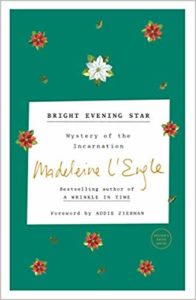 Bright Evening Star: Mystery of the Incarnation Madeleine L’Engle (Convergent) $15.00 Oh my, if Tim Keller is a bit left brainy, this is smart, but rather right-brained, if you will, as you might expect from an artist and creative fiction and non-fiction writer. It is said that this lovely, literary work by a master spiritual writer “contemplates the mystery and the majesty of the Incarnation.” Bright Evening Star, just now out in a new paperback edition, is a deeply personal narrative by a dear woman and thoughtful scholar and beloved novelist pointing us towards the still-point of the holiday, which she calls “a time of awed silence.”
Bright Evening Star: Mystery of the Incarnation Madeleine L’Engle (Convergent) $15.00 Oh my, if Tim Keller is a bit left brainy, this is smart, but rather right-brained, if you will, as you might expect from an artist and creative fiction and non-fiction writer. It is said that this lovely, literary work by a master spiritual writer “contemplates the mystery and the majesty of the Incarnation.” Bright Evening Star, just now out in a new paperback edition, is a deeply personal narrative by a dear woman and thoughtful scholar and beloved novelist pointing us towards the still-point of the holiday, which she calls “a time of awed silence.”